








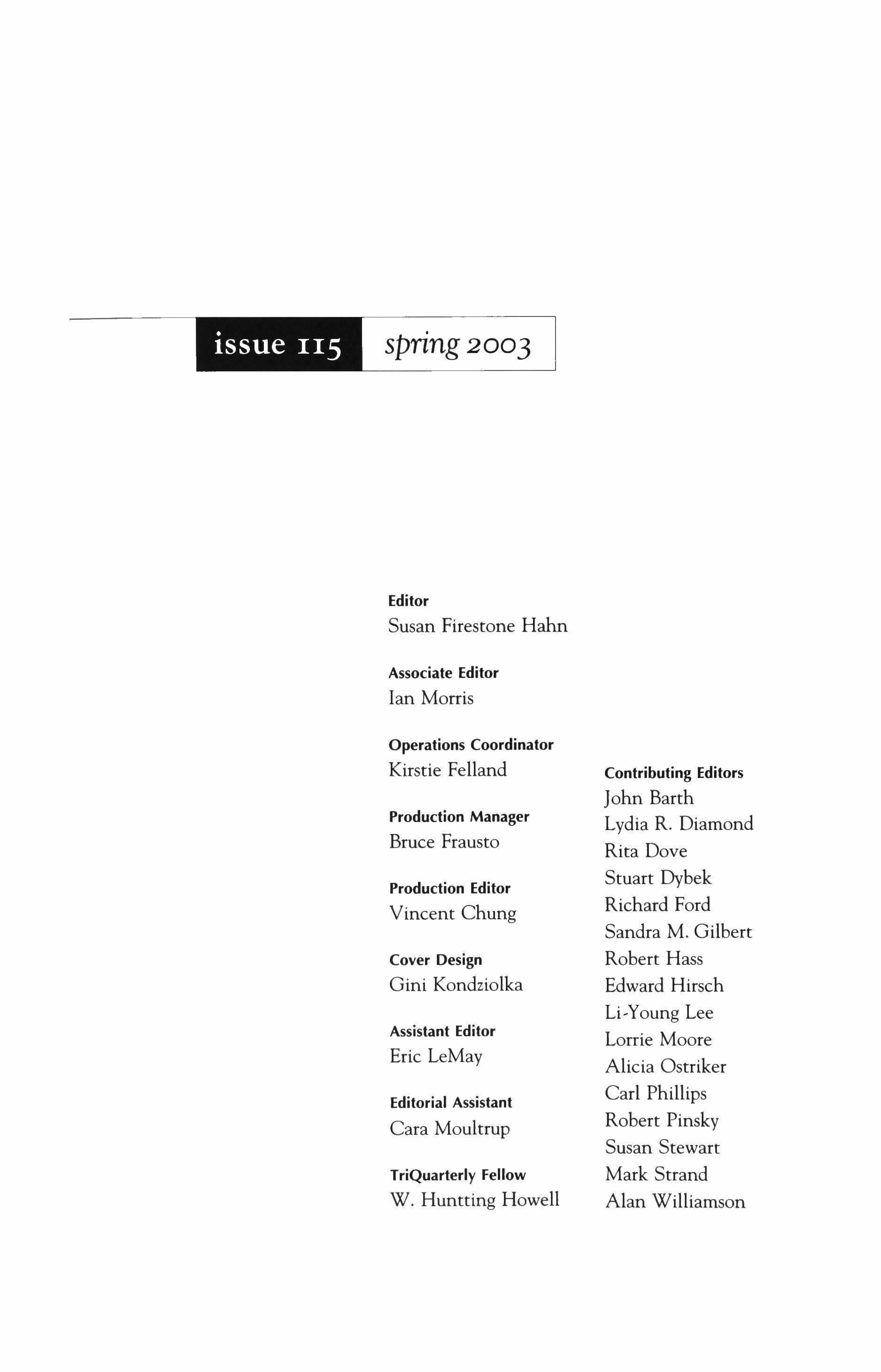
Editor Susan Firestone Hahn
Associate Editor Ian Morris
Operations Coordinator Kirstie Felland
Production Manager Bruce Frausto
Production Editor
Vincent Chung
Cover Design
Gini Kondziolka
Assistant Editor
Eric LeMay
Editorial Assistant Cara Moultrup
TriQuarterly Fellow W. Huntting Howell
Contributing
Editors
John Barth
Lydia R. Diamond
Rita Dove
Stuart Dybek
Richard Ford
Sandra M. Gilbert
Robert Hass
Edward Hirsch
Li-Young Lee
Lorrie Moore
Alicia Ostriker
Carl Phillips
Robert Pinsky
Susan Stewart
Mark Strand
Alan Williamson

108 The Daughters; On the Line Today; By the Sea
Richard FoxIII Physics & the Secret of Nothing; Cloud Journal
Christopher Buckley
117 A Poem about a Refrigerator
BJ Ward
118 Mrs. Dati; Q and A: Do you write about real stuff or do you just make it up?; The Direct Address: Dear Reader,
Julianna Baggott
121 The Case Against Daedalus
Fred Dings
122 Riddle, Two Years Later; Why We Shouldn't Write Love Poems, or If We Must, Why We Shouldn't Publish Them; Once I Did Kiss Her Wetly on the Mouth
Beth Ann Fennelly 211 "Et Cetera"
Charles Rafferty
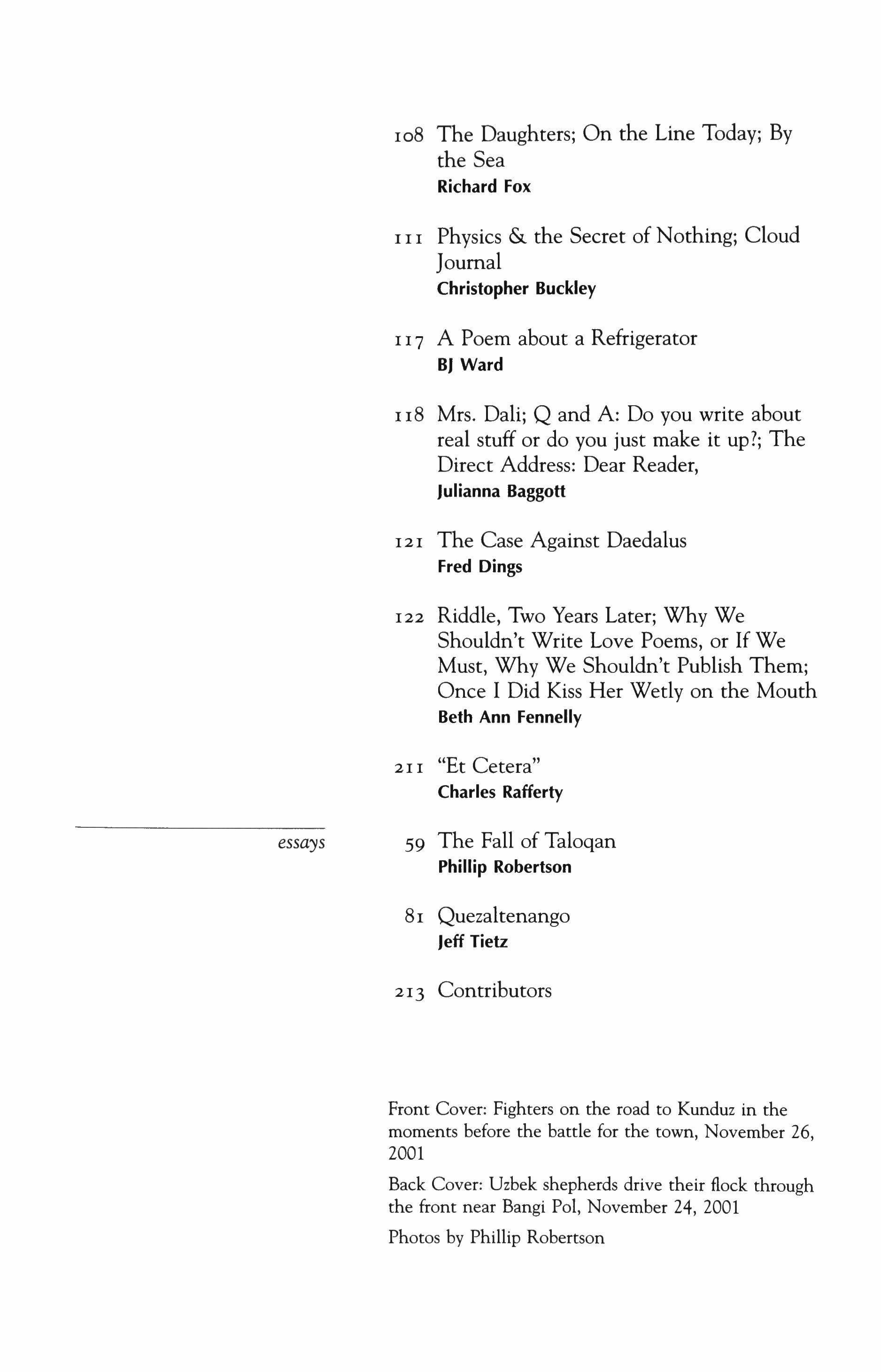
Quezaltenango
Jeff Tietz 213 Contributors
Front Cover: Fighters on the road to Kunduz in the moments before the battle for the town, November 26, 2001
Back Cover: Uzbek shepherds drive their flock through the front near Bangi Pol, November 24, 2001
Photos by Phillip Robertson
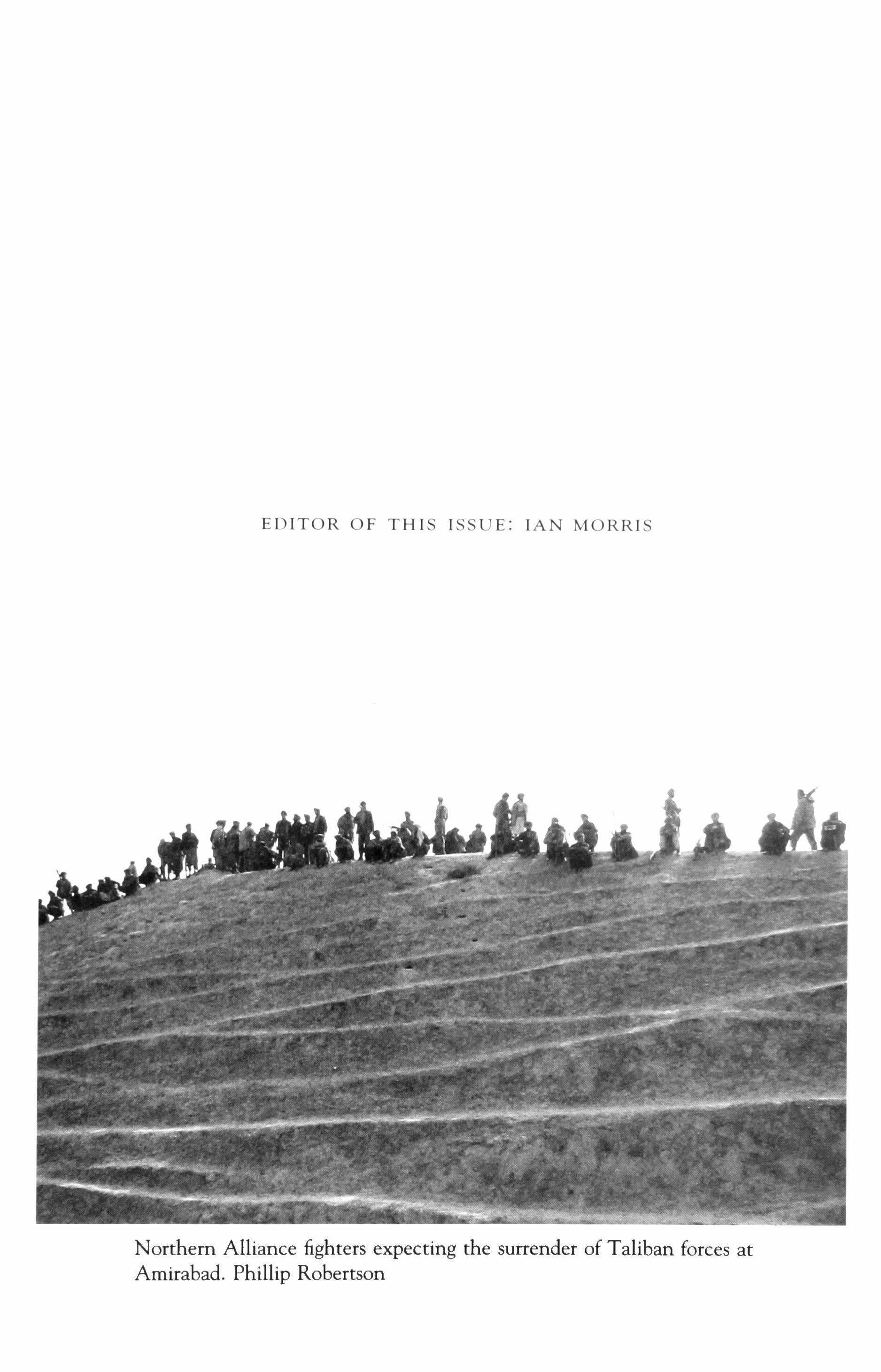

Already catastrophe!
In the small peasant village people arise
To Sophie's betrayal of Juan, Her loving intended, in the night. Juan is loose like a jaguar, and Someone is going to die.
Some vocal ruminations first though.
Sophie: How strange, how voiceless the larks today.
Juan: How hot the fired steel of my rage
Those times my dearest fell to slights of devotion.
Soon all the villagers gorge on this infidelity.
More songs and crescendos. Three mocking crones
Loose howls on stage, as Sophie's new man Croons, falsetto, in transit to the country's borders.
A waft of hope: pleas made, souls scraped raw While honor wrestles forgiveness.
Thunderclouds boiling, over the housetops. Trumpets! Shouts!

All of the villagers gather for blood flow, In chorused horror.
Let it happen, The gushing from chests and bellies.
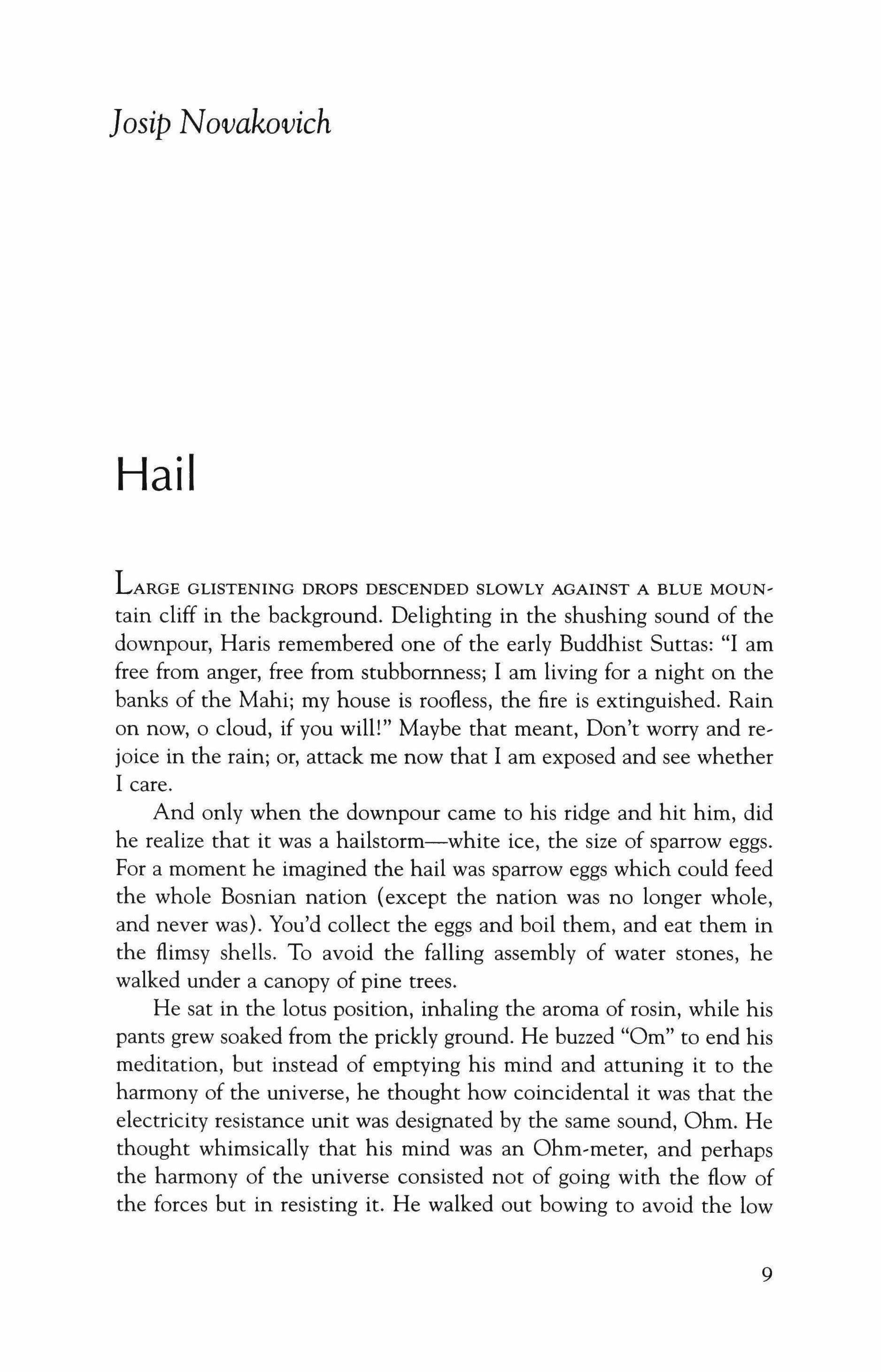
LARGE GLISTENING DROPS DESCENDED SLOWLY AGAINST A BLUE MOUNtain cliff in the background. Delighting in the shushing sound of the downpour, Haris remembered one of the early Buddhist Suttas: "I am free from anger, free from stubbornness; I am living for a night on the banks of the Mahi; my house is roofless, the fire is extinguished. Rain on now, 0 cloud, if you will!" Maybe that meant, Don't worry and rejoice in the rain; or, attack me now that I am exposed and see whether I care.
And only when the downpour came to his ridge and hit him, did he realize that it was a hailstorm-white ice, the size of sparrow eggs. For a moment he imagined the hail was sparrow eggs which could feed the whole Bosnian nation (except the nation was no longer whole, and never was). You'd collect the eggs and boil them, and eat them in the flimsy shells. To avoid the falling assembly of water stones, he walked under a canopy of pine trees.
He sat in the lotus position, inhaling the aroma of rosin, while his pants grew soaked from the prickly ground. He buzzed "Om" to end his meditation, but instead of emptying his mind and attuning it to the harmony of the universe, he thought how coincidental it was that the electricity resistance unit was designated by the same sound, Ohm. He thought whimsically that his mind was an Ohm-meter, and perhaps the harmony of the universe consisted not of going with the flow of the forces but in resisting it. He walked out bowing to avoid the low

tree limbs-the needle rows on the branches resembled spacious garments on the arms of Jesus or some other loosely clad prophet who stretched out many hands as though he had become Shiva-and nearly bumped into Hasan, who said, "You're talking to yourself or something?"
Their sergeant passed by in a personal cloud of tobacco smoke.
"Shit, this business of being Muslim sucks," Hasan said. "We should get wasted on slivovitz, and we aren't allowed a drop!" He trumpeted his nose, whose tip, once released from the grip of the thumb and forefinger, changed from pink-white to glowing red. "A shot of brew would cure me, I swear. A few jokes would help, too. Can you tell me a good one?"
"Hum. Can't think funny right now."
"If you can't, I'll tell you one. Coming home from Germany, Mujo drives into Tuzla in a new Mercedes, and he rolls down the window and waves to the people in the streets. Hey, what are you waving for? his friend Jamal says. Almost everybody now has a Mercedes. Yes, Mujo agrees, you are right about that, but not everybody has hands." Hasan laughed and repeated the punch line but Haris did not laugh.
Hasan cleared his phlegmy throat and spat. "Whoever invented war should be killed-it's so damned boring."
Haris took another deep breath, savoring the pines, and exhaled, feeling the hairs in his nostrils tickle. Perhaps he should have pulled out the nose hairs, but then, why would he? They probably filtered out the dust and now enhanced the smells. Snakes smell with their tongues, and who's to say we don't with our hairs?
Hasan stared at him, with his bulging blue eyes, and said, "Oh, I understand. I am not exactly an enthusiast myself. I'll let you in on a secret. I'd rather be sailing, but I was drafted."
The hailstorm was over and the last echoes of it exhaled a lush silence, and with his eyes closed Haris luxuriated in the aftermath beauty of the vanished sound.
But the quiet was short-lived since Hasan continued talking. "How about you? Did they hound you down?"
"I was a pacifist, still am, and I dodged the Yugoslav People's Army draft. But in Sarajevo, the park I used to gaze at from my favorite cafe disappeared. People cut down the trees and burned them at home in pots and makeshift stoves, smoking up their apartments. The park became a bald meadow, with little tree stumps sticking out, like severed arms, with chopped hands gone, as though the trees had stolen-what,

air?-and were then mutilated according to the Koran laws. I thought, you can't take trees from us, and I volunteered."
The sergeant limped back out of his cloud and said, "What are you two jabbering about? Come, join the group."
They followed him. "Our scouts are back," said the commander, a husky man with a black and white beard (white on the cheeks and black on the chin). He pointed out two thin men, who looked smoked out on cigarettes, with sunken cheeks and sparse yellow teeth.
"Tell them what you told me," said the commander.
"Holy Smoke," said one of the scouts in an amazingly low voice, "we made it to their position. You can go around the mountain, and there are no obstacles. They have no idea that we are here."
"They don't even have guards posted outside their camp," said the other scout, blinking, while one side of his face twitched. "You can see them down there." He invited the soldiers to the ridge and lent them his binoculars to see the men who roasted a pair of oxen on spits and placed lambs to cook in the chest cavities of the beasts.
It was dusk and a mist arose from the valley and covered up the distant scene.
The commander laid out his plan. One half of the troops would go around the mountain, and the other would attack directly from this side, in two hours.
Haris and his companions walked gingerly for fear of stepping on mines even if the scouts had no trouble beforehand. Not only would the mine hurt whoever stepped on it but it would also reveal the Muslim position.
They approached the upper edge of the camp. Haris tried to control his breath, to enjoy the aroma of plum trees and roasted lamb-flesh, which wafted on the mists, but there was no enjoyment in his breath and no self-control. His heart pounded into his lungs and interrupted his breath, and it skipped beats, and accelerated in a rush, syncopating a strange rhythm he hadn't experienced in a long while, of pure fear. The mist probably made it safer to advance than clear air would, but it added the invisibility and unknowability, No meditation and no mantra could slow his heart now.
All of a sudden, bullets splashed the mud around him, startling him. Guns right next to him fired back into the mist, to where the shots resounded.
"Forward, for Bosnia and Allah!" the commander shouted.
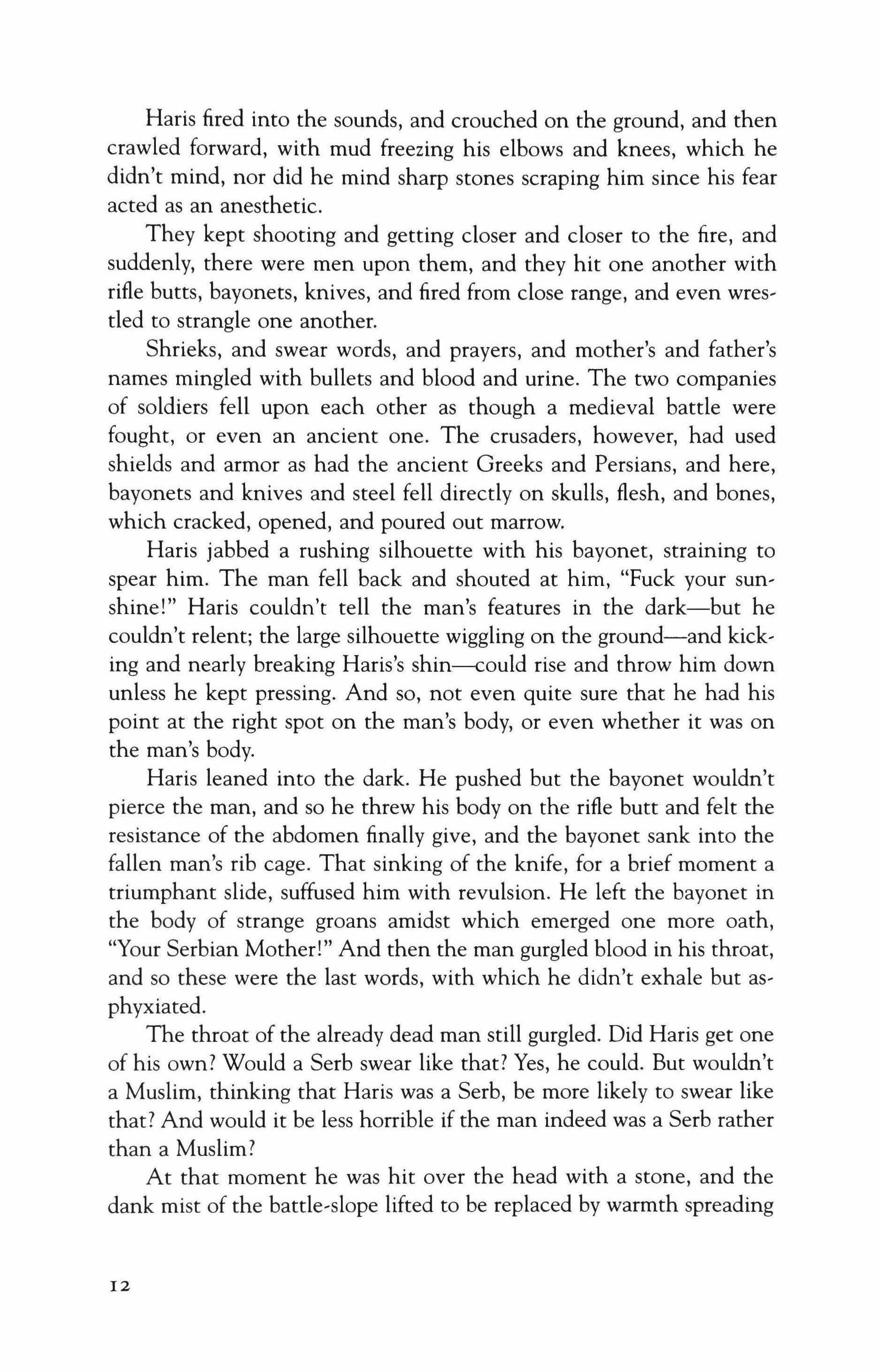
Haris fired into the sounds, and crouched on the ground, and then crawled forward, with mud freezing his elbows and knees, which he didn't mind, nor did he mind sharp stones scraping him since his fear acted as an anesthetic.
They kept shooting and getting closer and closer to the fire, and suddenly, there were men upon them, and they hit one another with rifle butts, bayonets, knives, and fired from close range, and even wrestled to strangle one another.
Shrieks, and swear words, and prayers, and mother's and father's names mingled with bullets and blood and urine. The two companies of soldiers fell upon each other as though a medieval battle were fought, or even an ancient one. The crusaders, however, had used shields and armor as had the ancient Greeks and Persians, and here, bayonets and knives and steel fell directly on skulls, flesh, and bones, which cracked, opened, and poured out marrow.
Haris jabbed a rushing silhouette with his bayonet, straining to spear him. The man fell back and shouted at him, "Fuck your sun, shine!" Haris couldn't tell the man's features in the dark-but he couldn't relent; the large silhouette wiggling on the ground-and kick, ing and nearly breaking Haris's shin---could rise and throw him down unless he kept pressing. And so, not even quite sure that he had his point at the right spot on the man's body, or even whether it was on the man's body.
Haris leaned into the dark. He pushed but the bayonet wouldn't pierce the man, and so he threw his body on the rifle butt and felt the resistance of the abdomen finally give, and the bayonet sank into the fallen man's rib cage. That sinking of the knife, for a brief moment a triumphant slide, suffused him with revulsion. He left the bayonet in the body of strange groans amidst which emerged one more oath, "Your Serbian Mother!" And then the man gurgled blood in his throat, and so these were the last words, with which he didn't exhale but as, phyxiated.
The throat of the already dead man still gurgled. Did Haris get one of his own? Would a Serb swear like that? Yes, he could. But wouldn't a Muslim, thinking that Haris was a Serb, be more likely to swear like that? And would it be less horrible if the man indeed was a Serb rather than a Muslim?
At that moment he was hit over the head with a stone, and the dank mist of the battle-slope lifted to be replaced by warmth spreading

through his head. When he came to, white clouds swiftly drifted a dozen yards above him. Haris stood up; he could barely keep his balance. Each step he took hurt his head, wobbling his brain.
He tripped over a corpse with a cracked skull and the brain hang, ing out of it and quivering and collecting pine needles from the ground. He felt his brain quivering the same needle-pricked way; he touched his right temple, and his fingertips slid through a tepid gluey wetness.
He crawled to the edge of a rock and looked on-down below him lay scattered cattle bones and one rusty tank. He crawled into the camp, and found more corpses of his comrades, from both contingents. He concluded that the two sections hadn't attacked the Serbs, but each other. Where were his live comrades? What if he were the only survivor?
The thought horrified him, but it also appealed to him. If the mountain belonged to hawks, wolves, boar, and foxes, and he were the only human being around, he'd be free to roam, to drink from clean brooks, never to speak again, never to exchange lies and friendly fire of one kind or another; then he could indeed be spiritual. He remembered one of his favorite Suttas, which he had learned near the felled park, to pass the time, in Sarajevo, years before:
"Having abandoned the practicing of violence toward all objects, not doing violence to anyone of them, let one wish not for children. Why wish for a friend? Let one walk alone like a rhinoceros."
He had always loved solitude, and so even amidst the busy city, he hadn't formed strong attachments-at least not to people, but to cafes, yes. The few girlfriends he'd had eventually abandoned him upon realizing that he wasn't the marrying kind, and so for years he hadn't been with any women although he occasionally lusted. But up here on the mountain, he wouldn't be bothered by lust either. If he were absolutely alone, he could be a good Buddhist; he could meditate well.
But he wouldn't be alone on the mountain. He'd be in the company of a hundred corpses whose ghosts would scrutinize him and molest him in his dreams. He had gruesomely killed a man, and his karma couldn't bring him freedom from pain, let alone Nirvana. One side of his face went numb, and an ear buzzed. He had a concussion, no doubt, but were some of his arteries severed if the dura mater cracked? If so, he might even want a hospital, but who would trust one in these con, ditions? A concussion while people were dying of wounds would receive
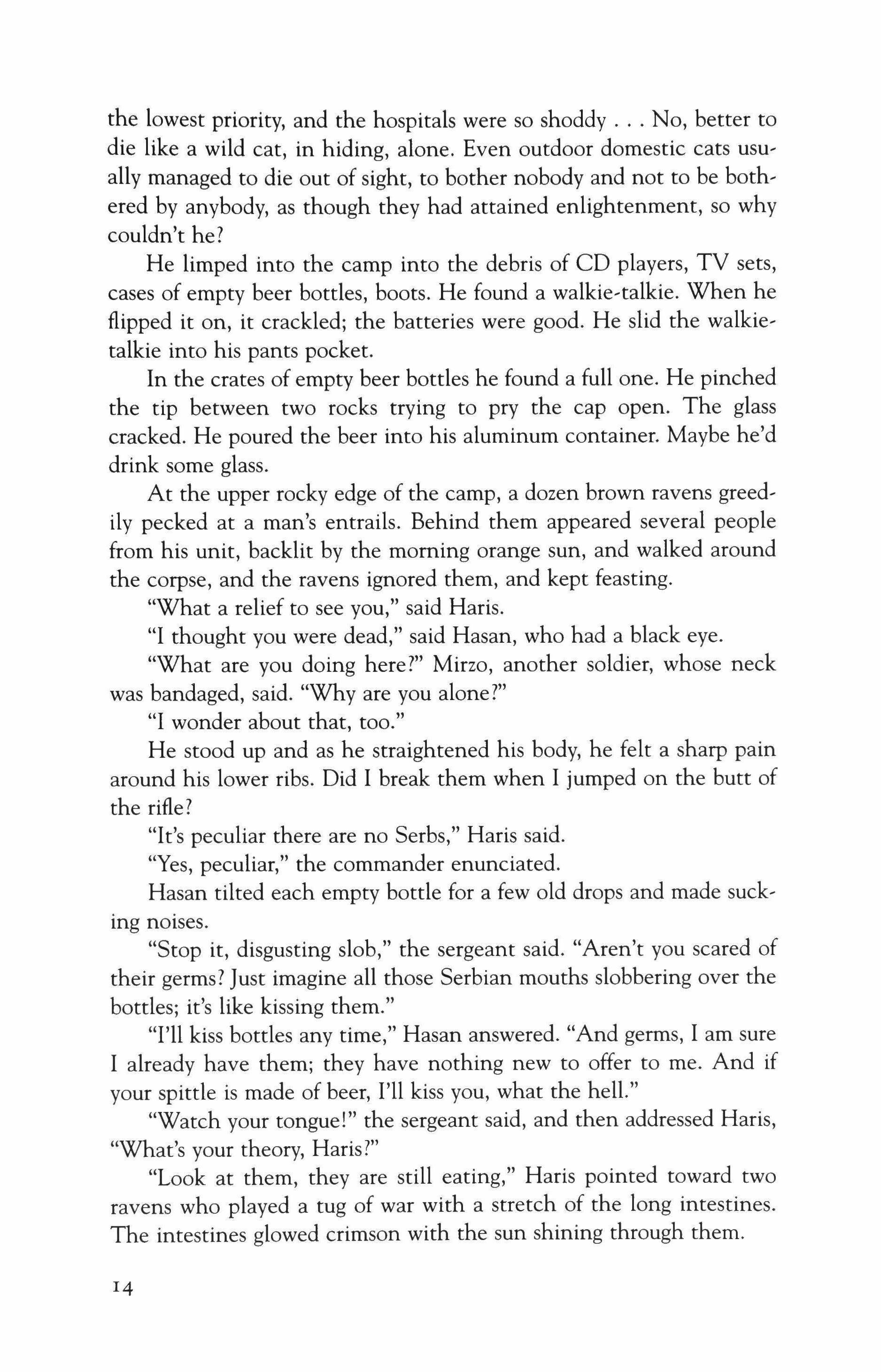
the lowest priority, and the hospitals were so shoddy No, better to die like a wild cat, in hiding, alone. Even outdoor domestic cats usually managed to die out of sight, to bother nobody and not to be bothered by anybody, as though they had attained enlightenment, so why couldn't he?
He limped into the camp into the debris of CD players, TV sets, cases of empty beer bottles, boots. He found a walkie-talkie. When he flipped it on, it crackled; the batteries were good. He slid the walkietalkie into his pants pocket.
In the crates of empty beer bottles he found a full one. He pinched the tip between two rocks trying to pry the cap open. The glass cracked. He poured the beer into his aluminum container. Maybe he'd drink some glass.
At the upper rocky edge of the camp, a dozen brown ravens greedily pecked at a man's entrails. Behind them appeared several people from his unit, backlit by the morning orange sun, and walked around the corpse, and the ravens ignored them, and kept feasting.
"What a relief to see you," said Haris.
"I thought you were dead," said Hasan, who had a black eye.
"What are you doing here?" Mirzo, another soldier, whose neck was bandaged, said. "Why are you alone?"
"I wonder about that, too."
He stood up and as he straightened his body, he felt a sharp pain around his lower ribs. Did I break them when I jumped on the butt of the rifle?
"It's peculiar there are no Serbs," Haris said.
"Yes, peculiar," the commander enunciated.
Hasan tilted each empty bottle for a few old drops and made sucking noises.
"Stop it, disgusting slob," the sergeant said. "Aren't you scared of their germs? Just imagine all those Serbian mouths slobbering over the bottles; it's like kissing them."
"I'll kiss bottles any time," Hasan answered. "And germs, I am sure I already have them; they have nothing new to offer to me. And if your spittle is made of beer, I'll kiss you, what the hell."
"Watch your tongue!" the sergeant said, and then addressed Haris, "What's your theory, Haris?"
"Look at them, they are still eating," Haris pointed toward two ravens who played a tug of war with a stretch of the long intestines. The intestines glowed crimson with the sun shining through them.
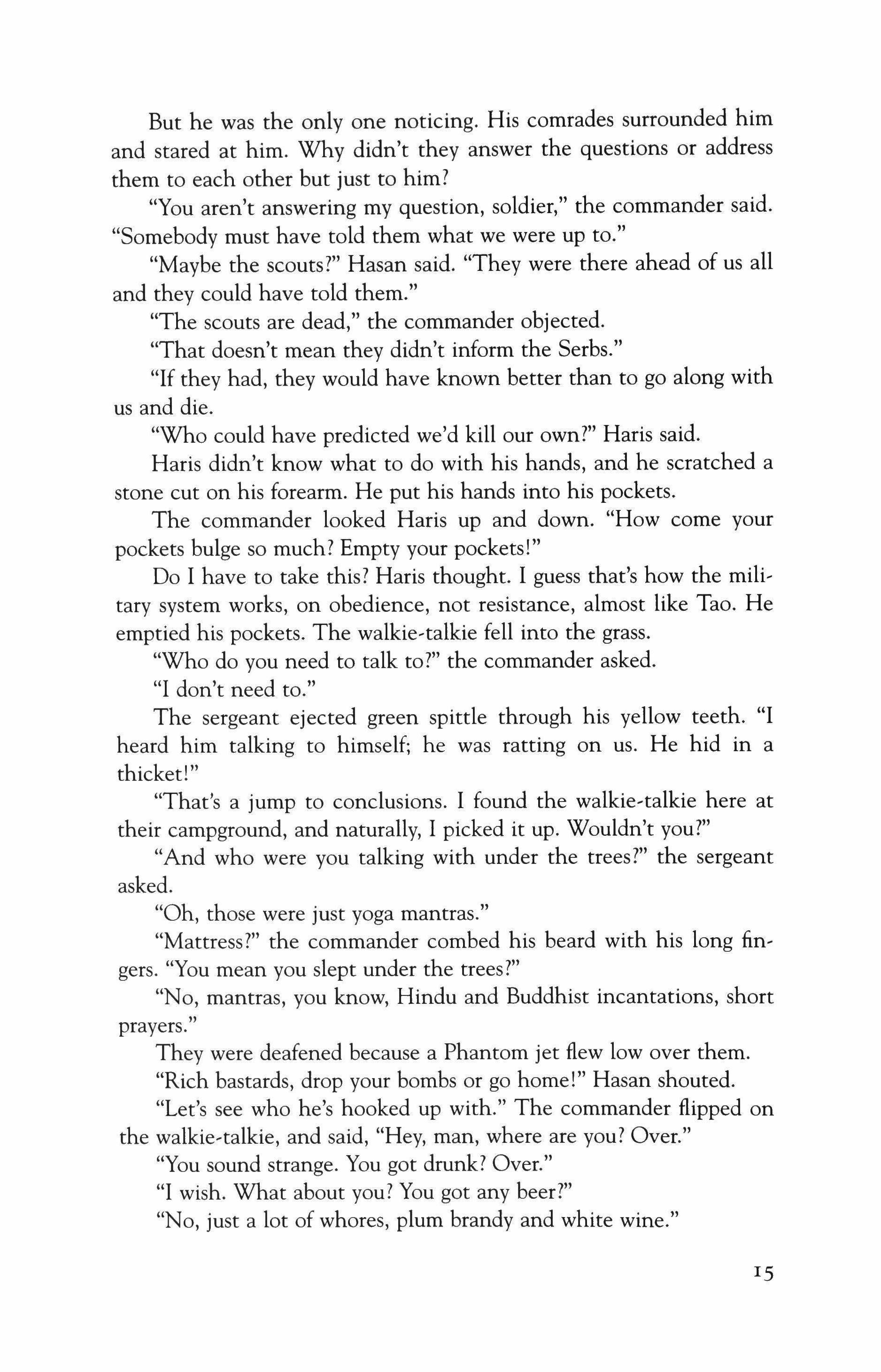
But he was the only one noticing. His comrades surrounded him and stared at him. Why didn't they answer the questions or address them to each other but just to him?
"You aren't answering my question, soldier," the commander said. "Somebody must have told them what we were up to."
"Maybe the scouts?" Hasan said. "They were there ahead of us all and they could have told them."
"The scouts are dead," the commander objected.
"That doesn't mean they didn't inform the Serbs."
"If they had, they would have known better than to go along with us and die.
"Who could have predicted we'd kill our own?" Haris said.
Haris didn't know what to do with his hands, and he scratched a stone cut on his forearm. He put his hands into his pockets.
The commander looked Haris up and down. "How come your pockets bulge so much? Empty your pockets!"
Do I have to take this? Haris thought. I guess that's how the military system works, on obedience, not resistance, almost like Tao. He emptied his pockets. The walkie-talkie fell into the grass.
"Who do you need to talk to?" the commander asked.
"I don't need to."
The sergeant ejected green spittle through his yellow teeth. "I heard him talking to himself; he was ratting on us. He hid in a thicket!"
"That's a jump to conclusions. I found the walkie-talkie here at their campground, and naturally, I picked it up. Wouldn't you?"
"And who were you talking with under the trees?" the sergeant asked.
"Oh, those were just yoga mantras."
"Mattress?" the commander combed his beard with his long fingers. "You mean you slept under the trees?"
"No, mantras, you know, Hindu and Buddhist incantations, short prayers."
They were deafened because a Phantom jet flew low over them.
"Rich bastards, drop your bombs or go home!" Hasan shouted.
"Let's see who he's hooked up with." The commander flipped on the walkie-talkie, and said, "Hey, man, where are you? Over."
"You sound strange. You got drunk? Over."
"I wish. What about you? You got any beer?"
"No, just a lot of whores, plum brandy and white wine."

"OK, let's exchange some, I got lots of whiskey from those UN bozos. Bozo booze. Where are you now?"
"What do you think? Over."
"Oh, of course. I'll stop by tomorrow."
The commander flipped off the walkie-talkie.
"So, that's your partner? You warned them, and now they are down, all the way in the valley, probably getting a reinforcement to hunt us. I think it's time to move out of this place."
"But how could we? This is such a good strategic location," said the sergeant.
They didn't walk far-two hundred yards away from the campsite, where most of their dead lay.
Two soldiers tied Haris to a tree and the commander said: "Convince me you didn't do us in. Think up something, make a good story. You have an hour. If your story's no good, we'll bury you alive with those whose deaths you have caused."
At least half of the company had survived. Gradually they appeared from the woods, and from behind the rocks, and they joined in the digging efforts, and some of them bandaged each other, and a couple tended to a man who was dying from many knife wounds, while several stood on guard.
They used shovels from the Serb trenches and fought through the stony land, digging next to the pines and cedars. Haris smelled smoke from so much metal hitting rock and sparking up. They collected wristwatches, and wallets, which they combed for German marks; they gathered tobacco and cigarettes. They placed four bodies in each hole. Several men kept glancing at Haris darkly, and later, they threw soiled stones at him. One stone struck Haris in the ribs. Mirzo, when passing by Haris, spat into his face. The sergeant slapped Haris, hitting him above the ear, where he'd been struck down with a rock. Flashes of green light appeared before Haris's eyes, like northern lights filtered through leaves, and his vision oscillated. He couldn't keep his head up and he let it slump, and rested his chin on his sternum. The rope cut into his wrists.
In the meanwhile, men prayed and read from the Koran. Several men wailed, some wept silently, others frowned and paced, and one man, apparently out of his mind, would now and then bellow with laughter, until Hasan bloodied his nose. From then on the man whimpered and sniffled.
The burials went on with somber dignity.
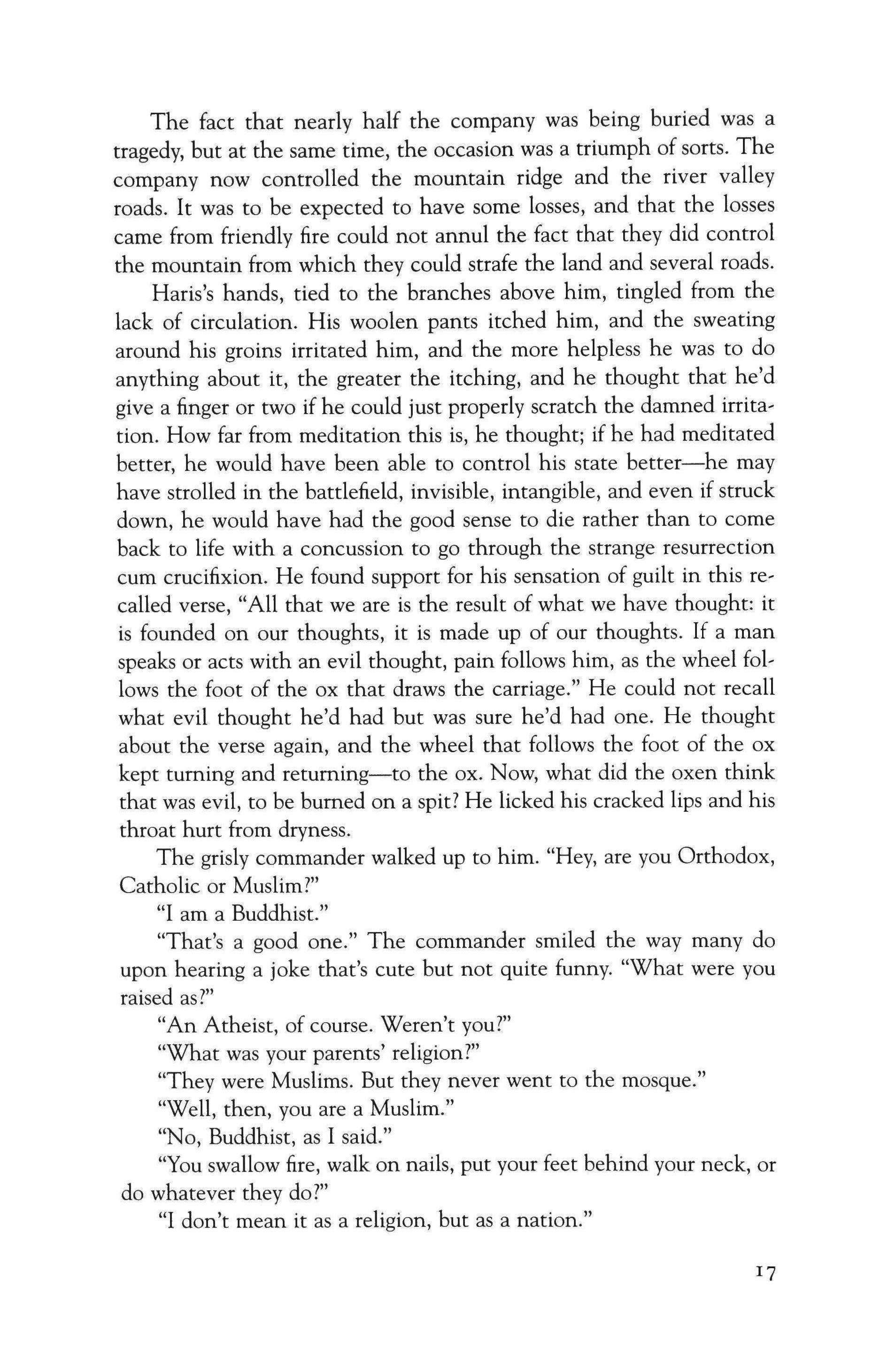
The fact that nearly half the company was being buried was a tragedy, but at the same time, the occasion was a triumph of sorts. The company now controlled the mountain ridge and the river valley roads. It was to be expected to have some losses, and that the losses came from friendly fire could not annul the fact that they did control the mountain from which they could strafe the land and several roads.
Haris's hands, tied to the branches above him, tingled from the lack of circulation. His woolen pants itched him, and the sweating around his groins irritated him, and the more helpless he was to do anything about it, the greater the itching, and he thought that he'd give a finger or two if he could just properly scratch the damned irritation. How far from meditation this is, he thought; if he had meditated better, he would have been able to control his state better-he may have strolled in the battlefield, invisible, intangible, and even if struck down, he would have had the good sense to die rather than to come back to life with a concussion to go through the strange resurrection cum crucifixion. He found support for his sensation of guilt in this recalled verse, "All that we are is the result of what we have thought: it is founded on our thoughts, it is made up of our thoughts. If a man speaks or acts with an evil thought, pain follows him, as the wheel follows the foot of the ox that draws the carriage." He could not recall what evil thought he'd had but was sure he'd had one. He thought about the verse again, and the wheel that follows the foot of the ox kept turning and returning-to the ox. Now, what did the oxen think that was evil, to be burned on a spit? He licked his cracked lips and his throat hurt from dryness.
The grisly commander walked up to him. "Hey, are you Orthodox, Catholic or Muslim?"
"I am a Buddhist."
"That's a good one." The commander smiled the way many do upon hearing a joke that's cute but not quite funny. "What were you raised as?"
"An Atheist, of course. Weren't you?"
"What was your parents' religion?"
"They were Muslims. But they never went to the mosque."
"Well, then, you are a Muslim."
"No, Buddhist, as I said."
"You swallow fire, walk on nails, put your feet behind your neck, or do whatever they do?"
"I don't mean it as a religion, but as a nation."

"Come on."
"Could I have a glass of water? I'm dying of thirst."
"Buddhist nation, you say, here?"
"You can be Muslim or Christian anywhere, why not Buddhist?"
"You are making fun of Muslims being a nation in our country? I see, there's a Serb lurking in you. That's what they like to do."
"Don't I have freedom of choice of religion and nation?"
"Nobody does. That's fate. And how the hell could you become something so freakish?"
"Not that I like being a Buddhist, but in my formative years, I read that crap and so that's how I think and who I am."
"Well, if you don't like it, change it, be a good Muslim."
"Can't. You said one cannot change."
"But you did-just drop your act. I don't find it a good story."
"I wouldn't mind changing, but I became Buddhist in my formative years, late teens, early twenties, the most philosophical years of our lives. Remember in the sixties there were books all over Sarajevo about herb healing, meditation, Buddhism, Hinduism, astral projection, and so on. All that stuff came from Belgrade. They already planned to distract us, get us to fantasize and talk in cafes every night till dawn, while they went to military academies and studied engineering or started smuggling goods from Italy or joined the Mafia. You think they read that stuff in Belgrade? No way."
"You are crazy!"
"You call me crazy. You have a better explanation for what's going on?"
"Well, you got a point, but that doesn't mean that any nonsense should make sense. Plus, your giving me this theory about Serb conspiracies won't convince me that you aren't working for Serbs."
The sergeant lit a cigarette and began recreating his personal cloud, but the commander said, "No smoking."
"What's wrong with smoking now? The Koran says nothing against it."
"The tree might catch on fire."
"In this weather? If it did, it might be a good way to deal with this devil."
"In any weather-look at the rosin oozing from the bark. That bums like petrol. By the way, don't talk back to your superiors."
The sergeant huffed out a blue streak and trampled his cigarette under his boot.

"Well, that was nice, but you used up your time." The commander petted the white sides of his beard. "You could have convinced us that you didn't betray us. All right, try it in five, six sentences."
"Why would I convince you of anything? If that's what you believe, go ahead, believe."
"It's a shame. Now that you have talked about your weird religion, I can see that you could easily do all sorts of unpredictable things; therefore I believe that you turned us in. Sergeant, what do you think?"
"I agree with you."
The commander then addressed Hasan, who stood with his arms crossed. His black eye was even more swollen than before, and it shut.
"Soldier, how about you?"
"I have no idea."
"But you heard him talking stealthily under the trees?" said the sergeant.
"Yes, I heard him, but I don't know if he was saying anything."
"So, see my friend, the jury is unanimous," the commander said. "The trial is over."
"It's no trial, but unfounded opinions," said Haris.
"Don't contradict your superiors!" Sergeant interceded.
"Not even when my
"When your life is in question, you guessed that right," the cornmander said. "I don't think it's in question any more. Mirzo, Hasan, go ahead, shoot him."
"How, to execute one of our own?" Hasan objected. "I think it's enough that we have killed off half of our company. You want to go on?"
"You got a point," said the commander, "but that's precisely why we should shoot him-he caused too much grief."
"I think it would be better, according to our laws, to cut his tongue out," the sergeant suggested. "That's the offending organ-let's just cut it out and move on."
"I kind of like the idea, but no. If you cut his tongue, he'll bleed to death. You'd have to have a way of stopping the bleeding for the sentence to make sense. Plus, I do believe he would be resentful afterward if he survived, and I wouldn't trust him with arms around us. Shoot him."
"I can't, if you'll excuse me," Hasan said. "I am no longer sure he did it. And he's a friend of mine. I admit he's weird, but who isn't. It would be weird not to be weird."
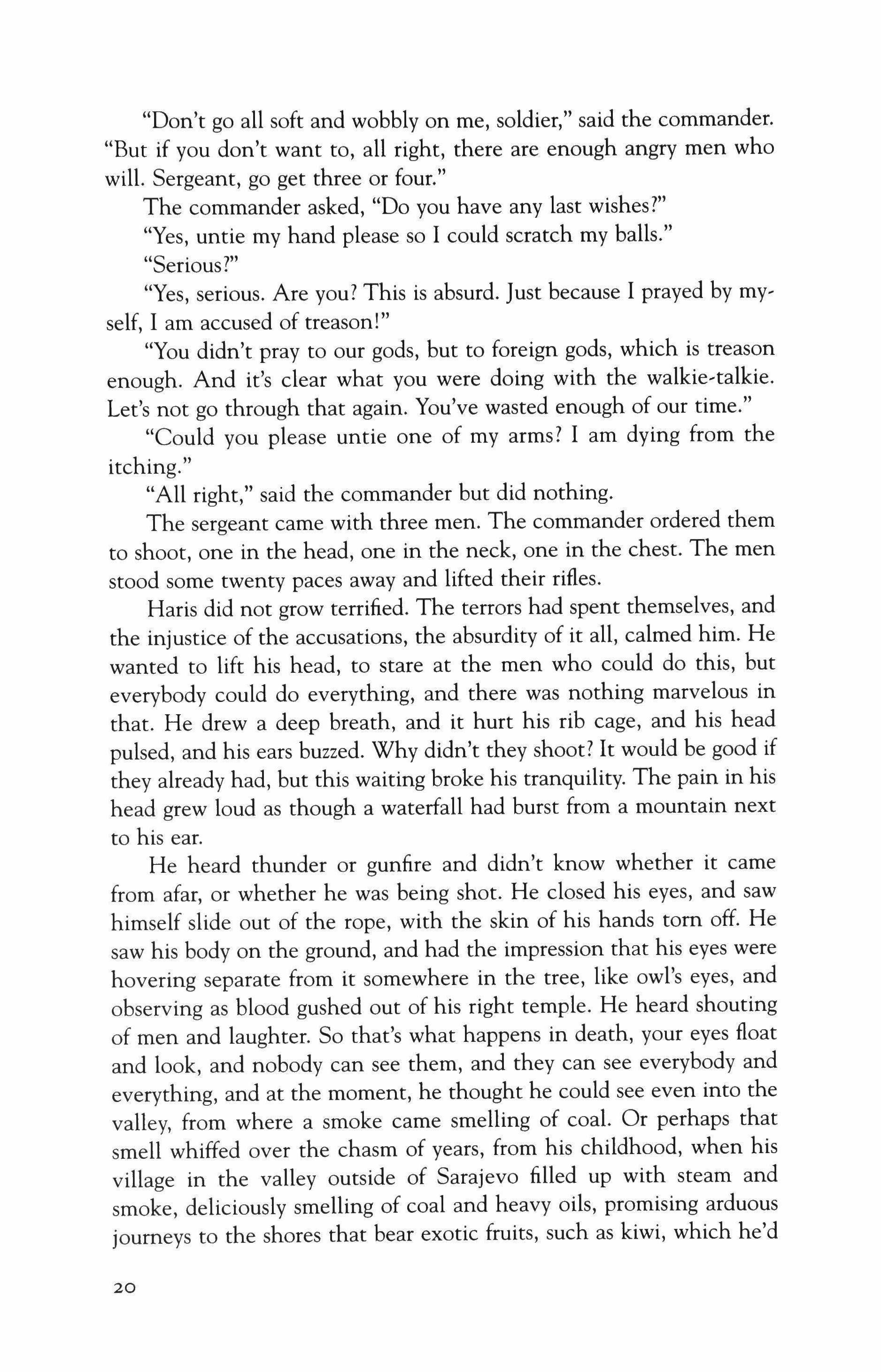
"Don't go all soft and wobbly on me, soldier," said the commander. "But if you don't want to, all right, there are enough angry men who will. Sergeant, go get three or four."
The commander asked, "Do you have any last wishes?"
"Yes, untie my hand please so I could scratch my balls."
"Serious?"
"Yes, serious. Are you? This is absurd. Just because I prayed by my' self, I am accused of treason!"
"You didn't pray to our gods, but to foreign gods, which is treason enough. And it's clear what you were doing with the walkie-talkie. Let's not go through that again. You've wasted enough of our time."
"Could you please untie one of my arms? I am dying from the itching."
"All right," said the commander but did nothing.
The sergeant came with three men. The commander ordered them to shoot, one in the head, one in the neck, one in the chest. The men stood some twenty paces away and lifted their rifles.
Haris did not grow terrified. The terrors had spent themselves, and the injustice of the accusations, the absurdity of it all, calmed him. He wanted to lift his head, to stare at the men who could do this, but everybody could do everything, and there was nothing marvelous in that. He drew a deep breath, and it hurt his rib cage, and his head pulsed, and his ears buzzed. Why didn't they shoot? It would be good if they already had, but this waiting broke his tranquility. The pain in his head grew loud as though a waterfall had burst from a mountain next to his ear.
He heard thunder or gunfire and didn't know whether it came from afar, or whether he was being shot. He closed his eyes, and saw himself slide out of the rope, with the skin of his hands tom off. He saw his body on the ground, and had the impression that his eyes were hovering separate from it somewhere in the tree, like owl's eyes, and observing as blood gushed out of his right temple. He heard shouting of men and laughter. So that's what happens in death, your eyes float and look, and nobody can see them, and they can see everybody and everything, and at the moment, he thought he could see even into the valley, from where a smoke came smelling of coal. Or perhaps that smell whiffed over the chasm of years, from his childhood, when his village in the valley outside of Sarajevo filled up with steam and smoke, deliciously smelling of coal and heavy oils, promising arduous journeys to the shores that bear exotic fruits, such as kiwi, which he'd
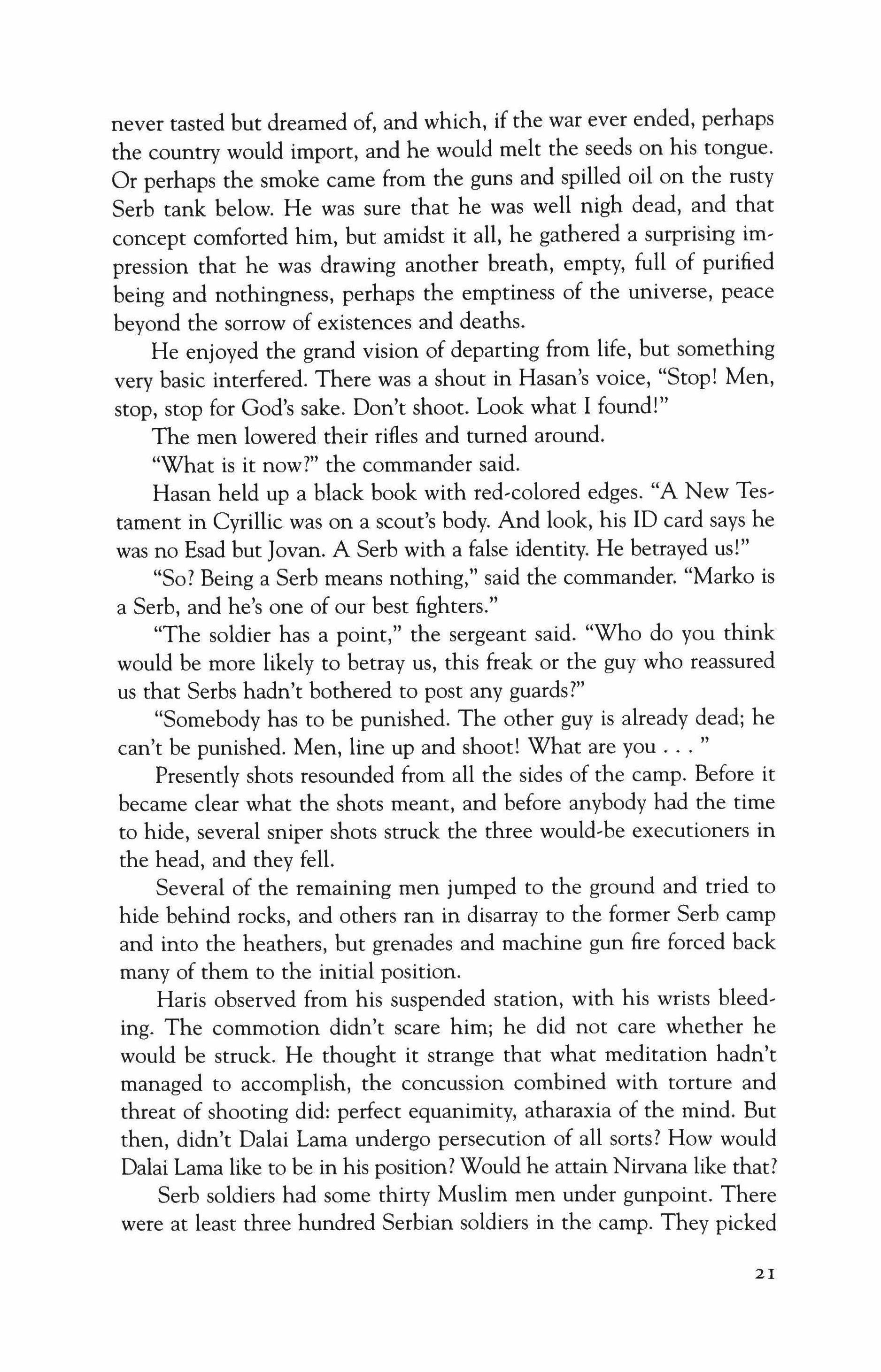
never tasted but dreamed of, and which, if the war ever ended, perhaps the country would import, and he would melt the seeds on his tongue. Or perhaps the smoke came from the guns and spilled oil on the rusty Serb tank below. He was sure that he was well nigh dead, and that concept comforted him, but amidst it all, he gathered a surprising impression that he was drawing another breath, empty, full of purified being and nothingness, perhaps the emptiness of the universe, peace beyond the sorrow of existences and deaths.
He enjoyed the grand vision of departing from life, but something very basic interfered. There was a shout in Hasan's voice, "Stop! Men, stop, stop for God's sake. Don't shoot. Look what 1 found!"
The men lowered their rifles and turned around.
"What is it now?" the commander said.
Hasan held up a black book with red-colored edges. "A New Testament in Cyrillic was on a scout's body. And look, his ID card says he was no Esad but [ovan. A Serb with a false identity. He betrayed us!"
"So? Being a Serb means nothing," said the commander. "Marko is a Serb, and he's one of our best fighters."
"The soldier has a point," the sergeant said. "Who do you think would be more likely to betray us, this freak or the guy who reassured us that Serbs hadn't bothered to post any guards?"
"Somebody has to be punished. The other guy is already dead; he can't be punished. Men, line up and shoot! What are you
Presently shots resounded from all the sides of the camp. Before it became clear what the shots meant, and before anybody had the time to hide, several sniper shots struck the three would-be executioners in the head, and they fell.
Several of the remaining men jumped to the ground and tried to hide behind rocks, and others ran in disarray to the former Serb camp and into the heathers, but grenades and machine gun fire forced back many of them to the initial position.
Haris observed from his suspended station, with his wrists bleeding. The commotion didn't scare him; he did not care whether he would be struck. He thought it strange that what meditation hadn't managed to accomplish, the concussion combined with torture and threat of shooting did: perfect equanimity, atharaxia of the mind. But then, didn't Dalai Lama undergo persecution of all sorts? How would Dalai Lama like to be in his position? Would he attain Nirvana like that?
Serb soldiers had some thirty Muslim men under gunpoint. There were at least three hundred Serbian soldiers in the camp. They picked
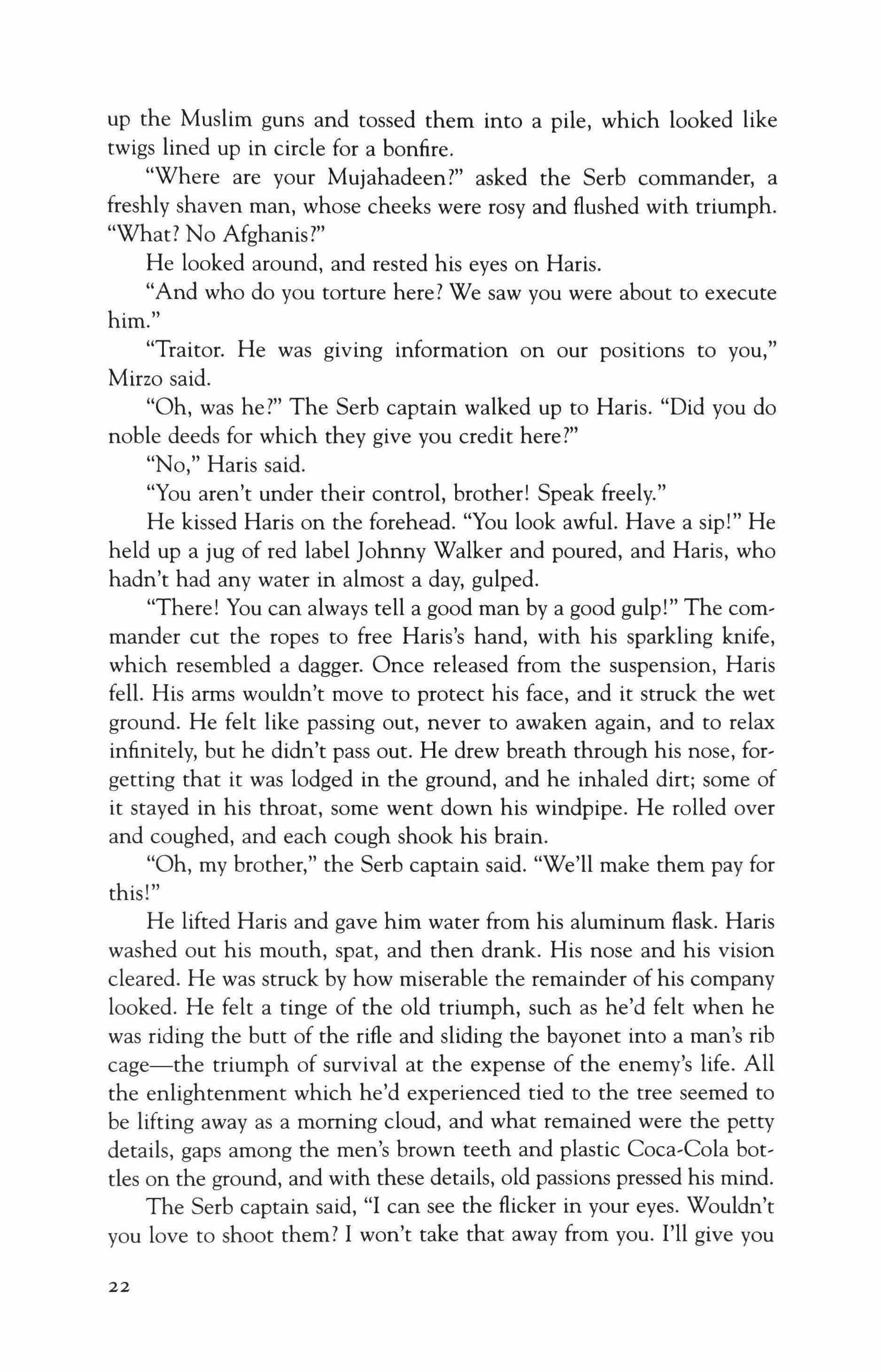
up the Muslim guns and tossed them into a pile, which looked like twigs lined up in circle for a bonfire.
"Where are your Mujahadeen?" asked the Serb commander, a freshly shaven man, whose cheeks were rosy and flushed with triumph. "What? No Afghanis?"
He looked around, and rested his eyes on Haris.
"And who do you torture here? We saw you were about to execute him."
"Traitor. He was giving information on our positions to you," Mirzo said.
"Oh, was he?" The Serb captain walked up to Haris. "Did you do noble deeds for which they give you credit here?"
"No," Haris said.
"You aren't under their control, brother! Speak freely."
He kissed Haris on the forehead. "You look awful. Have a sip!" He held up a jug of red label Johnny Walker and poured, and Haris, who hadn't had any water in almost a day, gulped.
"There! You can always tell a good man by a good gulp!" The com, mander cut the ropes to free Haris's hand, with his sparkling knife, which resembled a dagger. Once released from the suspension, Haris fell. His arms wouldn't move to protect his face, and it struck the wet ground. He felt like passing out, never to awaken again, and to relax infinitely, but he didn't pass out. He drew breath through his nose, for' getting that it was lodged in the ground, and he inhaled dirt; some of it stayed in his throat, some went down his windpipe. He rolled over and coughed, and each cough shook his brain.
"Oh, my brother," the Serb captain said. "We'll make them pay for this!"
He lifted Haris and gave him water from his aluminum flask. Haris washed out his mouth, spat, and then drank. His nose and his vision cleared. He was struck by how miserable the remainder of his company looked. He felt a tinge of the old triumph, such as he'd felt when he was riding the butt of the rifle and sliding the bayonet into a man's rib cage-the triumph of survival at the expense of the enemy's life. All the enlightenment which he'd experienced tied to the tree seemed to be lifting away as a morning cloud, and what remained were the petty details, gaps among the men's brown teeth and plastic Coca-Cola bot, ties on the ground, and with these details, old passions pressed his mind.
The Serb captain said, "I can see the flicker in your eyes. Wouldn't you love to shoot them? I won't take that away from you. I'll give you
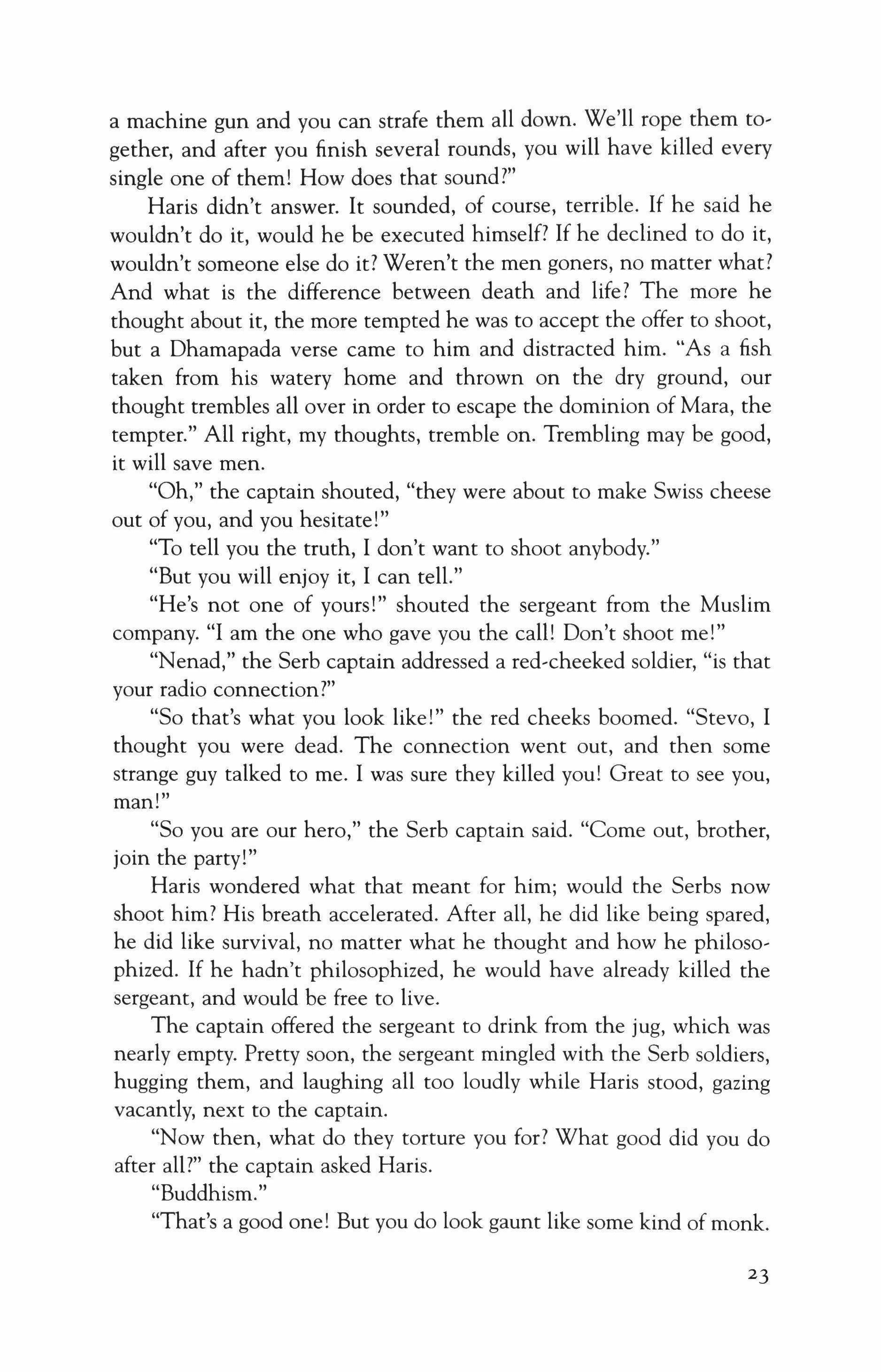
a machine gun and you can strafe them all down. We'll rope them together, and after you finish several rounds, you will have killed every single one of them! How does that sound?"
Haris didn't answer. It sounded, of course, terrible. If he said he wouldn't do it, would he be executed himself? If he declined to do it, wouldn't someone else do it? Weren't the men goners, no matter what? And what is the difference between death and life? The more he thought about it, the more tempted he was to accept the offer to shoot, but a Dhamapada verse came to him and distracted him. "As a fish taken from his watery home and thrown on the dry ground, our thought trembles all over in order to escape the dominion of Mara, the tempter." All right, my thoughts, tremble on. Trembling may be good, it will save men.
"Oh," the captain shouted, "they were about to make Swiss cheese out of you, and you hesitate!"
"To tell you the truth, I don't want to shoot anybody."
"But you will enjoy it, I can tell."
"He's not one of yours!" shouted the sergeant from the Muslim company. "I am the one who gave you the call! Don't shoot me!"
"Nenad," the Serb captain addressed a red-cheeked soldier, "is that your radio connection?"
"So that's what you look like!" the red cheeks boomed. "Stevo, I thought you were dead. The connection went out, and then some strange guy talked to me. I was sure they killed you! Great to see you, man!"
"So you are our hero," the Serb captain said. "Come out, brother, join the party!"
Haris wondered what that meant for him; would the Serbs now shoot him? His breath accelerated. After all, he did like being spared, he did like survival, no matter what he thought and how he philosophized. If he hadn't philosophized, he would have already killed the sergeant, and would be free to live.
The captain offered the sergeant to drink from the jug, which was nearly empty. Pretty soon, the sergeant mingled with the Serb soldiers, hugging them, and laughing all too loudly while Haris stood, gazing vacantly, next to the captain.
"Now then, what do they torture you for? What good did you do after all?" the captain asked Haris.
"Buddhism."
"That's a good one! But you do look gaunt like some kind of monk.
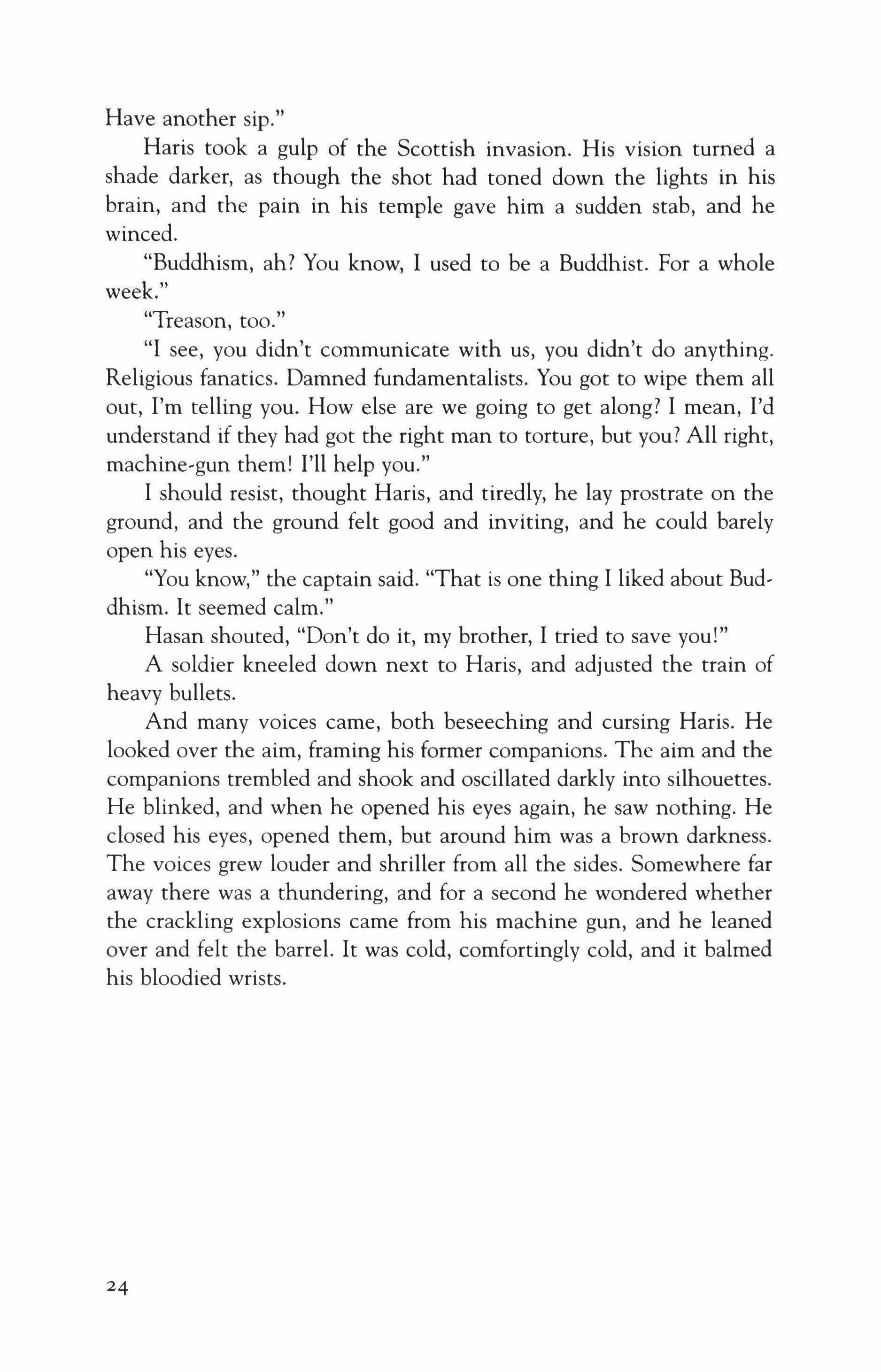
Have another sip."
Haris took a gulp of the Scottish invasion. His vision turned a shade darker, as though the shot had toned down the lights in his brain, and the pain in his temple gave him a sudden stab, and he winced.
"Buddhism, ah? You know, I used to be a Buddhist. For a whole week."
"Treason, too."
"I see, you didn't communicate with us, you didn't do anything. Religious fanatics. Damned fundamentalists. You got to wipe them all out, I'm telling you. How else are we going to get along? I mean, I'd understand if they had got the right man to torture, but you? All right, machine-gun them! I'll help you."
I should resist, thought Haris, and tiredly, he lay prostrate on the ground, and the ground felt good and inviting, and he could barely open his eyes.
"You know," the captain said. "That is one thing I liked about Buddhism. It seemed calm."
Hasan shouted, "Don't do it, my brother, I tried to save you!"
A soldier kneeled down next to Haris, and adjusted the train of heavy bullets.
And many voices came, both beseeching and cursing Haris. He looked over the aim, framing his former companions. The aim and the companions trembled and shook and oscillated darkly into silhouettes. He blinked, and when he opened his eyes again, he saw nothing. He closed his eyes, opened them, but around him was a brown darkness. The voices grew louder and shriller from all the sides. Somewhere far away there was a thundering, and for a second he wondered whether the crackling explosions came from his machine gun, and he leaned over and felt the barrel. It was cold, comfortingly cold, and it balmed his bloodied wrists.
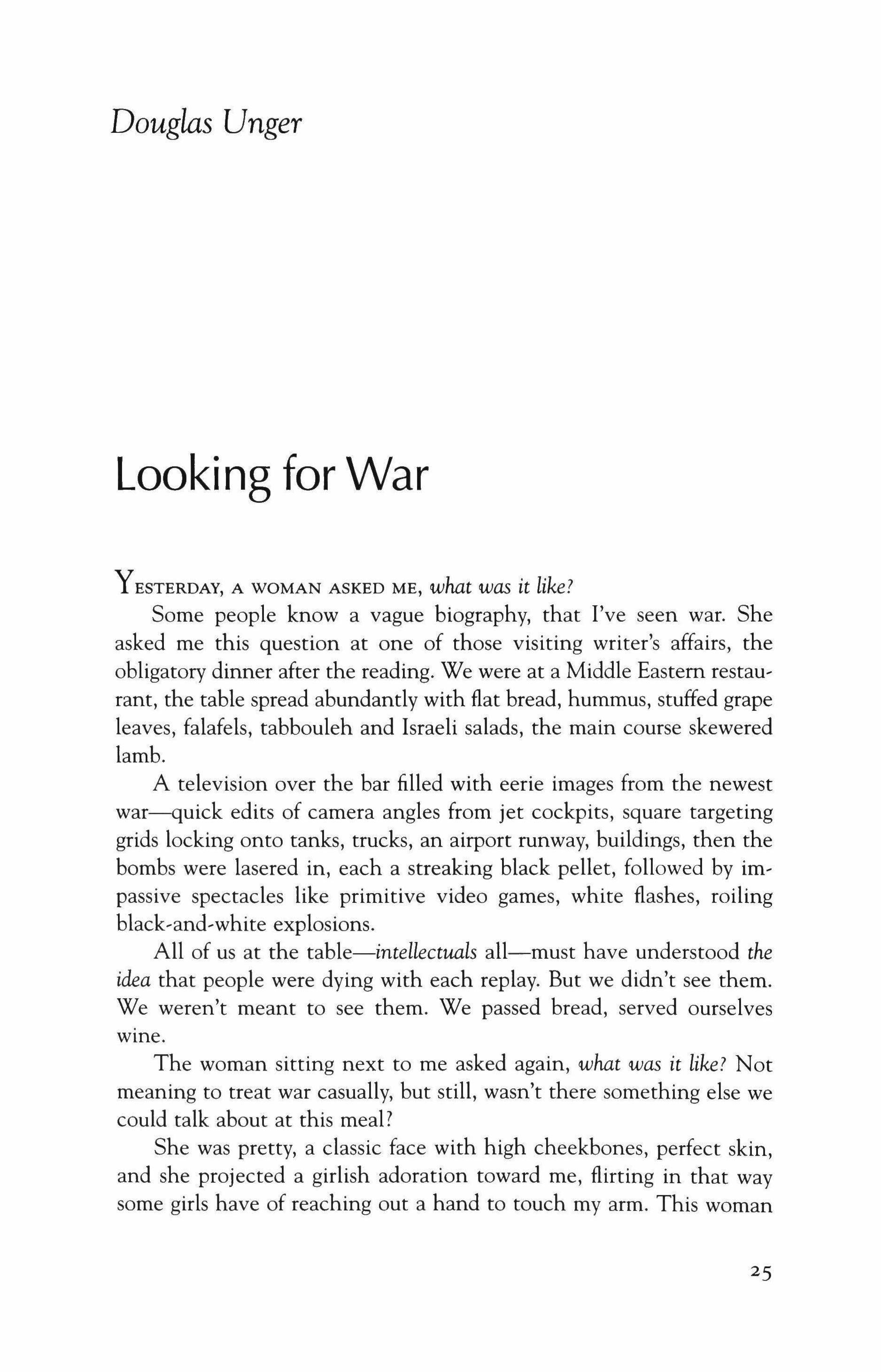
YESTERDAY, A WOMAN ASKED ME, what was it like?
Some people know a vague biography, that I've seen war. She asked me this question at one of those visiting writer's affairs, the obligatory dinner after the reading. We were at a Middle Eastern restaurant, the table spread abundantly with flat bread, hummus, stuffed grape leaves, falafels, tabbouleh and Israeli salads, the main course skewered lamb.
A television over the bar filled with eerie images from the newest war-quick edits of camera angles from jet cockpits, square targeting grids locking onto tanks, trucks, an airport runway, buildings, then the bombs were lasered in, each a streaking black pellet, followed by impassive spectacles like primitive video games, white flashes, roiling black-and-white explosions.
All of us at the table-intellectuals all-must have understood the idea that people were dying with each replay. But we didn't see them. We weren't meant to see them. We passed bread, served ourselves wine.
The woman sitting next to me asked again, what was it like? Not meaning to treat war casually, but still, wasn't there something else we could talk about at this meal?
She was pretty, a classic face with high cheekbones, perfect skin, and she projected a girlish adoration toward me, flirting in that way some girls have of reaching out a hand to touch my arm. This woman

was a professional dancer as well as a poet, and she looked it-she car' ried herself with that athletic self,consciousness of her body in space. I have to admit that I was starting to fall for her a little until she asked that question. She wanted to know, needed to feel it, if only from some' one who had seen. She tossed a neatly braided rope of red hair off her bare shoulder in an arrogantly flirtatious way. She leaned her dancer's body in closer and asked me again, someone not used to being denied, demanding this time, so what was it like?
What I didn't say-that my brother, Harry, lived with me now. He was a real veteran of war. War would always be with us in our house. She should by all rights be asking him not me. Harry had been living with me permanently since my divorce but on and off for years before that, since I had returned from a war in South America and got him out of the v.A. hospital, just signed him out, as simple as that, what they called an A.M.A.-against medical advice.
I'll never forget the happy feeling that winter morning, settling into seats on the train, that special heightened consciousness, that elation, we were still alive. It didn't matter so much to me that Harry was giggling to himself like the gentle madman he had become, his face pressed against a window, a finger drawing shapes of numbers in the fog his breath made on the glass then watching them disappear. We were two brothers braced against forward motion, me somehow expecting we could recapture our lives and live them differently. The air brakes of the train let loose, the car lurched ahead. The way our seats were facing, we were riding backwards into the city, and we've carried on like this, for years, looking behind us to the rest of our lives.
Year after year, in cycles, Harry started out living with me, at first in student apartments, later on in homes with my wife and daughter. We would make it OK together for a few months at least, until we got on each other's nerves. Then he would move out, try to make it on his own. We would set him up in apartments, in cheap rented rooms, on his disability checks. My wife or daughter would get him a cat so he might not be so alone. Always, after a few months of this, he would end up off his medication. He had different explanations-he was tired of feeling so downed out all the time, or the medication made him impotent and fuck it, man, he'd say, I just wanted to get laid.
None of this told the real story. The sadness he carries is like hands reaching into his insides, squeezing, the grief of war never far away. It recedes for a while, can almost be forgotten, but it always returns, sud, denly, like a seasonal flood. He turned his cats loose into the neigh,

borhood. And I would find him weeks later, homeless, out on the streets not so differently than the way we had lived sometimes when we were kids. Or a call came in from a social worker in some hospital psych ward in a distant city explaining that he had been brought in by the police, was being held for observation, a danger to himself and oth� ers. I would travel to wherever it was, sign him out. He would move back in with me again. This has been our cycle, years and years. We're brothers. We've always been each other's keepers. He was doing much better recently, as if leveling out, staying on his meds, his anti-psychotic pills, keeping to a daily routine like a religion. Mostly, he watches TV, old movies in black-and-white, endless reruns on cable, "Hawaii Five�O," "The Rockford Files," "The Dick Van Dyke Show," "Cheers," never tiring of seeing the same movies and episodes over again as if comforted by their repetition, lying half-sleeping on his couch. He does keep up with the news, which we watch together most evenings. In between, he walks two times a day to the stores, cooks his meals, vacuums the carpets, feeds the dog, keeps the lawn green. Sometimes, he picks up a harmonica and tinkers around. Nights, he retires to his room and scribbles in notebooks. He has two tall bookcases full of these spiral notebooks stacked one on top of the other. There must be at least five hundred of them, each an inch thick. Most of what he writes is scattered thinking, schizophrenic diaries, outlet for his psychosis, as the psychiatrist he pays for privatelyhe wants as little as possible to do with Y.A. doctors-calls them, incomprehensible scribbling but filled with phrases that jump up off the page with clear rationality when they can be deciphered from his enraged handwriting. He doesn't want me to read them. Examples from today, noted quickly by sneaking into his room: what they did to me these people they won't leave me alone this is all because of them the voices are real real is what they send me to see there must be more to civilization than mammals, insects wiU take over the earth the ones who really kiUed Kennedy these blue dots we'U have them kiUed we'U kiU them all no mercy bomb the shit out of them kiU them
And so on. My brother is reacting badly to the new war on TV. Even as he's trying to live in his own way a more or less regular life, he's suddenly drenched like by a thunderstorm. He's started leaping off his couch in jerky, compulsive energy bursts, throwing himself to the floor and doing pushups on the carpet-fingertip pushups-a thousand a day, I've counted, in sets of fifty. In between sets of pushups, he slams out the side door of our house, jogs down the block and around the
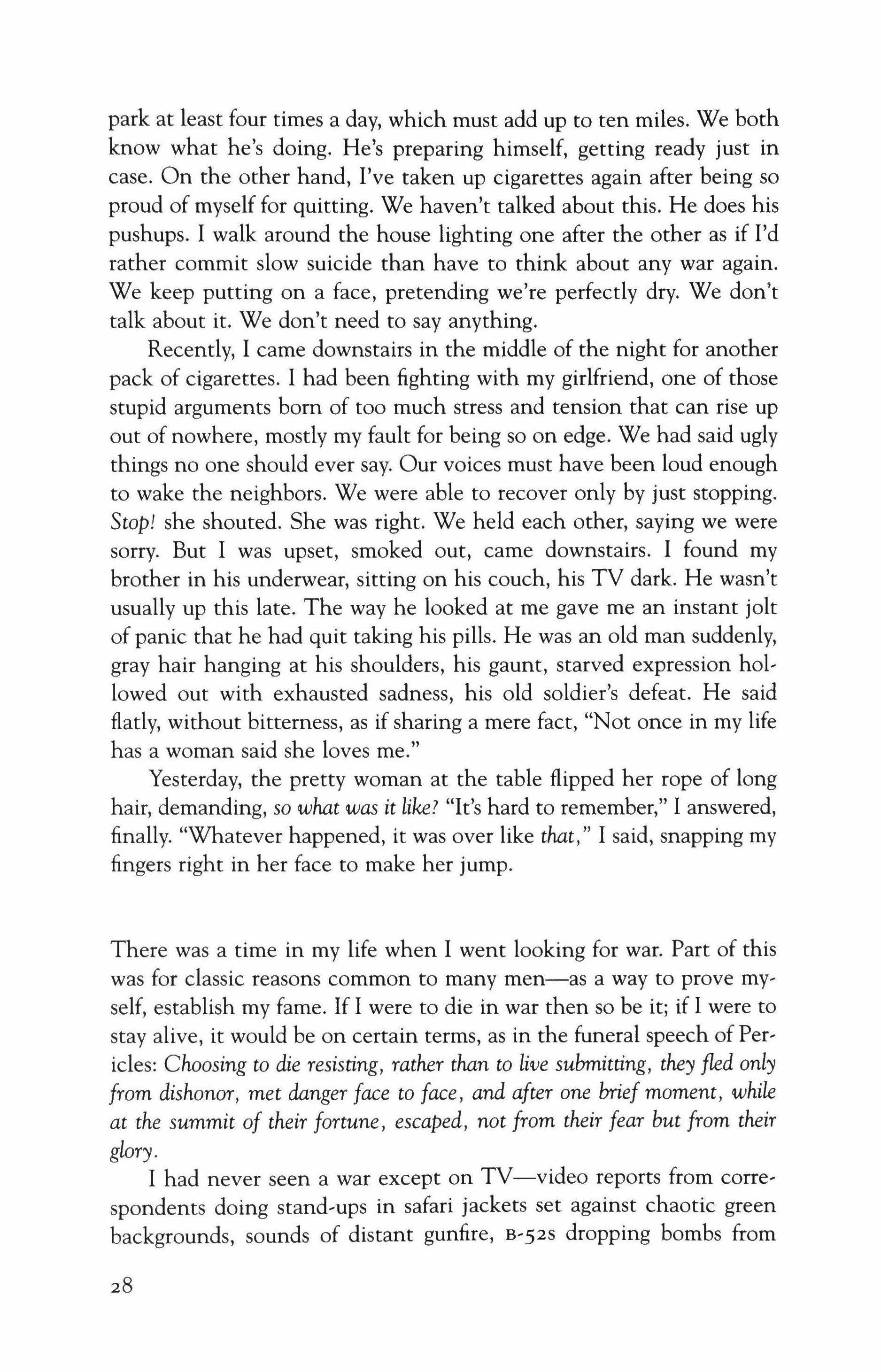
park at least four times a day, which must add up to ten miles. We both know what he's doing. He's preparing himself, getting ready just in case. On the other hand, I've taken up cigarettes again after being so proud of myself for quitting. We haven't talked about this. He does his pushups. I walk around the house lighting one after the other as if I'd rather commit slow suicide than have to think about any war again. We keep putting on a face, pretending we're perfectly dry. We don't talk about it. We don't need to say anything.
Recently, I came downstairs in the middle of the night for another pack of cigarettes. I had been fighting with my girlfriend, one of those stupid arguments born of too much stress and tension that can rise up out of nowhere, mostly my fault for being so on edge. We had said ugly things no one should ever say. Our voices must have been loud enough to wake the neighbors. We were able to recover only by just stopping. StoP! she shouted. She was right. We held each other, saying we were sorry. But I was upset, smoked out, came downstairs. I found my brother in his underwear, sitting on his couch, his TV dark. He wasn't usually up this late. The way he looked at me gave me an instant jolt of panic that he had quit taking his pills. He was an old man suddenly, gray hair hanging at his shoulders, his gaunt, starved expression hollowed out with exhausted sadness, his old soldier's defeat. He said flatly, without bitterness, as if sharing a mere fact, "Not once in my life has a woman said she loves me."
Yesterday, the pretty woman at the table flipped her rope of long hair, demanding, so what was it like? "It's hard to remember," I answered, finally. "Whatever happened, it was over like that," I said, snapping my fingers right in her face to make her jump.
There was a time in my life when I went looking for war. Part of this was for classic reasons common to many men-as a way to prove myself, establish my fame. If I were to die in war then so be it; if I were to stay alive, it would be on certain terms, as in the funeral speech of Pericles: Choosing to die resisting, rather than to live submitting, they fled only from dishonor, met danger face to face, and after one brief moment, while at the summit of their fortune, escaped, not from their fear but from their glory.
I had never seen a war except on TV-video reports from correspondents doing stand-ups in safari jackets set against chaotic green backgrounds, sounds of distant gunfire, B-52S dropping bombs from
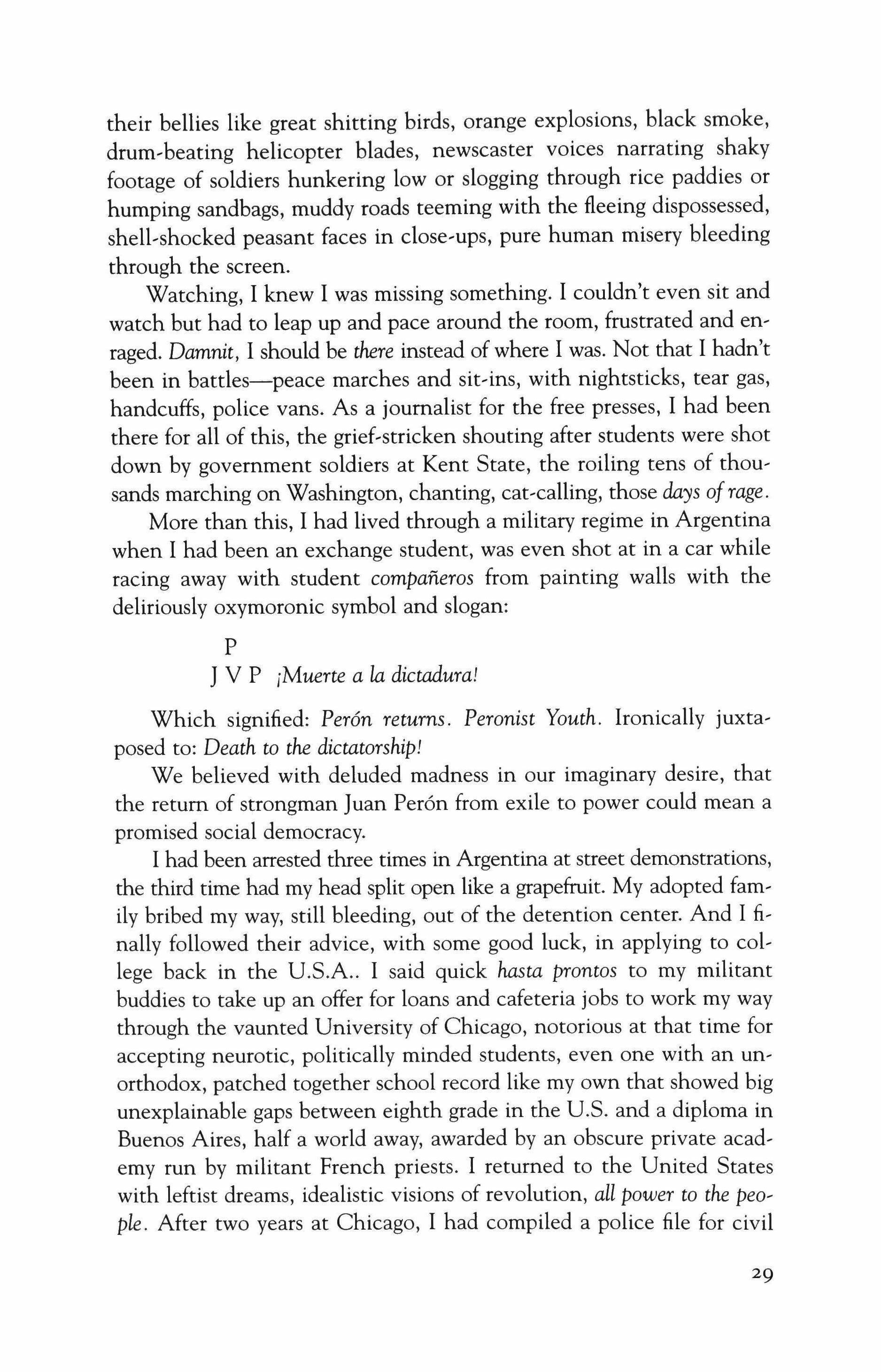
their bellies like great shirting birds, orange explosions, black smoke, drum-beating helicopter blades, newscaster voices narrating shaky footage of soldiers hunkering low or slogging through rice paddies or humping sandbags, muddy roads teeming with the fleeing dispossessed, shell-shocked peasant faces in close-ups, pure human misery bleeding through the screen.
Watching, I knew I was missing something. I couldn't even sit and watch but had to leap up and pace around the room, frustrated and en� raged. Damnit, I should be there instead of where I was. Not that I hadn't been in battles-peace marches and sit-ins, with nightsticks, tear gas, handcuffs, police vans. As a journalist for the free presses, I had been there for all of this, the grief-stricken shouting after students were shot down by government soldiers at Kent State, the roiling tens of thousands marching on Washington, chanting, cat-calling, those days of rage.
More than this, I had lived through a military regime in Argentina when I had been an exchange student, was even shot at in a car while racing away with student companeros from painting walls with the deliriously oxymoronic symbol and slogan:
P J V P jMuerte ala dictadura!Which signified: Peron returns. Peronist Youth. Ironically juxtaposed to: Death to the dictatorship!
We believed with deluded madness in our imaginary desire, that the return of strongman Juan Peron from exile to power could mean a promised social democracy.
I had been arrested three times in Argentina at street demonstrations, the third time had my head split open like a grapefruit. My adopted family bribed my way, still bleeding, out of the detention center. And I finally followed their advice, with some good luck, in applying to college back in the U.S.A.. I said quick hasta prontos to my militant buddies to take up an offer for loans and cafeteria jobs to work my way through the vaunted University of Chicago, notorious at that time for accepting neurotic, politically minded students, even one with an unorthodox, patched together school record like my own that showed big unexplainable gaps between eighth grade in the U.S. and a diploma in Buenos Aires, half a world away, awarded by an obscure private academy run by militant French priests. I returned to the United States with leftist dreams, idealistic visions of revolution, all power to the people. After two years at Chicago, I had compiled a police file for civil

disruption two-inches thick, along with a clippings portfolio from the free presses about half that thickness filled with articles carrying my by-line or written under a pseudonym. This was the Nixon era of harassment of the press and quasi-fascist dirty tricks. Some of my journalist colleagues claimed to have had their phones tapped, their mail stolen, their apartments broken into, their research and notes mysteriously vanishing. Many of us agreed to use the same pseudonym as a protest, "Frank Malbranche," for our most anti-government stories. Under my own name, I had placed several free-lance photos with UPI, United Press International, that now-ruined, once-major wire service. My best photos were of anti-war demonstrations, battles in the streets. A few had been published in newspapers all over the globe.
So I thought I was going places in journalism, my college grades were high, but this wasn't enough. My slow conclusion was that I had to fight back from the inside, make the ultimate sacrifice, get my head shaved. I became obsessed with the idea of enlisting, fantasized about secretly slipping my fellow grunts in basic copies of "The Daily Worker" and preaching to buck privates the Marxist ideology direct from the streets of the Movement that all private property is theft, explaining that, though I was a committed Socialist against the war, I could no longer buy into the bourgeois elitism of college deferments while the working class and repressed minorities did most of the fighting and dying. From the bunkers, I would write articles for the free presses that subverted the system from within. Then suddenly, that war was all but over. The United States had lost. What would sacrificing myself for that ever prove?
And there was my brother Harry. He had been sent over there, drafted in a sense but not really, since a judge gave him the choice to volunteer or go directly to prison after a bust for marijuana possession, so he enlisted. He came back from Vietnam after seven months of his combat tour to spend the next two years in hospitals-first good Army facilities, in Japan, in Denver, then he was discharged and dumped off like a sack of trash into the callow neglect of the V.A. institutions. They shipped him out straight into the Psycho Corps-our troops in gray pajamas, tens of thousands of them like a jittering, babbling voodoo army wandering hallways and grounds, rubber slippers and filthy smocks like uniforms, this new branch of the disarmed services composed of post-Vietnam crazies it was dawning on me Harry might be serving in to the end of his days.

We sat together on splintery benches on the campus of the crumbling v.A. hospital in Northport, Long Island. I would take the train out there then walk. It was two miles from the railroad station through the quaint town like something out of a Norman Rockwell painting then up a hill on a road lined with sugar maple trees to that collection of run-down, red brick buildings with roofs of busted shingles, ragged grounds messy with rotting leaves. I would sign in at the desk of my brother's ward. All the nurses came from somewhere else, Asian countries, mostly, the Philippines or Korea or Indonesia. They spoke mainly broken English. A lot of the inmates suffered from the delusion they had been captured by gooks and were prisoners of war. I never spoke to Harry's doctor-not even sure he had a doctor-but the ward nurse always said his condition was unchanged. His diagnosis: schizophrenic reaction to wartime stress.
I would get a pass to take Harry out for some air. We weren't supposed to leave the grounds. He would be waiting for me in the day room, slumping in a battered folding chair in front of a TV where the picture was always snowy or rolling. Nobody cared. My brother was a starved-looking version of his former self, broomstick arms hanging out his gray tie-back hospital smock with trails of food and juice stains down the front. His feet barely shuffled along, his Thorazine stagger. \ Drug side-effects kept his hands cramped up, fingers curled like blunted talons. They had left his fingernails to grow out, long and filthy. His hair was unwashed, uncombed, sticking out every which way in a wild growth. His blue rubber slippers were peppered with cigarette burns. No amount of my complaint forms or angry confrontations with V. A. staff made any difference to change this negligent treatment, this lack of any care. This was America, after all. This was a wounded warrior's reward. We sat together mostly in silence under the unkempt trees. We passed a joint. In those days, staffers at the v.A.s quietly recommended marijuana for the post-traumatic effects of war. It kept the patients more subdued. The inmates from Vietnam stayed as stoned as possible most of the time, not that an uninformed observer would have noticed much difference.
What Harry had been through, I mostly didn't know. He had served as a door gunner on a helicopter in the Asha Valley. He had volunteered for combat duty, something that made me envious, disgusted, and proud all at once. There had been a severe shortage of door gunners during that brutal campaign. All I had managed to put together
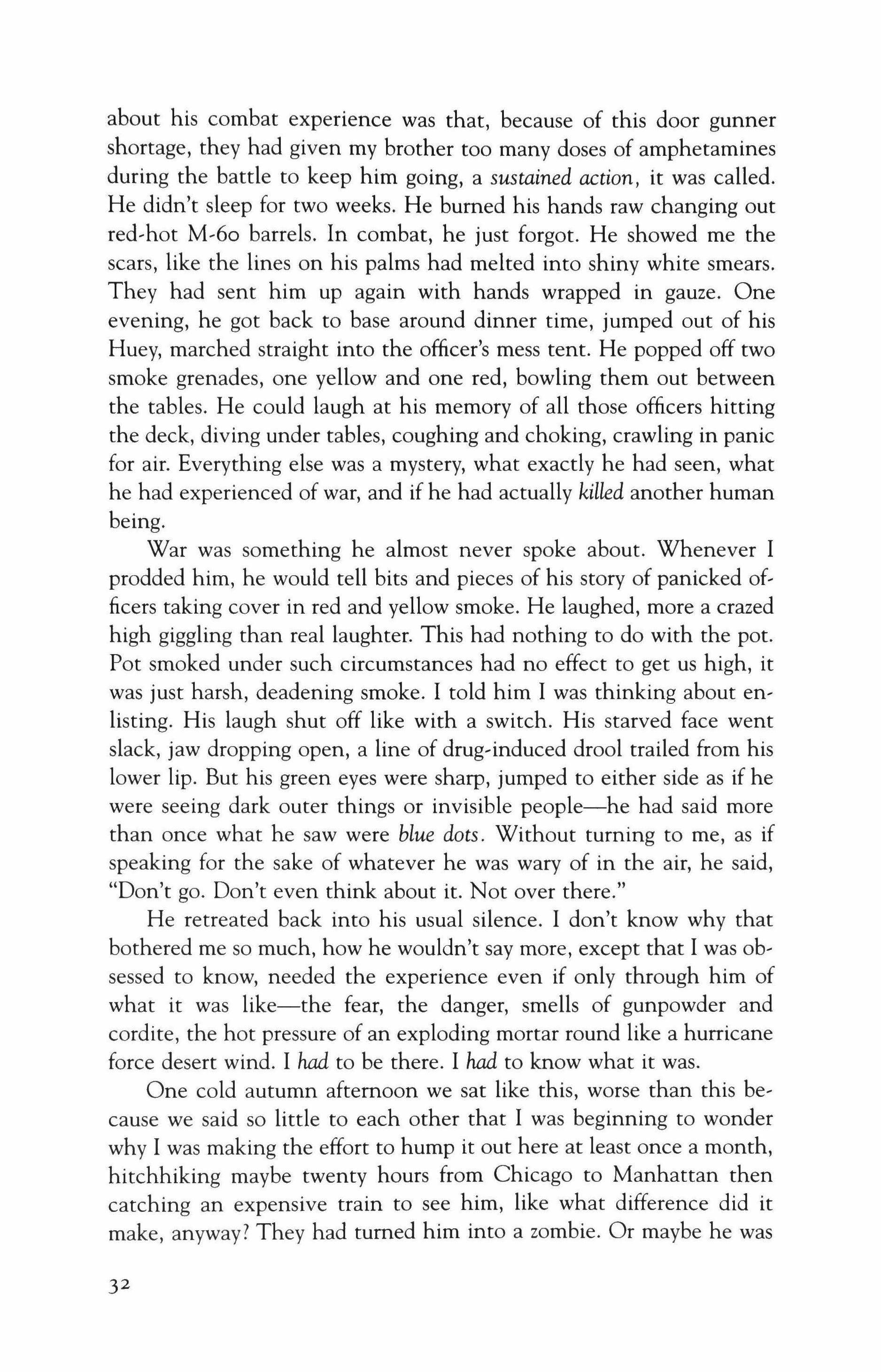
about his combat experience was that, because of this door gunner shortage, they had given my brother too many doses of amphetamines during the battle to keep him going, a sustained action, it was called. He didn't sleep for two weeks. He burned his hands raw changing out red-hot M-6o barrels. In combat, he just forgot. He showed me the scars, like the lines on his palms had melted into shiny white smears. They had sent him up again with hands wrapped in gauze. One evening, he got back to base around dinner time, jumped out of his Huey, marched straight into the officer's mess tent. He popped off two smoke grenades, one yellow and one red, bowling them out between the tables. He could laugh at his memory of all those officers hitting the deck, diving under tables, coughing and choking, crawling in panic for air. Everything else was a mystery, what exactly he had seen, what he had experienced of war, and if he had actually killed another human being.
War was something he almost never spoke about. Whenever I prodded him, he would tell bits and pieces of his story of panicked officers taking cover in red and yellow smoke. He laughed, more a crazed high giggling than real laughter. This had nothing to do with the pot. Pot smoked under such circumstances had no effect to get us high, it was just harsh, deadening smoke. I told him I was thinking about enlisting. His laugh shut off like with a switch. His starved face went slack, jaw dropping open, a line of drug-induced drool trailed from his lower lip. But his green eyes were sharp, jumped to either side as if he were seeing dark outer things or invisible people-he had said more than once what he saw were blue dots. Without turning to me, as if speaking for the sake of whatever he was wary of in the air, he said, "Don't go. Don't even think about it. Not over there."
He retreated back into his usual silence. I don't know why that bothered me so much, how he wouldn't say more, except that I was obsessed to know, needed the experience even if only through him of what it was like-the fear, the danger, smells of gunpowder and cordite, the hot pressure of an exploding mortar round like a hurricane force desert wind. I had to be there. I had to know what it was.
One cold autumn afternoon we sat like this, worse than this because we said so little to each other that I was beginning to wonder why I was making the effort to hump it out here at least once a month, hitchhiking maybe twenty hours from Chicago to Manhattan then catching an expensive train to see him, like what difference did it make, anyway? They had turned him into a zombie. Or maybe he was

holding out on me intentionally, after all we had been through to' gether. We had spent three years, on and off, taking care of each other as homeless kids, had slept in hippie crash pads, cheap hotels, even in a cardboard box, had rebounded home, such as it was, then suffered and run away again, in cycles, from the torment and physical abuse of our parents. There was a time when we had kept each other alive. And it was like a violation of brotherhood to think he was holding out on me now, consumed by my self-pitying feelings of loneliness and betrayal, that sense of broken trust hitting like quick cold stomach cramps so I actually sat leaning over, arms wrapped around my middle. Or I would have to stand up off the bench and pace around in aimless circles, kicking at the wet rotting leaves, holding back shouts of rage.
I decided then and there I would go find my own war. There were plenty of wars out there, damnit, I was going to find one. No matter that I was only a year away from a college degree-one of those Great Books general studies programs heavy with literature, foreign languages, the Greeks-doing more than OK by any outward standards, especially considering what we had come from. Still, my life felt point, less, filled with days one knows are forgettable, books and lectures blur' ring into meaningless phrases, empty words one would never recall. I just couldn't let it all pass me by.
On my return to Chicago, I readied myself, working out in the gym, running laps, processing paperwork for a leave of absence for next quarter while at the same time defrauding banks by taking out new col, lege loans. I was going off to war. It would have to be a war no one knew much about. That way, I could write free press stories and take photographs. Maybe I could pull off a good enough article to sell to a major magazine. Why not? In the right kind of war, hell, I might even make my reputation.
So it came to pass that I found myself trudging through undergrowth in a dense artificial forest, on my way to a war-artificial because we were moving through some kind of immense Argentine tree farm recently purchased by the multinational wood products subsidiary of Shell Oil Renewables South America, that oil company as ubiquitous as any ancient god. The trees had been planted there two decades ago, a test forest seeking to discover some balance of commercial and native species that might also sustain wildlife. The test forest had been declared a failure, sold out to Shell, scheduled for clear cutting and re-

placement planting with a monoculture consisting of genetically rna' nipulated pines.
My guide, a Guarani Indian companero in the militancy named Sikfn, was explaining this to me in melodious, breathy commentary as I followed his sweated,through, coarse peasant shirt back through showering twigs, leaves, bits of branches flying up from his whacking machete blade, steel scraping and ringing with each rhythmic stroke, clearing bamboo-like undergrowth from an old log skidder trail in a jungle he spoke of with apologetic sadness, as though he blamed him' self, as if it were his own failed garden. He slashed along ahead of me, lamenting the disappearance of the trebol tree with its medicinal bark, the scarcity of white quebrachos and incense trees. Rolling off his tongue and up through his nose in sing-song tones were Guarani names for other trees-kurupa'yra, tagyhu, peterevey, yvyaraneti, urunde'ymi-trees which used to grow abundantly in the region, meaning, less to me except for the musical sound of their names. Animal species were vanishing, the oso hormiguero grande-the anteater bear-the gray fox, two kinds of exotic peccaries, and the tatu carreta, which I understood to be a kind of armadillo as big as a wheelbarrow. The beloved jungle of his childhood used to be filled with colorful birds, rare green parrots, gorgeous blue and gold macaws. Patrolling helicopters of the armed forces of Paraguay and Argentina-Bell Helicopter Hueys part of zmn-Communisr aid from the United States-the thump, ing noise and turbulent winds of their blades beating low just over the treetops caused parrots and macaws to drop dead out of their nests from fright. The ones that didn't drop dead abandoned their nests and flew off, never to be seen again. The forest we were slashing through seemed empty of birds. Sikfn was a walking encyclopedia of jungle fauna and flora on the way to extinction. I was getting the idea that his war wasn't as much with enemy troops across the border, on the other side of the rivers, as with the forces of economic development despoiling the whole immense Parana and Amazonian riparian zones, seeking to turn his patria GuaranI-his tribal Fatherland, as he called it with a nostalgia that already predicted its defeat-into one incalculably huge and profitable agribusiness plantation. What I didn't tell him was that I believed, as Borges, that nadie es la patria-no one is a patria. By extension nor could be any tribe of men. But I disagreed with Borges that men should nevertheless aspire to be worthy of such patriotic oaths. How could anyone claim to be fighting for a Socialist vision of the International and still speak that

hateful word, no less than a proverbial curse on all mankind, patria? Fatherland, with its flag-waving, fascist connotations. I didn't say anything. Sikin was the contact given to me through friends of friends, as is the way of so much journalism, to guide me to a revolution.
The revolution now had a human face, fine featured like most Guarani, disarmingly not very traditionally American Indian looking but more similar, say, to faces of southern Italian peoples, without the Roman nose, his skin a coffee-with-cream brown. He had a tall muscular body he carried erect with held-in dignity, as if powered by his awareness of centuries of struggle by his people, his persistent resignation to carryon the fight, as he kept saying, like he had been born with it as a duty, the fight for my people.
Listening to Sikin, I could be filled with the power of his belief, that this was a war for liberation. The way he spoke such inspiring platitudes, one bum-scarred white lid, naked of eyelashes lowering halfway over a wandering milky eye-an injury from his youth, trying to make a pipe bomb that had exploded on him-he took on a harsh but seductive look, especially when he had a few drinks in him. That eye suddenly fastened on something, on some enemy he could see in memory or in the air, the scarred lid lowering over it, giving him the hard, cold look of an experienced killer, a warrior's capacity to size up any man as if already drawing a machete with murderous intimacy across his throat. I had seen this look before, in street thieves, in gang kids who carried guns in New York, mostly when they were paranoid and crazy on meth highs. There were a lot of men with that look along this riverfront, in bars filled with scarred, ragged characters, smugglers, the rnensu, the contract laborers at the edge of homicidal drunks, fresh from logging camps or plantations up the rivers. The Parana region where three countries meet is legendary for its frontier roughness.
The only name I knew him by was that one name, Sikin. He had a Spanish name, Juan or Jose Marfa or Fernando, but he refused to use it, insisting on his name in Guarani. Like most children of indio exiles, Sikin had learned from his parents the sing-song language of Guarani, their patriotic vision of Paraguay as expressed in a lyric tradition called ocara poty-jungle flowers-the sentimental nationalism in songs and mythic incantations that many of the leaders of the resistance movements could recite from memory and which, from what I could comprehend, envisioned Paraguay, despite its bloody history, as some perpetual Eden blessed with an abundance of innocence and bananas.
The day before, we rode hour after hour in his pickup, out through

the scrubby brown grass plains of the chaco, where the cows looked like racks of bones covered by sun,burnt hides. We bucked our way off on a system of rutted dirt roads through mud hut and tin,roofed cinderblock villages filled with scattering chickens and barefoot, big eyed indio children who chased after us with shouts of glee, dark mothers staring out darker doorways, then we were off again on the rough roads. Here and there, as we passed, small flocks of Nanduces-Rhea ostriches-would leap up out of tall grass, fleeing in gangly comic dances on stick,like legs into groves of thorny trees.
I wasn't paying much attention to landscape. From time to time, I lifted my camera and took a few miserly shots, conserving film. I was thinking about what lay ahead, that if I could just pass their tests, get on the good side of the guerrilleros) they might take me with them deep into the jungles to see, close-up, exactly what I was looking for.
Not that there wasn't some good talk to pass the hours, and going over with Sikfn my rudimentary Guarani, a language whose high nasal vowels and frequent gutturals I could barely get my mouth around. Guarani has a syntactic structure similar to Japanese and some Polynesian languages. The subject comes first, the verb at the end. Tone alters everything. There are nasal vowels, like high humming notes through a tenor kazoo, and guttural sounds, like a whispered gargling. Intoned either way, these sounds completely change the meaning of words. I kept referring to a book I carried in my bag-it was later de, stroyed-the hardcover edition of EI Idioma Guarani; gramdtica y an, tologia de prosa y verso, by a Jesuit priest whose name I can't recall. In the bucking pickup truck, I flipped to a list of phrases in Guarani with Spanish translations which were comprehensible only by knowing certain juxtapositions. The specific often acts as the generic in Guarani, one idea stands for similar ideas. Saying a thing often also signifies something else as well as itself-the wing of the bird standing for half of the distance to somewhere, or the justice of God was a phrase widely used for medicinal fruits-which I understood to be like Shakespeare or Homer using a thousand sail for a thousand ships) only it was far more complex than that, more deeply encoded than any European language ever imagined being. I had been listening to the language for days in the riverfront bars, and when Sikin spoke it with contacts. It seemed to me not so much a spoken language as a kind of singing filled with high reverberating hums and low airy tones, a music like indigenous wooden flutes. Guarani phrases kept slipping and sliding over each other fluidly, like mixing river currents, in an endless substitution, an

infinitely recycling metonymy. As we rode along, Sikin listened patiently to me butchering phrases from the book. "It's really easy to learn Guarani," he teased. "All you have to do is be born here, speak it about thirty years and you know it perfectly."
Guarani is more complicated than its difficulty with nasals, gut, turals and juxtapositions. Though most verbs are made up of two syllables, many can be almost infinitely agglutinated to make contextually precise conjugations. The verb to clean-I was taught this when we stopped for a supper of rice and boiled beef in a spicy sauce, served on a plank table, in lantern,light, by a lonely country store owner's wife, who kept giving Sikfn flirtatious sneers like a challenge, demanding a response as she cleared our plates---could be made into a nine syllable conjugation, a single word intoned through the nose, meaning, did you clean it all up yet? Guarani is a language with a limited vocabulary but with almost infinite precise ways to conjugate verbs for any specific sit, uation. Sikfn's good eye was directed at the wife as she bent over a red plastic tub, giving her hip a little haughty kick each time she wiped a plate pulled out of the soapy water. She was plump as a guayaba fruit, especially in her hips, shaped like a pear, but she had a pretty face, puffing her cheeks like a blowfish then letting short haughty laughs out between her fleshy lips. Blue flies buzzed our plates. She stood over us, waving them off, her pure heat a warm homey perfume like rising bread. She was alone, as were so many Guarani women, her husband off for months on contract labor, or across the river to the war. Sikfn got us all going on the verb to love, like a game-jahohayhu, the specific verb in Guarani for love between human beings.
Sikin hoisted the woman's runny'nosed children up onto his lap, showing them off as if they were his own. In his Guayaki-Guaranf dialect, he said there was a way to add syllables to the verb which con' veyed love for a daughter before she reached puberty, a different sound when she becomes a woman, another when she marries. He set the lit, tle girl down and lifted up the little boy, making the conjugation of the verb for the love of a father for his young son, another for when the son reaches manhood. The kid looked at me with owl eyes, holding out his shredded chewed stub of raw sugar cane, inviting me to share. For man and woman, there were ways to say I love you for both before and after making love. Sikfn repeated these verb phrases heavy with implications, directed at the store owner's wife, and I thought I could see her fleshy legs tum red from her skirt down to the walked over heels of her rope soled shoes. Verbs in Guarani are present tense-as if

now is what really matters--when something happens indicated by a simple framing word if needed, as in yesterday, we love, last week, we love, a year ago, we love, tomorrow, we love. Sikfn went down the list, making me repeat after him, as the woman served us glasses of aguardi� ente-cane liquor. What I thought I was sure of out of this game was that, as it would have been said in good Guarani, tonight Sik{n and the woman love. But he made it clear after our drink, no, we had another hour of driving before sleeping. He left money on the table. Calling her compafiera, accepting her regretful clinging embraces, her wet kisses on our cheeks, we said goodnight. We escaped into the darkness.
We spent the night in an empty Shell company storage shed at the edge of the tree farm. Sikin hung two hammocks that smelled of motor oil by low hooks in the mud walls of the hut. We swung into them, our bodies just barely clearing the dirt floor. Sikfn took off his boots, rolled to his side. He instantly fell asleep with an easy breathing. I lay awake. This was the first time I had ever tried sleeping in a hammock, and, closing my eyes, it was a strange feeling, like being hung out over some immense space. With every swing, my body started up as if trying to catch itself from falling. Cockroaches the size of sparrows buzzed through the air. A spider as big as the spread fingers of my hand hung in a web in one comer of the tin roof, darkly visible in a crack of moonlight. None of this bothered me. I was all impatience and anticipation for what might happen in the morning. And, after all, I had spent nights in far worse places. I found the bottle of scotch in my bag, drank some, then finally fell asleep.
Before dawn, Sikfn was ready by the truck, sipping mate tea through a nickel straw from a gourd. I joined him, the warm bitter tea soothing, as stimulating as coffee.
We readied our bags. I checked to make sure my camera was on top, loaded, lenses within easy reach. Sikfn opened the glove compartment of the truck and I saw him slip a big black pistol with extra clips into his bag. I hadn't known it was there. I swallowed, dry in the mouth, reminded of where we were going, what I was looking for.
Sikin said we should get moving before the sun got too hot, we would be on foot now until we reached the river. I tried to joke with him, saying how it wouldn't be as hot as what he'd missed last night. Last night, he seemed to enjoy my allusions to what could have happened. Not this morning. "Too many men end up face down in the river," he said. "In any case, I'm married."

This surprised me, his first reference that he had a wife. I had as' sumed he had no family. I'd have asked more, but something in the way that milky eye fixed on me made it clear he regretted letting me know even this much about his family, as if letting people know too much could get them killed.
We started off through the jungle, that failed tree farm, that artificial forest. He pulled out his machete. He started slashing the way ahead of us, through bamboo,like undergrowth. We set off down the old log skidder trail. He began to list the musical indio names of trees, telling me about his jungle as if he were ashamed, as if it were his own failed garden. He lamented the loss of the animals, the birds, the scarcity of certain trees, white quebrachos and incense trees, especially the trebol, gone nearly extinct. He turned to me with a bitter laugh. He began singing a string of syllables in a verb phrase in his GuayakiGuarani dialect. All I could make out were the root sounds of the verb to love. As best as I could comprehend, it signified, I love you, my mid, dle,aged wife, medicine gathering at the trebol tree.
Sikfn repeated this long gurgling brook of a verb phrase several times as we worked our way through the bush. Slowly, his point sank in. For his people, the extinction of a tree meant wiping out forever one way to express love.
Not that I paid so much attention to this at the time. I didn't say that I didn't care much for Sikfn's jungle, its trees, its animals. Every, thing in it seemed poisonous, a hassle, full of thorns. Just being out in nature like this caused in me a terrible and irresistible compulsion to start chain,smoking. My head felt like it was packed with hot, dirty wash cloths. My stomach fluttered with bouts of nausea from anti, malaria pills. It was tough to breathe in the wet tropical atmosphere less oxygen than superheated steam. It was hard to see with sweat drip, ping into my eyes in the green half-darkness of the overhanging trees. In about ten minutes, I was hardly able to focus on anything more than taking just one more step, one more breath, one more step. And so we moved on through the jungle.
My right boot slipped in something gooey. A sickening stench billowed up like a sweet spray of rotten fish. A little involuntary shout of disgust escaped me. I stopped, kicking, trying to shake a clinging, drip, ping glob of stuff off my boot.
Sikin turned, pushed back his straw hat. Ay,ha-he let loose this strange sound, half laughter, half an expression of surprise. His wan'

dering milky eye rolled independently of the other with a wary glance at my boot. In his slow, lilting indio Spanish, he said, "Old nest of zacaruyu snakes."
I froze. I understood I'd stepped into a small sink-hole of eggs with numerous decayed, half-born hatchlings. I didn't have the chance or breath to ask follow-ups like what kind of snakes? Were the snakes venomous? Sikfn gestured with his machete and said, "Many snakes in the trees," then he signaled urgently we should press on ahead. That was right on with me. We started to do this, with me looking only at my boots, ready for snakes.
Something hard cracked me dead center on the forehead.
Owww-my eyes shut in a reactive squint. More things began raining down, rock-like, green, spiny hard fruits like horse chestnuts, a bombardment of them pelting us from all directions. We both ducked instinctively and covered our heads. Sikfn's good eye looked up with a surprised fear and I was also afraid. Leaves jumped around in chaos. The red jungle earth was hopping with these rock-like things-like green apricots with tough ridges-but most of them bouncing around only after they hit our bodies. They felt like a flurry of small left hooks punching into my back and ribs.
We heard them then, barking, ooking, one or two deep-throated, male-dominant screams. I pulled a forearm from in front of my eyes and saw quick movements, black-brown leaping creatures the size of cats high in the trees. Far up, in twos and threes, they swung down, hanging by their prehensile tails, fuzzy brown arms winging the green missiles with perfect aim, whizzz�bap! Right on the nose if I hadn't lifted my arms to block them. Monkeys?
The few breaks of sky between high branches were black with their movements, diving and swooping like some horrifying flock of huge wingless bats. Common Tufted or Brown Capuchin monkeys-the kind often domesticated and turned into cute little organ-grinder monkeys in crackerjack hats begging for tips-Cebus apella have rarely been known to gather in troops of more than ten to fifteen. But I swear there were hundreds of them up there that day, everywhere flying around in fantastic acrobatic shows from branch to branch through the trees. They were nasty, white fangs flashing, like rabid dogs, barking, snarling, crying out in gleeful screams, giving it everything they had in an outraged, coordinated attack to drive two puny human invaders off their turf.
All of a sudden, this incredible number of green rock seeds came
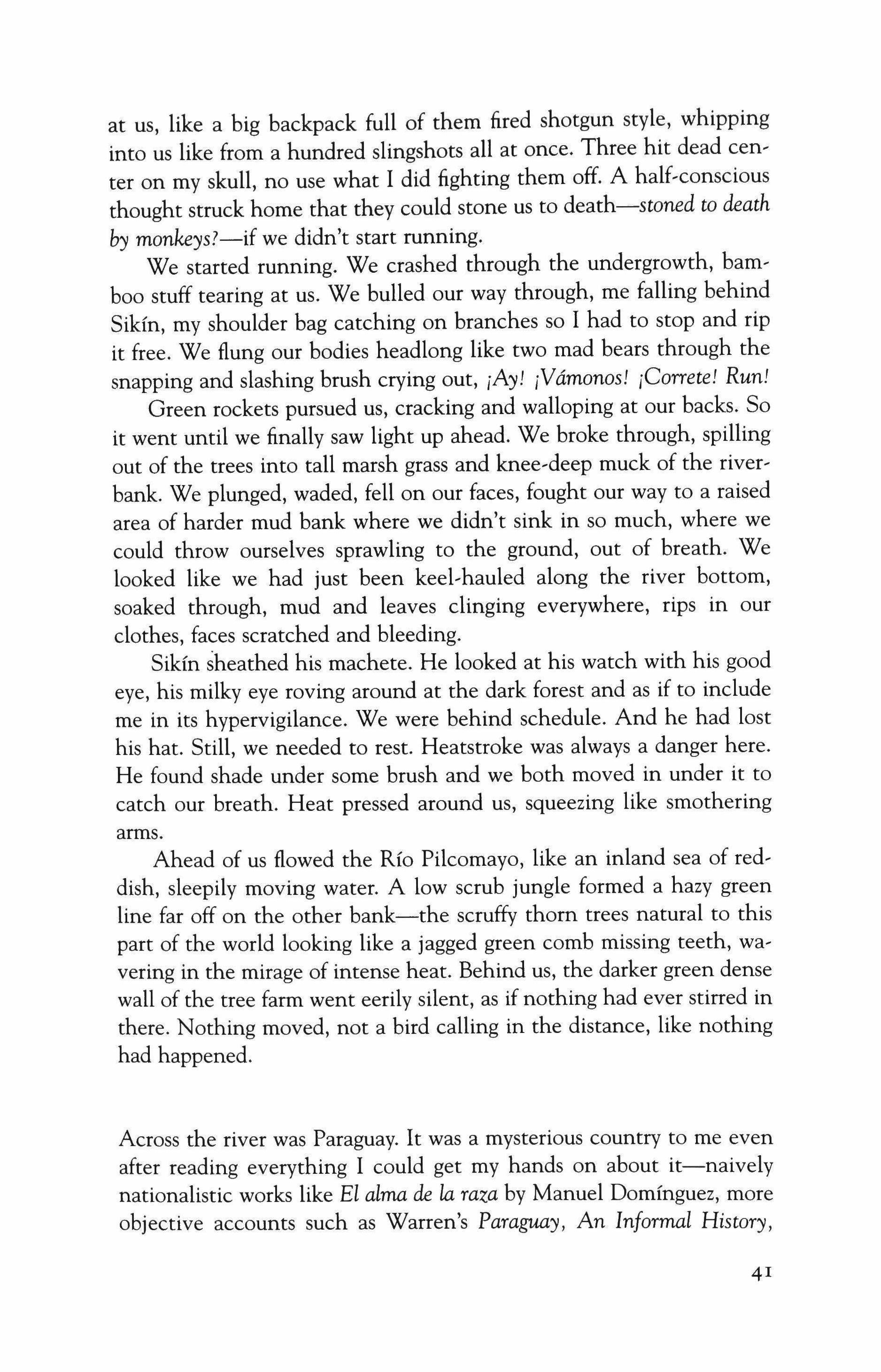
at us, like a big backpack full of them fired shotgun style, whipping into us like from a hundred slingshots all at once. Three hit dead center on my skull, no use what I did fighting them off. A half-conscious thought struck home that they could stone us to death-stoned to death by monkeys?-if we didn't start running.
We started running. We crashed through the undergrowth, barnboo stuff tearing at us. We bulled our way through, me falling behind Sikfn, my shoulder bag catching on branches so I had to stop and rip it free. We flung our bodies headlong like two mad bears through the snapping and slashing brush crying out, iAy! jVamonos! iCorrete! Run!
Green rockets pursued us, cracking and walloping at our backs. So it went until we finally saw light up ahead. We broke through, spilling out of the trees into tall marsh grass and knee-deep muck of the riverbank. We plunged, waded, fell on our faces, fought our way to a raised area of harder mud bank where we didn't sink in so much, where we could throw ourselves sprawling to the ground, out of breath. We looked like we had just been keel-hauled along the river bottom, soaked through, mud and leaves clinging everywhere, rips in our clothes, faces scratched and bleeding.
Sikin sheathed his machete. He looked at his watch with his good eye, his milky eye roving around at the dark forest and as if to include me in its hypervigilance. We were behind schedule. And he had lost his hat. Still, we needed to rest. Heatstroke was always a danger here. He found shade under some brush and we both moved in under it to catch our breath. Heat pressed around us, squeezing like smothering arms.
Ahead of us flowed the Rio Pilcornayo, like an inland sea of reddish, sleepily moving water. A low scrub jungle formed a hazy green line far off on the other bank-the scruffy thorn trees natural to this part of the world looking like a jagged green comb missing teeth, wavering in the mirage of intense heat. Behind us, the darker green dense wall of the tree farm went eerily silent, as if nothing had ever stirred in there. Nothing moved, not a bird calling in the distance, like nothing had happened.
Across the river was Paraguay. It was a mysterious country to me even after reading everything I could get my hands on about it-naively nationalistic works like El alma de la raza by Manuel Dominguez, more objective accounts such as Warren's Paraguay, An Informal History,
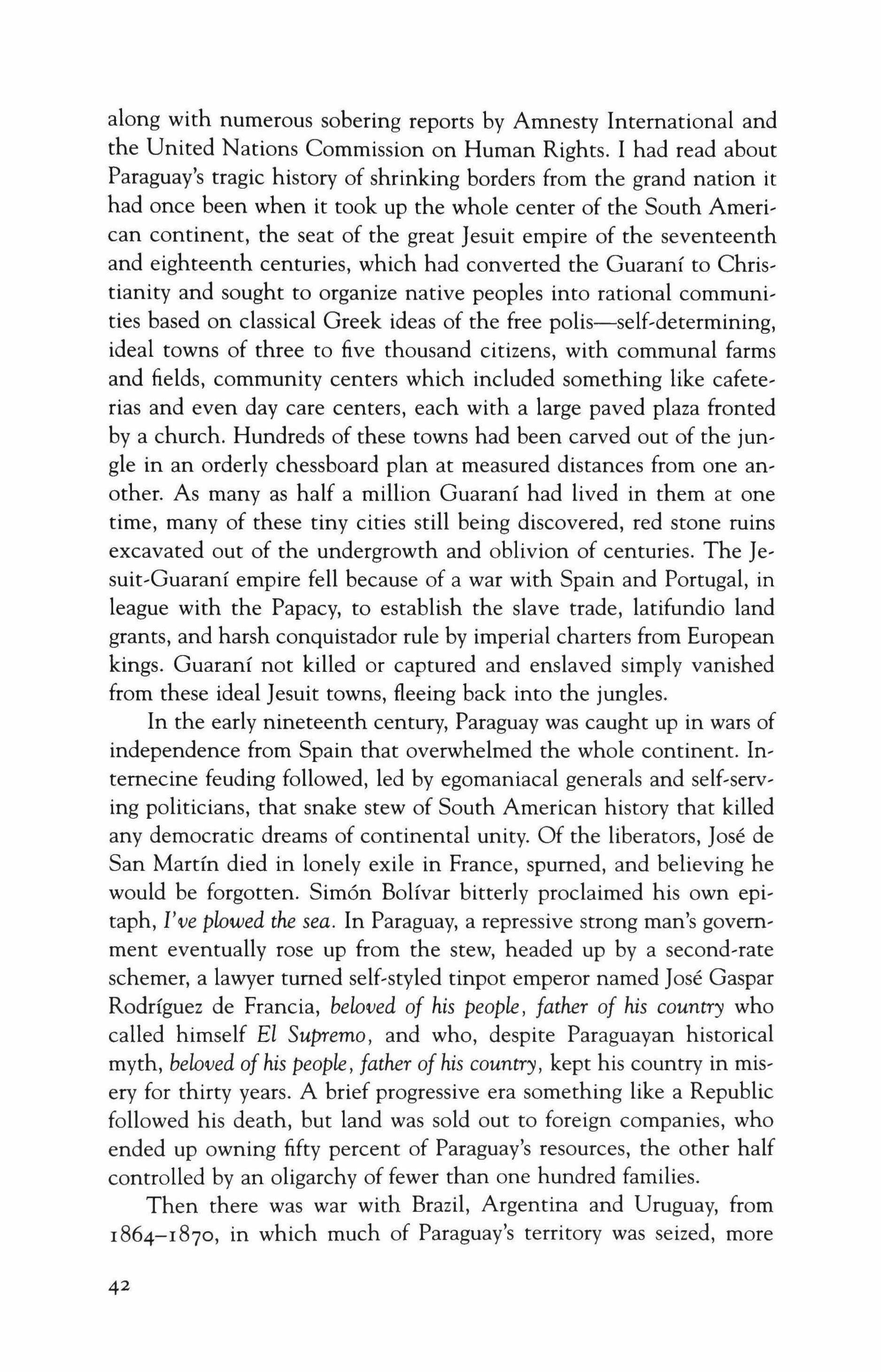
along with numerous sobering reports by Amnesty International and the United Nations Commission on Human Rights. I had read about Paraguay's tragic history of shrinking borders from the grand nation it had once been when it took up the whole center of the South American continent, the seat of the great Jesuit empire of the seventeenth and eighteenth centuries, which had converted the Guarani to Christianity and sought to organize native peoples into rational communities based on classical Greek ideas of the free polis=-self-deterrntning, ideal towns of three to five thousand citizens, with communal farms and fields, community centers which included something like cafeterias and even day care centers, each with a large paved plaza fronted by a church. Hundreds of these towns had been carved out of the jungle in an orderly chessboard plan at measured distances from one another. As many as half a million Guarani had lived in them at one time, many of these tiny cities still being discovered, red stone ruins excavated out of the undergrowth and oblivion of centuries. The [esuit-Guarani empire fell because of a war with Spain and Portugal, in league with the Papacy, to establish the slave trade, latitundio land grants, and harsh conquistador rule by imperial charters from European kings. Guarani not killed or captured and enslaved simply vanished from these ideal Jesuit towns, fleeing back into the jungles.
In the early nineteenth century, Paraguay was caught up in wars of independence from Spain that overwhelmed the whole continent. Internecine feuding followed, led by egomaniacal generals and self-serving politicians, that snake stew of South American history that killed any democratic dreams of continental unity. Of the liberators, Jose de San Martin died in lonely exile in France, spumed, and believing he would be forgotten. Simon Bolivar bitterly proclaimed his own epitaph, 1've plowed the sea. In Paraguay, a repressive strong man's government eventually rose up from the stew, headed up by a second-rate schemer, a lawyer turned self-styled tinpot emperor named Jose Gaspar Rodriguez de Francia, beloved of his people, father of his country who called himself El Supremo, and who, despite Paraguayan historical myth, beloved of his people, father of his country, kept his country in misery for thirty years. A brief progressive era something like a Republic followed his death, but land was sold out to foreign companies, who ended up owning fifty percent of Paraguay's resources, the other half controlled by an oligarchy of fewer than one hundred families.
Then there was war with Brazil, Argentina and Uruguay, from 1864-1870, in which much of Paraguay's territory was seized, more
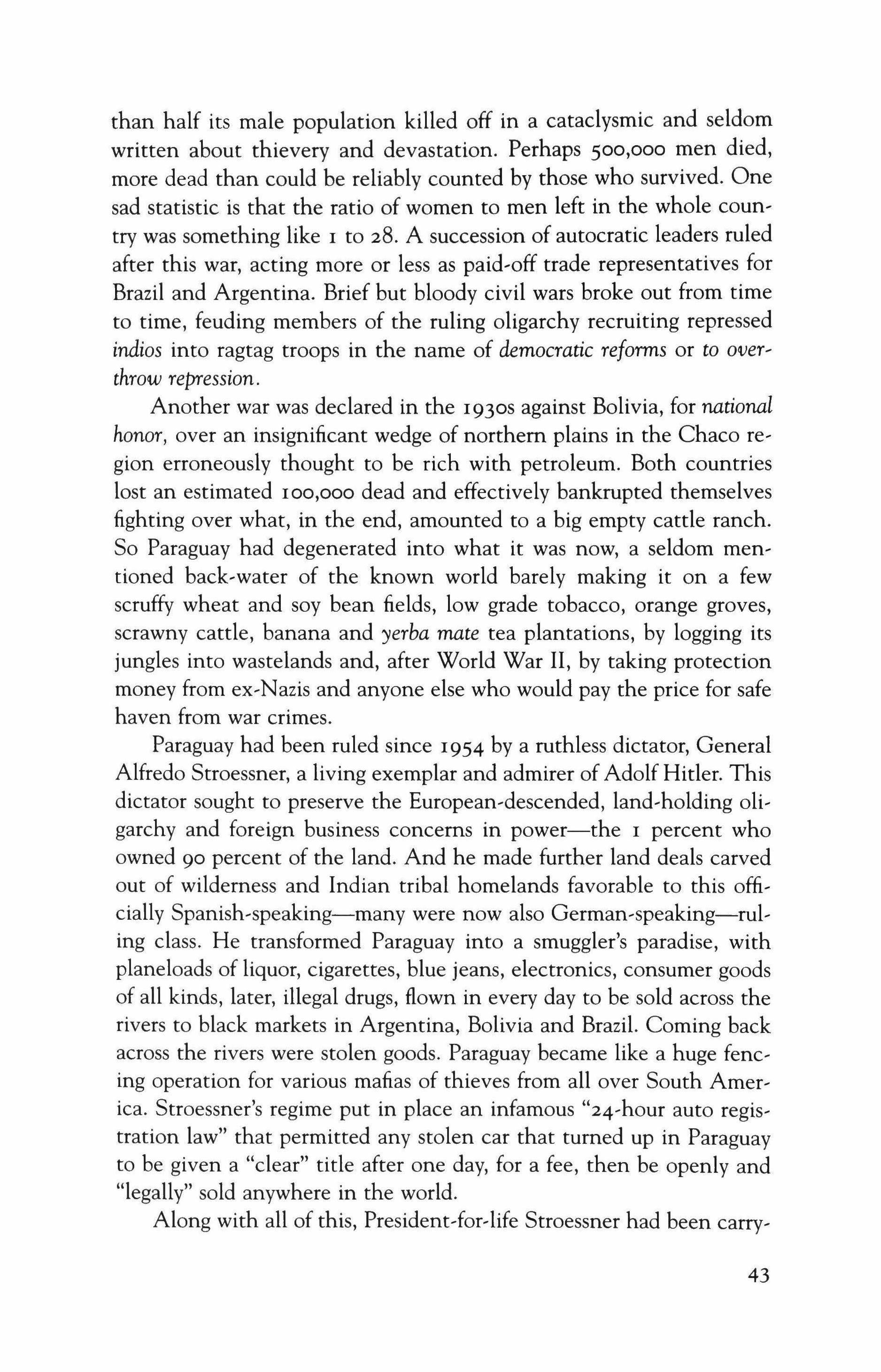
than half its male population killed off in a cataclysmic and seldom written about thievery and devastation. Perhaps 500,000 men died, more dead than could be reliably counted by those who survived. One sad statistic is that the ratio of women to men left in the whole country was something like I to 28. A succession of autocratic leaders ruled after this war, acting more or less as paid-off trade representatives for Brazil and Argentina. Brief but bloody civil wars broke out from time to time, feuding members of the ruling oligarchy recruiting repressed indios into ragtag troops in the name of democratic reforms or to over � throw repression.
Another war was declared in the 1930S against Bolivia, for national honor, over an insignificant wedge of northern plains in the Chaco region erroneously thought to be rich with petroleum. Both countries lost an estimated 100,000 dead and effectively bankrupted themselves fighting over what, in the end, amounted to a big empty cattle ranch. So Paraguay had degenerated into what it was now, a seldom mentioned back-water of the known world barely making it on a few scruffy wheat and soy bean fields, low grade tobacco, orange groves, scrawny cattle, banana and yerba mate tea plantations, by logging its jungles into wastelands and, after World War II, by taking protection money from ex-Nazis and anyone else who would pay the price for safe haven from war crimes.
Paraguay had been ruled since 1954 by a ruthless dictator, General Alfredo Stroessner, a living exemplar and admirer of Adolf Hitler. This dictator sought to preserve the European-descended, land-holding oligarchy and foreign business concerns in power-the I percent who owned 90 percent of the land. And he made further land deals carved out of wilderness and Indian tribal homelands favorable to this officially Spanish-speaking-e-manv were now also German-speaking=-ruling class. He transformed Paraguay into a smuggler's paradise, with planeloads of liquor, cigarettes, blue jeans, electronics, consumer goods of all kinds, later, illegal drugs, flown in every day to be sold across the rivers to black markets in Argentina, Bolivia and Brazil. Coming back across the rivers were stolen goods. Paraguay became like a huge fencing operation for various mafias of thieves from all over South America. Stroessner's regime put in place an infamous "24�hour auto registration law" that permitted any stolen car that turned up in Paraguay to be given a "clear" title after one day, for a fee, then be openly and "legally" sold anywhere in the world.
Along with all of this, President-for-life Stroessner had been carry-
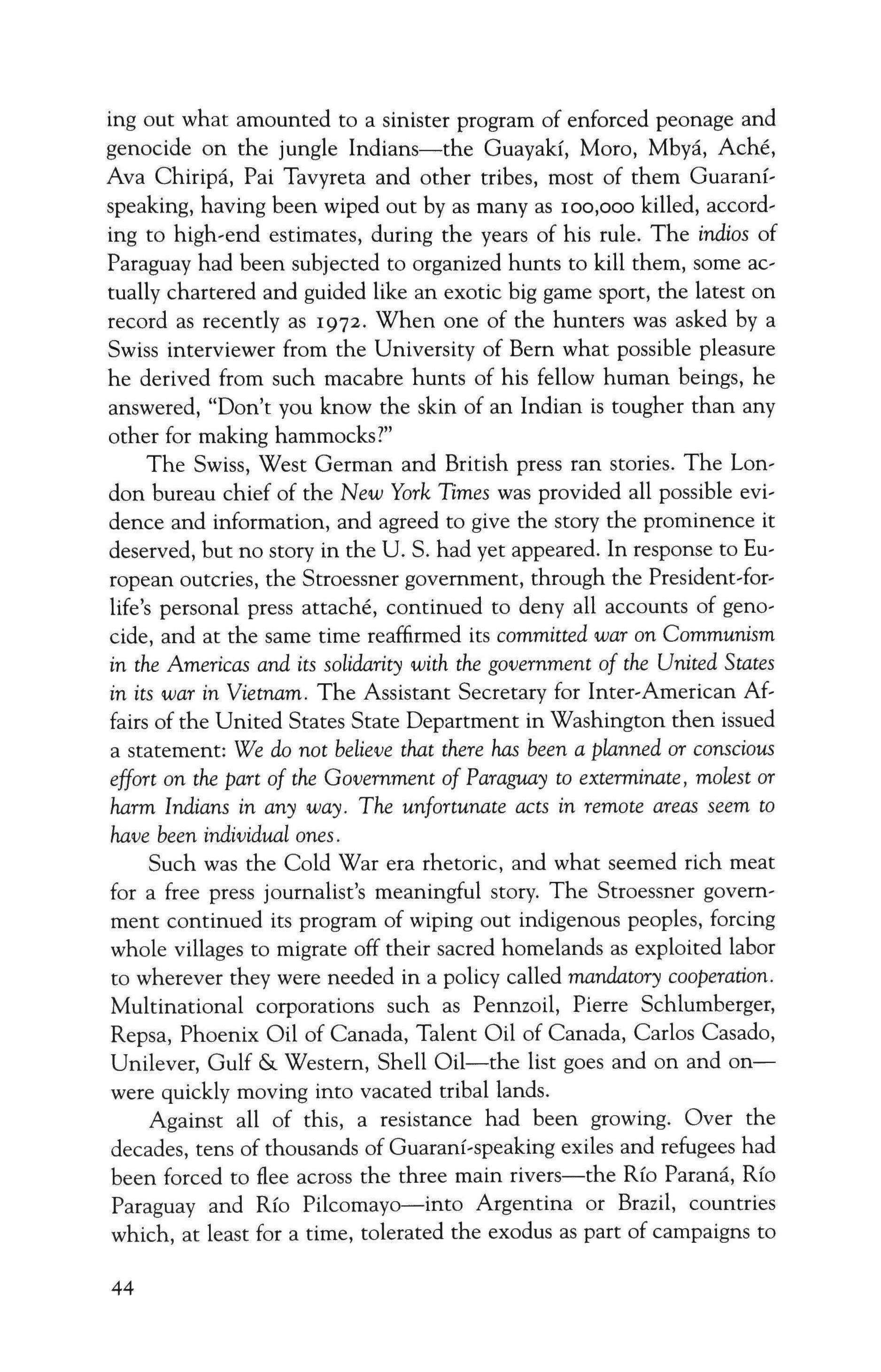
ing out what amounted to a sinister program of enforced peonage and genocide on the jungle Indians-the Guayakt, Moro, Mbya, Ache, Ava Chiripa, Pai Tavyreta and other tribes, most of them Guaranispeaking, having been wiped out by as many as 100,000 killed, according to high-end estimates, during the years of his rule. The indios of Paraguay had been subjected to organized hunts to kill them, some actually chartered and guided like an exotic big game sport, the latest on record as recently as 1972. When one of the hunters was asked by a Swiss interviewer from the University of Bern what possible pleasure he derived from such macabre hunts of his fellow human beings, he answered, "Don't you know the skin of an Indian is tougher than any other for making hammocks?"
The Swiss, West German and British press ran stories. The London bureau chief of the New York Times was provided all possible evidence and information, and agreed to give the story the prominence it deserved, but no story in the U. S. had yet appeared. In response to European outcries, the Stroessner government, through the President-forlife's personal press attache, continued to deny all accounts of genocide, and at the same time reaffirmed its committed war on Communism in the Americas and its solidarity with the government of the United States in its war in Vietnam. The Assistant Secretary for Inter-American Affairs of the United States State Department in Washington then issued a statement: We do not believe that there has been a planned or conscious effort on the part of the Government of Paraguay to exterminate, molest or harm Indians in any way. The unfortunate acts in remote areas seem to have been individual ones.
Such was the Cold War era rhetoric, and what seemed rich meat for a free press journalist's meaningful story. The Stroessner government continued its program of wiping out indigenous peoples, forcing whole villages to migrate off their sacred homelands as exploited labor to wherever they were needed in a policy called mandatory cooperation. Multinational corporations such as Pennzoil, Pierre Schlumberger, Repsa, Phoenix Oil of Canada, Talent Oil of Canada, Carlos Casado, Unilever, Gulf & Western, Shell Oil-the list goes and on and onwere quickly moving into vacated tribal lands.
Against all of this, a resistance had been growing. Over the decades, tens of thousands of Guarani-speaking exiles and refugees had been forced to flee across the three main rivers-the Rio Parana, Rio Paraguay and Rio Pilcomayo-into Argentina or Brazil, countries which, at least for a time, tolerated the exodus as part of campaigns to

discredit Stroessner's policies of piracy and smuggling. Units formed up among these exiles, recently aided by logistical support and training from Cuba, and from other leftist insurgencies, becoming a perpetual barbed threat and danger to President-for-life Alfredo Stroessner's rule. The bands of guerrilleros crossed back across the rivers into Paraguay, into its thorn tree jungles, into grassy plains of its chaco regions, where they ambushed government troops, robbed commercial river traffic and smuggler's barges, cut off the major roads, and staged hit-and-run actions all the way to the outskirts of the capital city of Asuncion, their goal to destabilize and finally overthrow their tragic history of corrupt dictatorships in a rousing and exemplary Socialist revolution.
This resistance was currently being led by the Ligas Agrarias Cristianas (LACs) in the countryside, the Organizacion Primero de Mayo (OPM) in the villages and cities, militias with direct links to the Argentine leftist-Peronist guerrilla movement called Montoneros. Montoneros�JP was the group in which many of my friends from school and my adopted brothers in Buenos Aires were active members.
In other words, war was brewing, simmering along in distant, landlocked Paraguay, a war which almost no one in the industrialized world had written about, or there was very little news I could find in that era of laborious archival and card catalogue searches that reached very far past Argentina and Brazil, which were facing their own armed struggles. In Paraguay-as with Guatemala's indigenous peasant insurgency, as with civil wars in EI Salvador, in some ways as happened much later in Sandinista Nicaragua, and in Mexico's state of Chiapas-a guerrilla militia of enslaved peasants and repressed indigenous peoples had taken up arms for the right to preserve their language and culture and for land reform and social democracy.
These were the slogans, words with which journalism might tell the story. But as anyone who has written for any press soon learns, always searching for the right angle, brainstorming for that arresting lead, arguing with the editors over the curse of writing to space, any real story soon becomes remarkable for its omissions. Most journalism should be treated with contempt for the truth it conceals.
On the bank of the Rio Pilcomayo, we took some time collecting ourselves. I checked through my shoulder bag to see that my cheap but pampered Pentax camera gear had made it through intact, pulling out the body and lenses to wipe off a heavy dampness that covered them
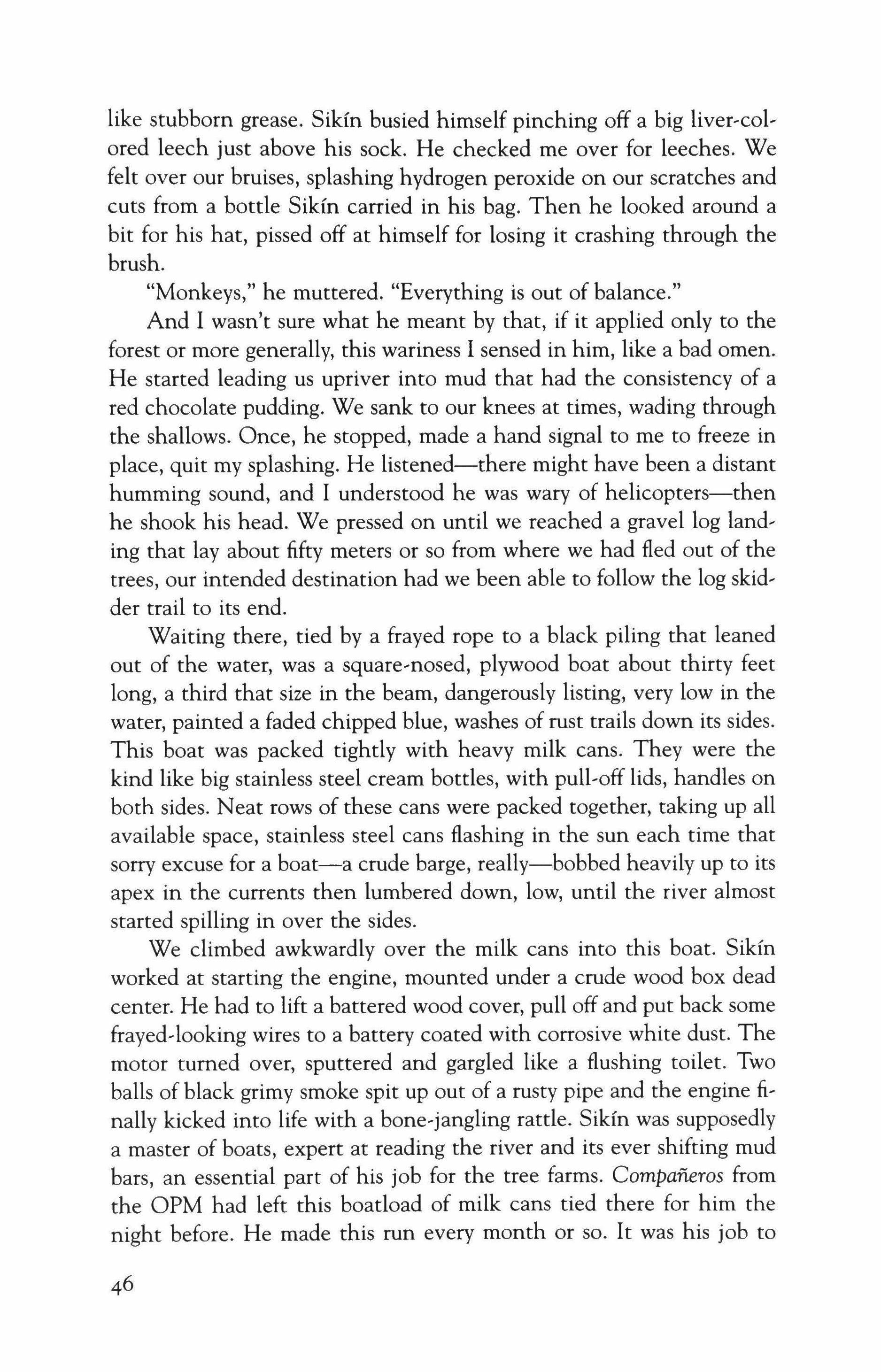
like stubborn grease. Sikfn busied himself pinching off a big liver-colored leech just above his sock. He checked me over for leeches. We felt over our bruises, splashing hydrogen peroxide on our scratches and cuts from a bottle Sikfn carried in his bag. Then he looked around a bit for his hat, pissed off at himself for losing it crashing through the brush.
"Monkeys," he muttered. "Everything is out of balance."
And I wasn't sure what he meant by that, if it applied only to the forest or more generally, this wariness I sensed in him, like a bad omen. He started leading us upriver into mud that had the consistency of a red chocolate pudding. We sank to our knees at times, wading through the shallows. Once, he stopped, made a hand signal to me to freeze in place, quit my splashing. He listened-there might have been a distant humming sound, and I understood he was wary of helicopters-then he shook his head. We pressed on until we reached a gravel log landing that lay about fifty meters or so from where we had fled out of the trees, our intended destination had we been able to follow the log skidder trail to its end.
Waiting there, tied by a frayed rope to a black piling that leaned out of the water, was a square-nosed, plywood boat about thirty feet long, a third that size in the beam, dangerously listing, very low in the water, painted a faded chipped blue, washes of rust trails down its sides. This boat was packed tightly with heavy milk cans. They were the kind like big stainless steel cream bottles, with pull-off lids, handles on both sides. Neat rows of these cans were packed together, taking up all available space, stainless steel cans flashing in the sun each time that sorry excuse for a boat-a crude barge, really-bobbed heavily up to its apex in the currents then lumbered down, low, until the river almost started spilling in over the sides.
We climbed awkwardly over the milk cans into this boat. Sikfn worked at starting the engine, mounted under a crude wood box dead center. He had to lift a battered wood cover, pull off and put back some frayed-looking wires to a battery coated with corrosive white dust. The motor turned over, sputtered and gargled like a flushing toilet. Two balls of black grimy smoke spit up out of a rusty pipe and the engine finally kicked into life with a bone-jangling rattle. Sikin was supposedly a master of boats, expert at reading the river and its ever shifting mud bars, an essential part of his job for the tree farms. Compafieros from the OPM had left this boatload of milk cans tied there for him the night before. He made this run every month or so. It was his job to
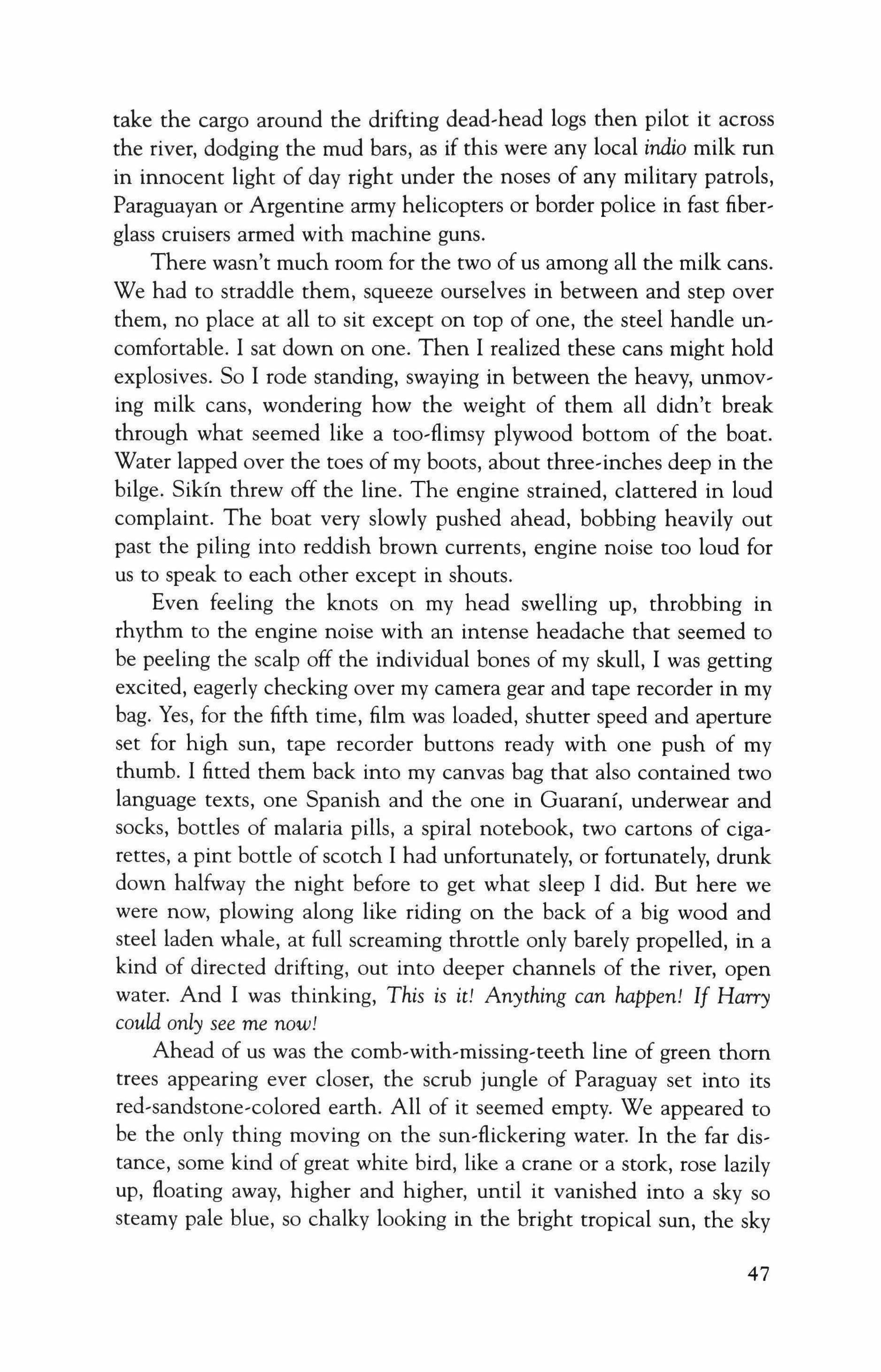
take the cargo around the drifting dead-head logs then pilot it across the river, dodging the mud bars, as if this were any local indio milk run in innocent light of day right under the noses of any military patrols, Paraguayan or Argentine army helicopters or border police in fast fiberglass cruisers armed with machine guns.
There wasn't much room for the two of us among all the milk cans. We had to straddle them, squeeze ourselves in between and step over them, no place at all to sit except on top of one, the steel handle uncomfortable. I sat down on one. Then I realized these cans might hold explosives. So I rode standing, swaying in between the heavy, unmoving milk cans, wondering how the weight of them all didn't break through what seemed like a too-flimsy plywood bottom of the boat. Water lapped over the toes of my boots, about three-inches deep in the bilge. Sikin threw off the line. The engine strained, clattered in loud complaint. The boat very slowly pushed ahead, bobbing heavily out past the piling into reddish brown currents, engine noise too loud for us to speak to each other except in shouts.
Even feeling the knots on my head swelling up, throbbing in rhythm to the engine noise with an intense headache that seemed to be peeling the scalp off the individual bones of my skull, I was getting excited, eagerly checking over my camera gear and tape recorder in my bag. Yes, for the fifth time, film was loaded, shutter speed and aperture set for high sun, tape recorder buttons ready with one push of my thumb. I fitted them back into my canvas bag that also contained two language texts, one Spanish and the one in Guarani, underwear and socks, bottles of malaria pills, a spiral notebook, two cartons of cigarettes, a pint bottle of scotch I had unfortunately, or fortunately, drunk down halfway the night before to get what sleep I did. But here we were now, plowing along like riding on the back of a big wood and steel laden whale, at full screaming throttle only barely propelled, in a kind of directed drifting, out into deeper channels of the river, open water. And I was thinking, This is it! Anything can happen! If Harry could only see me now!
Ahead of us was the comb-with-missing-teeth line of green thorn trees appearing ever closer, the scrub jungle of Paraguay set into its red-sandstone-colored earth. All of it seemed empty. We appeared to be the only thing moving on the sun-flickering water. In the far distance, some kind of great white bird, like a crane or a stork, rose lazily up, floating away, higher and higher, until it vanished into a sky so steamy pale blue, so chalky looking in the bright tropical sun, the sky

looked almost white. The thought struck me that this was what people meant when they said the ends of the earth, and how, barely a few years ago, when Harry and I walked shivering through grim winter streets in New York, homeless and miserable, locked out of anywhere we could sleep, this-right here!-was precisely the last place in the world I would ever have dreamed of being.
Yesterday, a woman asked me, what was it like?
Memory plays its tricks. The suddenness, the intensity of battle overwhelmed my senses. The trees, green density on the riverbank as we approached, began flying up, whole, and in bits and pieces. Branches, twigs, leaves scattered in the air, fluttering down all over and ahead of us with an eerie unreality like a slow-motion silent film full of green confetti-it was like being in a movie. There was detachment, not knowing what I was seeing, so that I perceived it all like I was inside a kind of animated cartoon, might even have laughed, turning to Sikfn, trying to shout at him over the engine noise even as he was ducking down, taking cover behind the engine box, Wow, what's that?
Then the reality of impact, the boat bottom quaking up through my feet, a sudden shock jarring my whole body and buckling my knees like jumping from a small height, about ten feet or so, and landing, hard, only there had been no jump, this was a boat on a river. A huge orange flash, the sensation of impact first, followed by a big pawhuuumpp!-the mortar round hitting the riverbank. The boat bucked up under my feet. A stinging sandblast of hot wind and debris knocked me sprawling like a walloping hammer blow.
All of this happened at the same time, in scant fragments of a second. I was suddenly on my back, rolling over the milk cans, arms and legs reaching up and kicking helplessly. I heard a series of pop�pop�pop and pop�pop�pop sounds over the boat engine, the whizz�waanng of ricochets, then a ringggg! Then I couldn't hear anymore, it was like my head was stuffed inside this big clanging bell. I sensed distantly, as by a consciousness hovering outside my body, We're being shot at! Bullets are hitting the boat! I'm not sure this was an actual thought at the time, it may only seem so in a memory of how I crashed around on top of those rib-breaker cans. Huge slaps of water broke over the boat, into my face, wetting me down like bucketsful. I was thinking, This boat is going to sink! But I couldn't do anything about it, as stunned as a stepped-on bug. What I could see was a blur of white sky. Then it was
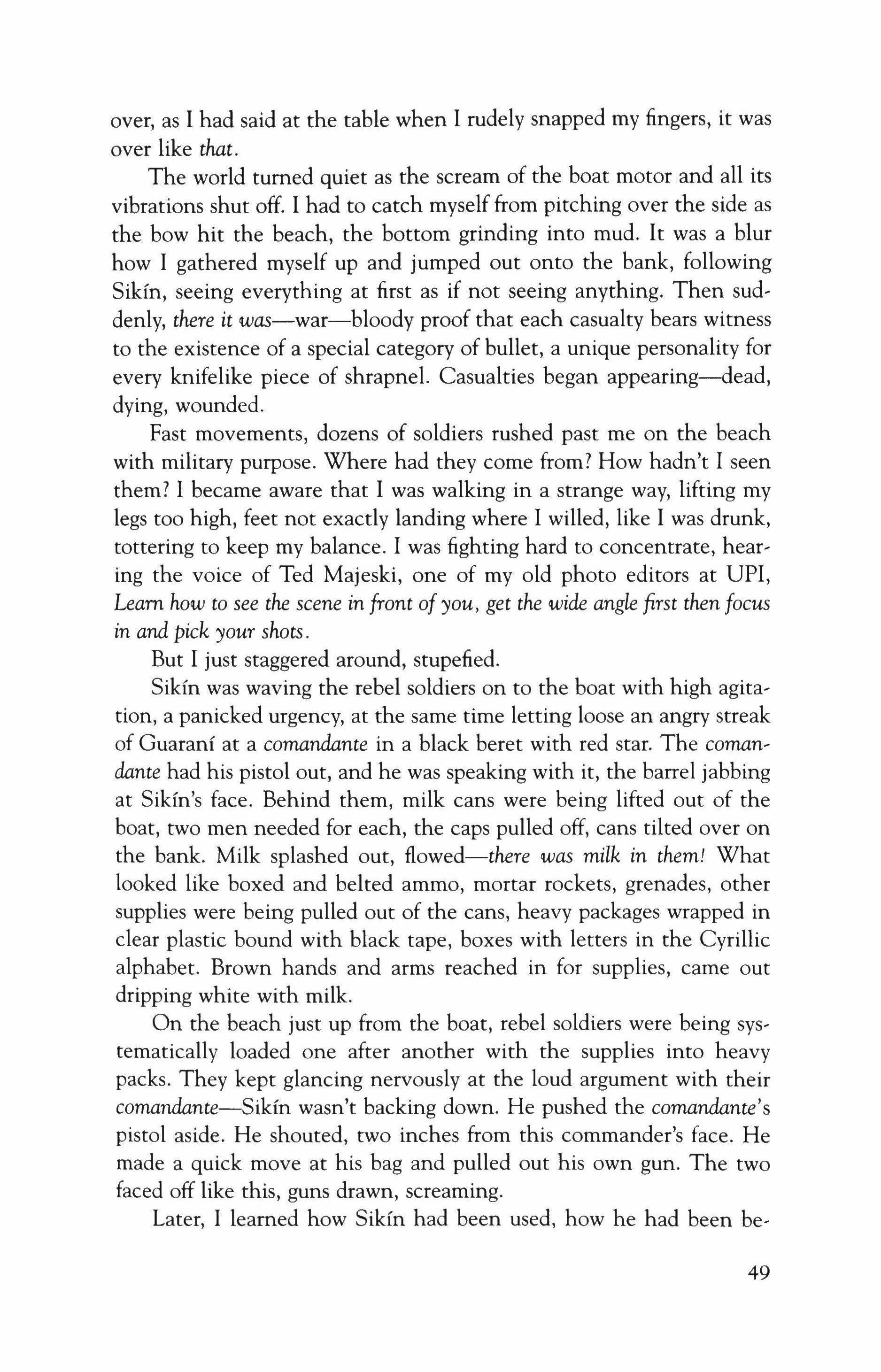
over, as I had said at the table when I rudely snapped my fingers, it was over like that.
The world turned quiet as the scream of the boat motor and all its vibrations shut off. I had to catch myself from pitching over the side as the bow hit the beach, the bottom grinding into mud. It was a blur how I gathered myself up and jumped out onto the bank, following Sikin, seeing everything at first as if not seeing anything. Then sud, denly, there it was-war-bloody proof that each casualty bears witness to the existence of a special category of bullet, a unique personality for every knifelike piece of shrapnel. Casualties began appearing-dead, dying, wounded.
Fast movements, dozens of soldiers rushed past me on the beach with military purpose. Where had they corne from? How hadn't I seen them? I became aware that I was walking in a strange way, lifting my legs too high, feet not exactly landing where I willed, like I was drunk, tottering to keep my balance. I was fighting hard to concentrate, hear, ing the voice of Ted Majeski, one of myoid photo editors at UPI, Learn how to see the scene in front of you, get the wide angle first then focus in and pick your shots.
But I just staggered around, stupefied.
Sikin was waving the rebel soldiers on to the boat with high agitation, a panicked urgency, at the same time letting loose an angry streak of Guarani at a comandante in a black beret with red star. The comzmdante had his pistol out, and he was speaking with it, the barrel jabbing at Sikin's face. Behind them, milk cans were being lifted out of the boat, two men needed for each, the caps pulled off, cans tilted over on the bank. Milk splashed out, flowed-there was milk in them! What looked like boxed and belted ammo, mortar rockets, grenades, other supplies were being pulled out of the cans, heavy packages wrapped in clear plastic bound with black tape, boxes with letters in the Cyrillic alphabet. Brown hands and arms reached in for supplies, came out dripping white with milk.
On the beach just up from the boat, rebel soldiers were being systematically loaded one after another with the supplies into heavy packs. They kept glancing nervously at the loud argument with their comandante-Sikin wasn't backing down. He pushed the comandante's pistol aside. He shouted, two inches from this commander's face. He made a quick move at his bag and pulled out his own gun. The two faced off like this, guns drawn, screaming.
Later, I learned how Sikin had been used, how he had been be,
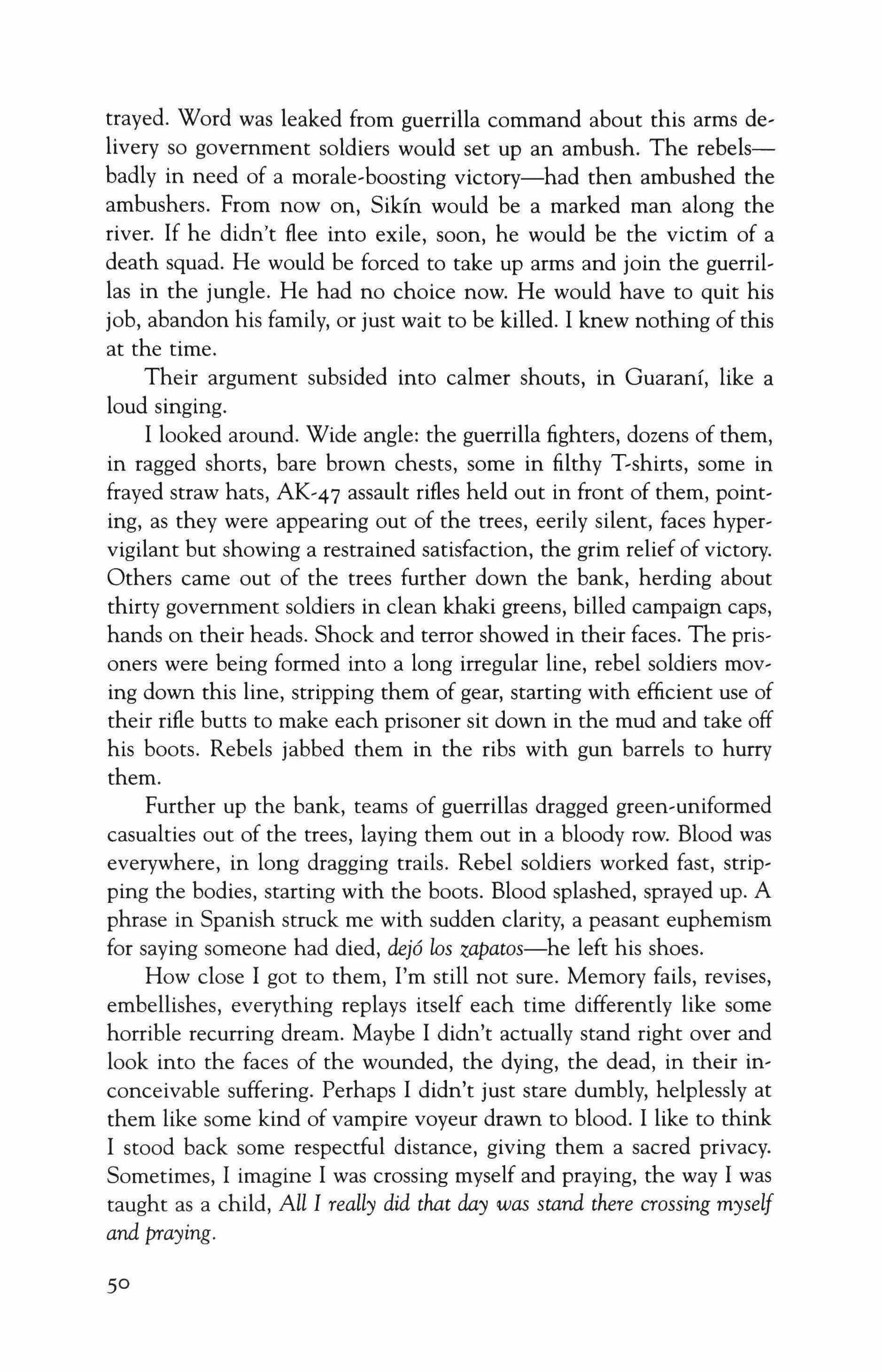
trayed. Word was leaked from guerrilla command about this arms de, livery so government soldiers would set up an ambush. The rebelsbadly in need of a morale-boosting victory-had then ambushed the ambushers. From now on, Sikin would be a marked man along the river. If he didn't flee into exile, soon, he would be the victim of a death squad. He would be forced to take up arms and join the guerrillas in the jungle. He had no choice now. He would have to quit his job, abandon his family, or just wait to be killed. I knew nothing of this at the time.
Their argument subsided into calmer shouts, in Guarani, like a loud singing.
I looked around. Wide angle: the guerrilla fighters, dozens of them, in ragged shorts, bare brown chests, some in filthy T-shirts, some in frayed straw hats, AK'47 assault rifles held out in front of them, point, ing, as they were appearing out of the trees, eerily silent, faces hyper' vigilant but showing a restrained satisfaction, the grim relief of victory. Others came out of the trees further down the bank, herding about thirty government soldiers in clean khaki greens, billed campaign caps, hands on their heads. Shock and terror showed in their faces. The prisoners were being formed into a long irregular line, rebel soldiers moving down this line, stripping them of gear, starting with efficient use of their rifle butts to make each prisoner sit down in the mud and take off his boots. Rebels jabbed them in the ribs with gun barrels to hurry them.
Further up the bank, teams of guerrillas dragged green,uniformed casualties out of the trees, laying them out in a bloody row. Blood was everywhere, in long dragging trails. Rebel soldiers worked fast, strip, ping the bodies, starting with the boots. Blood splashed, sprayed up. A phrase in Spanish struck me with sudden clarity, a peasant euphemism for saying someone had died, deja los zapatos-he left his shoes.
How close I got to them, I'm still not sure. Memory fails, revises, embellishes, everything replays itself each time differently like some horrible recurring dream. Maybe I didn't actually stand right over and look into the faces of the wounded, the dying, the dead, in their in' conceivable suffering. Perhaps I didn't just stare dumbly, helplessly at them like some kind of vampire voyeur drawn to blood. I like to think I stood back some respectful distance, giving them a sacred privacy. Sometimes, I imagine I was crossing myself and praying, the way I was taught as a child, All I really did that day was stand there crossing myself and praying.

I wish I could say this. But I know it isn't true.
A government soldier with a missing finger, arm raised, twisted into a strange beckoning gesture-the bloody stump of his index finger pointed straight at me. He couldn't have been more than sixteen, such a clean,looking face where it wasn't covered by black crusts of blood. Stroessner's army drafted kids, teenagers, indios from the villages, or they were pressured to join by economic necessity, military service one of the only ways they might get their families out of poverty. In the green uniforms, they were all mostly indio kids. A special category of bullet had thought to cut off this one's right index finger as cleanly as if chopped by a cleaver. The bullet decided then to plow a red meaty furrow up his arm, coming out through his shoulder. From there, this bullet had taken an improbable leap, straight into his forehead. There was a leaking hole in one side of his forehead. His right eye socket was a deep gory hole, the eyeball blown out by the impact, stuck to his cheek by bloody strings. His other eye was half,closed. This gave him a sly look, a dark brown seduction, as in the Spanish expression, ojo, his last message to the living, Watch out!
We wouldn't see the wars that were coming. We wouldn't see the old strongman Juan Per6n betraying us all, cracking down on the left wing with his police the moment he set foot back in Argentina. Then he would die in office, his regime replaced by a murderous military junta, their death squads kicking down the doors. Two of my adopted brothers in Argentina and one out of five of my friends would be car, ried off, hoods over their heads, hands wired behind their backs, held in secret jails, tortured, drugged, pushed still living out of airplanes fly, ing at night over the Rio de la Plata or the South Atlantic, the disap, peared.
This would become my story-a dirty war that I had never imagined looking for would find me and my family. We wouldn't see our, selves staring into excavated mass graves, combing through refrigerated warehouses stacked with corpses waiting for identification or for forensic study for evidence of crimes against humanity. We wouldn't see ourselves marching with the mothers, las madres in the plazas wearing white scarves over their heads, how they would hold up signs with photographs of the missing, my own adopted mother among them. We wouldn't see ourselves day after day year after year, searching through archives, police files, military records, interviews, legal transcripts, court testimony, making up lists, going over lists, printing lists, mailing lists, reading lists aloud, walking in reverence past granite walls en,

graved with lists, the lists of lists, lists of tens upon tens of thousands of their names.
Thorn trees were burning. From somewhere deep in the jungle, black smoke rose, drifting out over the river. The rebel soldiers were hurrying, running back and forth, splitting up their loot with increasing urgency.
I stumbled down the riverbank, along the row of dead and dying. Laid out next to the soldier who pointed at me with the stub of his fin, ger, dumped there without his boots, like a compressed heavy lump of green, was a dead government soldier with an extra ear. Some hot knife of shrapnel had apparently cut off the ear of a soldier huddling close to him then buried it in his throat-like punched it in deep, like it was stapled there. It looked like a weirdly misassigned body part, this perfectly formed, undamaged shell of a human ear, like a third ear had just grown out from the shredded hamburger mess left of his throat. Death caught him like this, clutching at his throat with a fixed, glassy, eyed terror and stunned surprise. His legs were buckled, broken back, wards at his hips, spread out in figure-fours under his body, bent like chicken wings. He must have been blown backwards at the waist by an impact while his legs stayed behind. He was a contortionist, this one, a real acrobat, bent completely in two, folded over that way, like com' pressed so he could have fit into a suitcase. Both arms were stiffening in this reaching spasm, hands not wanting to let go of his throat. His mouth was wide open like he had been trying to shout, as if his last living move had been reaching for that alien ear choking off the source of his smothered voice.
Operation Condor drifted like the gigantic vulture it really was, on Cold War winds, hatched in secret policy-making rooms in Washing, ton, fed and nurtured by the Pentagon, sent flying off down south on great silent wings, gliding along the isthmus of Central America to the Andes then out over the jungles, a hushed unified campaign of in' stalling dictatorships everywhere, juntas of generals, puppet govern, ments, rigged elections, the Monroe Doctrine, the war on Communism. Latin American officer cadres and police units were invited first to bases in Panama then to Fort Benning, Georgia-the School of the Americas of the United States-where they were trained in the latest techniques of crowd control, electronic surveillance, leftist movement infiltration, mass arrest tactics, interrogation, torture, assassination, the School of the Assassins, as it became known to anyone who cared to lis,
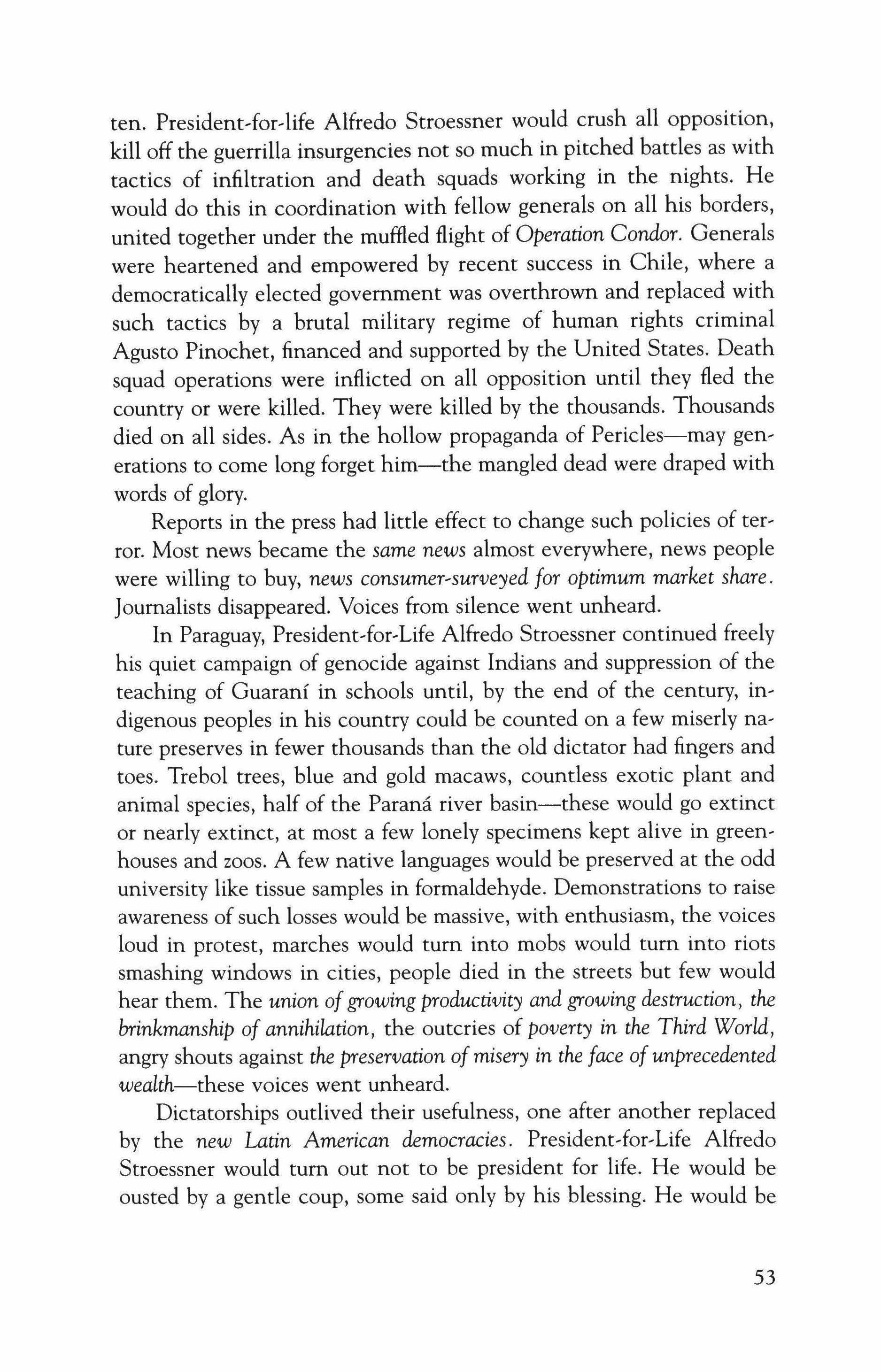
ten. President-for-life Alfredo Stroessner would crush all opposition, kill off the guerrilla insurgencies not so much in pitched battles as with tactics of infiltration and death squads working in the nights. He would do this in coordination with fellow generals on all his borders, united together under the muffled flight of Operation Condor. Generals were heartened and empowered by recent success in Chile, where a democratically elected government was overthrown and replaced with such tactics by a brutal military regime of human rights criminal Agusto Pinochet, financed and supported by the United States. Death squad operations were inflicted on all opposition until they fled the country or were killed. They were killed by the thousands. Thousands died on all sides. As in the hollow propaganda of Pericles-may generations to come long forget him-the mangled dead were draped with words of glory.
Reports in the press had little effect to change such policies of terror. Most news became the same news almost everywhere, news people were willing to buy, news consamer-steveyed for optimum market share. Journalists disappeared. Voices from silence went unheard.
In Paraguay, President-for-Life Alfredo Stroessner continued freely his quiet campaign of genocide against Indians and suppression of the teaching of Guarani in schools until, by the end of the century, in' digenous peoples in his country could be counted on a few miserly nature preserves in fewer thousands than the old dictator had fingers and toes. Trebol trees, blue and gold macaws, countless exotic plant and animal species, half of the Parana river basin-these would go extinct or nearly extinct, at most a few lonely specimens kept alive in green' houses and zoos. A few native languages would be preserved at the odd university like tissue samples in formaldehyde. Demonstrations to raise awareness of such losses would be massive, with enthusiasm, the voices loud in protest, marches would tum into mobs would tum into riots smashing windows in cities, people died in the streets but few would hear them. The union ofgrowing productivity and growing destruction, the brinkmanship of annihilation, the outcries of poverty in the Third World, angry shouts against the preservation ofmisery in the face ofunprecedented wealth-these voices went unheard.
Dictatorships outlived their usefulness, one after another replaced by the new Latin American democracies. President-for-Life Alfredo Stroessner would tum out not to be president for life. He would be ousted by a gentle coup, some said only by his blessing. He would be
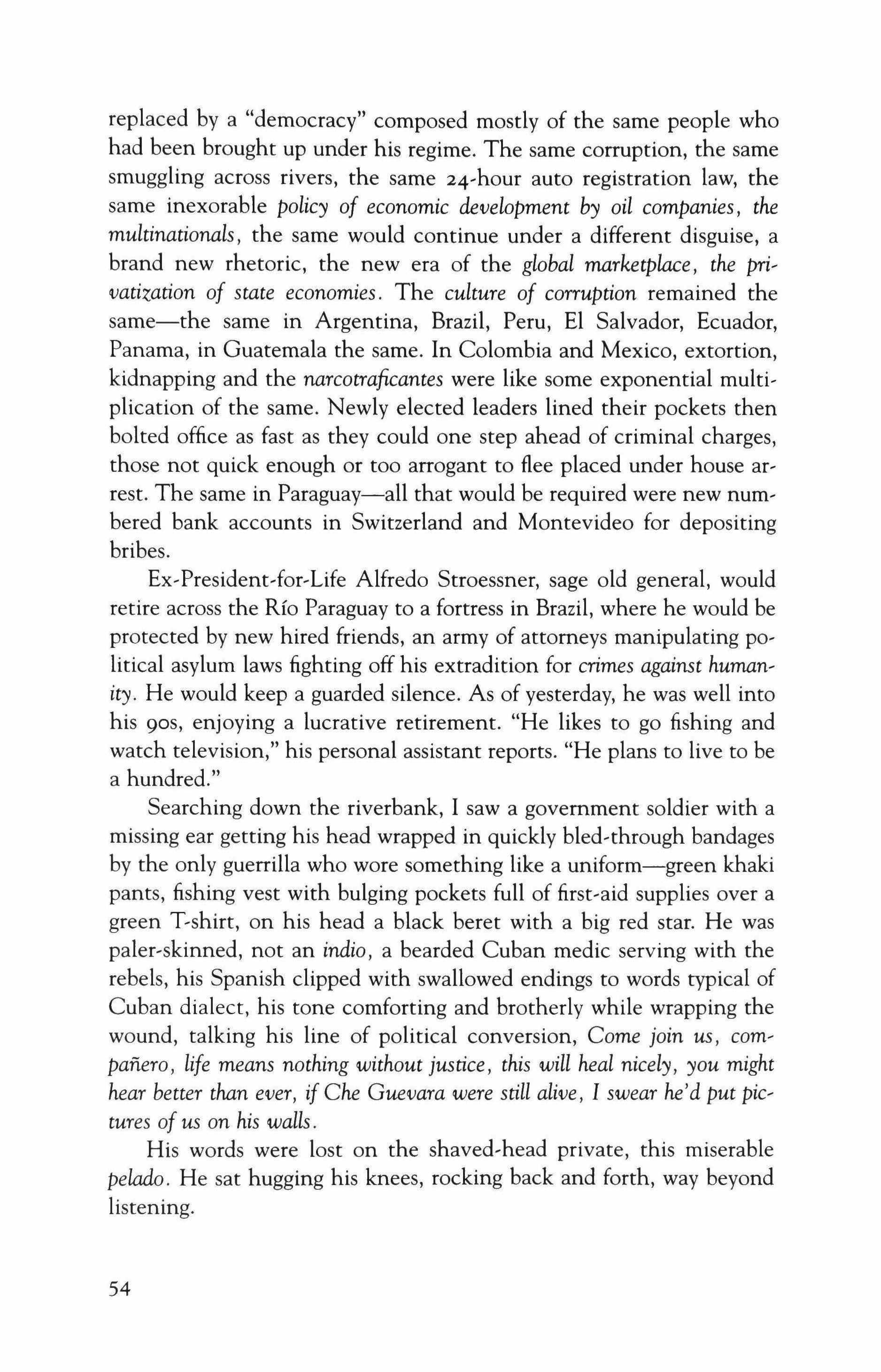
replaced by a "democracy" composed mostly of the same people who had been brought up under his regime. The same corruption, the same smuggling across rivers, the same 24-hour auto registration law, the same inexorable policy of economic development by oil companies, the multinationals, the same would continue under a different disguise, a brand new rhetoric, the new era of the global marketplace, the privatization of state economies. The culture of corruption remained the same-the same in Argentina, Brazil, Peru, EI Salvador, Ecuador, Panama, in Guatemala the same. In Colombia and Mexico, extortion, kidnapping and the narcotraficantes were like some exponential multiplication of the same. Newly elected leaders lined their pockets then bolted office as fast as they could one step ahead of criminal charges, those not quick enough or too arrogant to flee placed under house arrest. The same in Paraguay-all that would be required were new numbered bank accounts in Switzerland and Montevideo for depositing bribes.
Ex-President-for-Life Alfredo Stroessner, sage old general, would retire across the Rio Paraguay to a fortress in Brazil, where he would be protected by new hired friends, an army of attorneys manipulating political asylum laws fighting off his extradition for crimes against humanity. He would keep a guarded silence. As of yesterday, he was well into his 90S, enjoying a lucrative retirement. "He likes to go fishing and watch television," his personal assistant reports. "He plans to live to be a hundred."
Searching down the riverbank, I saw a government soldier with a missing ear getting his head wrapped in quickly bled-through bandages by the only guerrilla who wore something like a uniform-green khaki pants, fishing vest with bulging pockets full of first-aid supplies over a green 'Tshirr, on his head a black beret with a big red star. He was paler-skinned, not an indio, a bearded Cuban medic serving with the rebels, his Spanish clipped with swallowed endings to words typical of Cuban dialect, his tone comforting and brotherly while wrapping the wound, talking his line of political conversion, Come join us, compafiero, life means nothing without justice, this will heal nicely, you might hear better than ever, if Che Guevara were still alive, I swear he'd put pictures of us on his walls.
His words were lost on the shaved-head private, this miserable pelado. He sat hugging his knees, rocking back and forth, way beyond listening.

One of the guerrilla soldiers approached. The Cuban medic shook his head, taped off the bandage, left the wounded man to go on to the next. The rebel soldier knelt down and quickly pulled off the wounded man's boots.
Another government soldier had been left nearer the thorn trees, at the edge of the shade. He was doubled over on his side, clutching at a stomach wound, curling more and more into himself, into a fetal position. His uniform was black with blood. He was moaning, weakly, a high, tearing sound, like a child whines all alone in a distant room. His bare feet kicked out in quick convulsions. He quit making sounds. His left hand stretched, relaxed. A gold wedding ring glinted that the rebel soldiers hadn't seen. In a distant mud village, a young indio widow would find a yatay tree. She would sit under it and weep to the urutau, the mournful gray bird.
Others soldiers lay in a disorderly group close to the trees, left in the shade to die. From each, down the slope of the river bank, blood like big spills of dark paint mixed into one big spreading stain.
The smell of blood was everywhere, heavy, iron-filled, vaguely fishy, unmistakably human. Nothing smells like it, not even the blood of other mammals. Blood smell hung in the air like a mist, it set off primitive autonomic nervous responses, an anxiousness, a quick pulse, impulses to fight or run, a strange metallic taste in the mouth that caused an involuntary watering up with saliva-it was like sucking on a metal bottle cap, or like that mouthful of watering up just before vomiting. The memory of this blood smell is almost as sickening now as it was then.
I was suddenly sick, fighting getting sick, holding my breath, let, ting it out, puffing, taking in more quick sharp breaths but catching at my right side each time. I felt a cutting pain there. I was dizzy, could hardly see. A delayed intense pain began coming and going, like I was being smashed in the ribs by the blunt head of an ax. I was getting harder to take each step, boots growing heavier, like pulling them out of sucking mud. I started back along the river bank in the direction I had come-looking for the commotion of rebel soldiers arranging the clanging empty milk cans back in the boat. I needed out of there. All I wanted was to go home.
I almost tripped over another soldier, barely catching myself before I fell on him. He had a clean, unshaved face, a pretty, girlish face. He glanced up at me with a quick fear then I saw the other side of his face,

half his lower jaw blown away. A jagged shred of jawbone was all that was left there, sharp white bone sticking out. This splinter of bone jerked up and down, in steady rhythm, like a heartbeat. The man's eyes rolled everywhere like he couldn't focus then they fixed on me. He seemed to be asking for some kind of help, struggling to tell me some, thing, hands reaching up, but he couldn't speak. His bright red tongue kept licking up and around, feeling the exposed row of his perfect white upper teeth-what was left of his teeth-everything else missing on that side. He made choking sounds. He gurgled blood. The shattered hinge of his jaw jerked up and down like a ticking clock. All I did was raise my hands at him, like fending him away, backing off from the horror of him.
The beach was suddenly busier with movement, everyone hurry, ing. Only then did it strike me, my camera, my tape recorder!
What was I doing, standing there like some fool?
My hands were down rummaging into my shoulder bag, hearing my editor's voice again, Get the wide angle, see what's in front of you, shoot first, ask questions later.
Wide angle: the platoon of rebel soldiers not concerned with cap' tured soldiers nearly finished with their work, like a bucket brigade, unloading supplies from the boat, loading them into packs, slinging them over their shoulders with the looted gear and weapons. The heap of empty cans was stacked in the boat. Sikfn was hurrying the last one in. He looked up fearfully, searching the sky for enemy helicopters everyone knew must be coming. Smoke was getting heavier, settling over the river in a dirty gray layer.
Where was the comandante now to talk with him? Could I at least get a picture with his troops?
My hands were feeling around inside my bag, moving in their practiced automatic sequence from hundreds of times lifting up my camera to start shooting. But nothing felt right. My fingers were wet, they were groping around in a busted up jangle of metal bits and broken glass. I lifted my bag, a heavy shapelessness to it like it was filled with gravel. There was a huge hole in the bag, a long rent on one end and running around to both sides like it had been slashed. Things were dropping out. I looked around and behind. Glass glittered. Shredded tobacco followed in a trail of my bloody footprints.
I looked in my bag. The pampered Pentax was completely crushed and mangled, like it had been stepped on, a worthless piece of tin, back sprung open, everything tangled in a gray snake of film. Lenses
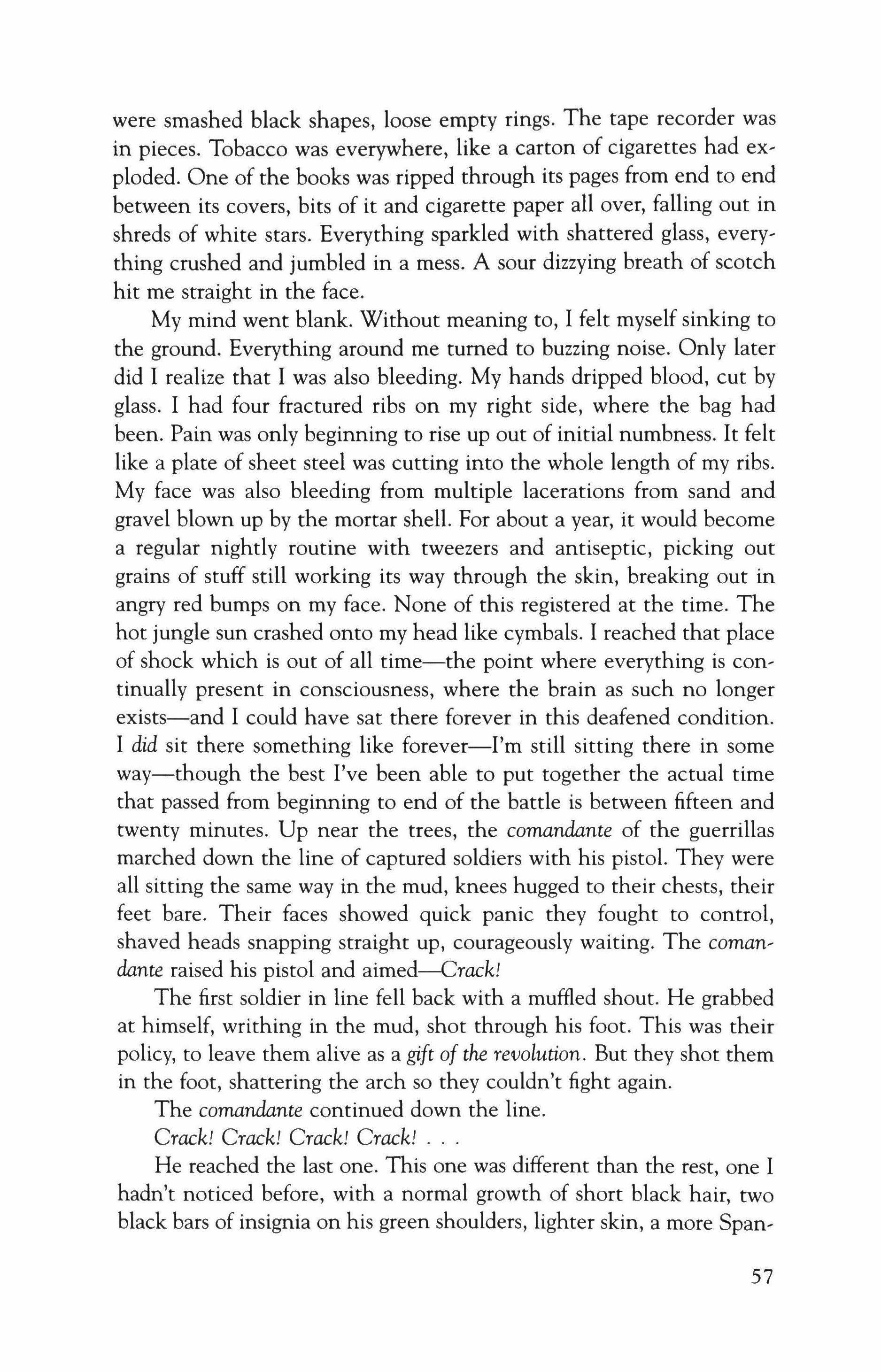
were smashed black shapes, loose empty rings. The tape recorder was in pieces. Tobacco was everywhere, like a carton of cigarettes had ex, ploded. One of the books was ripped through its pages from end to end between its covers, bits of it and cigarette paper all over, falling out in shreds of white stars. Everything sparkled with shattered glass, every' thing crushed and jumbled in a mess. A sour dizzying breath of scotch hit me straight in the face.
My mind went blank. Without meaning to, I felt myself sinking to the ground. Everything around me turned to buzzing noise. Only later did I realize that I was also bleeding. My hands dripped blood, cut by glass. I had four fractured ribs on my right side, where the bag had been. Pain was only beginning to rise up out of initial numbness. It felt like a plate of sheet steel was cutting into the whole length of my ribs. My face was also bleeding from multiple lacerations from sand and gravel blown up by the mortar shell. For about a year, it would become a regular nightly routine with tweezers and antiseptic, picking out grains of stuff still working its way through the skin, breaking out in angry red bumps on my face. None of this registered at the time. The hot jungle sun crashed onto my head like cymbals. I reached that place of shock which is out of all time-the point where everything is con' tinually present in consciousness, where the brain as such no longer exists-and I could have sat there forever in this deafened condition. I did sit there something like forever-I'm still sitting there in some way-though the best I've been able to put together the actual time that passed from beginning to end of the battle is between fifteen and twenty minutes. Up near the trees, the comandante of the guerrillas marched down the line of captured soldiers with his pistol. They were all sitting the same way in the mud, knees hugged to their chests, their feet bare. Their faces showed quick panic they fought to control, shaved heads snapping straight up, courageously waiting. The cornzmdante raised his pistol and aimed-Crack!
The first soldier in line fell back with a muffled shout. He grabbed at himself, writhing in the mud, shot through his foot. This was their policy, to leave them alive as a gift of the revolution. But they shot them in the foot, shattering the arch so they couldn't fight again.
The comandante continued down the line.
Crack! Crack! Crack! Crack!
He reached the last one. This one was different than the rest, one I hadn't noticed before, with a normal growth of short black hair, two black bars of insignia on his green shoulders, lighter skin, a more Span'

ish,looking face but not so different. He had a mustache covering that his face was still like the others, a mostly indio face, a fine-featured face like Sikfn's, a face not unlike the comandante's face, more criollo, more Spanish, but all were Paraguayan faces. His face was serious, older than the others, a face set now with the authority and purpose of his military profession. It was a seasoned warrior's face making a point to appear unafraid. He knew the rules. He would have done the same, and more, if their fortunes were reversed. One commander to another, his face was saying let's get it over with like two brave men, por la patria.
This captain looked off across the Rfo Pilcomayo, into another country. With a languid movement, and a kind of reluctant intimacy, the comandante of the guerrillas raised his pistol and fired. The body snapped to the side, head spouting blood like from a garden hose.
People sometimes ask me, what was it like?
What it is like: A comandante moving down a line of prisoners, shooting. Soldiers loading up supplies so they can go on killing. The wreckage in a bag, destroyed tools of a profession. Hands and arms lift, ing me, carrying me to a boat. All around me, wounded, dying, dead. A white sky. Burning thorn trees. Loss forever of a way to express love. Blood and milk flowing in swirls into a river.
My brother is doing fingertip pushups in his room.

IN ISTANBUL, THE PLANE WAITS ON THE TARMAC, A LEVIATHAN WHEN you're looking at it from the ground. It is midnight and the rain is coming down through the airport floodlights. The pilot has the engines on and they are whining in unbelievable frequencies. The rain comes down harder once we leave the shelter of the terminal, the noise swelling as we get to the base of the stairs, and it is right there we start to pick up an electrical charge, under the belly of the Air Tajikistan jet, the journalists, aid workers and diplomats, we all get the Here We Go feeling.
This flight is the only direct air connection from Western Europe to Dushanbe, and it is full, not just with people, but dangerously overloaded with equipment and supplies. Inside, the stewardesses have turned down every other row of seats to force passengers to sit farther back, to make sure the nose of the aircraft will get off the ground. Cameras, computers and suitcases take up the rear of the plane, the excess luggage spilling into the aisles. Flies drift around the cabin in clouds, landing on the flowers in the upholstery. Female members of the cabin crew wear pillbox hats with veils to cover their hair, handing out plastic cups with Soviet orange drink, indifferent and bored,
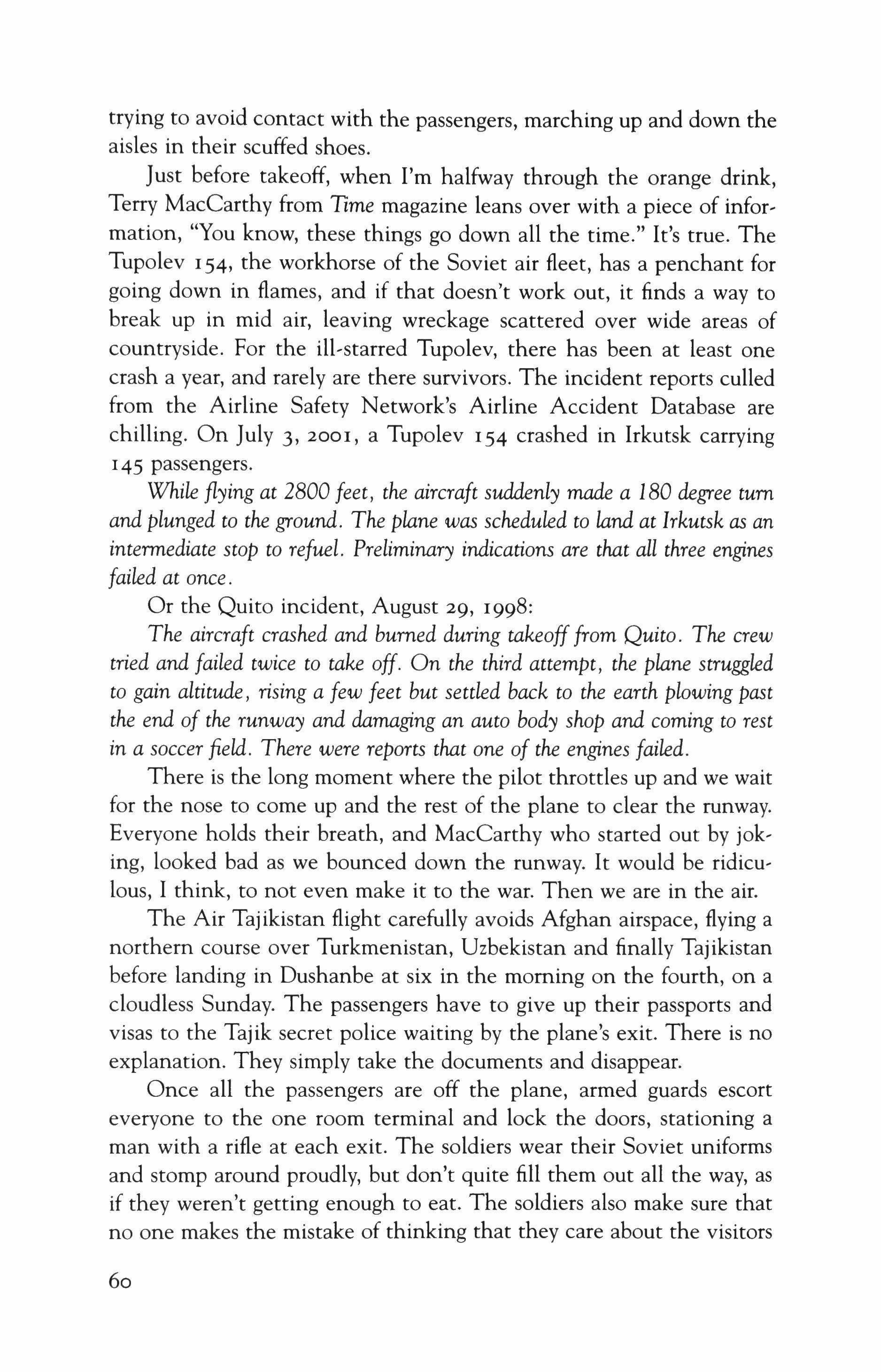
trying to avoid contact with the passengers, marching up and down the aisles in their scuffed shoes.
Just before takeoff, when I'm halfway through the orange drink, Terry MacCarthy from Time magazine leans over with a piece of information, "You know, these things go down all the time." It's true. The Tupolev 154, the workhorse of the Soviet air fleet, has a penchant for going down in flames, and if that doesn't work out, it finds a way to break up in mid air, leaving wreckage scattered over wide areas of countryside. For the ill-starred Tupolev, there has been at least one crash a year, and rarely are there survivors. The incident reports culled from the Airline Safety Network's Airline Accident Database are chilling. On July 3, 2001, a Tupolev 154 crashed in Irkutsk carrying 145 passengers.
While flying at 2800 feet, the aircraft suddenly made a 180 degree tum and plunged to the ground. The plane was scheduled to land at Irkutsk as an intermediate stop to refuel. Preliminary indications are that all three engines failed at once.
Or the Quito incident, August 29, 1998:
The aircraft crashed and burned during takeofffrom Quito. The crew tried and failed twice to take off. On the third attempt, the plane struggled to gain altitude, rising a few feet but settled back to the earth plowing past the end of the runway and damaging an auto body shop and coming to rest in a soccer field. There were reports that one of the engines failed.
There is the long moment where the pilot throttles up and we wait for the nose to come up and the rest of the plane to clear the runway. Everyone holds their breath, and MacCarthy who started out by joking, looked bad as we bounced down the runway. It would be ridiculous, I think, to not even make it to the war. Then we are in the air.
The Air Tajikistan flight carefully avoids Afghan airspace, flying a northern course over Turkmenistan, Uzbekistan and finally Tajikistan before landing in Dushanbe at six in the morning on the fourth, on a cloudless Sunday. The passengers have to give up their passports and visas to the Tajik secret police waiting by the plane's exit. There is no explanation. They simply take the documents and disappear.
Once all the passengers are off the plane, armed guards escort everyone to the one room terminal and lock the doors, stationing a man with a rifle at each exit. The soldiers wear their Soviet uniforms and stomp around proudly, but don't quite fill them out all the way, as if they weren't getting enough to eat. The soldiers also make sure that no one makes the mistake of thinking that they care about the visitors
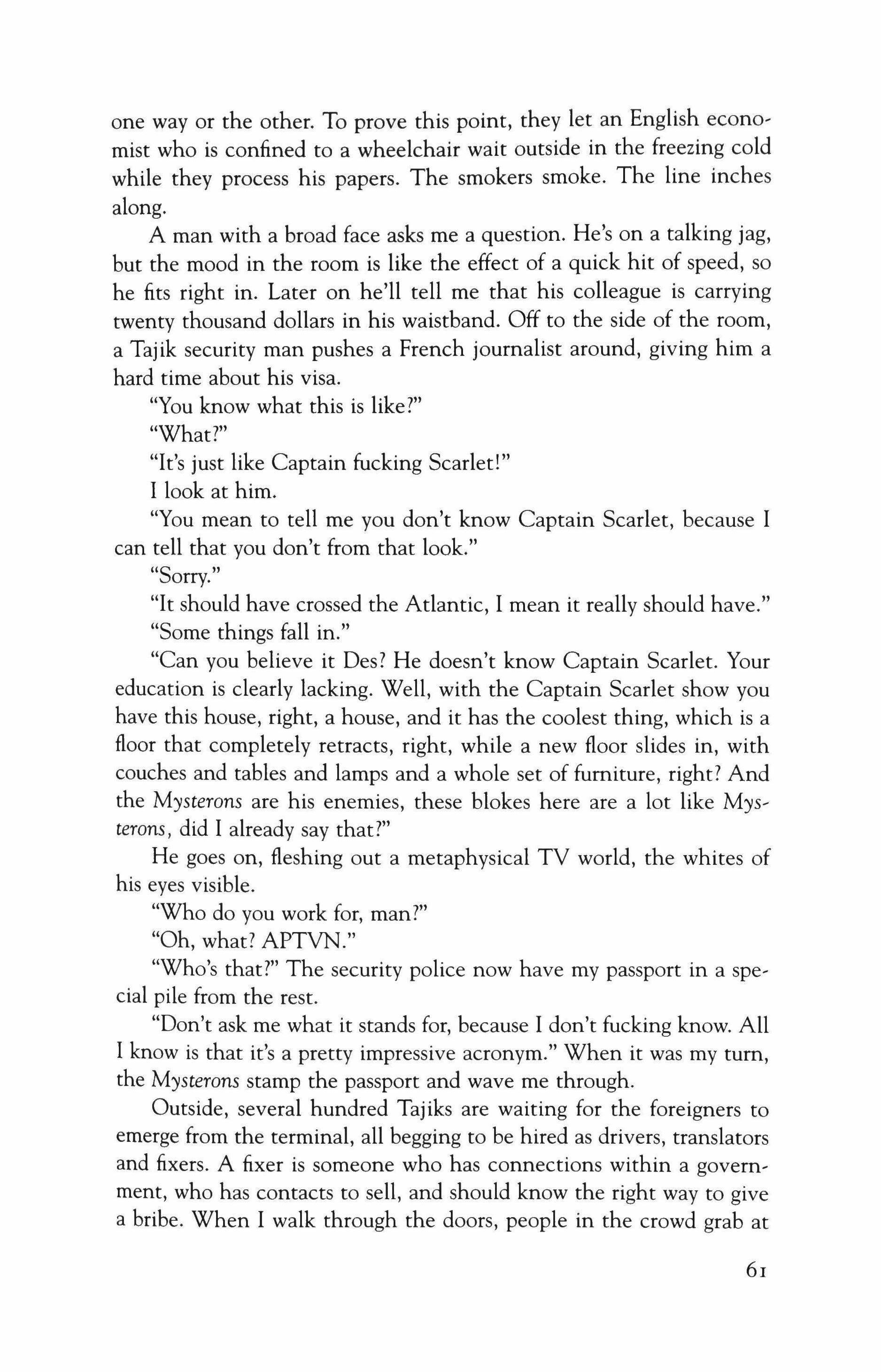
one way or the other. To prove this point, they let an English economist who is confined to a wheelchair wait outside in the freezing cold while they process his papers. The smokers smoke. The line inches along.
A man with a broad face asks me a question. He's on a talking jag, but the mood in the room is like the effect of a quick hit of speed, so he fits right in. Later on he'll tell me that his colleague is carrying twenty thousand dollars in his waistband. Off to the side of the room, a Tajik security man pushes a French journalist around, giving him a hard time about his visa.
"You know what this is like?"
"What?"
"It's just like Captain fucking Scarlet!"
I look at him.
"You mean to tell me you don't know Captain Scarlet, because I can tell that you don't from that look."
"Sorry."
"It should have crossed the Atlantic, I mean it really should have."
"Some things fall in."
"Can you believe it Des? He doesn't know Captain Scarlet. Your education is clearly lacking. Well, with the Captain Scarlet show you have this house, right, a house, and it has the coolest thing, which is a floor that completely retracts, right, while a new floor slides in, with couches and tables and lamps and a whole set of furniture, right? And the Mysterons are his enemies, these blokes here are a lot like Mysterons, did I already say that?"
He goes on, fleshing out a metaphysical TV world, the whites of his eyes visible.
"Who do you work for, man?"
"Oh, what? APTVN."
"Who's that?" The security police now have my passport in a special pile from the rest.
"Don't ask me what it stands for, because I don't fucking know. All I know is that it's a pretty impressive acronym." When it was my tum, the Mysterons stamp the passport and wave me through.
Outside, several hundred Tajiks are waiting for the foreigners to emerge from the terminal, all begging to be hired as drivers, translators and fixers. A fixer is someone who has connections within a government, who has contacts to sell, and should know the right way to give a bribe. When I walk through the doors, people in the crowd grab at

my sleeve and I have to yell at them and push them away. They roil and surge, electrified as the westerners come through the doors.
Tajikistan is the poorest of the Central Asian states, since it has no marketable natural resources. Its citizens are desperate.
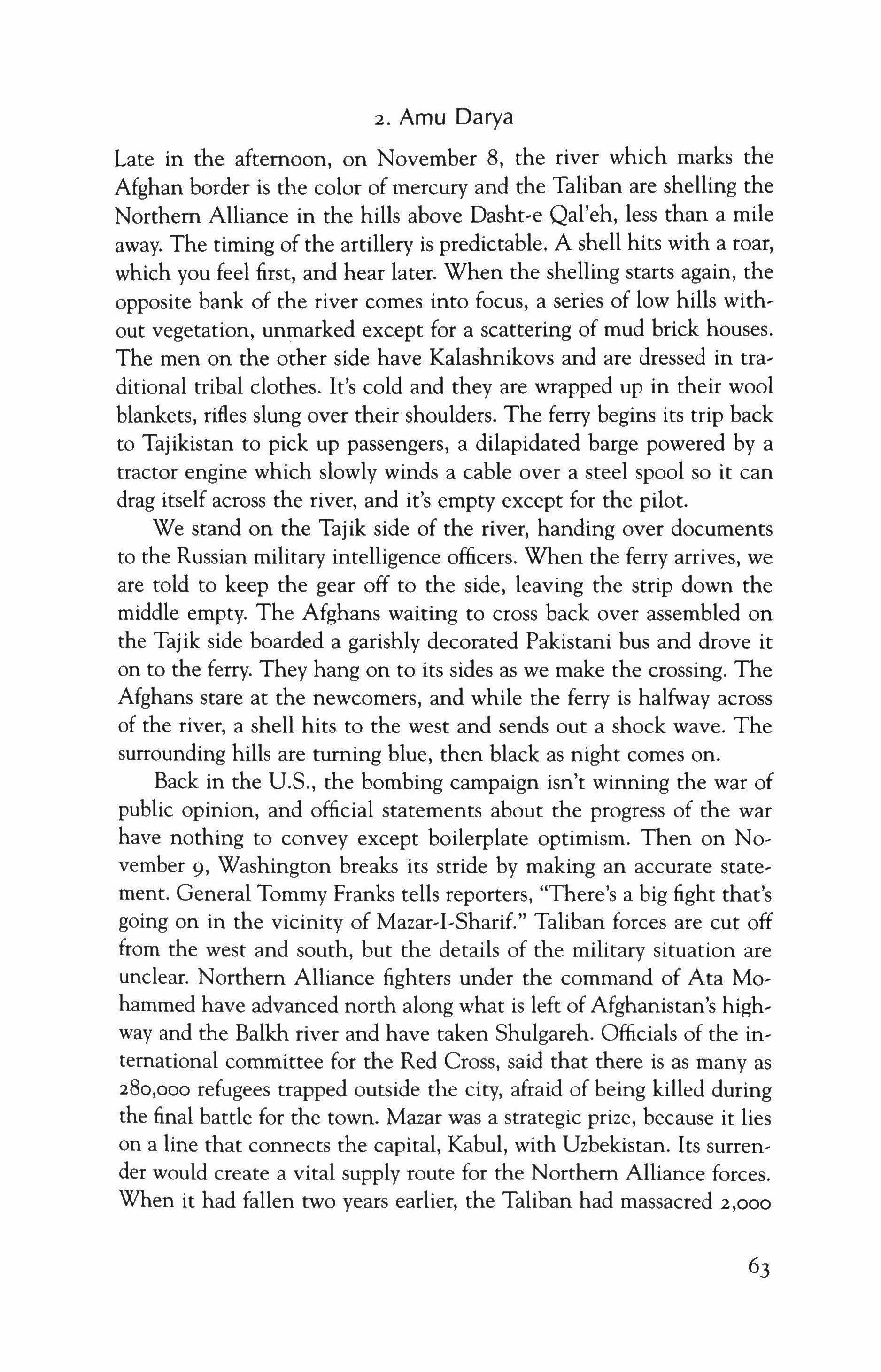 2. Amu Darya
2. Amu Darya
Late in the afternoon, on November 8, the river which marks the Afghan border is the color of mercury and the Taliban are shelling the Northern Alliance in the hills above Dasht-e Qal'eh, less than a mile away. The timing of the artillery is predictable. A shell hits with a roar, which you feel first, and hear later. When the shelling starts again, the opposite bank of the river comes into focus, a series of low hills without vegetation, unmarked except for a scattering of mud brick houses. The men on the other side have Kalashnikovs and are dressed in traditional tribal clothes. It's cold and they are wrapped up in their wool blankets, rifles slung over their shoulders. The ferry begins its trip back to Tajikistan to pick up passengers, a dilapidated barge powered by a tractor engine which slowly winds a cable over a steel spool so it can drag itself across the river, and it's empty except for the pilot.
We stand on the Tajik side of the river, handing over documents to the Russian military intelligence officers. When the ferry arrives, we are told to keep the gear off to the side, leaving the strip down the middle empty. The Afghans waiting to cross back over assembled on the Tajik side boarded a garishly decorated Pakistani bus and drove it on to the ferry. They hang on to its sides as we make the crossing. The Afghans stare at the newcomers, and while the ferry is halfway across of the river, a shell hits to the west and sends out a shock wave. The surrounding hills are turning blue, then black as night comes on.
Back in the U.S., the bombing campaign isn't winning the war of public opinion, and official statements about the progress of the war have nothing to convey except boilerplate optimism. Then on November 9, Washington breaks its stride by making an accurate statement. General Tommy Franks tells reporters, "There's a big fight that's going on in the vicinity of Mazar-l-Sharif," Taliban forces are cut off from the west and south, but the details of the military situation are unclear. Northern Alliance fighters under the command of Ata Mohammed have advanced north along what is left of Afghanistan's highway and the Balkh river and have taken Shulgareh. Officials of the international committee for the Red Cross, said that there is as many as 280,000 refugees trapped outside the city, afraid of being killed during the final battle for the town. Mazar was a strategic prize, because it lies on a line that connects the capital, Kabul, with Uzbekistan. Its surrender would create a vital supply route for the Northern Alliance forces. When it had fallen two years earlier, the Taliban had massacred 2,000
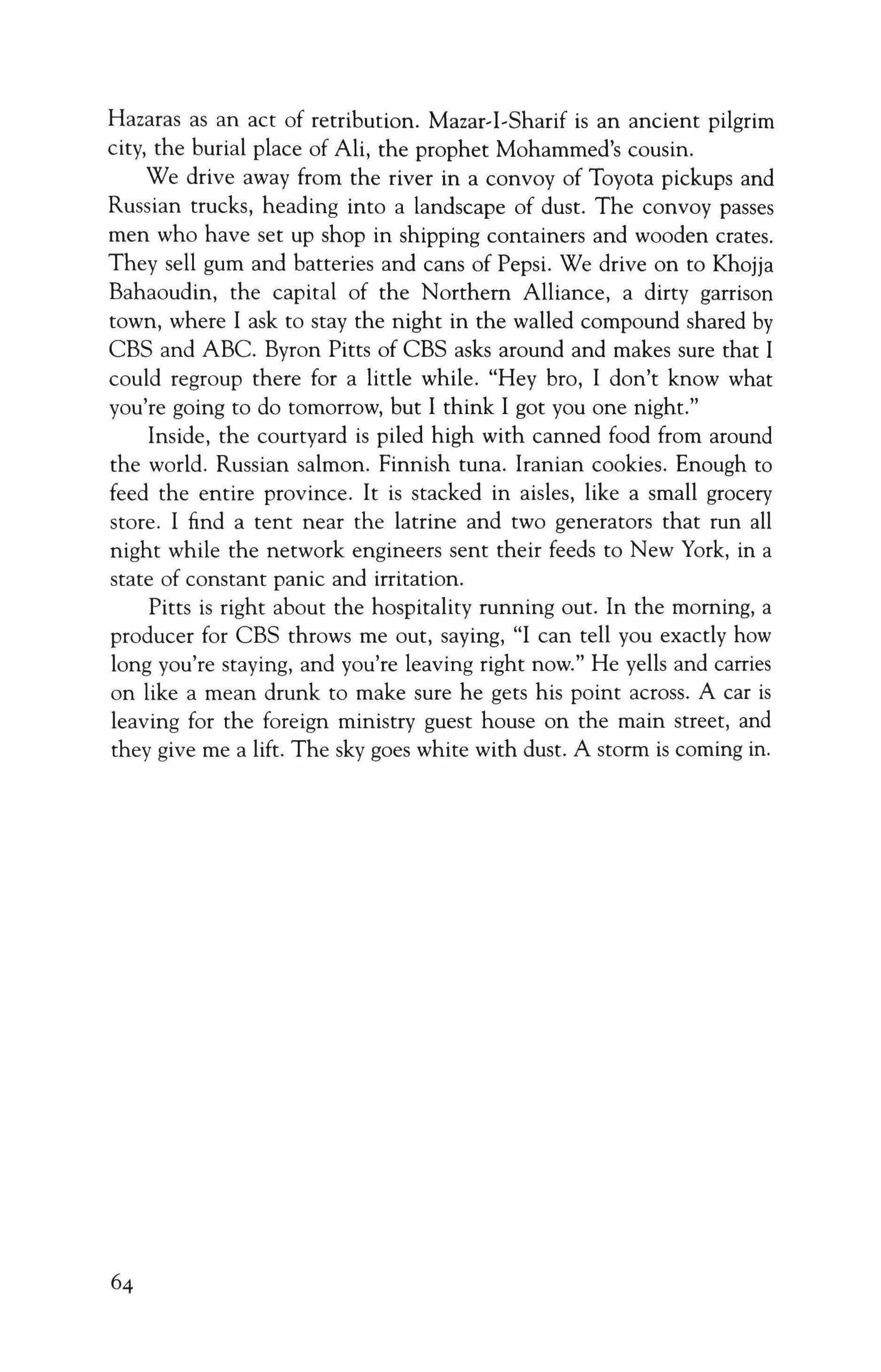
Hazaras as an act of retribution. Mazar-l-Sharif is an ancient pilgrim city, the burial place of Ali, the prophet Mohammed's cousin.
We drive away from the river in a convoy of Toyota pickups and Russian trucks, heading into a landscape of dust. The convoy passes men who have set up shop in shipping containers and wooden crates. They sell gum and batteries and cans of Pepsi. We drive on to Khojja Bahaoudin, the capital of the Northern Alliance, a dirty garrison town, where I ask to stay the night in the walled compound shared by CBS and ABC. Byron Pitts of CBS asks around and makes sure that I could regroup there for a little while. "Hey bro, I don't know what you're going to do tomorrow, but I think I got you one night."
Inside, the courtyard is piled high with canned food from around the world. Russian salmon. Finnish tuna. Iranian cookies. Enough to feed the entire province. It is stacked in aisles, like a small grocery store. I find a tent near the latrine and two generators that run all night while the network engineers sent their feeds to New York, in a state of constant panic and irritation.
Pitts is right about the hospitality running out. In the morning, a producer for CBS throws me out, saying, "I can tell you exactly how long you're staying, and you're leaving right now." He yells and carries on like a mean drunk to make sure he gets his point across. A car is leaving for the foreign ministry guest house on the main street, and they give me a lift. The sky goes white with dust. A storm is coming in.
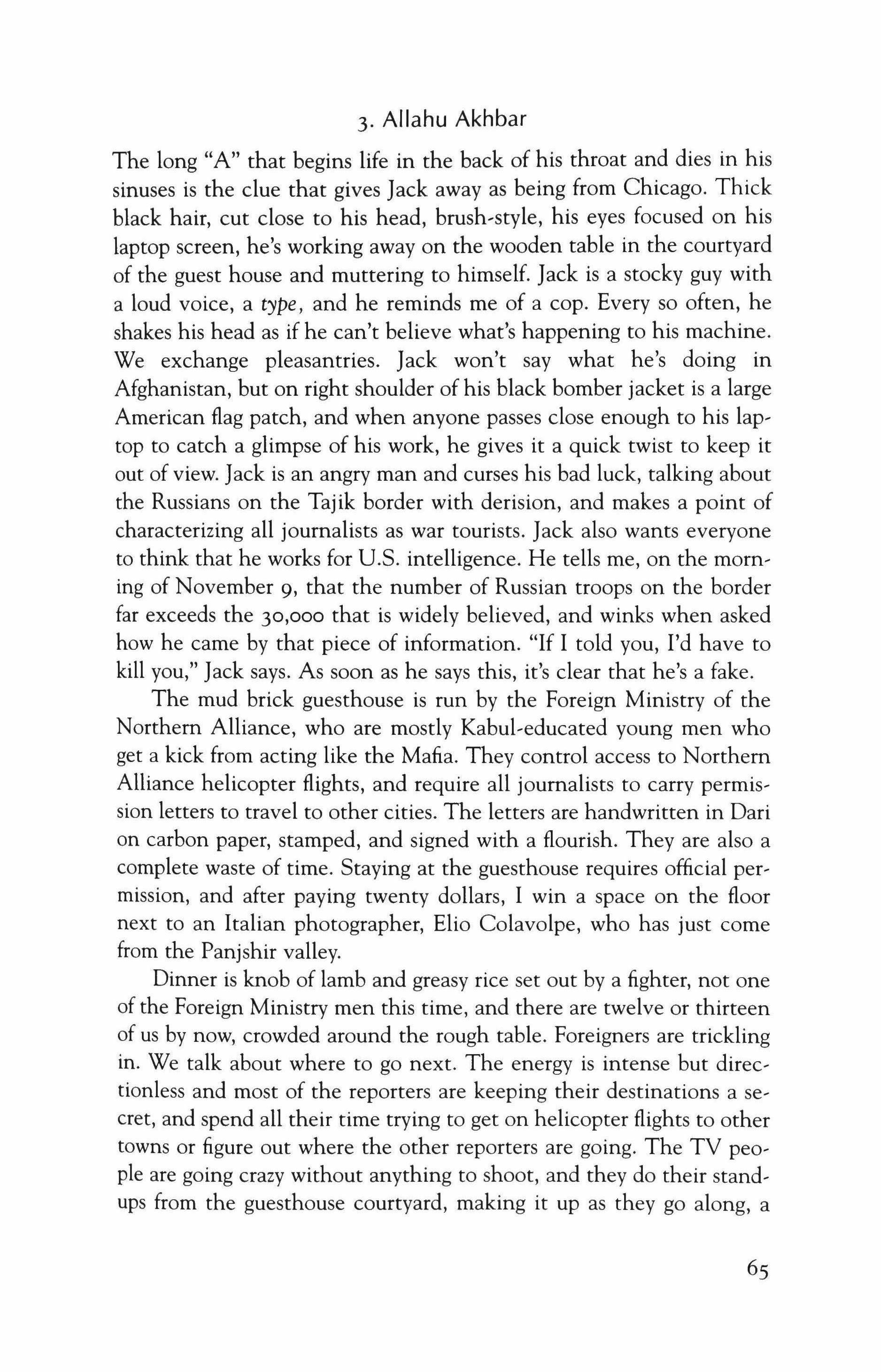
3.
Allahu AkhbarThe long "A" that begins life in the back of his throat and dies in his sinuses is the clue that gives Jack away as being from Chicago. Thick black hair, cut close to his head, brush-style, his eyes focused on his laptop screen, he's working away on the wooden table in the courtyard of the guest house and muttering to himself. Jack is a stocky guy with a loud voice, a type, and he reminds me of a cop. Every so often, he shakes his head as if he can't believe what's happening to his machine. We exchange pleasantries. Jack won't say what he's doing in Afghanistan, but on right shoulder of his black bomber jacket is a large American flag patch, and when anyone passes close enough to his laptop to catch a glimpse of his work, he gives it a quick twist to keep it out of view. Jack is an angry man and curses his bad luck, talking about the Russians on the Tajik border with derision, and makes a point of characterizing all journalists as war tourists. Jack also wants everyone to think that he works for U.S. intelligence. He tells me, on the morning of November 9, that the number of Russian troops on the border far exceeds the 30,000 that is widely believed, and winks when asked how he came by that piece of information. "If I told you, I'd have to kill you," Jack says. As soon as he says this, it's clear that he's a fake.
The mud brick guesthouse is run by the Foreign Ministry of the Northern Alliance, who are mostly Kabul-educated young men who get a kick from acting like the Mafia. They control access to Northern Alliance helicopter flights, and require all journalists to carry permission letters to travel to other cities. The letters are handwritten in Dari on carbon paper, stamped, and signed with a flourish. They are also a complete waste of time. Staying at the guesthouse requires official permission, and after paying twenty dollars, I win a space on the floor next to an Italian photographer, Elio Colavolpe, who has just come from the Panjshir valley.
Dinner is knob of lamb and greasy rice set out by a fighter, not one of the Foreign Ministry men this time, and there are twelve or thirteen of us by now, crowded around the rough table. Foreigners are trickling in. We talk about where to go next. The energy is intense but directionless and most of the reporters are keeping their destinations a se� cret, and spend all their time trying to get on helicopter flights to other towns or figure out where the other reporters are going. The TV people are going crazy without anything to shoot, and they do their standups from the guesthouse courtyard, making it up as they go along, a
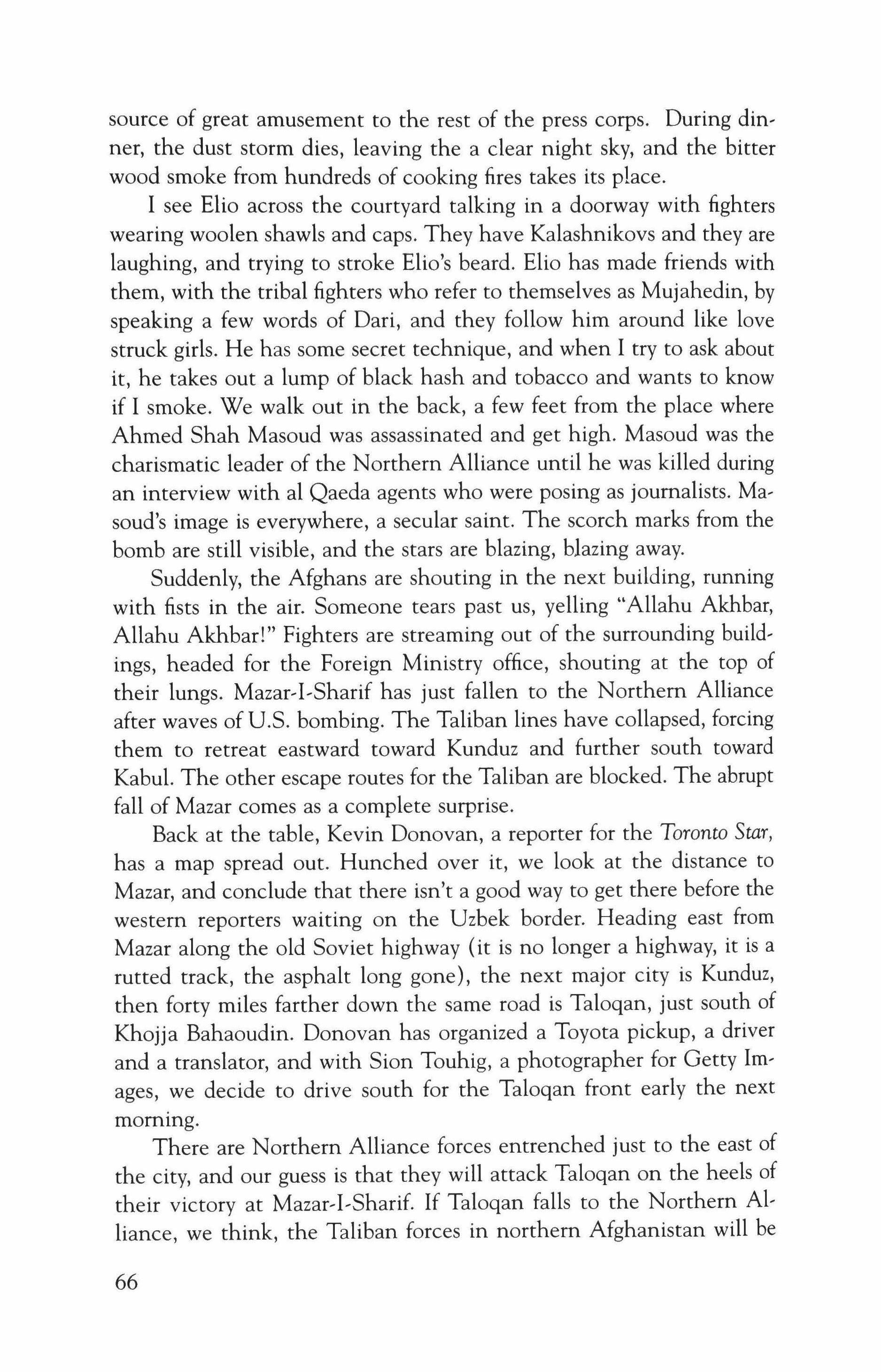
source of great amusement to the rest of the press corps. During dinner, the dust storm dies, leaving the a clear night sky, and the bitter wood smoke from hundreds of cooking fires takes its place.
I see Elio across the courtyard talking in a doorway with fighters wearing woolen shawls and caps. They have Kalashnikovs and they are laughing, and trying to stroke Elio's beard. Elio has made friends with them, with the tribal fighters who refer to themselves as Mujahedin, by speaking a few words of Dari, and they follow him around like love struck girls. He has some secret technique, and when I try to ask about it, he takes out a lump of black hash and tobacco and wants to know if I smoke. We walk out in the back, a few feet from the place where Ahmed Shah Masoud was assassinated and get high. Masoud was the charismatic leader of the Northern Alliance until he was killed during an interview with al Qaeda agents who were posing as journalists. Masoud's image is everywhere, a secular saint. The scorch marks from the bomb are still visible, and the stars are blazing, blazing away.
Suddenly, the Afghans are shouting in the next building, running with fists in the air. Someone tears past us, yelling "Allahu Akhbar, Allahu Akhbarl" Fighters are streaming out of the surrounding buildings, headed for the Foreign Ministry office, shouting at the top of their lungs. Mazar-l-Sharif has just fallen to the Northern Alliance after waves of U.S. bombing. The Taliban lines have collapsed, forcing them to retreat eastward toward Kunduz and further south toward Kabul. The other escape routes for the Taliban are blocked. The abrupt fall of Mazar comes as a complete surprise.
Back at the table, Kevin Donovan, a reporter for the Toronto Star, has a map spread out. Hunched over it, we look at the distance to Mazar, and conclude that there isn't a good way to get there before the western reporters waiting on the Uzbek border. Heading east from Mazar along the old Soviet highway (it is no longer a highway, it is a rutted track, the asphalt long gone), the next major city is Kunduz, then forty miles farther down the same road is Taloqan, just south of Khojja Bahaoudin. Donovan has organized a Toyota pickup, a driver and a translator, and with Sion Touhig, a photographer for Getty Images, we decide to drive south for the Taloqan front early the next morning.
There are Northern Alliance forces entrenched just to the east of the city, and our guess is that they will attack Taloqan on the heels of their victory at Mazar-l-Sharif. If Taloqan falls to the Northern Alliance, we think, the Taliban forces in northern Afghanistan will be

surrounded, trapped between Mazar-l-Sharif and Kunduz. Donovan talks the Foreign Ministry officials into issuing a letter authorizing us to travel to the front, which we are supposed to hand over to General Daoud Khan when we find him at his headquarters in Farkhar.
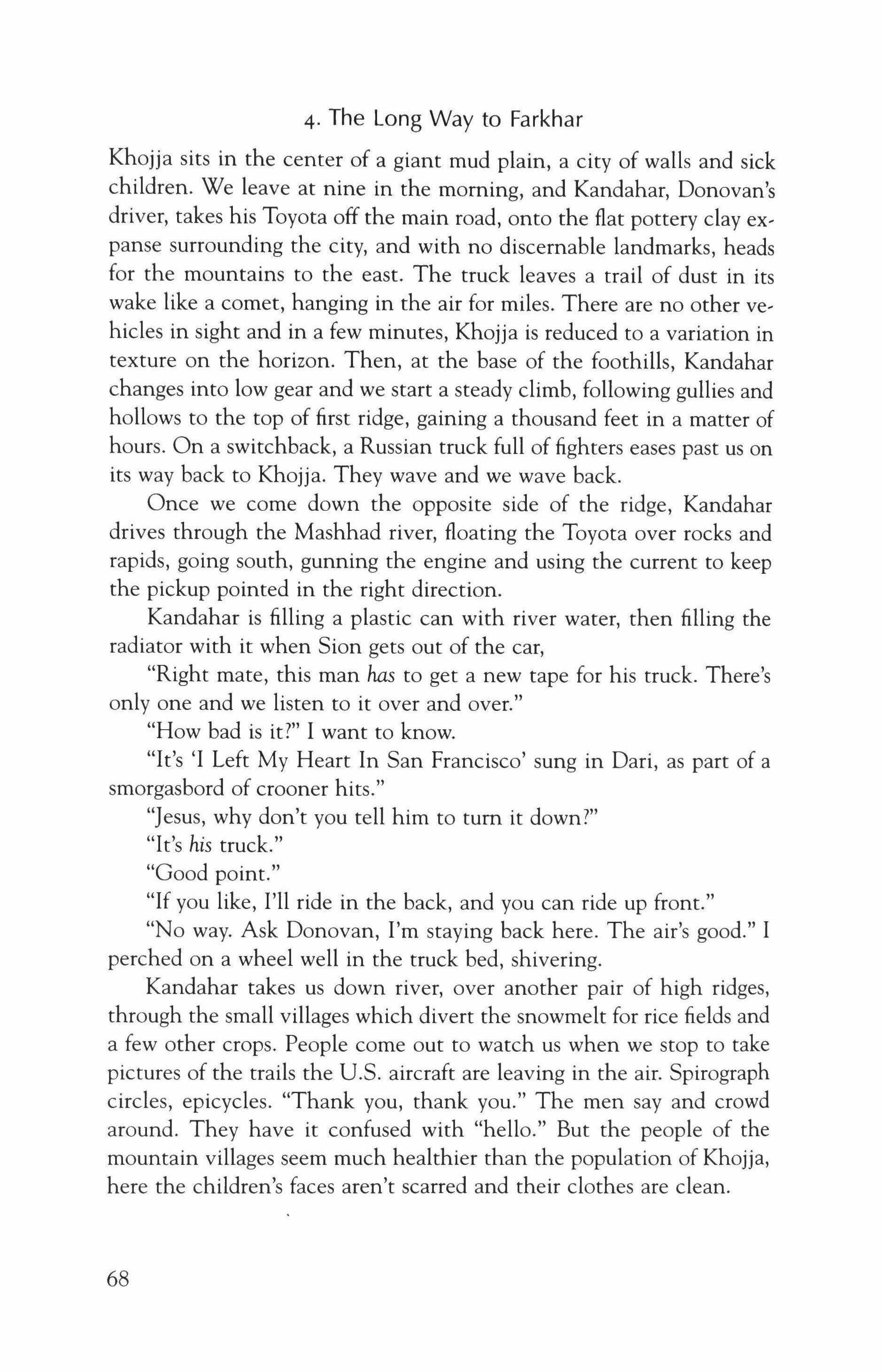
4. The Long Way to Farkhar
Khojja sits in the center of a giant mud plain, a city of walls and sick children. We leave at nine in the morning, and Kandahar, Donovan's driver, takes his Toyota off the main road, onto the flat pottery clay expanse surrounding the city, and with no discernable landmarks, heads for the mountains to the east. The truck leaves a trail of dust in its wake like a comet, hanging in the air for miles. There are no other vehicles in sight and in a few minutes, Khojja is reduced to a variation in texture on the horizon. Then, at the base of the foothills, Kandahar changes into low gear and we start a steady climb, following gullies and hollows to the top of first ridge, gaining a thousand feet in a matter of hours. On a switchback, a Russian truck full of fighters eases past us on its way back to Khojja. They wave and we wave back.
Once we come down the opposite side of the ridge, Kandahar drives through the Mashhad river, floating the Toyota over rocks and rapids, going south, gunning the engine and using the current to keep the pickup pointed in the right direction.
Kandahar is filling a plastic can with river water, then filling the radiator with it when Sian gets out of the car,
"Right mate, this man has to get a new tape for his truck. There's only one and we listen to it over and over."
"How bad is it!" I want to know.
"It's 'I Left My Heart In San Francisco' sung in Dari, as part of a smorgasbord of crooner hits."
"Jesus, why don't you tell him to tum it down?"
"It's his truck."
"Good point."
"If you like, I'll ride in the back, and you can ride up front."
"No way. Ask Donovan, I'm staying back here. The air's good." I perched on a wheel well in the truck bed, shivering.
Kandahar takes us down river, over another pair of high ridges, through the small villages which divert the snowmelt for rice fields and a few other crops. People come out to watch us when we stop to take pictures of the trails the U.S. aircraft are leaving in the air. Spirograph circles, epicycles. "Thank you, thank you." The men say and crowd around. They have it confused with "hello." But the people of the mountain villages seem much healthier than the population of Khojja, here the children's faces aren't scarred and their clothes are clean.

The stars come out while we ride down the center of one of the high valleys. We drive for thirteen hours, coming back down out of the mountains thirty miles east of Taloqan.
Farkhar is a smuggling town populated by soldiers and bazaar men and we get there late. The main street has two stories of wooden shops without street-facing walls. They are open to the air, and lit by fires in barrels and kerosene lanterns, like a set for a play at the end of the world. At the far end of the street, through a narrow door is Daoud Khan's house, with the same plan as the other Afghan houses, only grander, with fifteen-foot walls and a generator. Kandahar brings his truck through the gates of the compound to keep it safe and Daoud Khan's men show us to our rooms on the first floor, then bring dinner. Dinner is lamb kabobs and rice. Sion sends his pictures up to the satellite while Donovan calls his wife. It's agreed that we will set out for the front in the morning with the letter for Daoud Khan. It's two miles west of Farkhar. Tomorrow is Sunday, November I I.

5. Taloqan
In the morning the generator is making bad noises and we drink green tea before throwing the gear in the truck. The sky is clear and the air isn't cold but it still has an edge to it. In the courtyard, Kandahar has the hood up and he's looking for the coolant leak which keeps us from going more than five miles without having to stop and add water from the nearest stream. He gives up looking for the leak and stores water in cans to keep the radiator from running dry. While Sion is loading the truck, he notices a flat tire, but Kandahar had seen the puncture before him and disappears to find a replacement. Kandahar has it fixed in less than ten minutes. We climb in, sitting on piles of gear.
Just outside of town, at a green concrete building that Khan is using for his headquarters, we try talking to some of the senior staff who don't tell us anything. Someone important is speaking rapid fire Dari on a satellite phone, and it could be Khan but we're not sure because they won't let us inside to talk to him. The antennas are on the concrete veranda, facing in the direction of the Indian Ocean, their wires tangled. We get back in the truck and head down the road out of town to where the front is supposed to be. The letter is meaningless, the Afghan soldiers don't ask to see it because that's the foreign ministry's job and they haven't made it here yet. Go ahead, said one man in the green house, you can go down there if you want, it's O.K.
Kandahar heads west, away from the mountains on the remains of a decent road which is where we find the groups of fighters. And there are more of them every half mile, but the drive is slow, less than five miles an hour because of the terrain. We follow a river running in a wide valley, the road skirting the valley, rocks and outcroppings on the right side of the truck. Traffic is slow. There are more forces here. Kandahar is waved to a stop by one of Daoud Khan's soldiers and directly in front of the Toyota is an older man leading a white mare. The horse is saddled and riderless because it belongs to the general Khan. It is the old man's only duty to keep it in sight at all times, and he is proud of his job. From the rocks overlooking the road we look west with binoculars toward Taloqan but can't see anything. Then the shelling begins and there are explosions and blooms of dust on the hills above the Taloqan road.
At the base of the hill, Daoud Khan talks to his commanders and comes to a decision and in a few minutes the jeeps are moving forward and we have to run down the hill to meet up with Kandahar who has
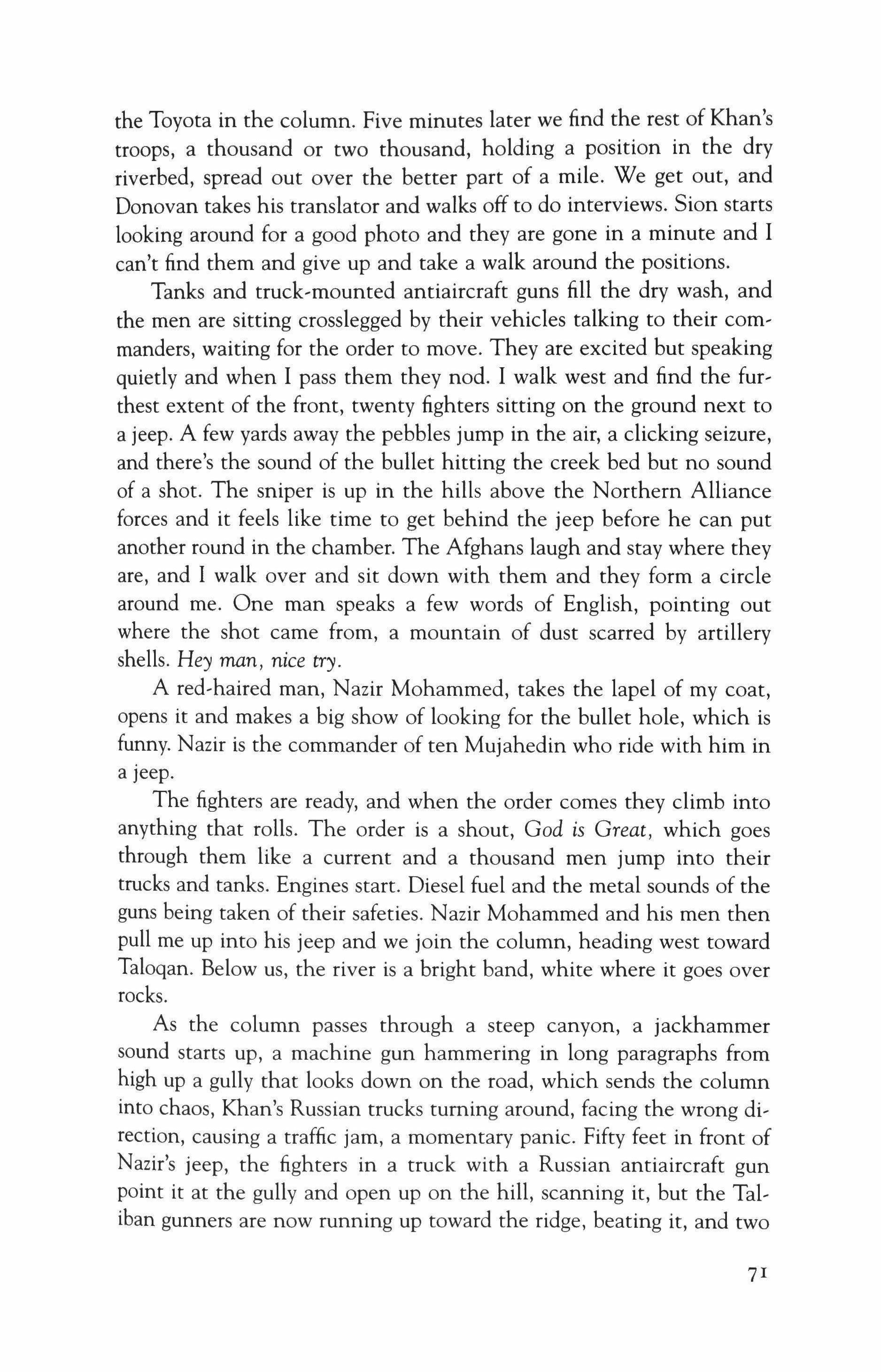
the Toyota in the column. Five minutes later we find the rest of Khan's troops, a thousand or two thousand, holding a position in the dry riverbed, spread out over the better part of a mile. We get out, and Donovan takes his translator and walks off to do interviews. Sion starts looking around for a good photo and they are gone in a minute and I can't find them and give up and take a walk around the positions.
Tanks and truck,mounted antiaircraft guns fill the dry wash, and the men are sitting crossIegged by their vehicles talking to their com' manders, waiting for the order to move. They are excited but speaking quietly and when I pass them they nod. I walk west and find the fur, thest extent of the front, twenty fighters sitting on the ground next to a jeep. A few yards away the pebbles jump in the air, a clicking seizure, and there's the sound of the bullet hitting the creek bed but no sound of a shot. The sniper is up in the hills above the Northern Alliance forces and it feels like time to get behind the jeep before he can put another round in the chamber. The Afghans laugh and stay where they are, and I walk over and sit down with them and they form a circle around me. One man speaks a few words of English, pointing out where the shot came from, a mountain of dust scarred by artillery shells. Hey man, nice try.
A red-haired man, Nazir Mohammed, takes the lapel of my coat, opens it and makes a big show of looking for the bullet hole, which is funny. Nazir is the commander of ten Mujahedin who ride with him in a jeep.
The fighters are ready, and when the order comes they climb into anything that rolls. The order is a shout, God is Great, which goes through them like a current and a thousand men jump into their trucks and tanks. Engines start. Diesel fuel and the metal sounds of the guns being taken of their safeties. Nazir Mohammed and his men then pull me up into his jeep and we join the column, heading west toward Taloqan. Below us, the river is a bright band, white where it goes over rocks.
As the column passes through a steep canyon, a jackhammer sound starts up, a machine gun hammering in long paragraphs from high up a gully that looks down on the road, which sends the column into chaos, Khan's Russian trucks turning around, facing the wrong direction, causing a traffic jam, a momentary panic. Fifty feet in front of Nazir's jeep, the fighters in a truck with a Russian antiaircraft gun point it at the gully and open up on the hill, scanning it, but the Tal, iban gunners are now running up toward the ridge, beating it, and two

of Khan's fighters get out and head after them. There is a burst of gunfire from two of Khan's men with the Kalashnikovs and it's over. Soon, the column straightens itself out and we're back on the road.
Another fifty feet and there's one black boot is in the middle of the road, in a pool of blood, the man's foot still in it, the rest of him somewhere else. Nazir steers around it.
On the outskirts of Taloqan, hundreds of men and boys are waiting to greet the fighters and they are shouting, and the fighters are shouting the name of God. As we come up to the city, the crowd swells until it surges over the trucks and the tanks, the kids climb up and the fighters lift them in. People waiting by the side of the road begin throwing coins and small bills into the air to the fighters, a rain of coins bouncing off the metal of the cars, then landing in the street.

November I I, 2001
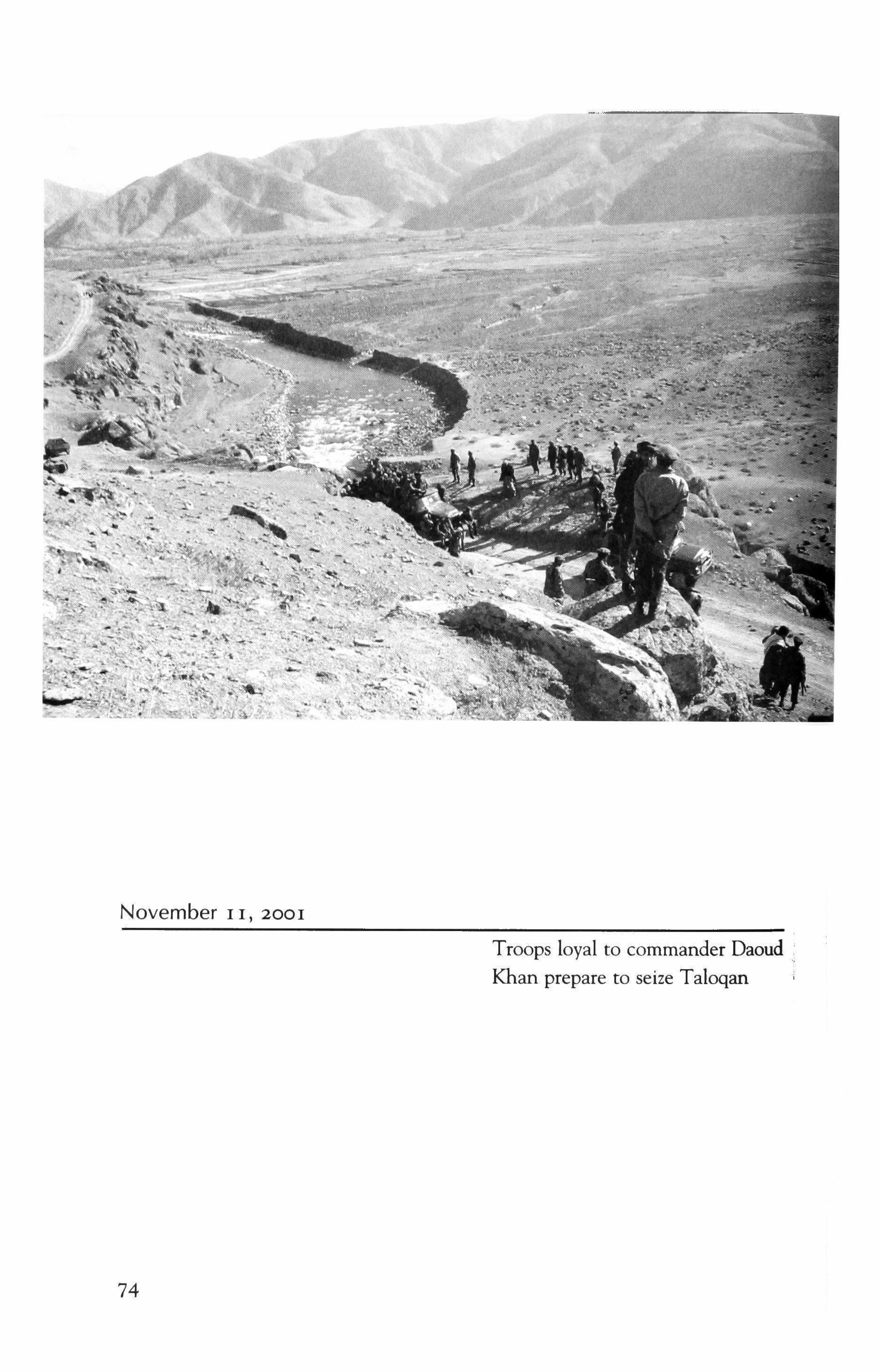
Troops loyal to commander Daoud Khan prepare to seize Taloqan
November II, 2001
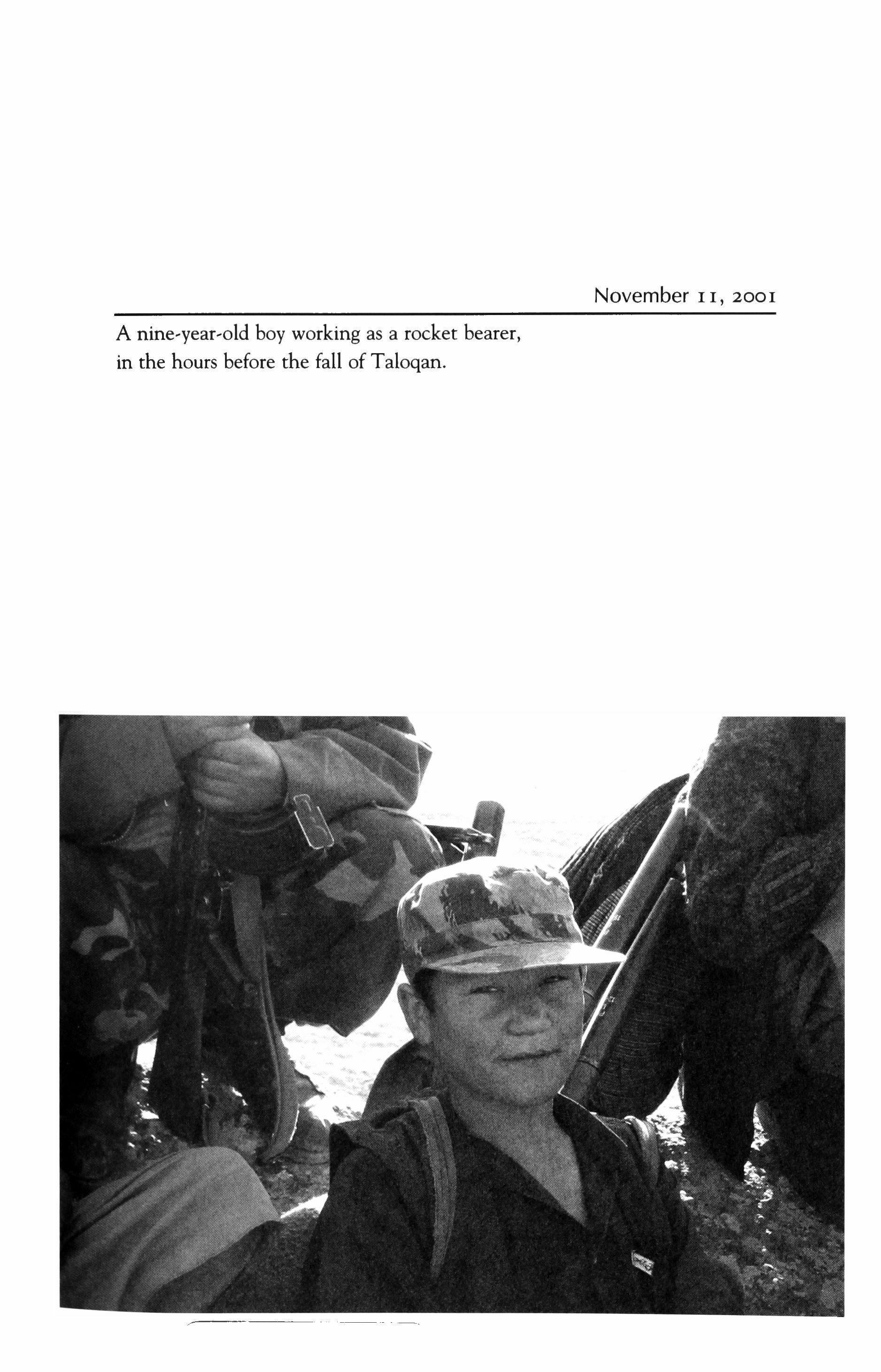
A nine-year-old boy working as a rocket bearer, in the hours before the fall of Taloqan.
November 25, 2001
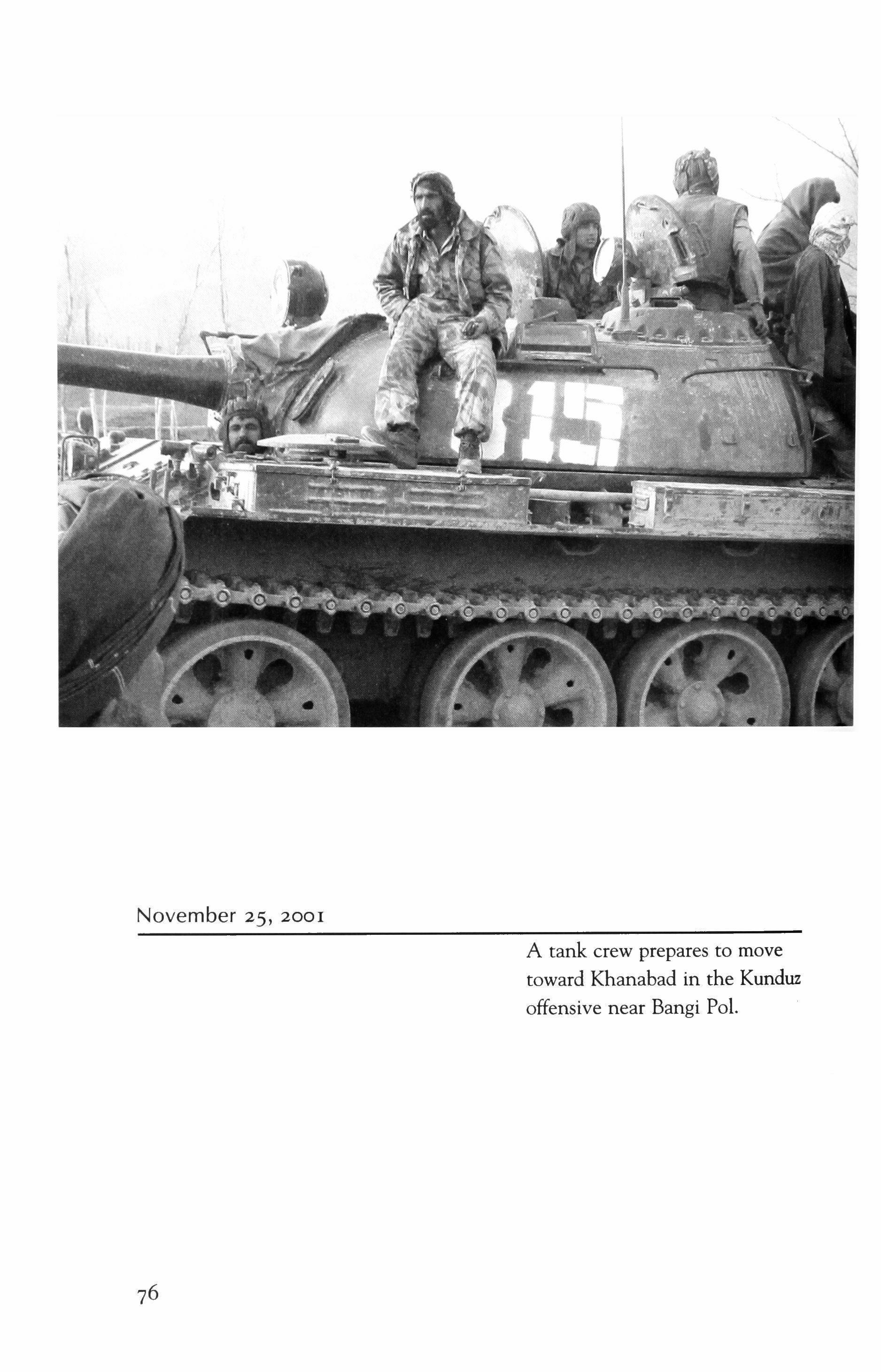
A tank crew prepares to move toward Khanabad in the Kunduz offensive near Bangi Pol.
November 24, 2001
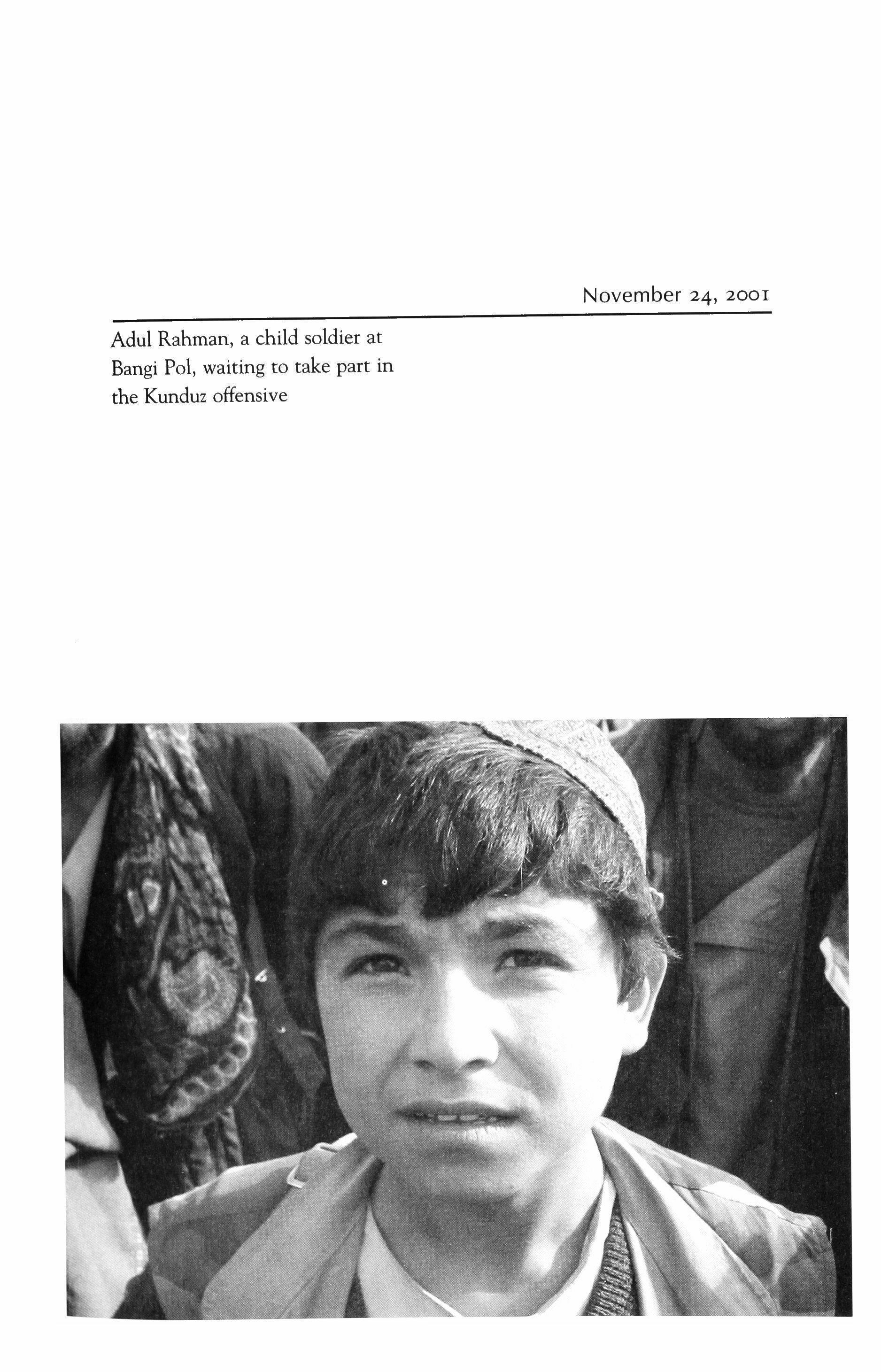
Adul Rahman, a child soldier at Bangi Pol, waiting to take part in the Kunduz offensive
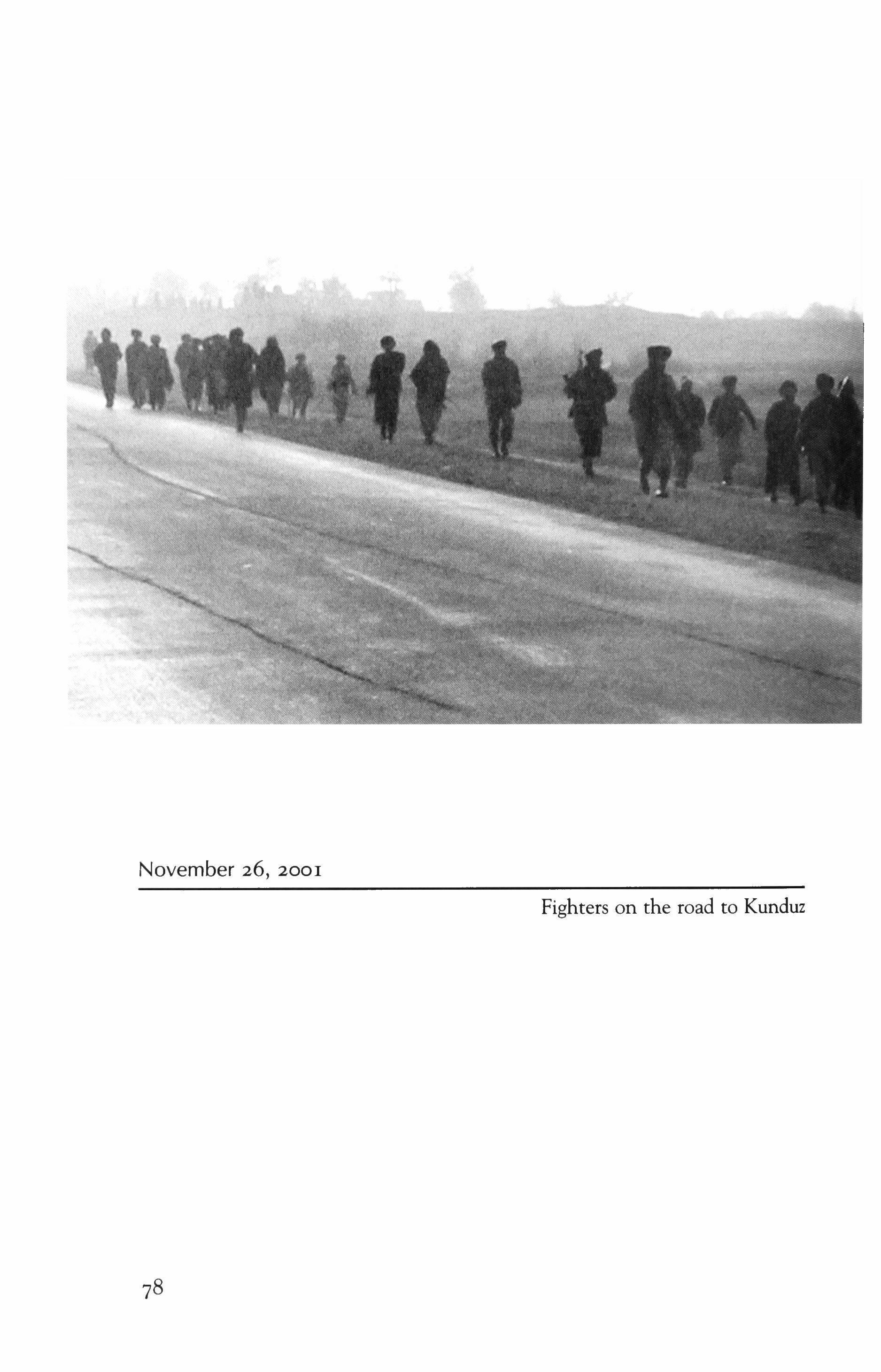
November 26, 200I
Fighters on the road to Kunduz
January 19, 2001
Bibi Jan, a war widow, in the Sar Shahi refugee camp near Jalalabad
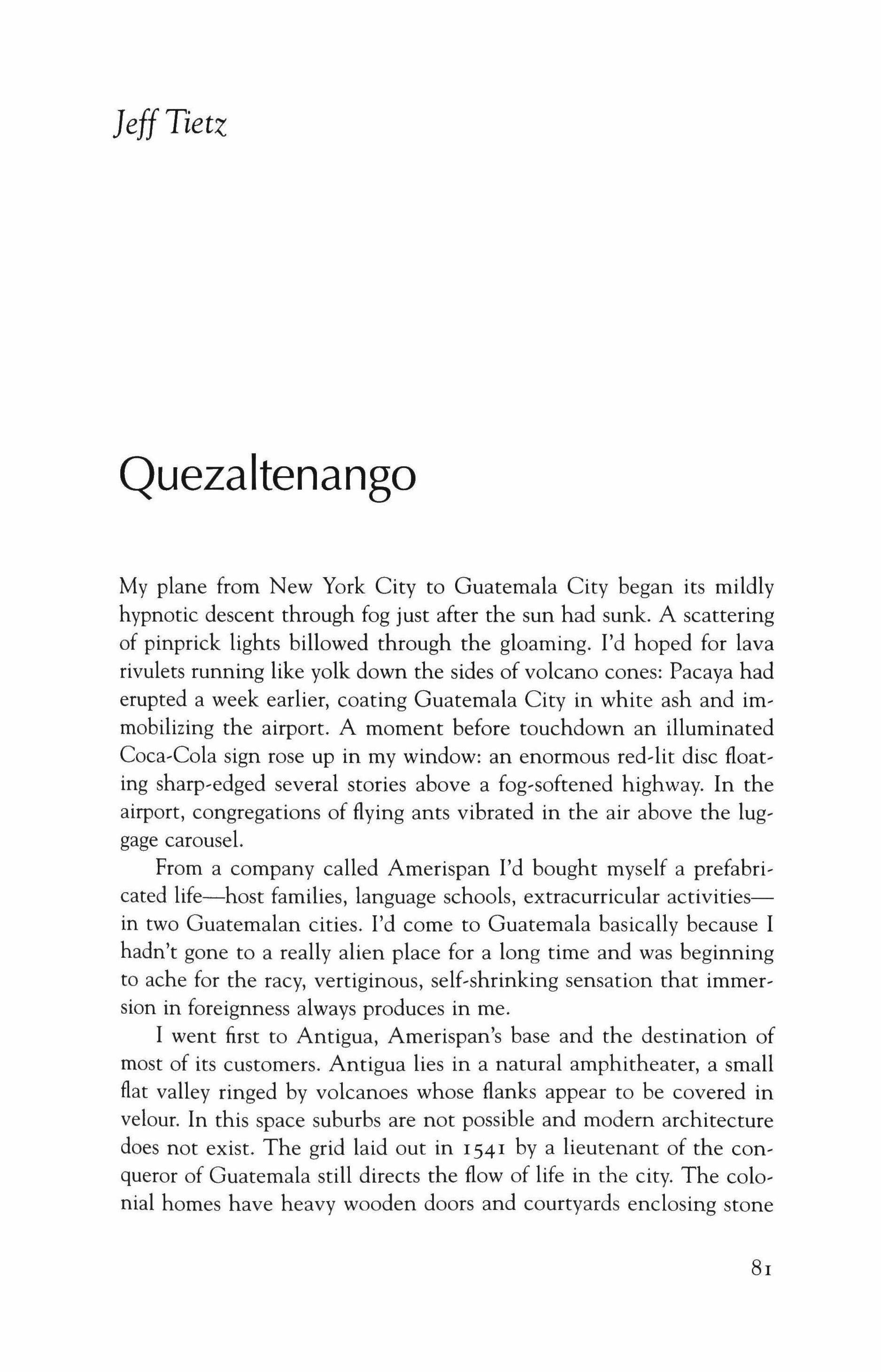
My plane from New York City to Guatemala City began its mildly hypnotic descent through fog just after the sun had sunk. A scattering of pinprick lights billowed through the gloaming. I'd hoped for lava rivulets running like yolk down the sides of volcano cones: Pacaya had erupted a week earlier, coating Guatemala City in white ash and immobilizing the airport. A moment before touchdown an illuminated Coca-Cola sign rose up in my window: an enormous red-lit disc floating sharp-edged several stories above a fog-softened highway. In the airport, congregations of flying ants vibrated in the air above the luggage carousel.
From a company called Amerispan I'd bought myself a prefabricated life-host families, language schools, extracurricular activitiesin two Guatemalan cities. I'd come to Guatemala basically because I hadn't gone to a really alien place for a long time and was beginning to ache for the racy, vertiginous, self-shrinking sensation that immersion in foreignness always produces in me.
I went first to Antigua, Amerispan's base and the destination of most of its customers. Antigua lies in a natural amphitheater, a small flat valley ringed by volcanoes whose flanks appear to be covered in velour. In this space suburbs are not possible and modem architecture does not exist. The grid laid out in 154 I by a lieutenant of the conqueror of Guatemala still directs the flow of life in the city. The colonial homes have heavy wooden doors and courtyards enclosing stone

fountains; the cobbled streets retain their original flagstones. Today the big estates sell for millions of dollars. Guatemalans, outnumbered in the streets of Antigua by the tourists and foreign property owners who entirely sustain its economy, generally can't afford to live there.
I walked the cobbled streets to my Spanish lessons, returning at noon for lunch, which was prepared and brought to the table by Indian servants. After lunch I took a nap, leaving the door to the courtyard open. The courtyard had a fountain and volcano views and flower beds attended by hummingbirds. I established a routine of flirtation with a waitress at the American bar, whose patrons were foreign travelers and wealthy, light-skinned Guatemalans. I played basketball at the edge of town; just behind the court was a colonial church in a state of gorgeous ruination. The Guatemalan quetzal, pleasingly, never registered as a unit of real currency. Rain disturbed the clarity of the sky very briefly every day; the high was always eighty-five.
Then I went to Quezaltenango. The occasional letters I get from people I met there are like those serendipitously encountered talismanic objects that recall entire dreams. In Guatemala the earth shakes; the electricity fails; people disappear; volcano cones fill with water and burst, washing away cities; sudden plagues overpopulate cemeteries; governments, transient between revolutions, force everyone to pretend truth is what it's not; fifteen thousand mines classified by the United Nations as high-risk threaten one hundred and eight municipalities. In Quezaltenango I was informed that exorcised spirits exit bodies in streams of green vomit, pigs melt, the odor of onion beats back intestinal worms summoned up through the orifices of Indian children by thunder, indigenous saints exhibit supernatural powers, and dreamed green snakes offer protection.
The teeming transfer point from Antigua to Quezaltenango is Chimaltenango: a zealous promoter shoved me onto a derelict public bus. I didn't put up a fight because I was suddenly sick of waiting with all my stuff in the clogged, sun-stricken street. For four hours I stood swaying in an unventilated clot of Indians as the bus veered around mountains, but I liked it: the first-class path not taken, the guidebook-supplied knowledge that highway robbers rarely target public buses, the braving of pickpockets (gold-toothed Indian women tenderly warning me to guard my wallet).
Quezaltenango is usually called by its Quiche name, Xela (SHAYla), which means "under the ten"-the ten surrounding peaks. It's a
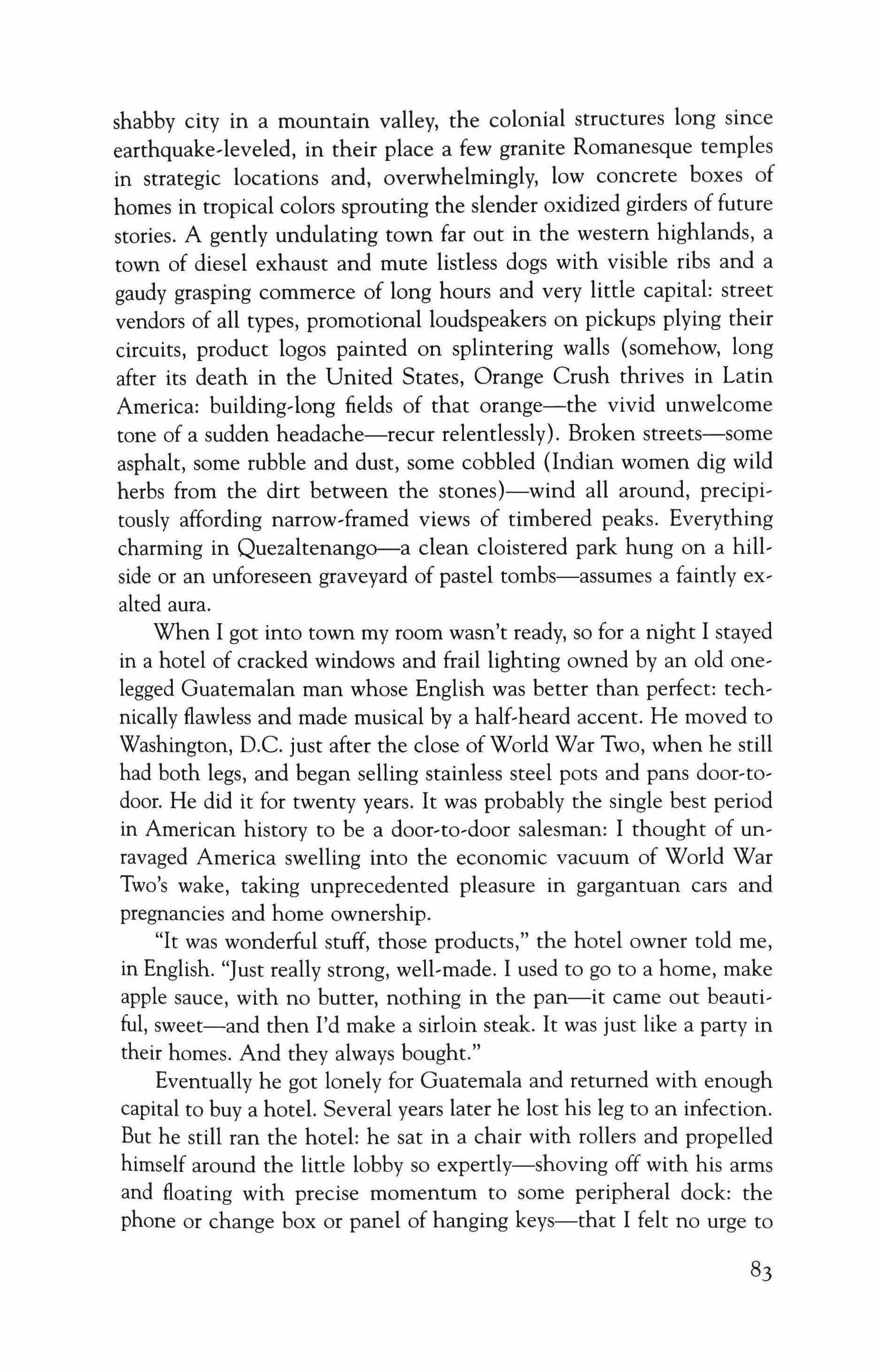
shabby city in a mountain valley, the colonial structures long since earthquake-leveled, in their place a few granite Romanesque temples in strategic locations and, overwhelmingly, low concrete boxes of homes in tropical colors sprouting the slender oxidized girders of future stories. A gently undulating town far out in the western highlands, a town of diesel exhaust and mute listless dogs with visible ribs and a gaudy grasping commerce of long hours and very little capital: street vendors of all types, promotional loudspeakers on pickups plying their circuits, product logos painted on splintering walls (somehow, long after its death in the United States, Orange Crush thrives in Latin America: building-long fields of that orange-the vivid unwelcome tone of a sudden headache-recur relentlessly). Broken streets-some asphalt, some rubble and dust, some cobbled (Indian women dig wild herbs from the dirt between the stones)-wind all around, precipitously affording narrow-framed views of timbered peaks. Everything charming in Quezaltenango-a clean cloistered park hung on a hillside or an unforeseen graveyard of pastel tombs-assumes a faintly exalted aura.
When I got into town my room wasn't ready, so for a night I stayed in a hotel of cracked windows and frail lighting owned by an old one� legged Guatemalan man whose English was better than perfect: technically flawless and made musical by a half-heard accent. He moved to Washington, D.C. just after the close of World War Two, when he still had both legs, and began selling stainless steel pots and pans door-todoor. He did it for twenty years. It was probably the single best period in American history to be a door-to-door salesman: I thought of unravaged America swelling into the economic vacuum of World War Two's wake, taking unprecedented pleasure in gargantuan cars and pregnancies and home ownership.
"It was wonderful stuff, those products," the hotel owner told me, in English. "Just really strong, well-made. I used to go to a home, make apple sauce, with no butter, nothing in the pan-it came out beautiful, sweet-and then I'd make a sirloin steak. It was just like a party in their homes. And they always bought."
Eventually he got lonely for Guatemala and returned with enough capital to buy a hotel. Several years later he lost his leg to an infection. But he still ran the hotel: he sat in a chair with rollers and propelled himself around the little lobby so expertly-shoving off with his arms and floating with precise momentum to some peripheral dock: the phone or change box or panel of hanging keys-that I felt no urge to
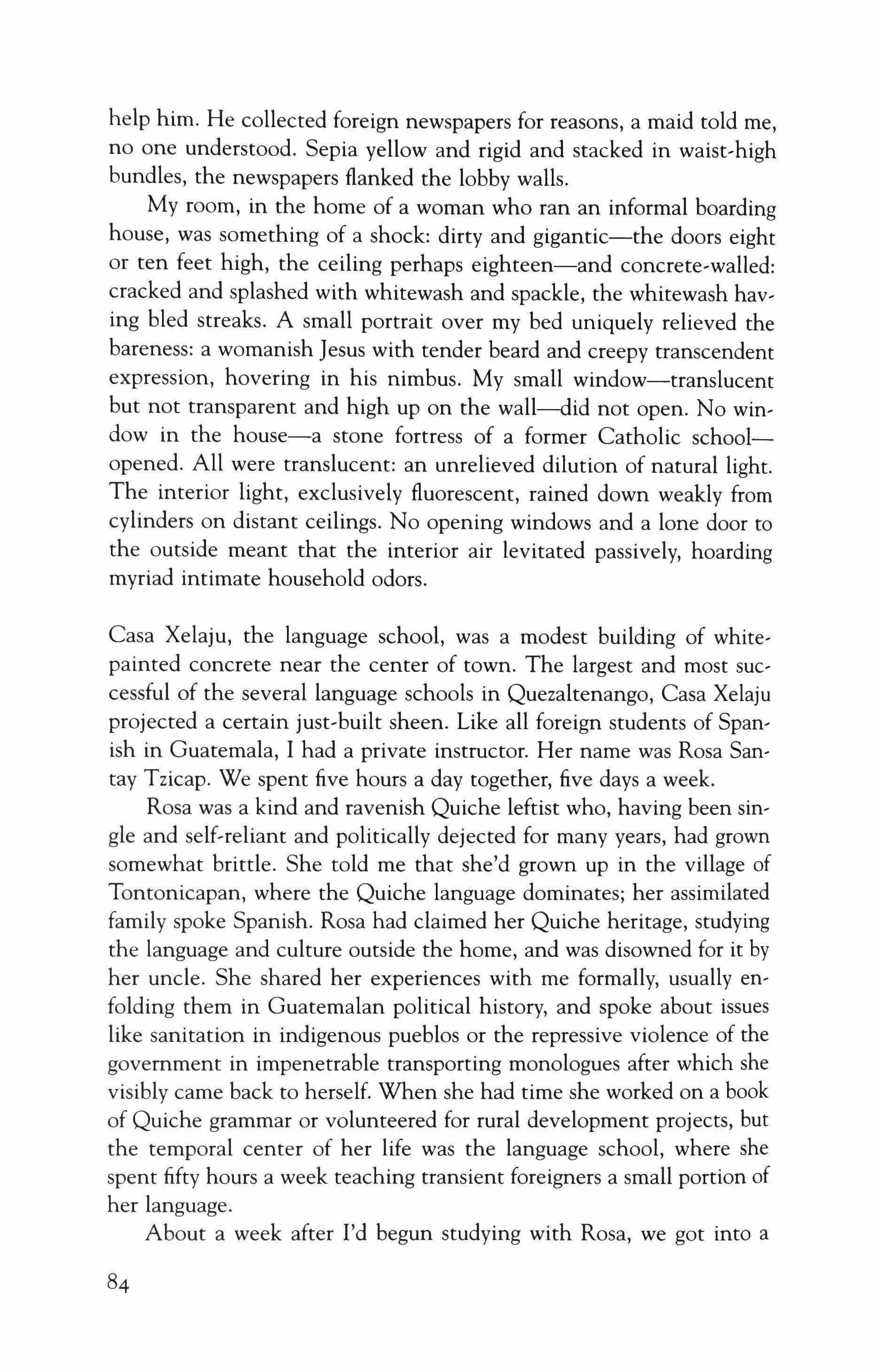
help him. He collected foreign newspapers for reasons, a maid told me, no one understood. Sepia yellow and rigid and stacked in waist-high bundles, the newspapers flanked the lobby walls.
My room, in the home of a woman who ran an informal boarding house, was something of a shock: dirty and gigantic-the doors eight or ten feet high, the ceiling perhaps eighteen-and concrete'walled: cracked and splashed with whitewash and spackle, the whitewash having bled streaks. A small portrait over my bed uniquely relieved the bareness: a womanish Jesus with tender beard and creepy transcendent expression, hovering in his nimbus. My small window-translucent but not transparent and high up on the wall-did not open. No win' dow in the house-a stone fortress of a former Catholic schoolopened. All were translucent: an unrelieved dilution of natural light. The interior light, exclusively fluorescent, rained down weakly from cylinders on distant ceilings. No opening windows and a lone door to the outside meant that the interior air levitated passively, hoarding myriad intimate household odors.
Casa Xelaju, the language school, was a modest building of white' painted concrete near the center of town. The largest and most sue, cessful of the several language schools in Quezaltenango, Casa Xelaju projected a certain just-built sheen. Like all foreign students of Span' ish in Guatemala, I had a private instructor. Her name was Rosa San, tay Tzicap. We spent five hours a day together, five days a week.
Rosa was a kind and ravenish Quiche leftist who, having been sin' gle and self,reliant and politically dejected for many years, had grown somewhat brittle. She told me that she'd grown up in the village of Tontonicapan, where the Quiche language dominates; her assimilated family spoke Spanish. Rosa had claimed her Quiche heritage, studying the language and culture outside the home, and was disowned for it by her uncle. She shared her experiences with me formally, usually en' folding them in Guatemalan political history, and spoke about issues like sanitation in indigenous pueblos or the repressive violence of the government in impenetrable transporting monologues after which she visibly came back to herself. When she had time she worked on a book of Quiche grammar or volunteered for rural development projects, but the temporal center of her life was the language school, where she spent fifty hours a week teaching transient foreigners a small portion of her language.
About a week after I'd begun studying with Rosa, we got into a
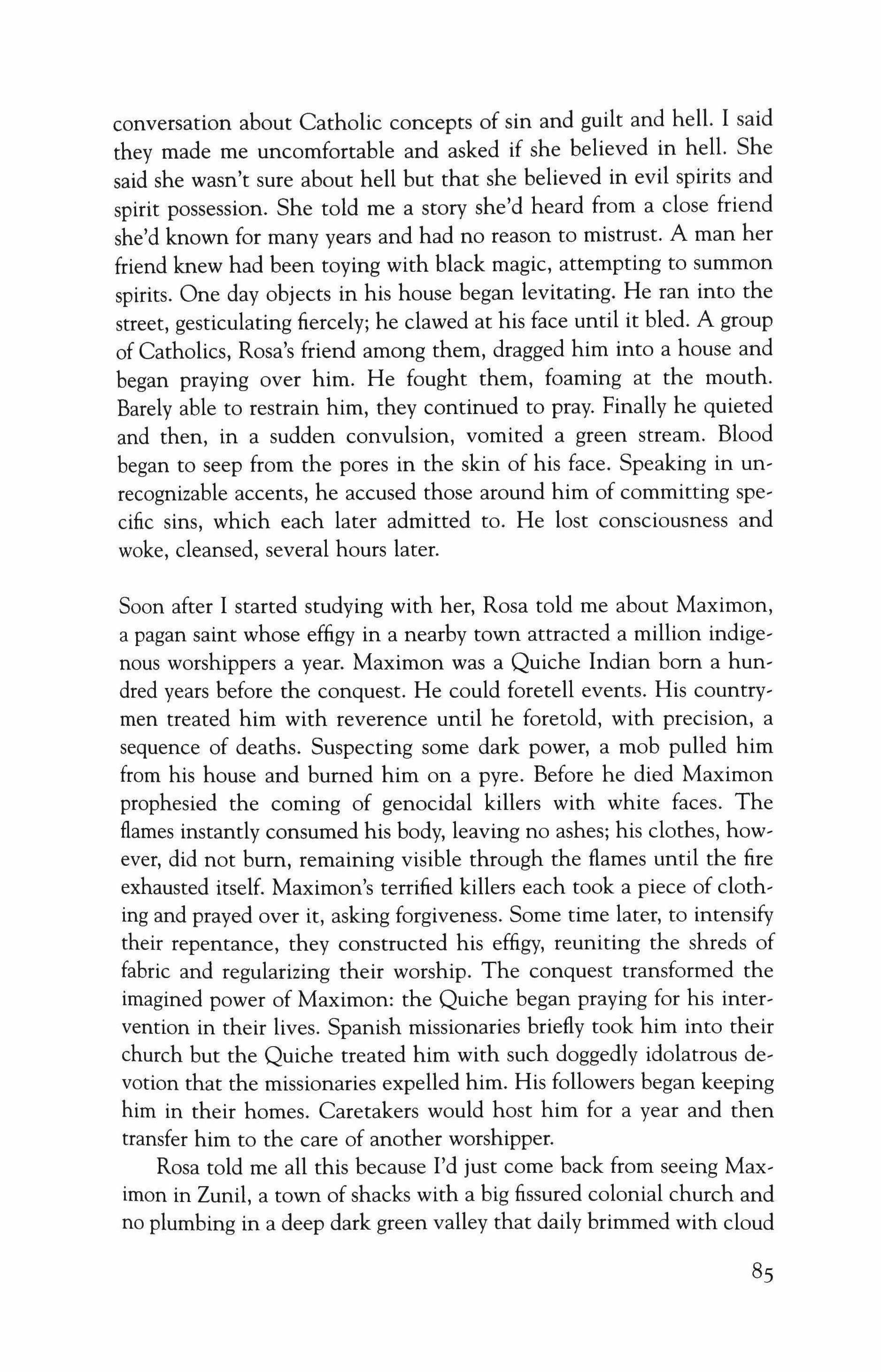
conversation about Catholic concepts of sin and guilt and hell. I said they made me uncomfortable and asked if she believed in hell. She said she wasn't sure about hell but that she believed in evil spirits and spirit possession. She told me a story she'd heard from a close friend she'd known for many years and had no reason to mistrust. A man her friend knew had been toying with black magic, attempting to summon spirits. One day objects in his house began levitating. He ran into the street, gesticulating fiercely; he clawed at his face until it bled. A group of Catholics, Rosa's friend among them, dragged him into a house and began praying over him. He fought them, foaming at the mouth. Barely able to restrain him, they continued to pray. Finally he quieted and then, in a sudden convulsion, vomited a green stream. Blood began to seep from the pores in the skin of his face. Speaking in unrecognizable accents, he accused those around him of committing specific sins, which each later admitted to. He lost consciousness and woke, cleansed, several hours later.
Soon after I started studying with her, Rosa told me about Maximon, a pagan saint whose effigy in a nearby town attracted a million indigenous worshippers a year. Maximon was a Quiche Indian born a hundred years before the conquest. He could foretell events. His countrymen treated him with reverence until he foretold, with precision, a sequence of deaths. Suspecting some dark power, a mob pulled him from his house and burned him on a pyre. Before he died Maximon prophesied the coming of genocidal killers with white faces. The flames instantly consumed his body, leaving no ashes; his clothes, however, did not bum, remaining visible through the flames until the fire exhausted itself. Maximon's terrified killers each took a piece of clothing and prayed over it, asking forgiveness. Some time later, to intensify their repentance, they constructed his effigy, reuniting the shreds of fabric and regularizing their worship. The conquest transformed the imagined power of Maximon: the Quiche began praying for his intervention in their lives. Spanish missionaries briefly took him into their church but the Quiche treated him with such doggedly idolatrous devotion that the missionaries expelled him. His followers began keeping him in their homes. Caretakers would host him for a year and then transfer him to the care of another worshipper.
Rosa told me all this because I'd just come back from seeing Maximon in Zunil, a town of shacks with a big fissured colonial church and no plumbing in a deep dark green valley that daily brimmed with cloud

vapor. On the way to Zunil I'd passed a municipal dump on every hillock of which a black vulture reposed. Maximon resided in a thinwalled shed blackened and flickeringly lit by scores of candles set in wax discs on the floor before him. Worshippers washed themselves in the smoke of a small fire just outside. A corrugated tin lean-to protected this fire, fed and tended ceaselessly by a caretaker for the duration of the saint's stay. The caretaker sold votive candles: white for health, yellow for money, red for love, black for misfortune. The saint himself, three-quarters life size, had a button nose in a disproportionately small head of Barbie doll plastic. He sat in a rocking chair and wore a felt fedora, aviator sunglasses, a three-piece suit and cowboy boots. He was wrapped in swaths of ceremonial fabric, an eternally lit cigarette-the ashes of which were sold as a cure for insomniajammed in a corner of his stiff lipless mouth. I sat on a bench along the wall and watched Indians come and ask favors. All whispered fiercely into his ear, some with tears on their cheeks, and poured rum from a ritual cup into his mouth, a caretaker first tipping him back in his chair and removing his cigarette. A pan beneath the chair caught runoff, the effigy having been built with an artificial esophagus to conduct rum offerings down through its body. One stricken woman stroked the saint's chest as she begged in his ear.
Rosa thought the saint's caretakers, who lived off the admission fee of thirty cents per person, led a dirty and dissolute life: the skimming of the rum offerings, the saturating smoke, the accumulating trash in the trampled front yard, the long hours in the darkness of the shed and dark presence of the saint. She also thought it was dangerous to fail to respect the powers that lingered there. An American student mocked Maximon to his face; soon afterwards he was thrown from his motorcycle and badly hurt. A spurned lover of one of Rosa's uncles lit a black candle and wished alcoholism on him; he soon fell deeply into that vice. His family brought him to a Quiche priest, who divined the influence of Maximon, searched Rosa's uncle's house for charms and found, under his bed, his effigy with pins ringing its neck like a collar.
The next day Rosa told me that she dreamed of snakes a lot. She said the snake was the original Mayan god, a bridge between heaven and hell. The Maya believed that if you dreamed snakes you could see the future and were destined to be a priest. Rosa believed dreamed green snakes conferred a protective power and dreamed black snakes were warnings. The day after her first green snake dream a rich neighbor

gave her five quetzals without saying why. The day before her final high school exam-the exam that stood between her and her diplomashe dreamed she was walking down a narrow path bordered by trees infested with malignant black snakes. The importance of walking through the trees was borne in upon her; she walked unharmed and without fear. The next day the light-skinned principal of her high school, who was proctoring the exam, accused her and the only other indigenous student of cheating and tore up their work: he wanted no Indian graduates. They sought the help of other teachers and threatened retaliation. He relented, offering to give them the test again but requiring a perfect score for graduation. They studied hard for four days and passed the day before the graduation ceremony. They'd been denied uniforms because of the principal's accusation; they stayed up all night making their own. All of this, Rosa felt, was the path between the snake-infested trees. "My dream," she said, "predicted the reality that followed."
Casa Xelaju was always organizing cultural excursions for its students. I avoided most of them: I'd quickly gotten addicted to the rich sensation of disorientation that carne from wandering an alien country alone or in a small group of stunned foreigners. But I went on a school trip to the Quezaltenango military base because I couldn't have gone on my own. The commander was giving a talk about the peace accords that ended the civil war in 1996. The base-Military Zone 15�17was in an outlying neighborhood. A whitewashed wall you could walk over enclosed much of it. It was a major base but it was composed mainly of a hangar-like barracks and series of fields and storage sheds and seemed about as sophisticated and secure as a YMCA summer camp. A week earlier, on the Day of the Army, a flatbed truck bearing a ceremonial float had left the base and toured the city. The float featured a few grave soldiers waving weakly amid glitter-strewn plastic palms and various cardboard symbols of peace and national unity.
A female officer met us at the base entrance. She led us through the barracks, across a concrete basketball court covered with a layer of dust in which our feet left tracks. Armed soldiers in commando gear loitered all over the place.
We turned into a small briefing room whose chairs faced a marker board. Fifteen minutes later the commander carne in. He told us to feel at horne: his house was our house. He was a meticulous, hard-faced man who spoke with well-contained indignation. He outlined the

stages of the peace process from the perspective of military compliance, using the marker board. He was forced to work around a big permanent doodle of distorted concentric circles, like contour lines on a topographical map. We learned that the army had long since withdrawn from certain "points of concentration" in the country where the guerrillas of the UNRG (Revolutionary National Unity of Guatemala) had laid down their arms and been reintegrated into society; that all human rights violators in the army had been sentenced and now sat in jail; that the army had never laid a single mine but had deployed troops to clean up those sown with abandon by the UNRG, etc., etc.'
After his talk the commander took questions. I asked how the social justice demands of the UNRG had been addressed in the peace accords. The commander stared at me. He said, "The Guatemalan guerrilla wasn't born of social injustice. He was born of politics, of a hunger for power. The guerrillas wanted to take power by force. When they realized they couldn't succeed they took up the flag of human rights, then the flag of peace. Whatever was convenient." I asked if the social justice provisions in the accords had nothing to do, then, with UNRG ideology. "No," he said. "Those provisions come from the peace commission, from politicians. There was a collaboration by many parties, including the military. But not the UNRG."
He picked up a government booklet on the accords. It looked, with its simple illustrations and weak binding and cover of white clouds in blue sky, like a children's coloring book. He thumbed through it, reading fragments of provisions aloud: rural development, access to health care, access to education, etc. It was an effective performance. I couldn't really say anything unless I wanted to call him a liar, which seemed both pointless and possibly dangerous. When there were no more questions the commander said, "Let me thank you all again for coming. My house is your house: feel free to come by again anytime for a cup of coffee or a tour or to chat-we would welcome you with pleasure. Would anyone like coffee now?"
1 I read enough about Guatemala while I was there to make up a crude, abbreviated version of its history. Since the conquest, light-skinned dictators protecting the fantastically disproportionate wealth of an elite descended from the conquistadors have run the country. Indians have pretty much been slaves or perpetually indebted laborers or so marginal in their poverty as to be irrelevant to the national economy. Indigenous rebel movements representing the illiterate majority and opposing land theft and forced labor have always existed, and they have always been crushed. The UNRG, chiefly concerned with land redistribution, emerged in 1982 as a unification of several rebel groups. In the years leading up to the accords the national army had basically beaten it into submission. The accords required a civilian administration; for the moment the military had decided that this was good foreign policy.

A certain species of intestinal worm that infested a great number of in, digenous children responded to atmospheric storms, according to Rosa, by seeking to escape the body through its orifices, as earthworms are drawn up from the soil by rain. Rosa had heard of these worms emerging through the mouth, nose, eyes and anus. They damaged each orifice as they wriggled out. Children had suffocated with quantities of worms in their mouth and nose. There was a remedy, though: fry onions in grease just long enough to release the odor, dip pieces of soft cheese in the grease and anoint the child on the chest, forehead, belly but, ton-wherever might be effective: the odor would force the worms back into the body.
I tried to ignore the unpleasantness of my living situation. My landlady was named Carmen de Sanchez. She walked with a severe limp due to a hip injury and subsequent botched operation. Dwarfish, with short kinky hair dyed orange and the swelled girth, feeble legs, and slack scored skin of unsound late middle age, she decorated her home with religious images and pictures of herself in her youth. In these pictures she was always alone, bejeweled and made-up. Her husband had left her and her son, Juan Carlos, many years earlier. Juan Carlos was a puny, supercilious business major. Above his transparent mustache his face gleamed with adolescent oil. He was always trying to enlist me in mocking the language student who preceded me, a thin boy from Nova Scotia named Delphis. "Do you know the name for someone like Del, phis?" Juan Carlos asked me the day I arrived. "Fag. You know what that means?" He and his mother laughed and began calling Delphis all the synonyms for "fag" they could think of.
Carmen hated Indians and found her Quiche maid insolent and hopelessly stupid, but with all the foreign companies opening factories to take advantage of cheap Guatemalan labor it was getting harder to find docile Indians who would work for nothing. "If we had a war and killed all the Indians," she'd say from time to time, "I'd be happy." She hated to travel for the sake of traveling. She liked to go places where she could be comprehensively waited upon. Although there was a lovely beach two hours south of Quezaltenango and she had a car, she never went: as a girl she'd witnessed the drowning death of a friend and ever since had thought of the sea as a malevolent force.
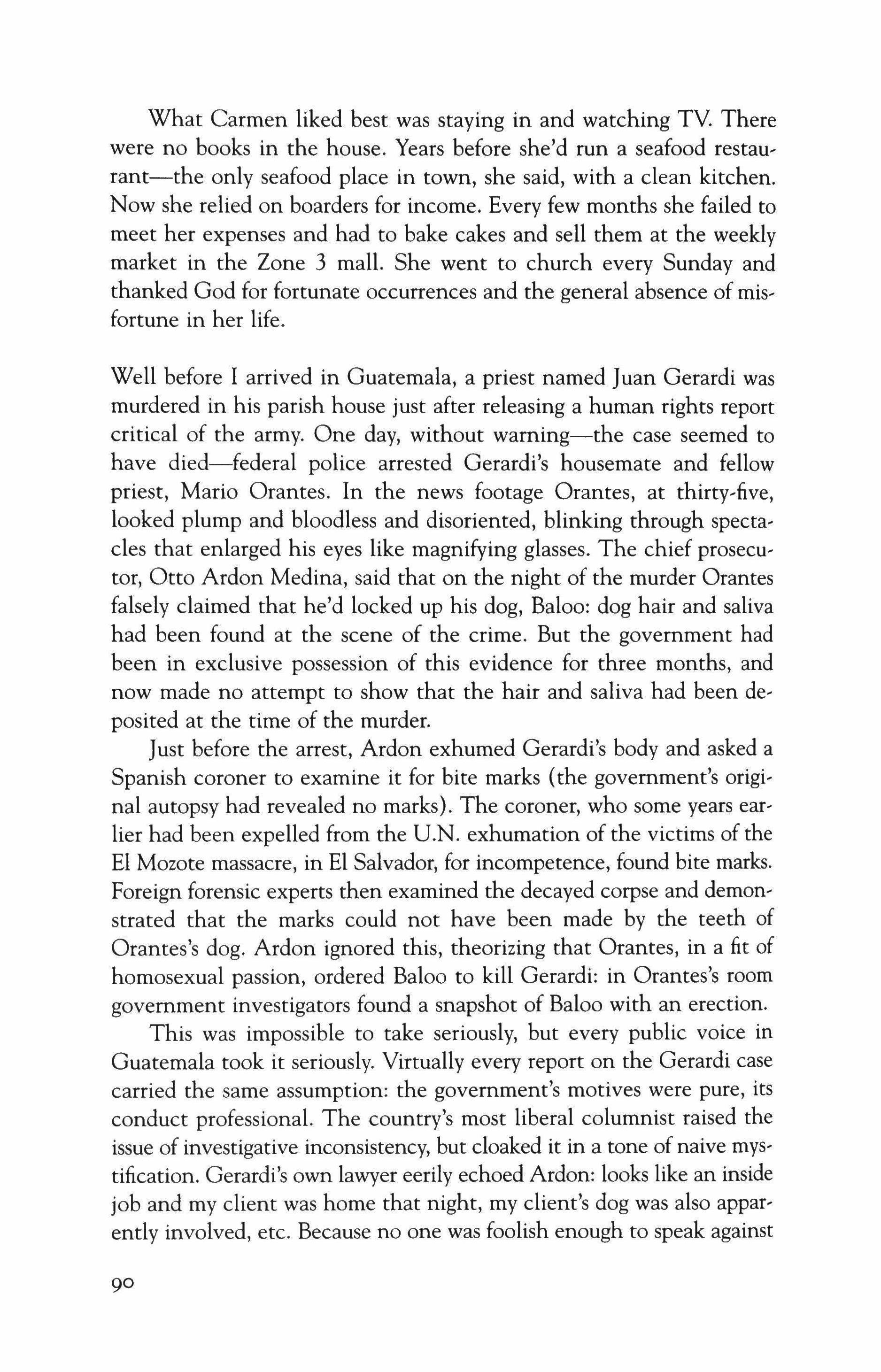
What Carmen liked best was staying in and watching TV. There were no books in the house. Years before she'd run a seafood restaurant-the only seafood place in town, she said, with a clean kitchen. Now she relied on boarders for income. Every few months she failed to meet her expenses and had to bake cakes and sell them at the weekly market in the Zone 3 mall. She went to church every Sunday and thanked God for fortunate occurrences and the general absence of misfortune in her life.
Well before I arrived in Guatemala, a priest named Juan Gerardi was murdered in his parish house just after releasing a human rights report critical of the army. One day, without warning-the case seemed to have died-federal police arrested Gerardi's housemate and fellow priest, Mario Orantes. In the news footage Orantes, at thirty-five, looked plump and bloodless and disoriented, blinking through spectacles that enlarged his eyes like magnifying glasses. The chief prosecutor, Otto Ardon Medina, said that on the night of the murder Orantes falsely claimed that he'd locked up his dog, Baloo: dog hair and saliva had been found at the scene of the crime. But the government had been in exclusive possession of this evidence for three months, and now made no attempt to show that the hair and saliva had been deposited at the time of the murder.
Just before the arrest, Ardon exhumed Gerardi's body and asked a Spanish coroner to examine it for bite marks (the government's original autopsy had revealed no marks). The coroner, who some years earlier had been expelled from the U.N. exhumation of the victims of the EI Mozote massacre, in EI Salvador, for incompetence, found bite marks. Foreign forensic experts then examined the decayed corpse and demon' strated that the marks could not have been made by the teeth of Orantes's dog. Ardon ignored this, theorizing that Orantes, in a fit of homosexual passion, ordered Baloo to kill Gerardi: in Orantes's room government investigators found a snapshot of Baloo with an erection. This was impossible to take seriously, but every public voice in Guatemala took it seriously. Virtually every report on the Gerardi case carried the same assumption: the government's motives were pure, its conduct professional. The country's most liberal columnist raised the issue of investigative inconsistency, but cloaked it in a tone of naive mystification. Gerardi's own lawyer eerily echoed Ardon: looks like an inside job and my client was home that night, my client's dog was also apparently involved, etc. Because no one was foolish enough to speak against
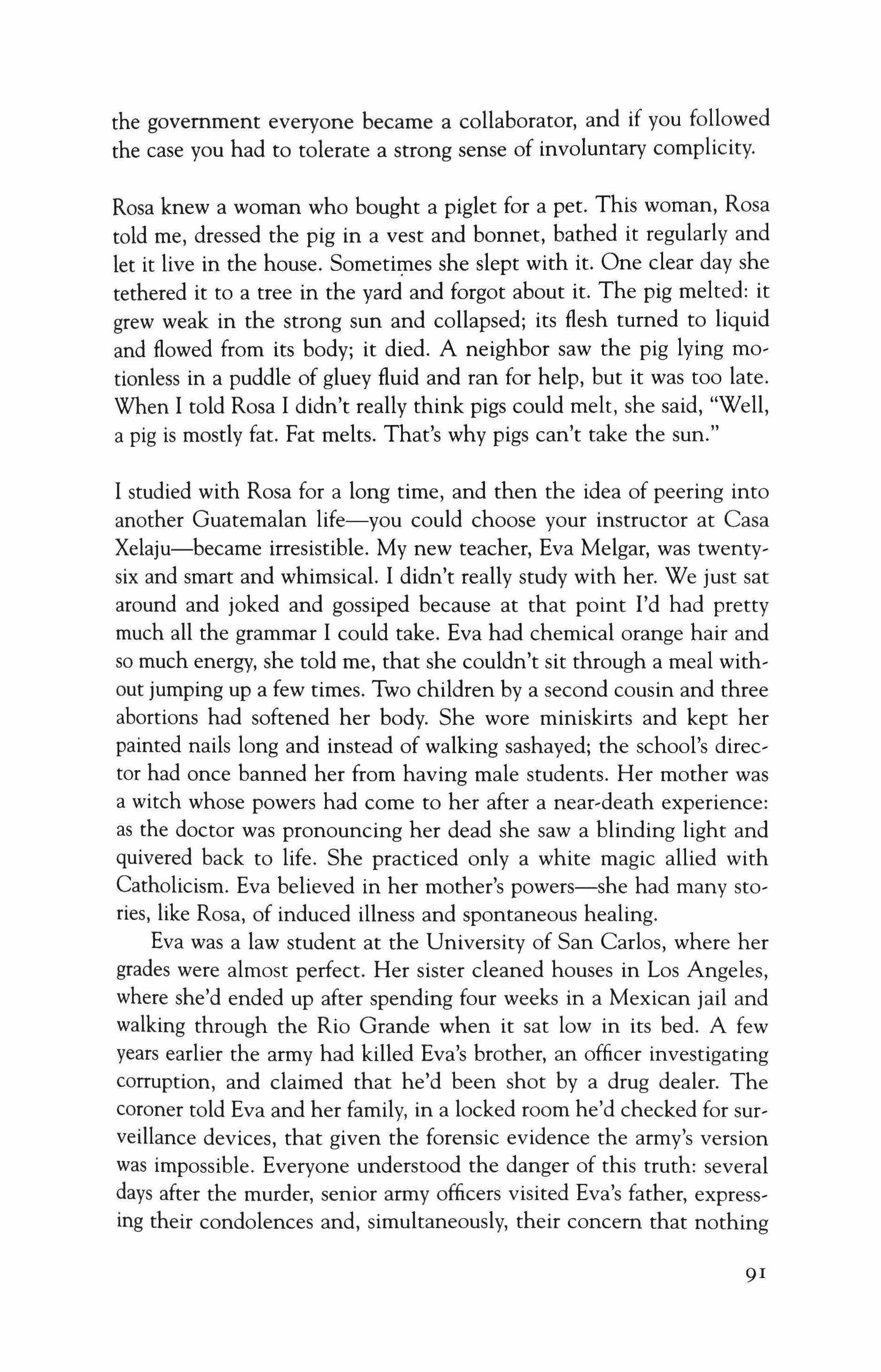
the government everyone became a collaborator, and if you followed the case you had to tolerate a strong sense of involuntary complicity.
Rosa knew a woman who bought a piglet for a pet. This woman, Rosa told me, dressed the pig in a vest and bonnet, bathed it regularly and let it live in the house. Sometimes she slept with it. One clear day she tethered it to a tree in the yard and forgot about it. The pig melted: it grew weak in the strong sun and collapsed; its flesh turned to liquid and flowed from its body; it died. A neighbor saw the pig lying motionless in a puddle of gluey fluid and ran for help, but it was too late. When I told Rosa I didn't really think pigs could melt, she said, "Well, a pig is mostly fat. Fat melts. That's why pigs can't take the sun."
I studied with Rosa for a long time, and then the idea of peering into another Guatemalan life-you could choose your instructor at Casa Xelaju-became irresistible. My new teacher, Eva Melgar, was twentysix and smart and whimsical. I didn't really study with her. We just sat around and joked and gossiped because at that point I'd had pretty much all the grammar I could take. Eva had chemical orange hair and so much energy, she told me, that she couldn't sit through a meal without jumping up a few times. Two children by a second cousin and three abortions had softened her body. She wore miniskirts and kept her painted nails long and instead of walking sashayed; the school's director had once banned her from having male students. Her mother was a witch whose powers had come to her after a near-death experience: as the doctor was pronouncing her dead she saw a blinding light and quivered back to life. She practiced only a white magic allied with Catholicism. Eva believed in her mother's powers-she had many stories, like Rosa, of induced illness and spontaneous healing.
Eva was a law student at the University of San Carlos, where her grades were almost perfect. Her sister cleaned houses in Los Angeles, where she'd ended up after spending four weeks in a Mexican jail and walking through the Rio Grande when it sat low in its bed. A few years earlier the army had killed Eva's brother, an officer investigating corruption, and claimed that he'd been shot by a drug dealer. The coroner told Eva and her family, in a locked room he'd checked for surveillance devices, that given the forensic evidence the army's version was impossible. Everyone understood the danger of this truth: several days after the murder, senior army officers visited Eva's father, expressing their condolences and, simultaneously, their concern that nothing
similar happen to his other son, who was also a soldier. Sometimes Eva's brother came to her in dreams so real she woke up bewildered.
My school had a little library, and one day Eva assigned me a book of interviews with Gabriel Garcia Marquez. When he was asked about what everyone in the West calls magic realism, he said that reality in Latin America didn't end with the price of tomatoes or eggs. Extraordinary things happened every day. You just had to pick up the paper. "I know people from my home town," he said, "who read One Hundred Years of Solitude carefully and with pleasure but without any feeling of surprise, because ultimately I didn't write anything that didn't resemble their lives." Before I went to Guatemala I probably would have dis, missed that statement as the showmanship of an author who has watched his status tum canonical.
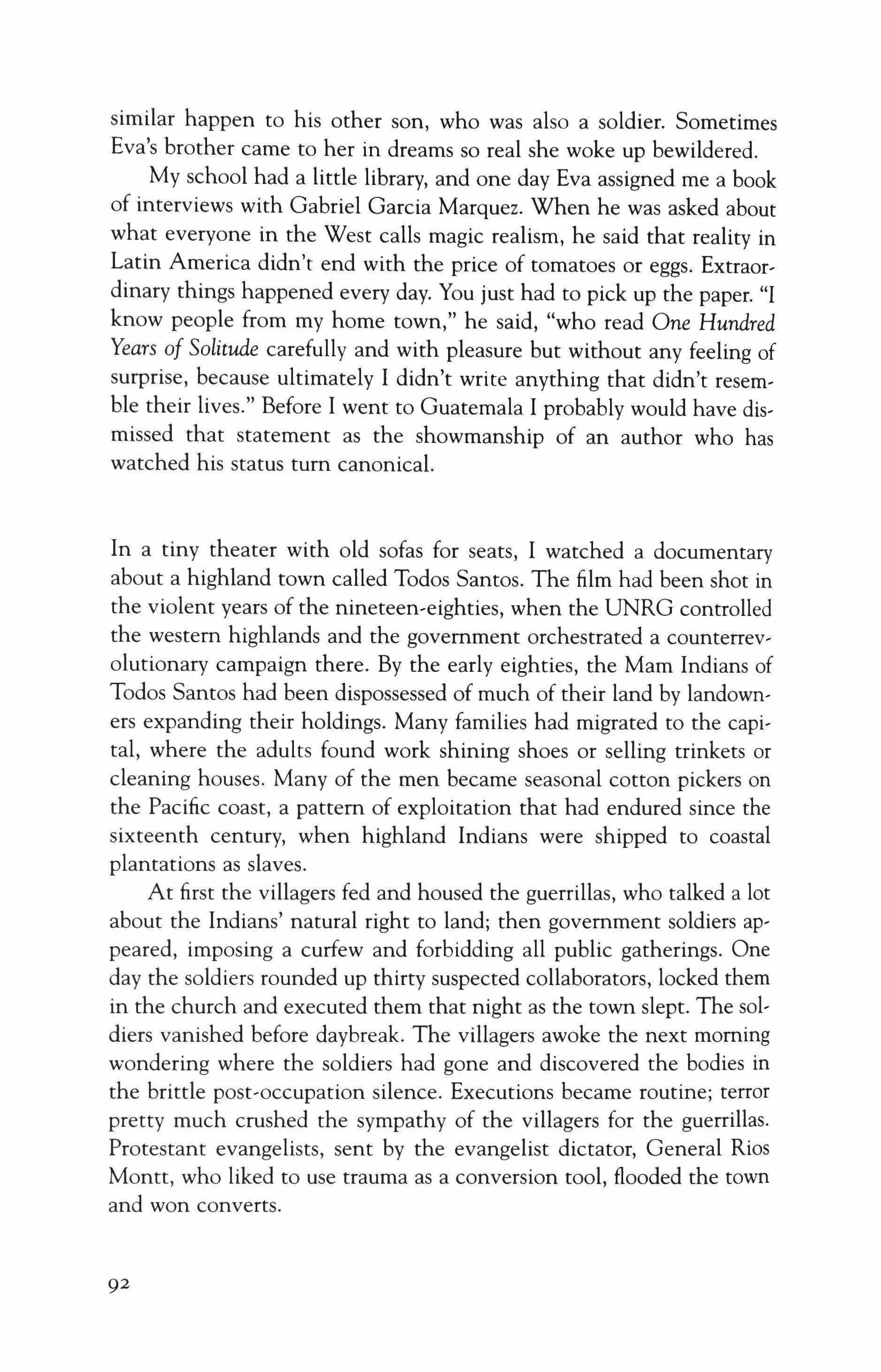
In a tiny theater with old sofas for seats, I watched a documentary about a highland town called Todos Santos. The film had been shot in the violent years of the nineteen-eighties, when the UNRG controlled the western highlands and the government orchestrated a counterrevolutionary campaign there. By the early eighties, the Mam Indians of Todos Santos had been dispossessed of much of their land by landowners expanding their holdings. Many families had migrated to the capital, where the adults found work shining shoes or selling trinkets or cleaning houses. Many of the men became seasonal cotton pickers on the Pacific coast, a pattern of exploitation that had endured since the sixteenth century, when highland Indians were shipped to coastal plantations as slaves.
At first the villagers fed and housed the guerrillas, who talked a lot about the Indians' natural right to land; then government soldiers appeared, imposing a curfew and forbidding all public gatherings. One day the soldiers rounded up thirty suspected collaborators, locked them in the church and executed them that night as the town slept. The sol, diers vanished before daybreak. The villagers awoke the next morning wondering where the soldiers had gone and discovered the bodies in the brittle post-occupation silence. Executions became routine; terror pretty much crushed the sympathy of the villagers for the guerrillas. Protestant evangelists, sent by the evangelist dictator, General Rios Montt, who liked to use trauma as a conversion tool, flooded the town and won converts.
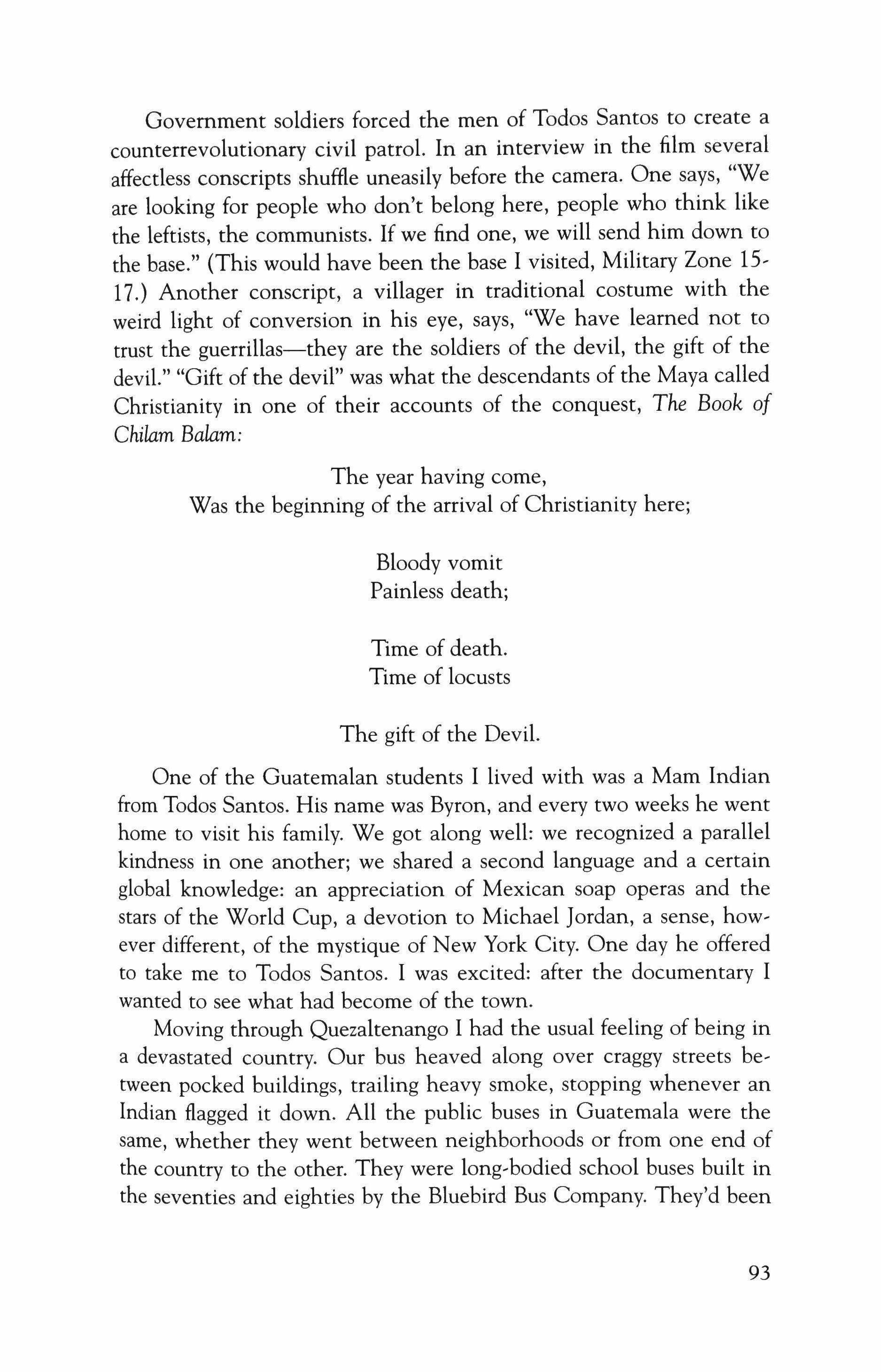
Government soldiers forced the men of Todos Santos to create a counterrevolutionary civil patroL In an interview in the film several affectless conscripts shuffle uneasily before the camera. One says, "We are looking for people who don't belong here, people who think like the leftists, the communists. If we find one, we will send him down to the base." (This would have been the base I visited, Military Zone 15, 17.) Another conscript, a villager in traditional costume with the weird light of conversion in his eye, says, "We have learned not to trust the guerrillas-they are the soldiers of the devil, the gift of the deviL" "Gift of the devil" was what the descendants of the Maya called Christianity in one of their accounts of the conquest, The Book of Chilam Balam:
The year having come, Was the beginning of the arrival of Christianity here;
Bloody vomit
Painless death;
Time of death.
Time of locusts
The gift of the DeviL
One of the Guatemalan students I lived with was a Mam Indian from Todos Santos. His name was Byron, and every two weeks he went home to visit his family. We got along well: we recognized a parallel kindness in one another; we shared a second language and a certain global knowledge: an appreciation of Mexican soap operas and the stars of the World Cup, a devotion to Michael Jordan, a sense, how, ever different, of the mystique of New York City. One day he offered to take me to Todos Santos. I was excited: after the documentary I wanted to see what had become of the town.
Moving through Quezaltenango I had the usual feeling of being in a devastated country. Our bus heaved along over craggy streets be, tween pocked buildings, trailing heavy smoke, stopping whenever an Indian flagged it down. All the public buses in Guatemala were the same, whether they went between neighborhoods or from one end of the country to the other. They were long-bodied school buses built in the seventies and eighties by the Bluebird Bus Company. They'd been

repainted decoratively, each bus in several colors, and christened (to get to Todos Santos we took the Carmelita to the Chinita). They had dashboards like altars and rosaries hanging from their rearview mirrors and star-framed religious messages like Jesus Christ Is My Pastor along the tops of their windshields. According to plaques above the drivers' heads, they'd all rolled out of factories in Mount Pleasant, Iowa or Fort Valley, Georgia, place names that conjured up images of healthy dogs sleeping in the stillness of their own well-constructed homes and assembly lines of cleanly stamped lawns glinting beneath the narcotic sway of water thrown beaded from sprinklers.
The trip took five hours. We changed buses in Huehuetenango, a town whose rapid growth had destroyed all the natural beauty of the high valley in which it sat. Speedy construction in concrete, cinderblock and macadam had left it a parched grid full of unclaimed dogs. Beyond Huehuetenango, climbing into the isolated northwestern corner of the country, the highlands were lush and poor. In the window a single scene played endlessly: a lone tin-roofed shack in a few handcultivated, steeply pitched acres of corn and beans and squash, the blue smoke of a cooking fire seeping from its glassless windows, a tethered hog drowsing in front.
The bus to Huehuetenango was crowded. Byron sat ahead of me. Like a semaphore he kept turning around to flash me inquisitive, protective smiles. I hoped he hadn't believed I'd come and was happy to have me along and wanted to look out for me. I must have appeared superimposed to him, sitting among the Indians of his village in my chinos and white 'Tshirt,
We neared Todos Santos at dusk, the air getting colder and the road rougher and the shacks less frequent. From some shacks carne points of low-wattage light. Cloud banks sat on mountainsides; clouds drifted below us. Byron took out his Mam jacket and put it on over his Notre Dame University sweatshirt (he had no idea what Notre Dame was). His jacket was hand-woven, with vertical blue stripes and an ernbroidered collar of deep red. It was so clean it shone. Byron had just machine-washed it. He had also just washed his extremely black hair, which resembled high-gloss exterior paint. Next to Byron all the other Mam Indians on the bus looked dull.
After gaining some high deserted plateaus punctuated with weird granite outcroppings, we began crawling down the rubble of an old road to the valley of Todos Santos. The right-angle walls of the valley appeared to be carpeted in moss. The sun went down as we descended;
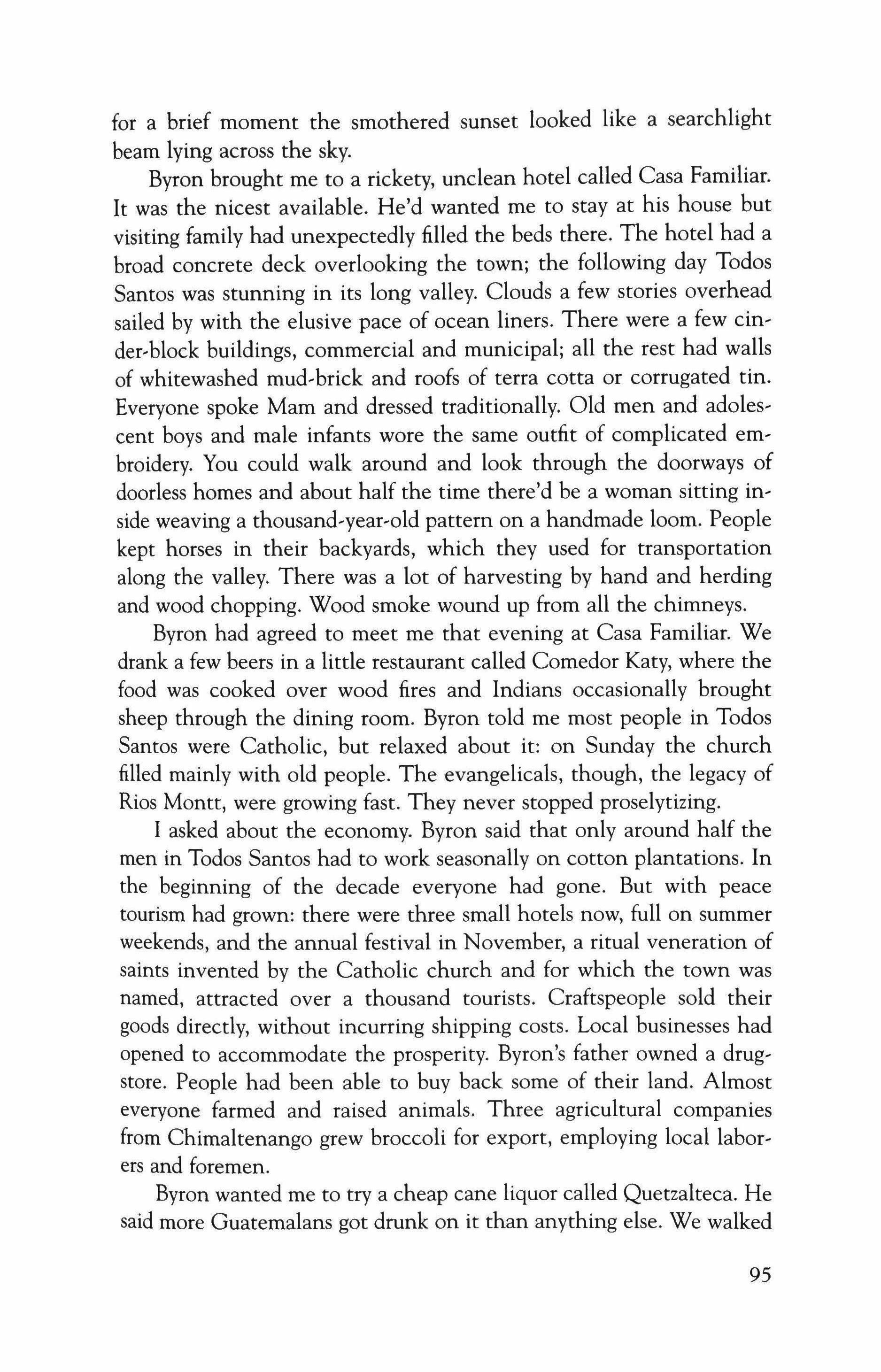
for a brief moment the smothered sunset looked like a searchlight beam lying across the sky.
Byron brought me to a rickety, unclean hotel called Casa Familiar. It was the nicest available. He'd wanted me to stay at his house but visiting family had unexpectedly filled the beds there. The hotel had a broad concrete deck overlooking the town; the following day Todos Santos was stunning in its long valley. Clouds a few stories overhead sailed by with the elusive pace of ocean liners. There were a few cinder-block buildings, commercial and municipal; all the rest had walls of whitewashed mud-brick and roofs of terra cotta or corrugated tin. Everyone spoke Mam and dressed traditionally. Old men and adolescent boys and male infants wore the same outfit of complicated ernbroidery. You could walk around and look through the doorways of doorless homes and about half the time there'd be a woman sitting inside weaving a thousand-year-old pattern on a handmade loom. People kept horses in their backyards, which they used for transportation along the valley. There was a lot of harvesting by hand and herding and wood chopping. Wood smoke wound up from all the chimneys.
Byron had agreed to meet me that evening at Casa Familiar. We drank a few beers in a little restaurant called Comedor Katy, where the food was cooked over wood fires and Indians occasionally brought sheep through the dining room. Byron told me most people in Todos Santos were Catholic, but relaxed about it: on Sunday the church filled mainly with old people. The evangelicals, though, the legacy of Rios Montt, were growing fast. They never stopped proselytizing. I asked about the economy. Byron said that only around half the men in Todos Santos had to work seasonally on cotton plantations. In the beginning of the decade everyone had gone. But with peace tourism had grown: there were three small hotels now, full on summer weekends, and the annual festival in November, a ritual veneration of saints invented by the Catholic church and for which the town was named, attracted over a thousand tourists. Craftspeople sold their goods directly, without incurring shipping costs. Local businesses had opened to accommodate the prosperity. Byron's father owned a drugstore. People had been able to buy back some of their land. Almost everyone farmed and raised animals. Three agricultural companies from Chimaltenango grew broccoli for export, employing local laborers and foremen.
Byron wanted me to try a cheap cane liquor called Quetzalteca. He said more Guatemalans got drunk on it than anything else. We walked
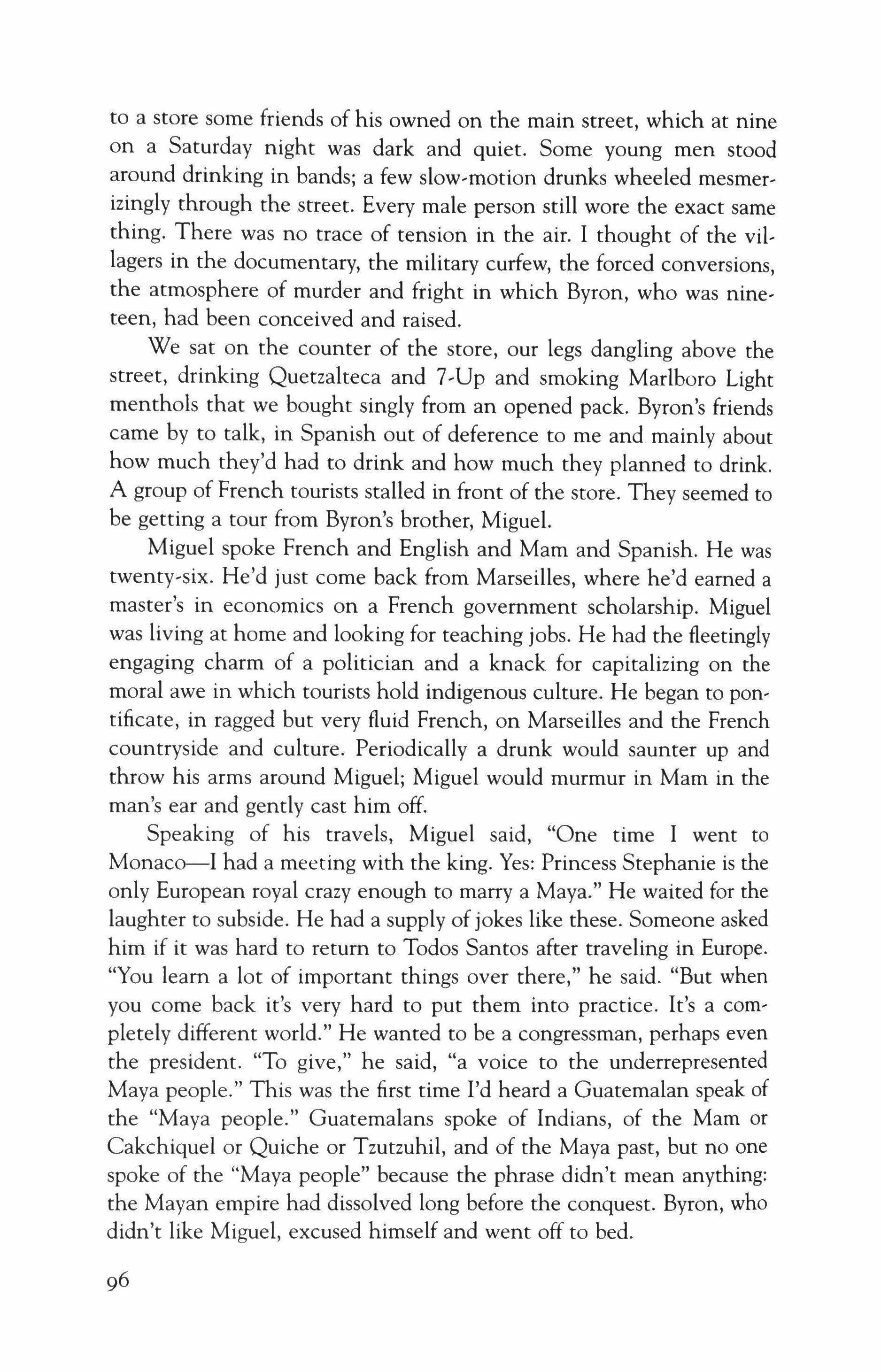
to a store some friends of his owned on the main street, which at nine on a Saturday night was dark and quiet. Some young men stood around drinking in bands; a few slow-motion drunks wheeled mesmerizingly through the street. Every male person still wore the exact same thing. There was no trace of tension in the air. I thought of the villagers in the documentary, the military curfew, the forced conversions, the atmosphere of murder and fright in which Byron, who was nineteen, had been conceived and raised.
We sat on the counter of the store, our legs dangling above the street, drinking Quetzalteca and 7-Up and smoking Marlboro Light menthols that we bought singly from an opened pack. Byron's friends came by to talk, in Spanish out of deference to me and mainly about how much they'd had to drink and how much they planned to drink. A group of French tourists stalled in front of the store. They seemed to be getting a tour from Byron's brother, Miguel.
Miguel spoke French and English and Mam and Spanish. He was twenty-six. He'd just come back from Marseilles, where he'd earned a master's in economics on a French government scholarship. Miguel was living at home and looking for teaching jobs. He had the fleetingly engaging charm of a politician and a knack for capitalizing on the moral awe in which tourists hold indigenous culture. He began to pontificate, in ragged but very fluid French, on Marseilles and the French countryside and culture. Periodically a drunk would saunter up and throw his arms around Miguel; Miguel would murmur in Mam in the man's ear and gently cast him off.
Speaking of his travels, Miguel said, "One time I went to Monaco-I had a meeting with the king. Yes: Princess Stephanie is the only European royal crazy enough to marry a Maya." He waited for the laughter to subside. He had a supply of jokes like these. Someone asked him if it was hard to return to Todos Santos after traveling in Europe. "You learn a lot of important things over there," he said. "But when you come back it's very hard to put them into practice. It's a completely different world." He wanted to be a congressman, perhaps even the president. "To give," he said, "a voice to the underrepresented Maya people." This was the first time I'd heard a Guatemalan speak of the "Maya people." Guatemalans spoke of Indians, of the Mam or Cakchiquel or Quiche or Tzutzuhil, and of the Maya past, but no one spoke of the "Maya people" because the phrase didn't mean anything: the Mayan empire had dissolved long before the conquest. Byron, who didn't like Miguel, excused himself and went off to bed.
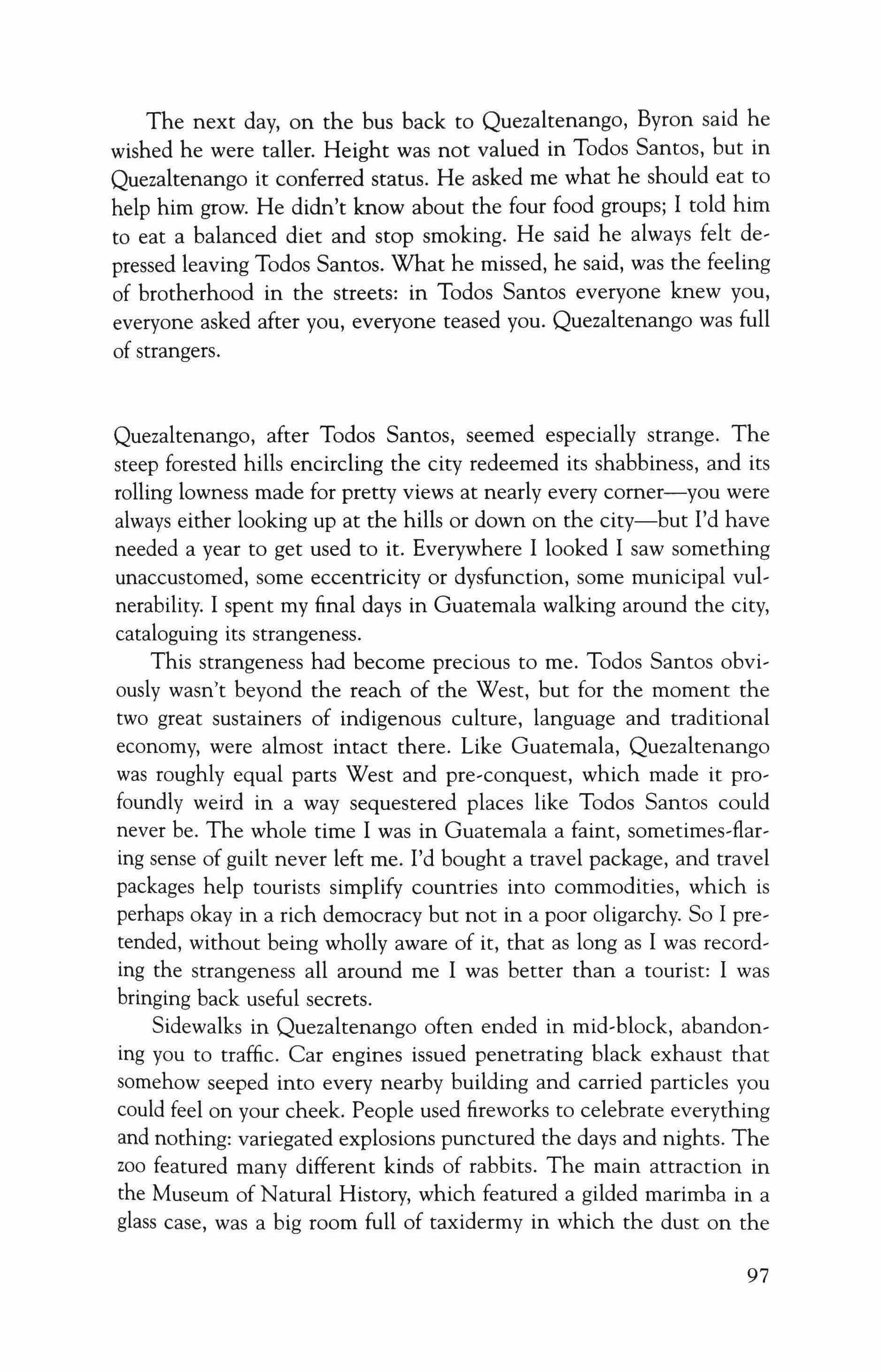
The next day, on the bus back to Quezaltenango, Byron said he wished he were taller. Height was not valued in Todos Santos, but in Quezaltenango it conferred status. He asked me what he should eat to help him grow. He didn't know about the four food groups; I told him to eat a balanced diet and stop smoking. He said he always felt depressed leaving Todos Santos. What he missed, he said, was the feeling of brotherhood in the streets: in Todos Santos everyone knew you, everyone asked after you, everyone teased you. Quezaltenango was full of strangers.
Quezaltenango, after Todos Santos, seemed especially strange. The steep forested hills encircling the city redeemed its shabbiness, and its rolling lowness made for pretty views at nearly every comer-you were always either looking up at the hills or down on the city-but I'd have needed a year to get used to it. Everywhere I looked I saw something unaccustomed, some eccentricity or dysfunction, some municipal vulnerability. I spent my final days in Guatemala walking around the city, cataloguing its strangeness.
This strangeness had become precious to me. Todos Santos obviously wasn't beyond the reach of the West, but for the moment the two great sustainers of indigenous culture, language and traditional economy, were almost intact there. Like Guatemala, Quezaltenango was roughly equal parts West and pre-conquest, which made it profoundly weird in a way sequestered places like Todos Santos could never be. The whole time I was in Guatemala a faint, sometimes-flaring sense of guilt never left me. I'd bought a travel package, and travel packages help tourists simplify countries into commodities, which is perhaps okay in a rich democracy but not in a poor oligarchy. So I pretended, without being wholly aware of it, that as long as I was recording the strangeness all around me I was better than a tourist: I was bringing back useful secrets.
Sidewalks in Quezaltenango often ended in mid-block, abandoning you to traffic. Car engines issued penetrating black exhaust that somehow seeped into every nearby building and carried particles you could feel on your cheek. People used fireworks to celebrate everything and nothing: variegated explosions punctured the days and nights. The zoo featured many different kinds of rabbits. The main attraction in the Museum of Natural History, which featured a gilded marimba in a glass case, was a big room full of taxidermy in which the dust on the
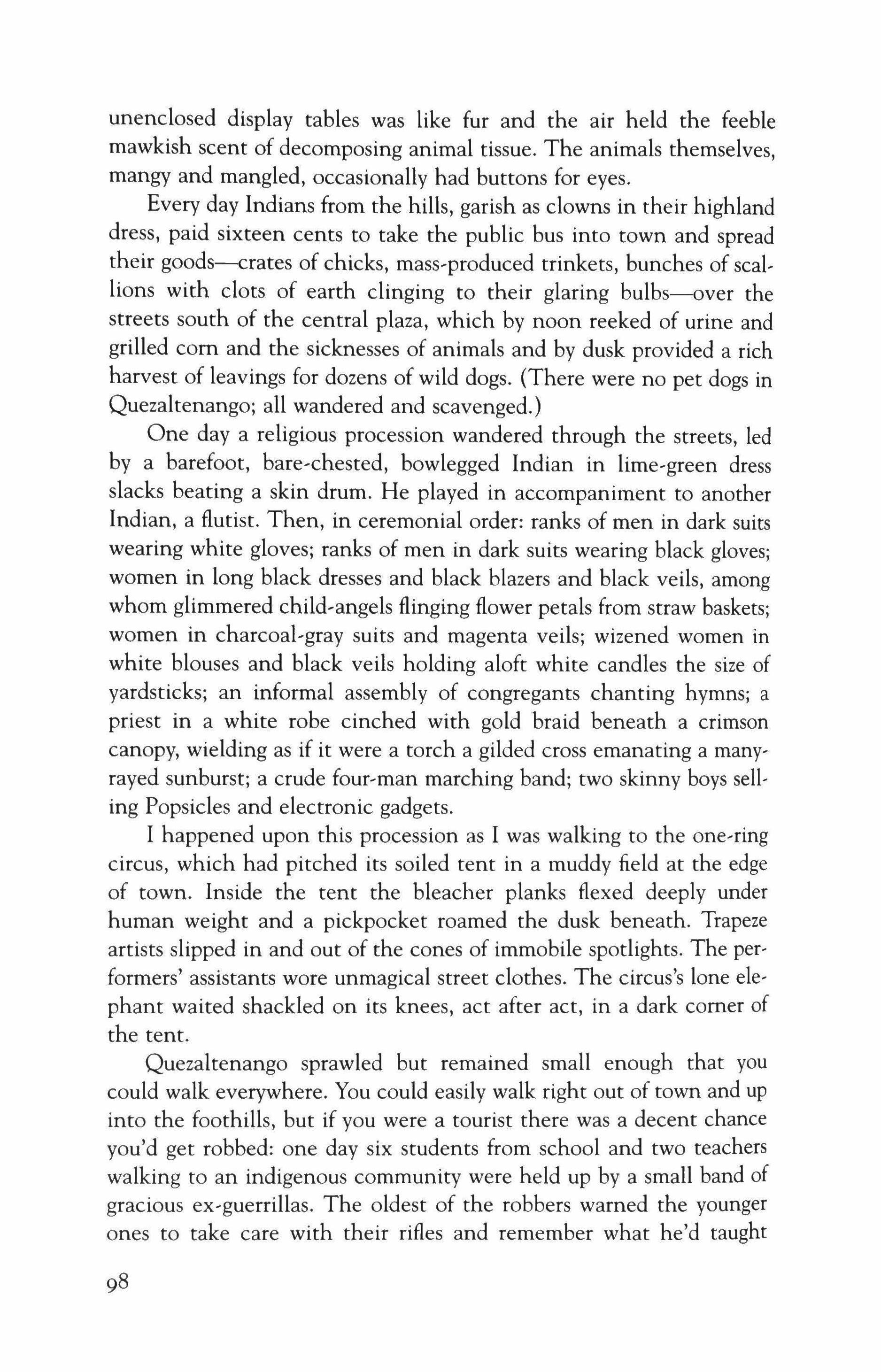
unenclosed display tables was like fur and the air held the feeble mawkish scent of decomposing animal tissue. The animals themselves, mangy and mangled, occasionally had buttons for eyes.
Every day Indians from the hills, garish as clowns in their highland dress, paid sixteen cents to take the public bus into town and spread their goods--crates of chicks, mass-produced trinkets, bunches of seallions with clots of earth clinging to their glaring bulbs-over the streets south of the central plaza, which by noon reeked of urine and grilled corn and the sicknesses of animals and by dusk provided a rich harvest of leavings for dozens of wild dogs. (There were no pet dogs in Quezaltenango; all wandered and scavenged.)
One day a religious procession wandered through the streets, led by a barefoot, bare-chested, bowlegged Indian in lime-green dress slacks beating a skin drum. He played in accompaniment to another Indian, a flutist. Then, in ceremonial order: ranks of men in dark suits wearing white gloves; ranks of men in dark suits wearing black gloves; women in long black dresses and black blazers and black veils, among whom glimmered child-angels flinging flower petals from straw baskets; women in charcoal-gray suits and magenta veils; wizened women in white blouses and black veils holding aloft white candles the size of yardsticks; an informal assembly of congregants chanting hymns; a priest in a white robe cinched with gold braid beneath a crimson canopy, wielding as if it were a torch a gilded cross emanating a manyrayed sunburst; a crude four-man marching band; two skinny boys selling Popsicles and electronic gadgets.
I happened upon this procession as I was walking to the one-ring circus, which had pitched its soiled tent in a muddy field at the edge of town. Inside the tent the bleacher planks flexed deeply under human weight and a pickpocket roamed the dusk beneath. Trapeze artists slipped in and out of the cones of immobile spotlights. The performers' assistants wore unmagical street clothes. The circus's lone elephant waited shackled on its knees, act after act, in a dark comer of the tent.
Quezaltenango sprawled but remained small enough that you could walk everywhere. You could easily walk right out of town and up into the foothills, but if you were a tourist there was a decent chance you'd get robbed: one day six students from school and two teachers walking to an indigenous community were held up by a small band of gracious ex-guerrillas. The oldest of the robbers warned the younger ones to take care with their rifles and remember what he'd taught
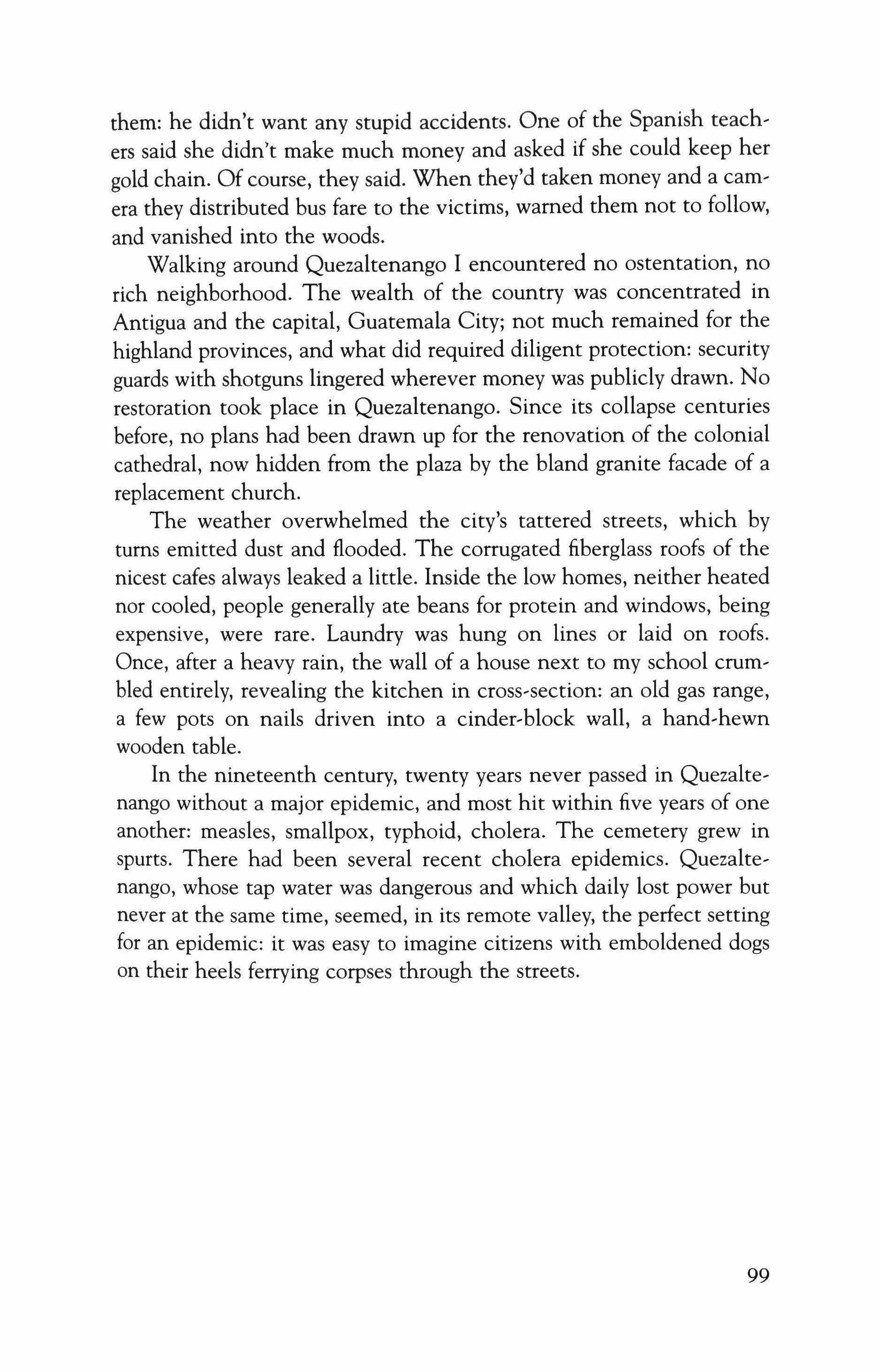
them: he didn't want any stupid accidents. One of the Spanish teachers said she didn't make much money and asked if she could keep her gold chain. Of course, they said. When they'd taken money and a camera they distributed bus fare to the victims, warned them not to follow, and vanished into the woods.
Walking around Quezaltenango I encountered no ostentation, no rich neighborhood. The wealth of the country was concentrated in Antigua and the capital, Guatemala City; not much remained for the highland provinces, and what did required diligent protection: security guards with shotguns lingered wherever money was publicly drawn. No restoration took place in Quezaltenango. Since its collapse centuries before, no plans had been drawn up for the renovation of the colonial cathedral, now hidden from the plaza by the bland granite facade of a replacement church.
The weather overwhelmed the city's tattered streets, which by turns emitted dust and flooded. The corrugated fiberglass roofs of the nicest cafes always leaked a little. Inside the low homes, neither heated nor cooled, people generally ate beans for protein and windows, being expensive, were rare. Laundry was hung on lines or laid on roofs. Once, after a heavy rain, the wall of a house next to my school crumbled entirely, revealing the kitchen in cross-section: an old gas range, a few pots on nails driven into a cinder-block wall, a hand-hewn wooden table.
In the nineteenth century, twenty years never passed in Quezaltenanga without a major epidemic, and most hit within five years of one another: measles, smallpox, typhoid, cholera. The cemetery grew in spurts. There had been several recent cholera epidemics. Quezaltenanga, whose tap water was dangerous and which daily lost power but never at the same time, seemed, in its remote valley, the perfect setting for an epidemic: it was easy to imagine citizens with emboldened dogs on their heels ferrying corpses through the streets.
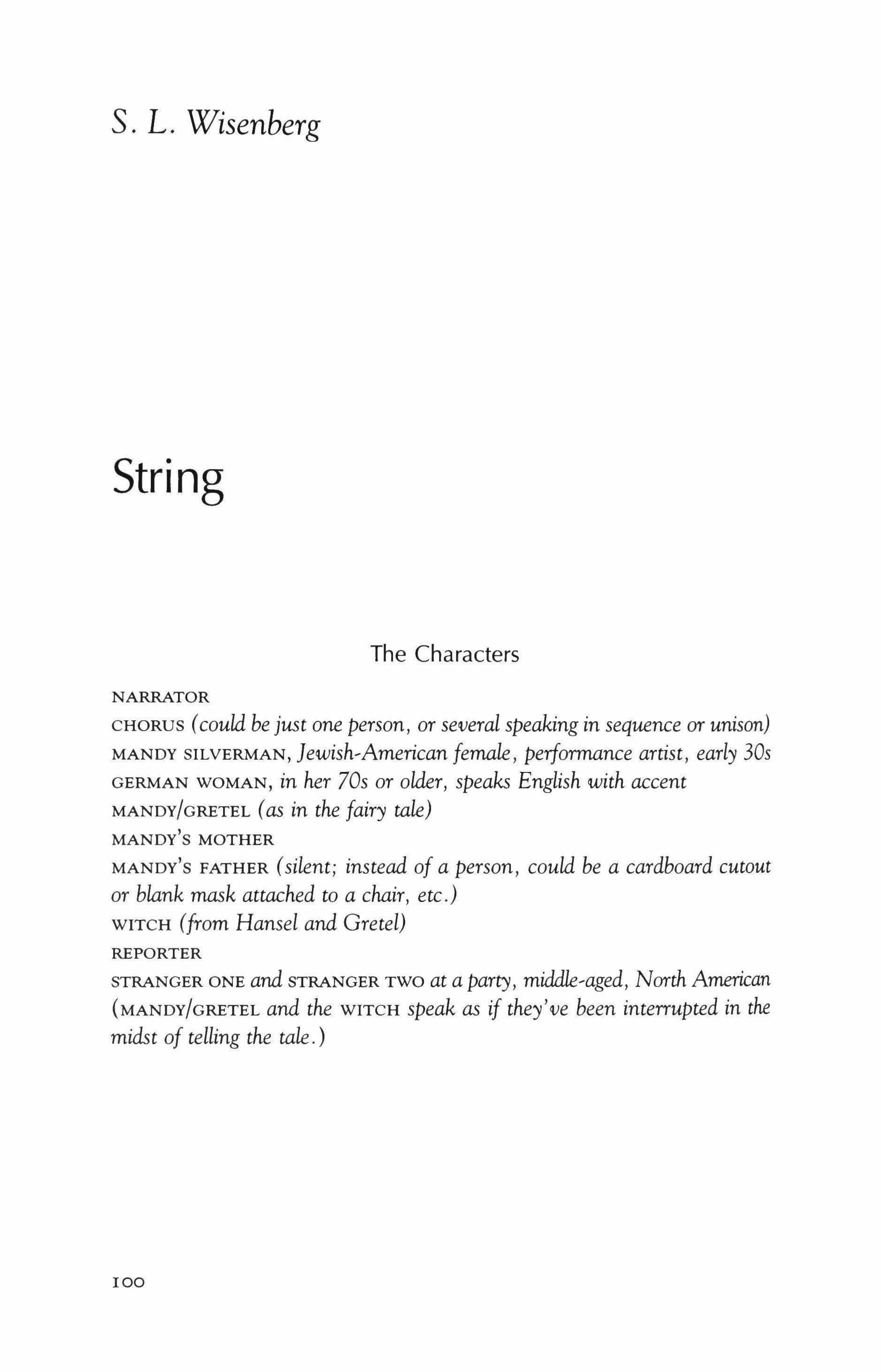
NARRATOR
CHORUS (could be just one person, or several speaking in sequence or unison)
MANDY SILVERMAN, Jewish-American female, performance artist, early 30s
GERMAN WOMAN, in her 70s or older, speaks English with accent
MANDY/GRETEL (as in the fairy tale)
MANDY'S MOTHER
MANDY'S FATHER (silent; instead of a person, could be a cardboard cutout or blank mask attached to a chair, etc.)
WITCH (from Hansel and Gretel)
REPORTER
STRANGER ONE and STRANGER TWO at a party, middle-aged, North American (MANDY/GRETEL and the WITCH speak as if they've been interrupted in the midst of telling the tale.)
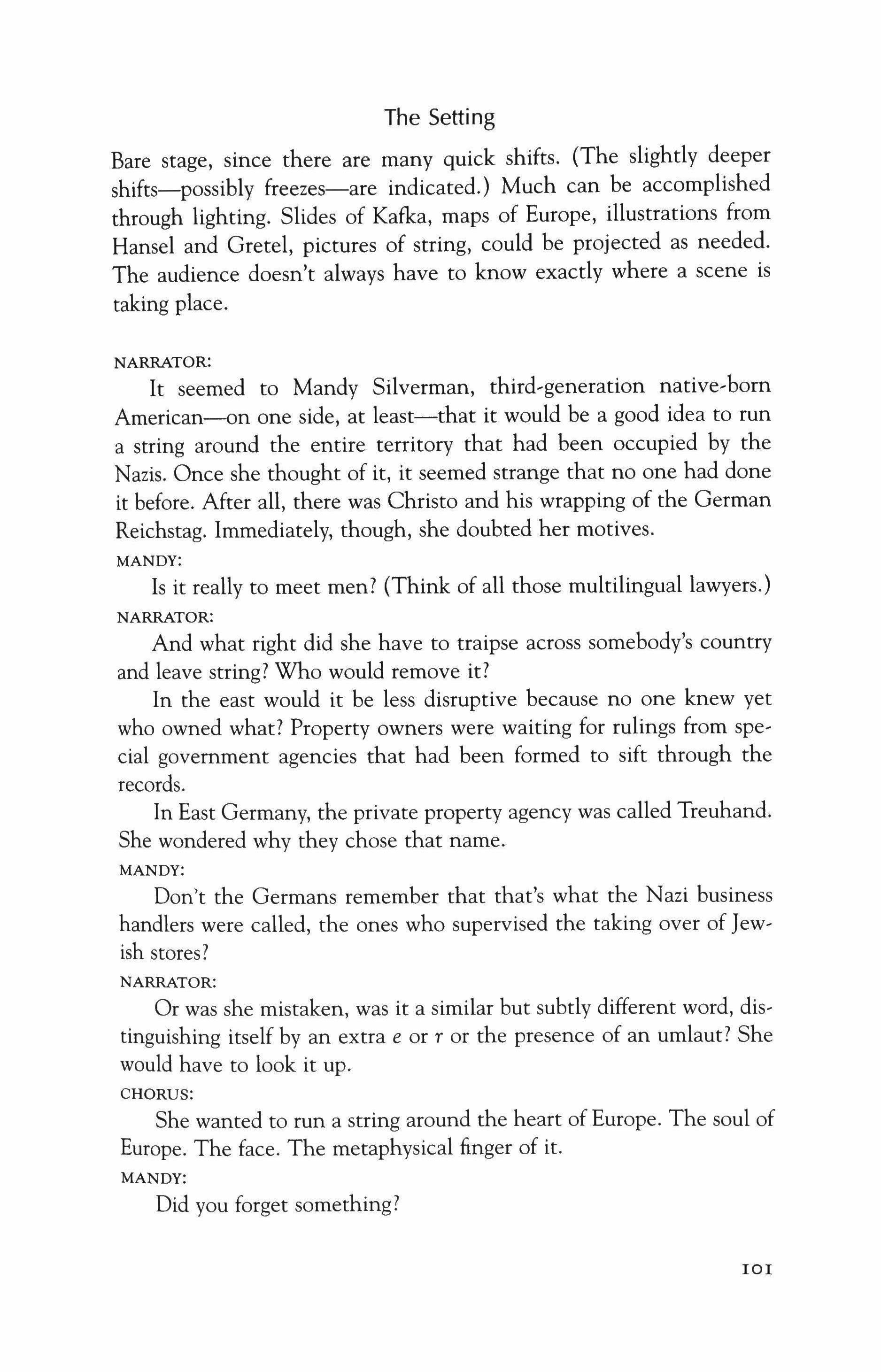
Bare stage, since there are many quick shifts. (The slightly deeper shifts-possibly freezes-are indicated.) Much can be accomplished through lighting. Slides of Kafka, maps of Europe, illustrations from Hansel and Gretel, pictures of string, could be projected as needed. The audience doesn't always have to know exactly where a scene is taking place.
NARRATOR:
It seemed to Mandy Silverman, third,generation native-born American-on one side, at least-that it would be a good idea to run a string around the entire territory that had been occupied by the Nazis. Once she thought of it, it seemed strange that no one had done it before. After all, there was Christo and his wrapping of the German Reichstag. Immediately, though, she doubted her motives.
MANDY: Is it really to meet men? (Think of all those multilingual lawyers.)
NARRATOR: And what right did she have to traipse across somebody's country and leave string? Who would remove it?
In the east would it be less disruptive because no one knew yet who owned what? Property owners were waiting for rulings from special government agencies that had been formed to sift through the records.
In East Germany, the private property agency was called Treuhand. She wondered why they chose that name.
MANDY:
Don't the Germans remember that that's what the Nazi business handlers were called, the ones who supervised the taking over of Jewish stores?
NARRATOR:
Or was she mistaken, was it a similar but subtly different word, distinguishing itself by an extra e or r or the presence of an umlaut? She would have to look it up.
CHORUS:
She wanted to run a string around the heart of Europe. The soul of Europe. The face. The metaphysical finger of it.
MANDY:
Did you forget something?

CHORUS:
She wanted to be like the protesters who followed Kurt Waldheim from city to city. They'd hold up signs reminding him of his Nazi past.
MANDY:
Like the elephant in the living room. The thing you can't ignore.
CHORUS:
She wanted to be that, the bee in the bonnet, the tenacious, harping New Worlder: Don't forget this and don't forget to pick up after yourselves. What did you leave behind-the management is not responsible.
NARRATOR:
Mandy had seen a lawyer pictured in the paper who'd had a huge portrait of Kafka on the wall beside him. Something in one or both of their faces had reminded her of her brother. According to the article, this lawyer's specialty was international management and trade. Because he liked Kafka would he be sympathetic to her cause? Would he help her negotiate across borders?
CHORUS:
Had he heard of Terezin, the concentration camp just an hour from Kafka's home and grave in Prague, or did he know that Kafka's woman friend Milena had died in Ravensbriick?
Was there any guarantee that the picture was taken in his own office?
MANDY:
We are post-Auschwitz. Everybody says that now. And post-Hiroshima. The sounds of Sh sh sh. We won. We had our day. Our days. V-E Day, V-J Day. But we lost it. My country lost its temper, unleashed it. Unleashed the next era. Blew away the borders between civiliansbabies, women and children, men, boys-and men/boys in uniforms, with guns.
CHORUS:
And the ones rounded up as aliens, kept behind barbed wire? And the ones killed because they were not the same, there were differences? And what string do you use to separate? Is it the same string, the eruv, that is draped around a religious Jewish neighborhood in order to connect all the homes? On Sabbath, Jews are not allowed to carry anything outside the home, and thus a string is looped along the telephone poles, binding together all the households into one. One big technicality. The eruv is the loophole, it redefines what is home.

The eruv allows a mother to carry her child without violating the Sabbath. The eruv expands borders. And sets aside. A magic string to answer the riddle: When is a house not a home?
MANDY:
Excuse me I am entering your border to continue this string unbroken. It's like history. I mean it's memory, it's fragile, to remind you of what you lost.
GERMAN WOMAN:
Where can I find it?
MANDY:
You can't. It was taken away. Here is this string to remind you that you can't take it back. It's gone.
GERMAN WOMAN:
It is a string then to sadden me?
MANDY: Yes.
MANDY/GRETEL:
And here are stones to mark the path, 1 put breadcrumbs first but the sparrows ate them. My brother and I, we are hungry and tired. We have been walking ever so long. Can you help us?
MANDY:
Excuse me, you dropped something. [shift/freeze]
MANDY:
First would be fund raising. Invitations to fund raisers: Please join us for coffee and refreshments, no, coffee and cake for Mandy Silverman, who will talk about her string project. Please bring your checkbooks-
No strings attached. Attach strings to the invitation. There's an idea.
Please bring a piece of paper to attach to the string. On it, put your message or the name of a victim. Mark here if you will volunteer. Mark here if you have legal, artistic or technical expertise to donate. Can you donate a compass? They will be part of the installation. Like the masses of eyeglasses that were mounded up, you've seen them-and hair and teeth. No, weren't the teeth discarded, after they were mined?
CHORUS:
With the geography departments of many major schools having been dismantled, it is difficult to find university geographers with the

time to investigate the condition of borders. Many geographers, you know, go on to work for the CIA.
MANDY:
First we walk through Europe tearing loaves of bread. It is so evocative it will not be necessary to explain. It will be like the Great Peace March. We must involve students.
WITCH:
-the big oven you put your head in first
NARRATOR:
She was going to eat the children. They were juicy and fleshy. the witch was dried up as a stick. She could not eat the candy of her house. They came to her house and began eating it. They were like Jews, who ate you out of house and home. They were her landlords.
MANDY:
We will have ginger cookies and scones.
Please pass the hat. We want your money so we can put a string where there were sentries. Where there were once black dots on maps. Please give us money for string. You know, string can be recycled. It's a little-known fact. One of the many interesting facts I've learned on this saga. Along with friendships. I couldn't begin to tell you-
Thank you for coming. Thank you for having me. You may be wondering why I would want to surround Europe with a string and what about Bosnia people asked, is it safe? Could gunfire set the string on fire and have it snap crackle across borders like a stick of dynamite?
That's what they were worried about, how we can collect string when they are dying and starving. That's a good question, Mrs. I'm glad you asked that. Not long after the bloodshed in the former Yugoslavia has ceased once and for all, I told them we will forget it ever happened. And that is why I'm unraveling this string all across Europe and parts of North Africa, to stand as a testament blah blah blah
What happened in Bosnia-Herzegovina could have been predicted with a pre'World War I map of Europe and little bit of cynicism. A dollop. A soupcon. We had our soupcons about her all along[shift/freeze]
STRANGER ONE:
What does your daughter do?
MANDY'S MOTHER:
Uh, she's a performance-she pulls strings in the European com' munity-

STRANGER TWO:
Oh, how interesting. And your son?
MANDY'S MOTHER:
We have none.
STRANGER ONE:
Our son is a doctor.
STRANGER TWO:
Our son is a lawyer.
MOTHER:
Our son, we had one but he dropped away. He fell over, he keeled over. We were keening. He landed in the water and filled with it and died. He bloated up and turned black. That is what happened. He is gone. He was water, all water, now he is dust, all dirt. He fertilizes the flowers we plant on his grave.
MOTHER [and FATHER, such as he is]:
Our son is gone and there is nothing to do.
MANDY:
My brother was the one in the newspapers, County Coroner Rules Suicide in Student Drowning. Three Bloody Marys, the lawyers' attempts to invoke the dram shop ordinance, burial in a separate part of the cemetery-not to ostracize, they said, but because they had not foreseen to buy a plot so many years before they naturally would have thought-he's two rows down from the rest of the Silvermans, near some Goldbergs. Don't think you're the first to point that out-among other minerals. Many minerals. And near some Epsteins. No glitter in that. Stein means stone.
A string around my brother's grave would make no sense. It is too small. The world is bigger than that, you know. So big. So wide around it is hard to measure but it can be done, allowing of course for the curve of the earth.
CHORUS:
Ah yes, the curve.
MANDY:
If you walk far enough you can feel it. Not while your feet are stepping from here to there, from Step A to Step B but in the memory of where you have stepped, the memory under your toes. That's it. Your toes remember the way the earth curls underneath them. They can tell you. Ask.
[shift/freeze]
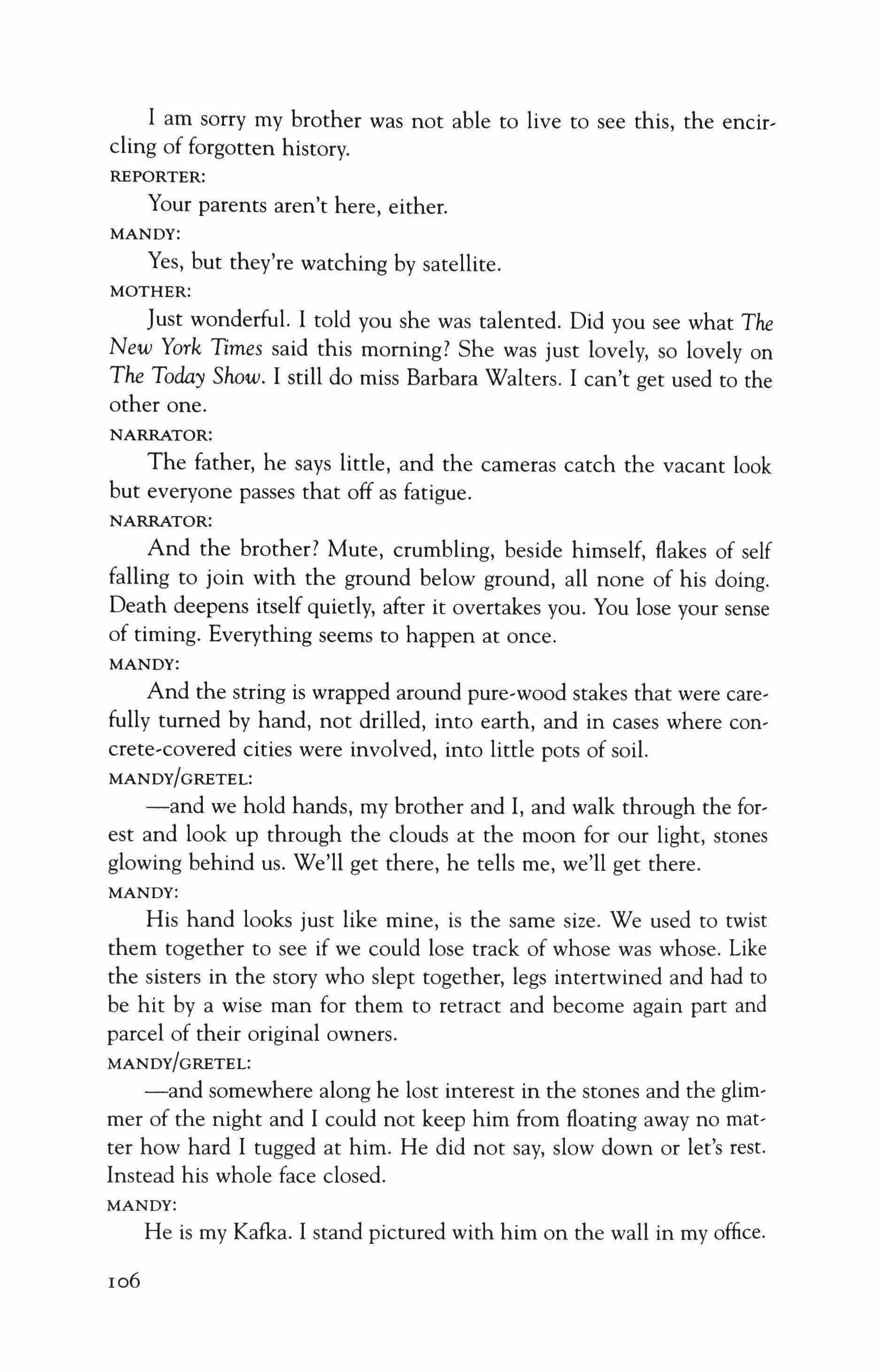
I am sorry my brother was not able to live to see this, the encircling of forgotten history.
REPORTER:
Your parents aren't here, either.
MANDY:
Yes, but they're watching by satellite.
MOTHER:
Just wonderful. I told you she was talented. Did you see what The New York Times said this morning? She was just lovely, so lovely on The Today Show. I still do miss Barbara Walters. I can't get used to the other one.
NARRATOR:
The father, he says little, and the cameras catch the vacant look but everyone passes that off as fatigue.
NARRATOR:
And the brother? Mute, crumbling, beside himself, flakes of self falling to join with the ground below ground, all none of his doing. Death deepens itself quietly, after it overtakes you. You lose your sense of timing. Everything seems to happen at once.
MANDY:
And the string is wrapped around pure-wood stakes that were carefully turned by hand, not drilled, into earth, and in cases where concrete-covered cities were involved, into little pots of soil.
MANDY/GRETEL:
-and we hold hands, my brother and I, and walk through the forest and look up through the clouds at the moon for our light, stones glowing behind us. We'll get there, he tells me, we'll get there.
MANDY:
His hand looks just like mine, is the same size. We used to twist them together to see if we could lose track of whose was whose. Like the sisters in the story who slept together, legs intertwined and had to be hit by a wise man for them to retract and become again part and parcel of their original owners.
MANDY/GRETEL:
-and somewhere along he lost interest in the stones and the glimmer of the night and I could not keep him from floating away no matter how hard I tugged at him. He did not say, slow down or let's rest. Instead his whole face closed.
MANDY:
He is my Kafka. I stand pictured with him on the wall in my office.

I say to my parents, Are you forgetting someone?
A string is the flimsiest thing. It's a wonder it even exists, crude copy of a spider thread. Made of thinner and thinner parts of itself. Twisted.
CHORUS:
Try taking one apart sometime. You'll feel you're tearing up a family. MANDY:
After the trek through the house of Europe, after the whir of the camera shutters, after the press conferences, after the last stake is driven into the hard ground, or wet, what is left? String, string floating in the wind. Or do you go back, retrace your steps, pull out each small post, collect the string and weigh it, to prove that you have gathered it all, mound it together like a huge rain-streaked mud-stained nest, to prove that you can go back and undo what you have done? Is that what?
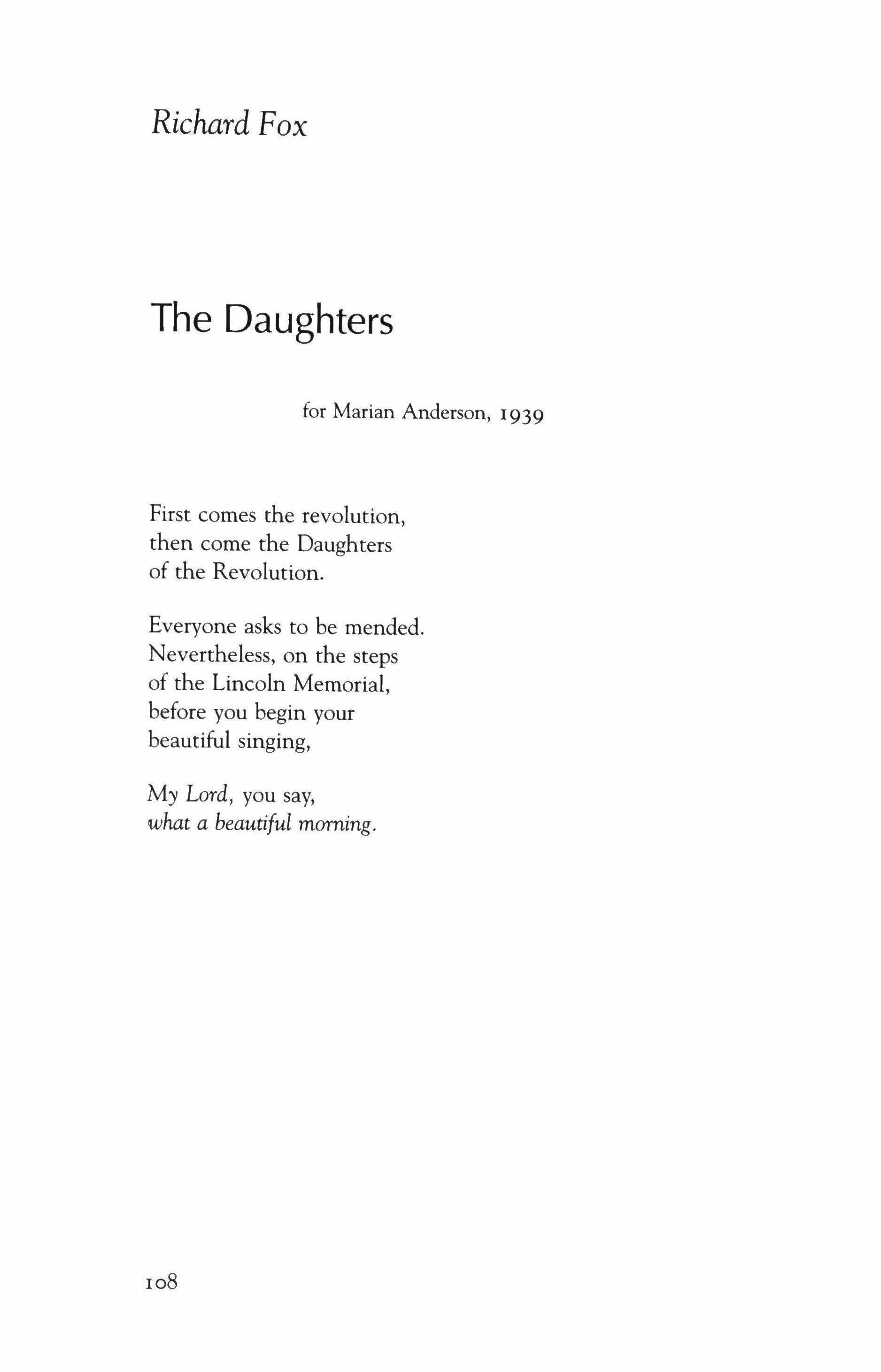
First comes the revolution, then come the Daughters of the Revolution.
Everyone asks to be mended. Nevertheless, on the steps of the Lincoln Memorial, before you begin your beautiful singing,
My Lord, you say, what a beautiful morning.

we dressed in black tuxedos and Frank twirled Karen around the factory floorpress operator and stitcher laureate. Yesterday, Anna began to sob quietly while packing sun visors at the end of her shift. She said it's the worst getting bad news on the lineyou drift with the icebergs. At lunch,
someone was passing around her pictures of Old Faithful and the Grand Canyon, and Eddie kept pointing at the skies.

We stop the car while driving home through Georgia's poor clay hills when we first catch sight of the sea. We watch until a crow appears above the dunes, a breathing bruise aloft the pampas grass and spreads himself over the Carolinas. Papa says a goose could walk across your grave and that's the meaning of a sudden chill-but a crow in flight across an entire countrywhat in the world. What in the world.

As a child I drove my father to distraction, pestering him no end about the nature of a thousand things in the world.
The air is space, right? We live in space don't we? Then why does the air end somewhere out there above us? His response was always that he would be thankful when I was old enough to study physics in schoolhaving no idea then that any grasp of mathematics would lie light-years beyond either side of my brain
It's always right in front of ussky-like. Our task is to see things at a grass-blade level

so we might feel the dilemma expanding the air, the immediate boundaries wherein we must tempt meaning with the insignificance of our bones. Once, compassion almost sufficed and then we had the sympathy of angels in starry tide pools, among the spindrift molecules. Who dreamed us up in three dimensions without knowledge of the skies, beneath which you can fill your arms with dry leaves and like prayer send them once more skyward?
Sweetly, sweetly the weak font of faith, the nostalgia of smoke stretches forward. There in the night, and at the heart of it for us the one revelation of the moon beyond the reach of the magnolia forever.

The salt,white moon poured into the sea, sending out circles to the shore, and the Spanish palms were talking in their sleep.
I could hear the air pick up around my ears as the horizon framed a shifting paradigm of birds, and I solved the 100 permutations of the clouds, I interpreted a catalog of nothing to come Space still stretching away and truly, now and forever, the world is largely kept away, the dove-colored rain hangs in the boughs, and the wind catches its breath and comes back for more. I stop to listen.
I know only that I mean to be here, am sure of little more than the sky clicking into place again with winter, the early sun burning

into the sea, freeing the eucalyptus and acacia leaves that go up red and gold and gray like flames that sealed the gates of Eden.
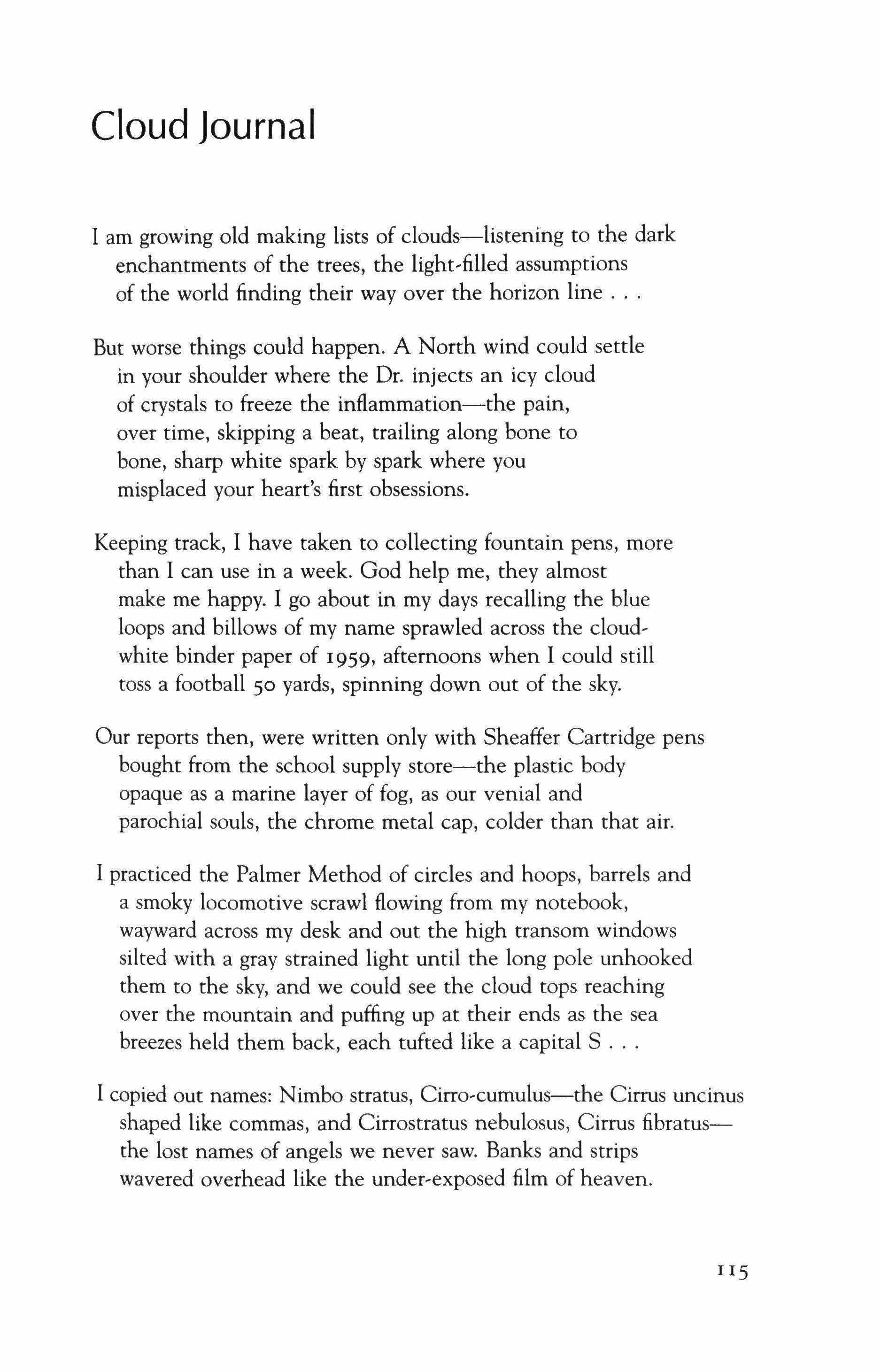
I am growing old making lists of clouds-listening to the dark enchantments of the trees, the light-filled assumptions of the world finding their way over the horizon line
But worse things could happen. A North wind could settle in your shoulder where the Dr. injects an icy cloud of crystals to freeze the inflammation-the pain, over time, skipping a beat, trailing along bone to bone, sharp white spark by spark where you misplaced your heart's first obsessions.
Keeping track, I have taken to collecting fountain pens, more than I can use in a week. God help me, they almost make me happy. I go about in my days recalling the blue loops and billows of my name sprawled across the cloud, white binder paper of 1959, afternoons when I could still toss a football 50 yards, spinning down out of the sky.
Our reports then, were written only with Sheaffer Cartridge pens bought from the school supply store-the plastic body opaque as a marine layer of fog, as our venial and parochial souls, the chrome metal cap, colder than that air.
I practiced the Palmer Method of circles and hoops, barrels and a smoky locomotive scrawl flowing from my notebook, wayward across my desk and out the high transom windows silted with a gray strained light until the long pole unhooked them to the sky, and we could see the cloud tops reaching over the mountain and puffing up at their ends as the sea breezes held them back, each tufted like a capital S
I copied out names: Nimbo stratus, Cirro-cumulus=-the Cirrus uncinus shaped like commas, and Cirrostratus nebulosus, Cirrus fibratusthe lost names of angels we never saw. Banks and strips wavered overhead like the under,exposed film of heaven. II5
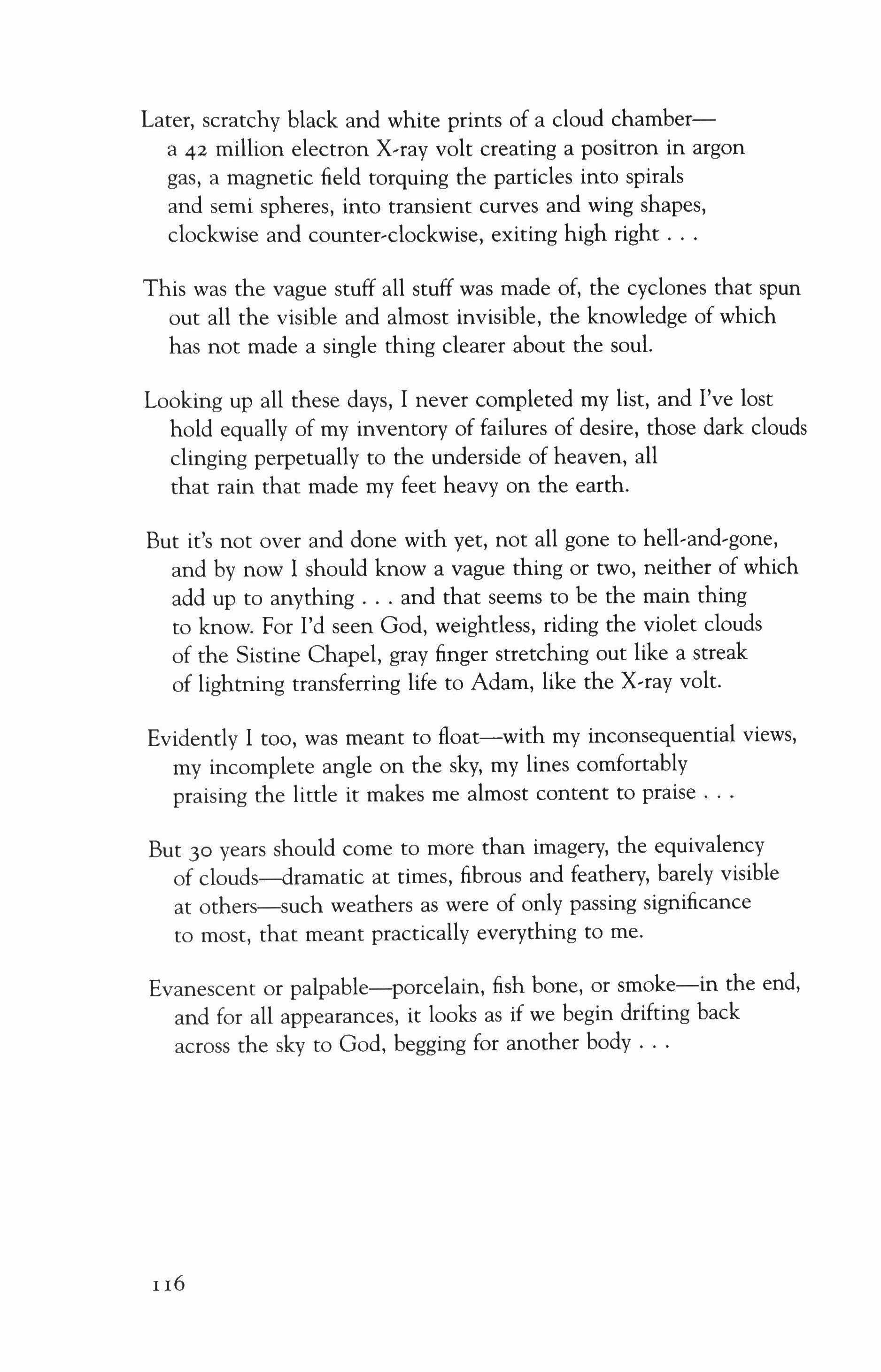
Later, scratchy black and white prints of a cloud chambera 42 million electron Xvray volt creating a positron in argon gas, a magnetic field torquing the particles into spirals and semi spheres, into transient curves and wing shapes, clockwise and counter-clockwise, exiting high right
This was the vague stuff all stuff was made of, the cyclones that spun out all the visible and almost invisible, the knowledge of which has not made a single thing clearer about the soul.
Looking up all these days, I never completed my list, and I've lost hold equally of my inventory of failures of desire, those dark clouds clinging perpetually to the underside of heaven, all that rain that made my feet heavy on the earth.
But it's not over and done with yet, not all gone to hell-arid-gone, and by now I should know a vague thing or two, neither of which add up to anything and that seems to be the main thing to know. For I'd seen God, weightless, riding the violet clouds of the Sistine Chapel, gray finger stretching out like a streak of lightning transferring life to Adam, like the Xvrav volt.
Evidently I too, was meant to float-with my inconsequential views, my incomplete angle on the sky, my lines comfortably praising the little it makes me almost content to praise
But 30 years should come to more than imagery, the equivalency of clouds--dramatic at times, fibrous and feathery, barely visible at others-such weathers as were of only passing significance to most, that meant practically everything to me.
Evanescent or palpable-porcelain, fish bone, or smoke-in the end, and for all appearances, it looks as if we begin drifting back across the sky to God, begging for another body
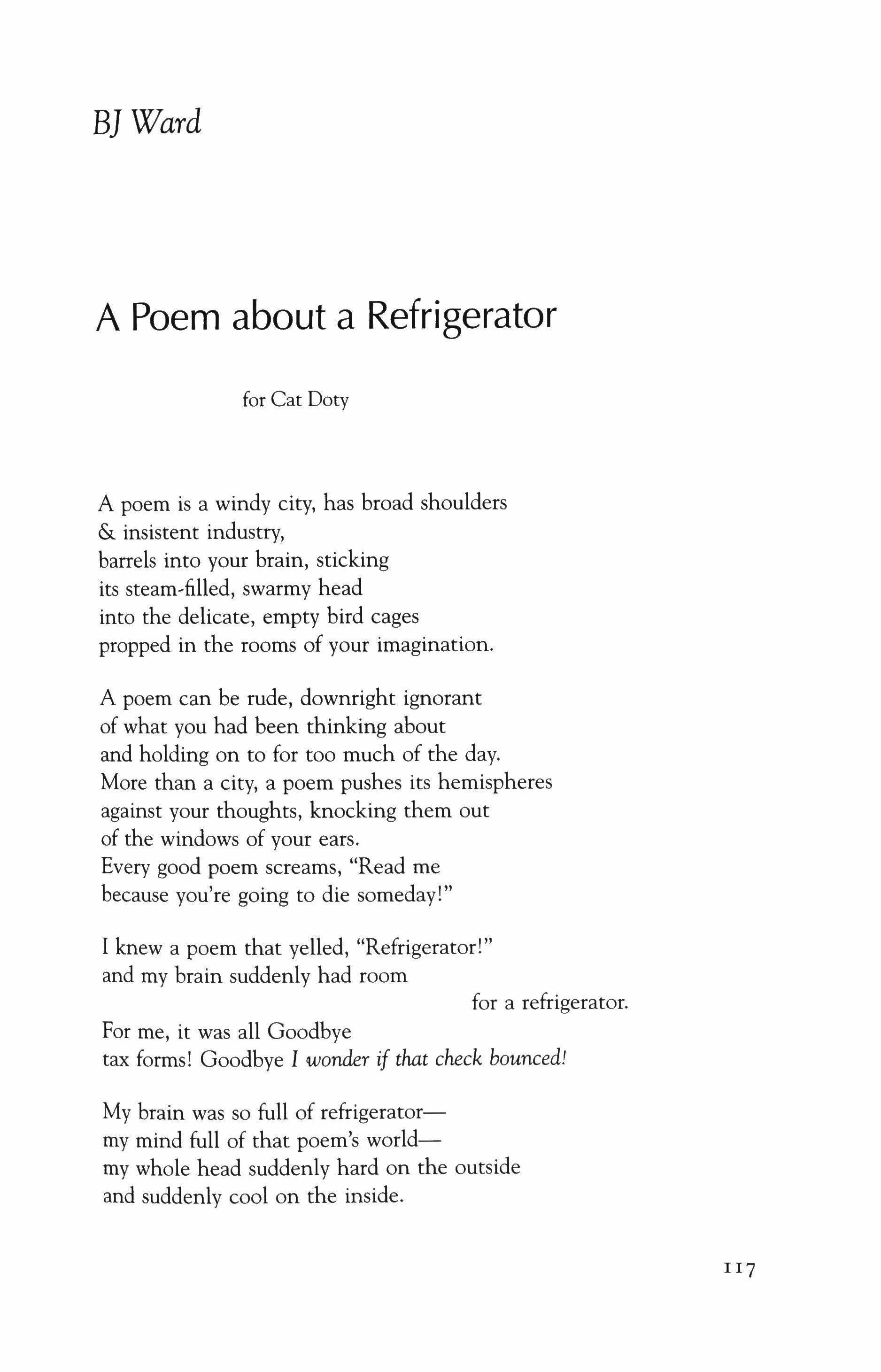
A poem is a windy city, has broad shoulders & insistent industry, barrels into your brain, sticking its steam-filled, swarmy head into the delicate, empty bird cages propped in the rooms of your imagination.
A poem can be rude, downright ignorant of what you had been thinking about and holding on to for too much of the day. More than a city, a poem pushes its hemispheres against your thoughts, knocking them out of the windows of your ears.
Every good poem screams, "Read me because you're going to die someday!"
I knew a poem that yelled, "Refrigerator!" and my brain suddenly had room for a refrigerator.
For me, it was all Goodbye tax forms! Goodbye I wonder if that check bounced!
My brain was so full of refrigeratormy mind full of that poem's worldmy whole head suddenly hard on the outside and suddenly coolon the inside.
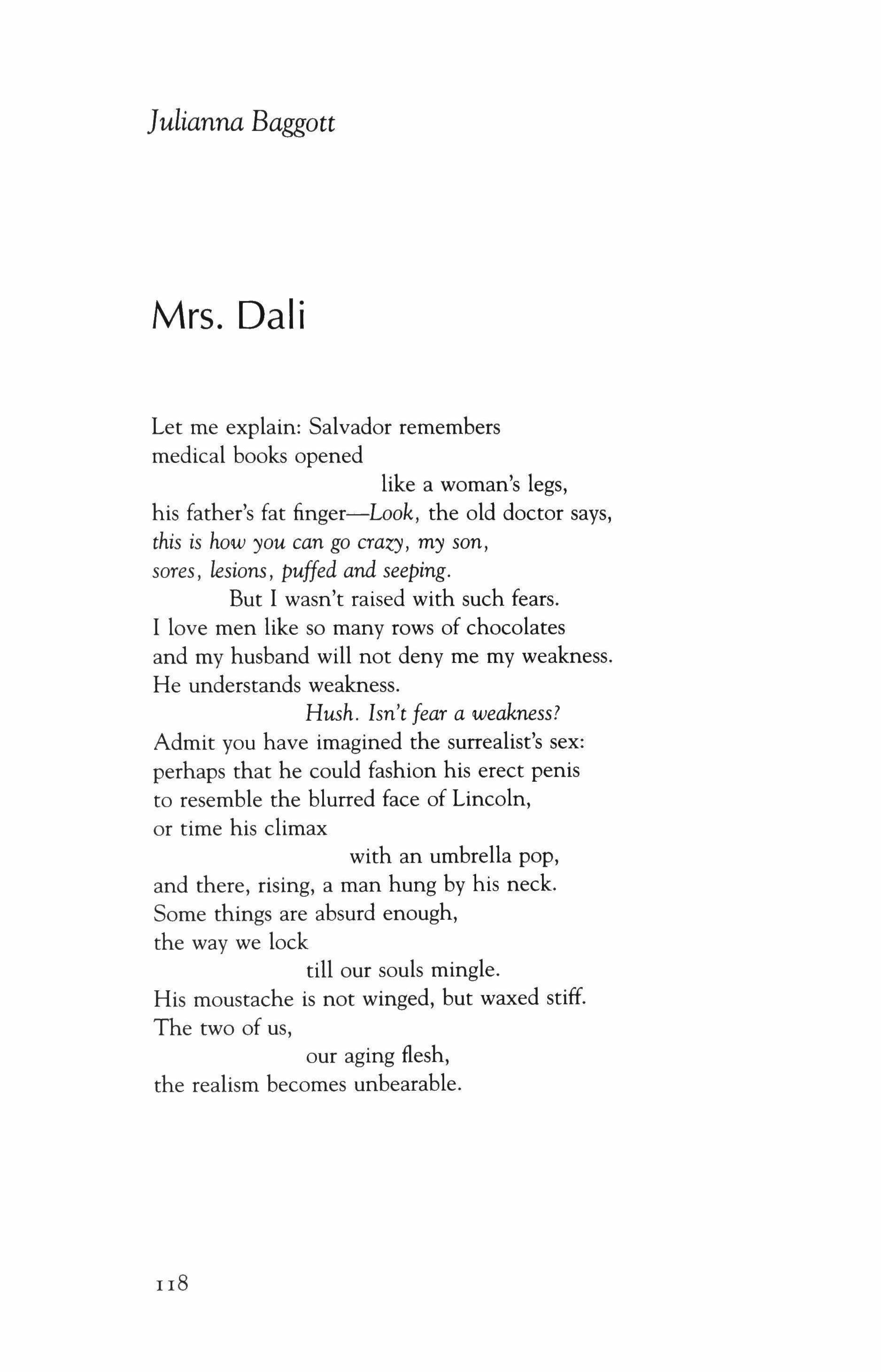
Let me explain: Salvador remembers medical books opened like a woman's legs, his father's fat finger-Look, the old doctor says, this is how you can go crazy, my son, sores, lesions, puffed and seeping. But I wasn't raised with such fears. I love men like so many rows of chocolates and my husband will not deny me my weakness. He understands weakness. Hush. Isn't fear a weakness? Admit you have imagined the surrealist's sex: perhaps that he could fashion his erect penis to resemble the blurred face of Lincoln, or time his climax with an umbrella pop, and there, rising, a man hung by his neck. Some things are absurd enough, the way we lock till our souls mingle. His moustache is not winged, but waxed stiff. The two of us, our aging flesh, the realism becomes unbearable.
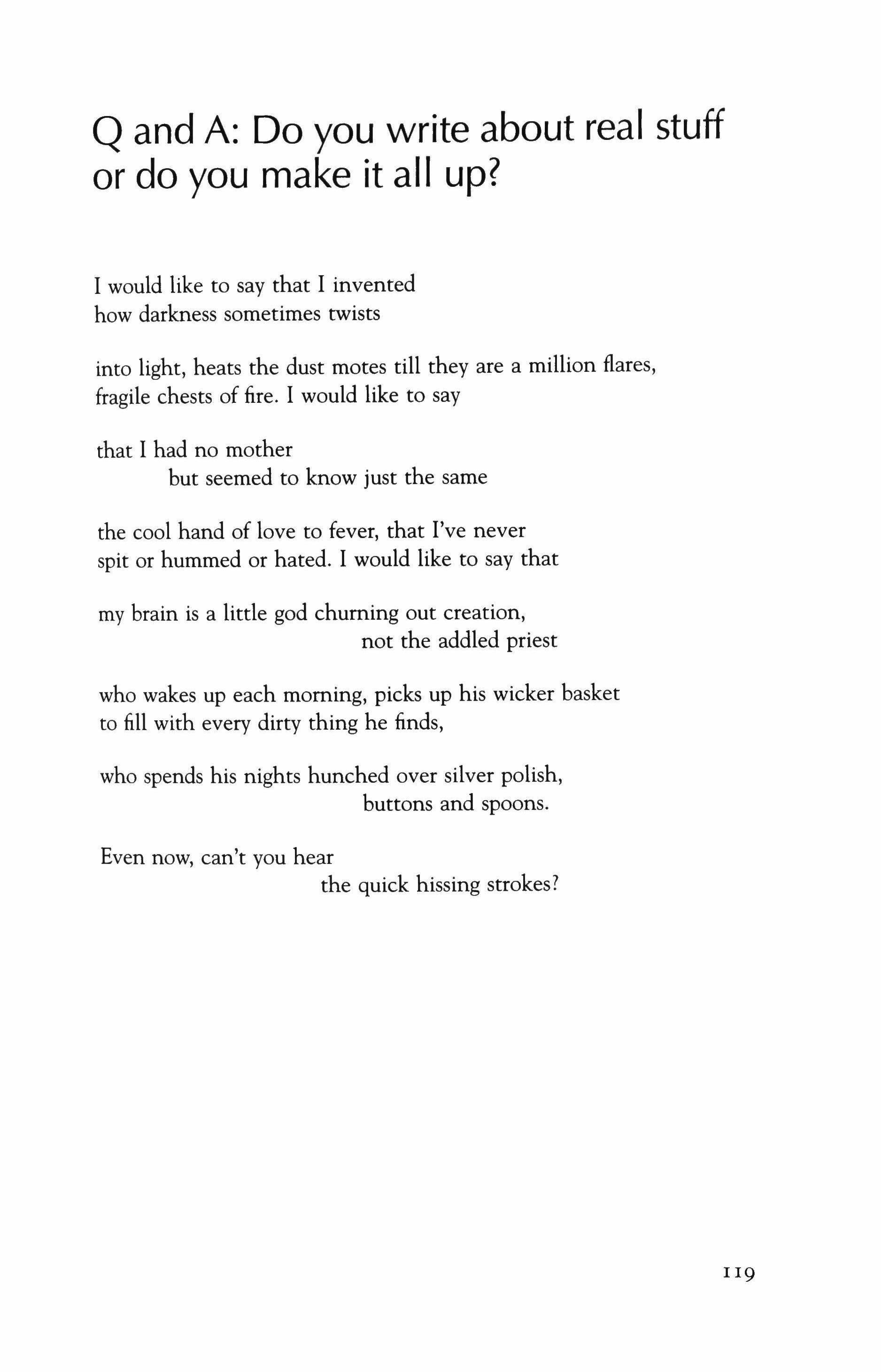
I would like to say that I invented how darkness sometimes twists into light, heats the dust motes till they are a million flares, fragile chests of fire. I would like to say that I had no mother but seemed to know just the same the cool hand of love to fever, that I've never spit or hummed or hated. I would like to say that my brain is a little god churning out creation, not the addled priest who wakes up each morning, picks up his wicker basket to fill with every dirty thing he finds, who spends his nights hunched over silver polish, buttons and spoons.
Even now, can't you hear the quick hissing strokes?
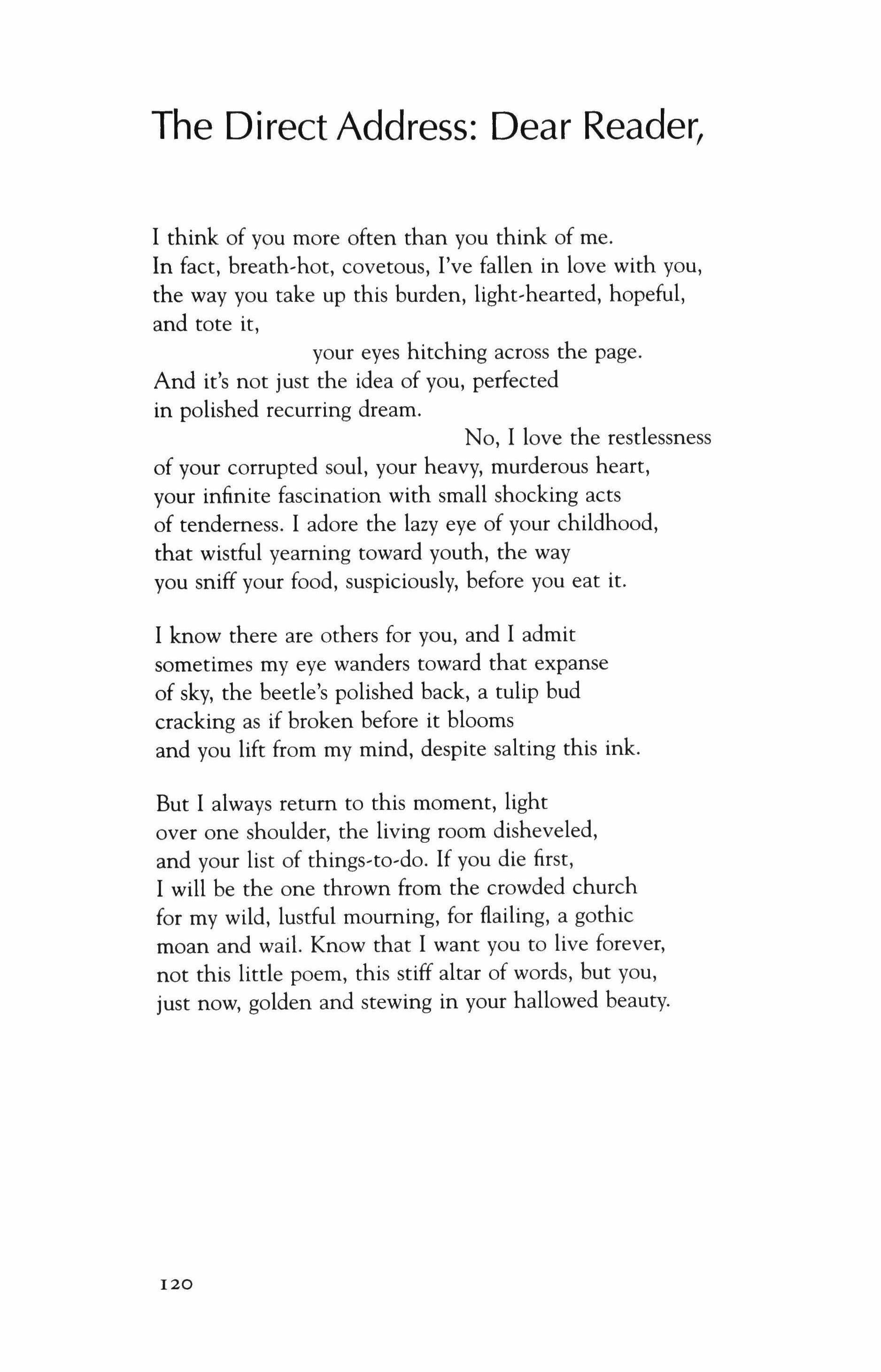
I think of you more often than you think of me. In fact, breath-hot, covetous, I've fallen in love with you, the way you take up this burden, light-hearted, hopeful, and tote it, your eyes hitching across the page. And it's not just the idea of you, perfected in polished recurring dream.
No, I love the restlessness of your corrupted soul, your heavy, murderous heart, your infinite fascination with small shocking acts of tenderness. I adore the lazy eye of your childhood, that wistful yearning toward youth, the way you sniff your food, suspiciously, before you eat it.
I know there are others for you, and I admit sometimes my eye wanders toward that expanse of sky, the beetle's polished back, a tulip bud cracking as if broken before it blooms and you lift from my mind, despite salting this ink.
But I always return to this moment, light over one shoulder, the living room disheveled, and your list of things-to-do. If you die first, I will be the one thrown from the crowded church for my wild, lustful mourning, for flailing, a gothic moan and wail. Know that I want you to live forever, not this little poem, this stiff altar of words, but you, just now, golden and stewing in your hallowed beauty.

He was a brilliant man who knew that life as labyrinth can seem to never end, yet when imprisoned, he himself could not imagine the city inside the still dark point of solitude and so, with his son, took flight. His son's mistake, he said, was not of kind, but of degree, yet Daedalus must have known the fuse of youth is lit by admonition, that a couple of singed wings are nothing compared to flying higher than dad. Besides, his son was young, and the young are always immortal. Daedalus must have known. We know he sought to murder his gifted nephew, whose inventions began to outshine his own. We know he wanted to be the only sun of art and was willing to melt any wings that approached his height.
But the centers of suns are darker than solitude and full of heaviness. What else could feed such light? Radiance is the art of darkness, not a matter of flight towards or above, but of gravity within.
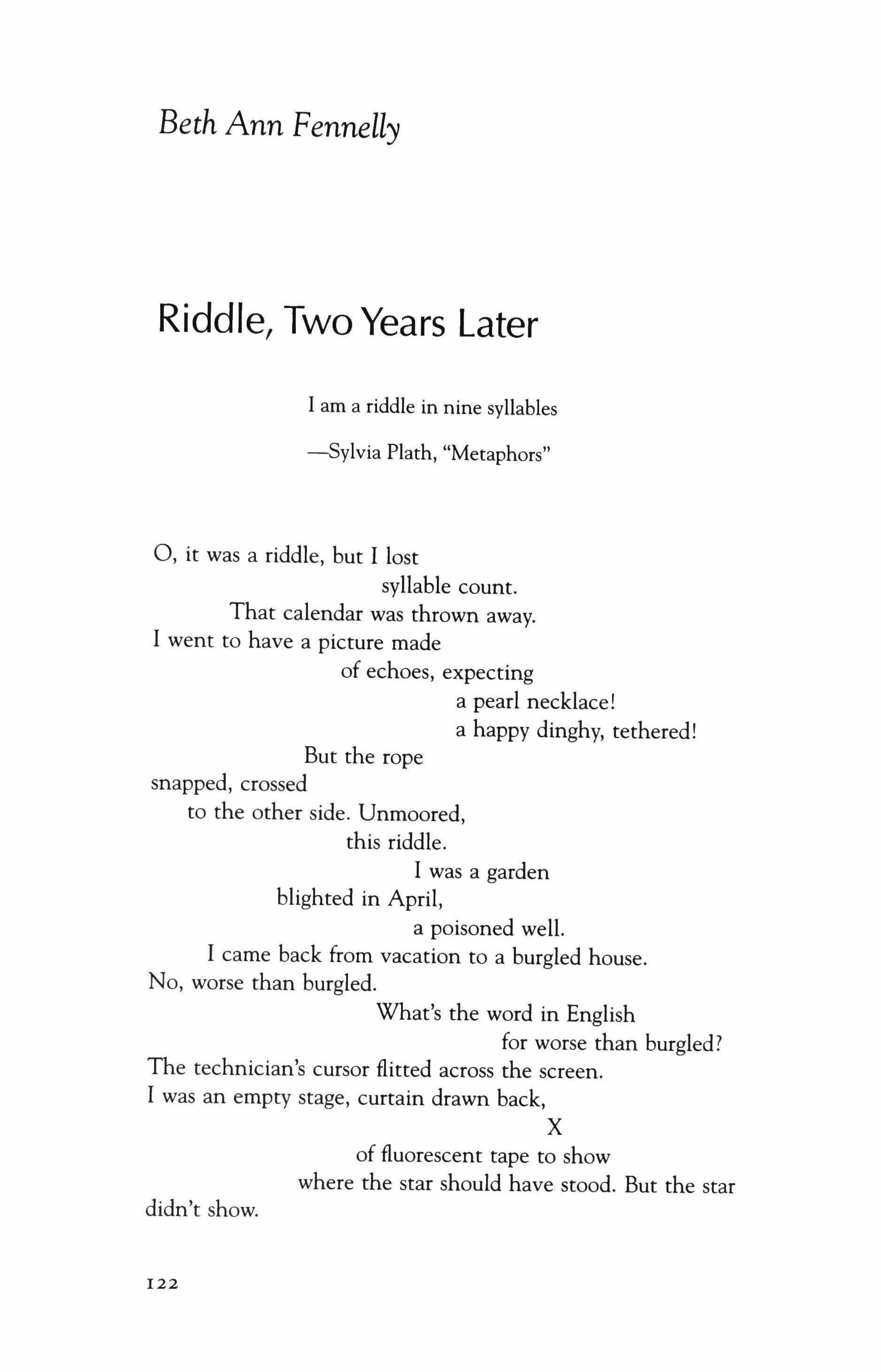
I am a riddle in nine syllables -Sylvia Plath, "Metaphors"
0, it was a riddle, but I lost syllable count. That calendar was thrown away. I went to have a picture made of echoes, expecting a pearl necklace! a happy dinghy, tethered!
But the rope snapped, crossed to the other side. Unmoored, this riddle.
I was a garden blighted in April, a poisoned well. I came back from vacation to a burgled house. No, worse than burgled. What's the word in English for worse than burgled?
The technician's cursor flitted across the screen.
I was an empty stage, curtain drawn back, X of fluorescent tape to show where the star should have stood. But the star didn't show.
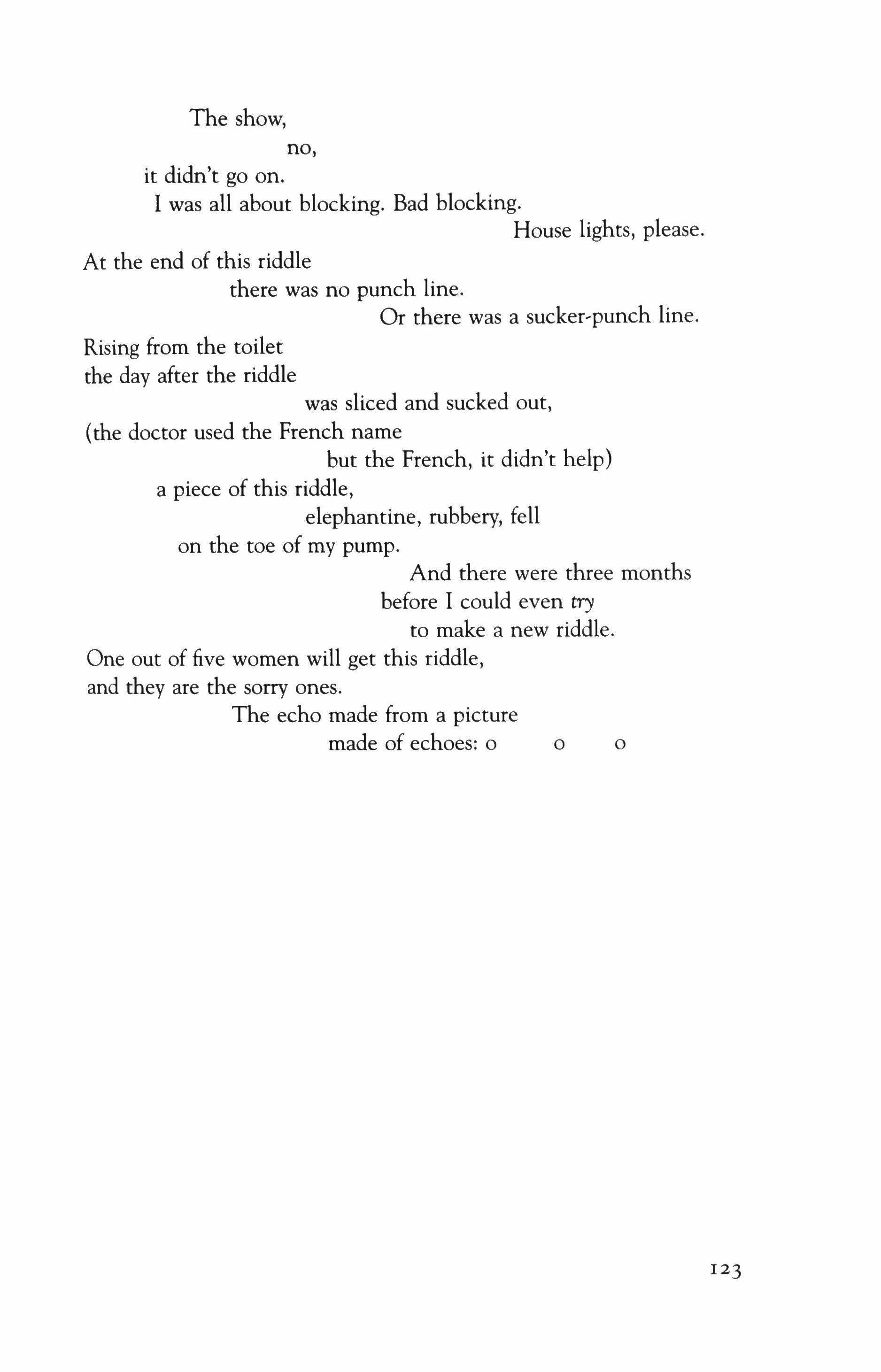
The show, no, it didn't go on.
I was all about blocking. Bad blocking. House lights, please.
At the end of this riddle there was no punch line. Or there was a sucker-punch line.
Rising from the toilet the day after the riddle was sliced and sucked out, (the doctor used the French name but the French, it didn't help)
a piece of this riddle, elephantine, rubbery, fell on the toe of my pump.
And there were three months before I could even try to make a new riddle.
One out of five women will get this riddle, and they are the sorry ones.
The echo made from a picture made of echoes: a a a
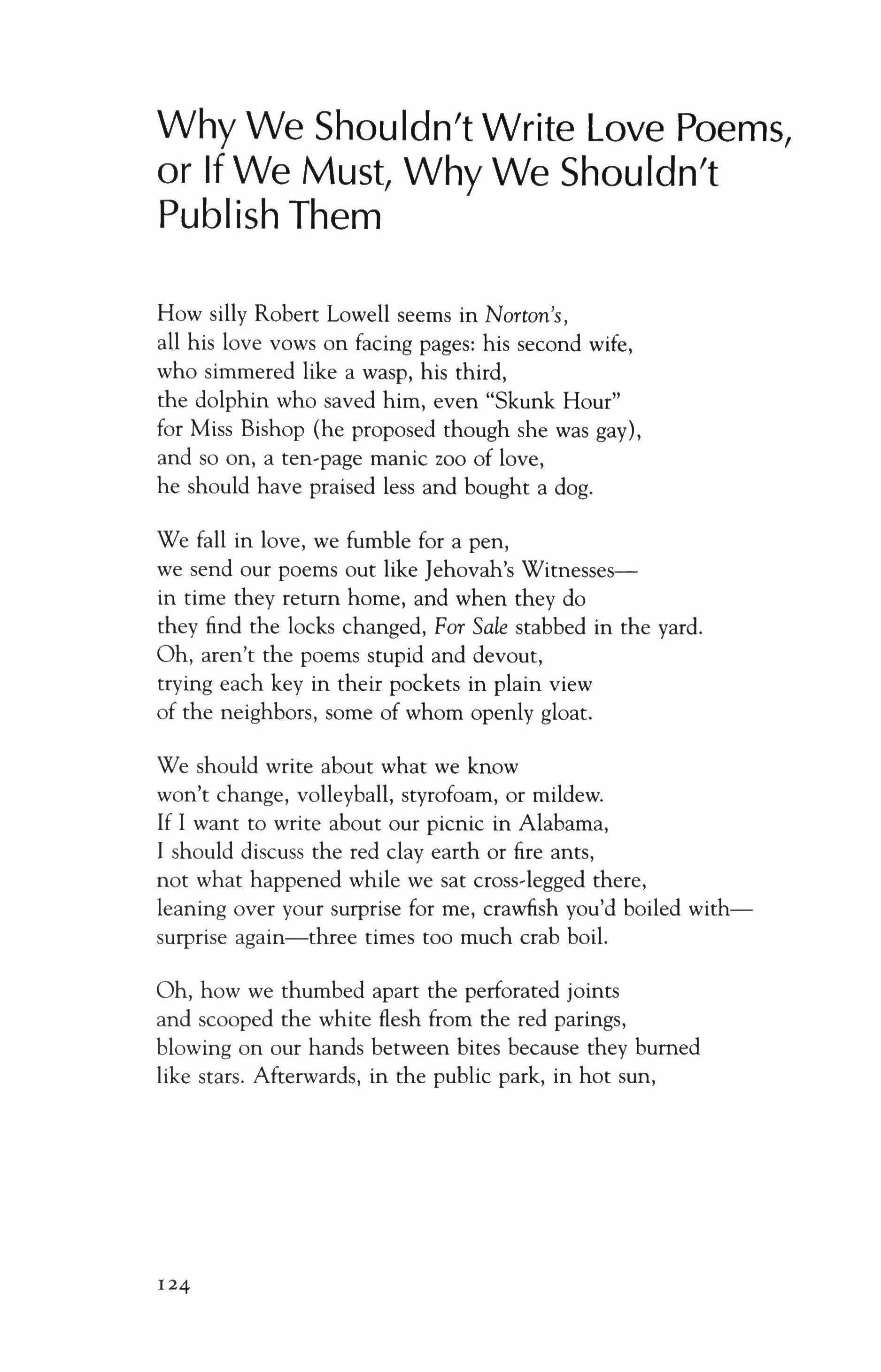
How silly Robert Lowell seems in Norton's, all his love vows on facing pages: his second wife, who simmered like a wasp, his third, the dolphin who saved him, even "Skunk Hour" for Miss Bishop (he proposed though she was gay), and so on, a ten'page manic zoo of love, he should have praised less and bought a dog.
We fall in love, we fumble for a pen, we send our poems out like Jehovah's Witnessesin time they return home, and when they do they find the locks changed, For Sale stabbed in the yard. Oh, aren't the poems stupid and devout, trying each key in their pockets in plain view of the neighbors, some of whom openly gloat.
We should write about what we know won't change, volleyball, styrofoam, or mildew. If I want to write about our picnic in Alabama, I should discuss the red clay earth or fire ants, not what happened while we sat cross'legged there, leaning over your surprise for me, crawfish you'd boiled withsurprise again-three times too much crab boil.
Oh, how we thumbed apart the perforated joints and scooped the white flesh from the red parings, blowing on our hands between bites because they burned like stars. Afterwards, in the public park, in hot sun,
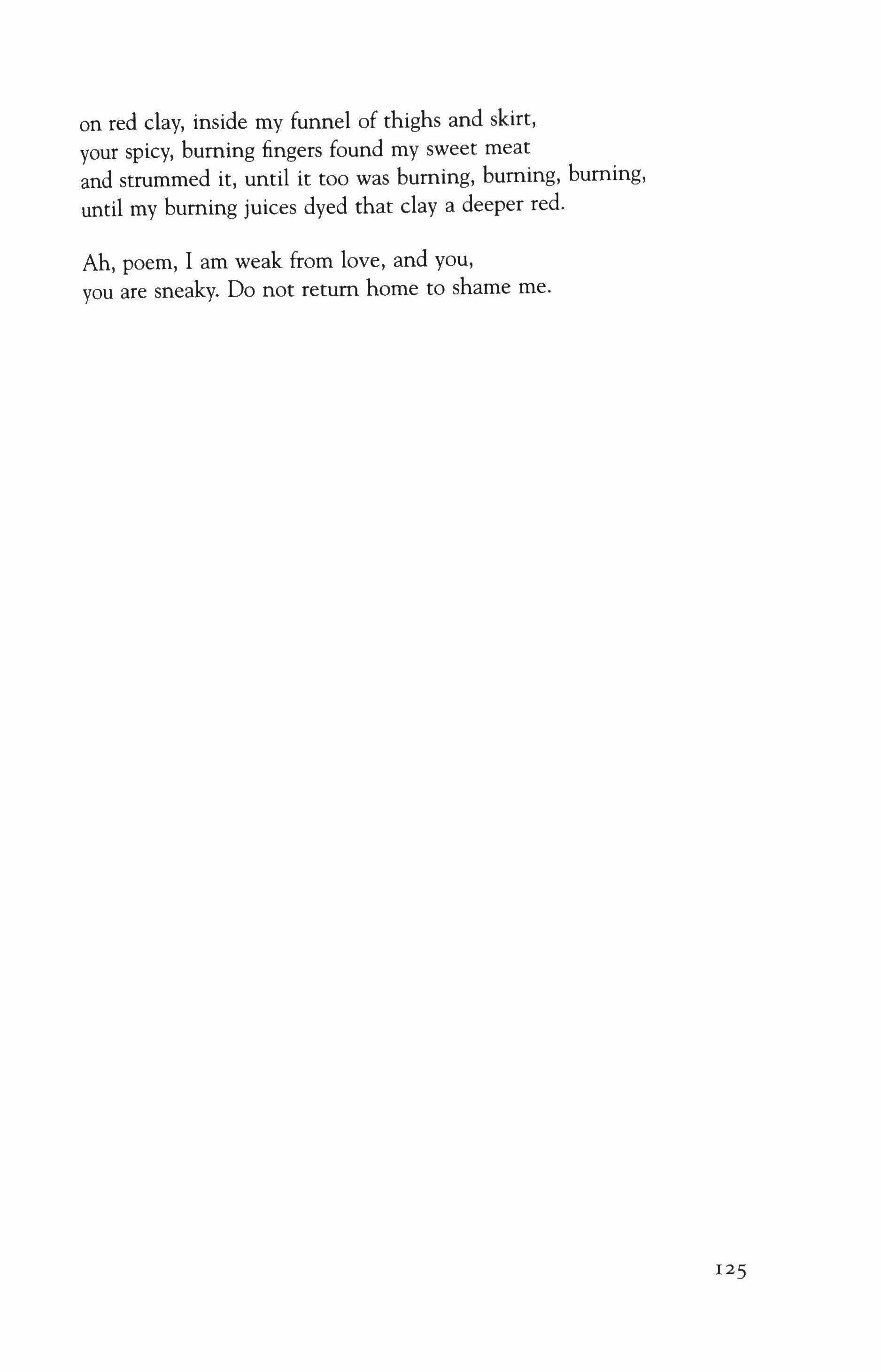
on red clay, inside my funnel of thighs and skirt, your spicy, burning fingers found my sweet meat and strummed it, until it too was burning, burning, burning, until my burning juices dyed that clay a deeper red.
Ah, poem, I am weak from love, and you, you are sneaky. Do not return home to shame me.

Once I did kiss her wetly on the mouth and her lips loosened, her tongue rising like a fish to swim in my waters because she learns the world by tasting it, by taking it inside.
I desired it-her learning my tongue that way.
Yes, I wanted to soul-kiss my daughter, to lather, slaver the toothless gums and the cat-arched back of her palate, to sniff the bouquet of baby's breath all the way to the vase of her throat
Look at her, in her highchair, wearing her yam goatee
I like to take her whole foot in my mouth
Look at her, in her bib slung backwards, like a superhero's capebeware, small villains everywhere
Oh, that first day when the nurses returned her to my cot so newly minted, her soles were black from ink they laid her, naked, on my naked chest so she could swell my breasts with milksong, so I could warm her skin with my skin, and so, next to my more regular heart, her skittish beat would steadythough I swear when she latched on all meter, music changed

I whispered in her see-through ear I'd keep her safe foreverI, her first lover.
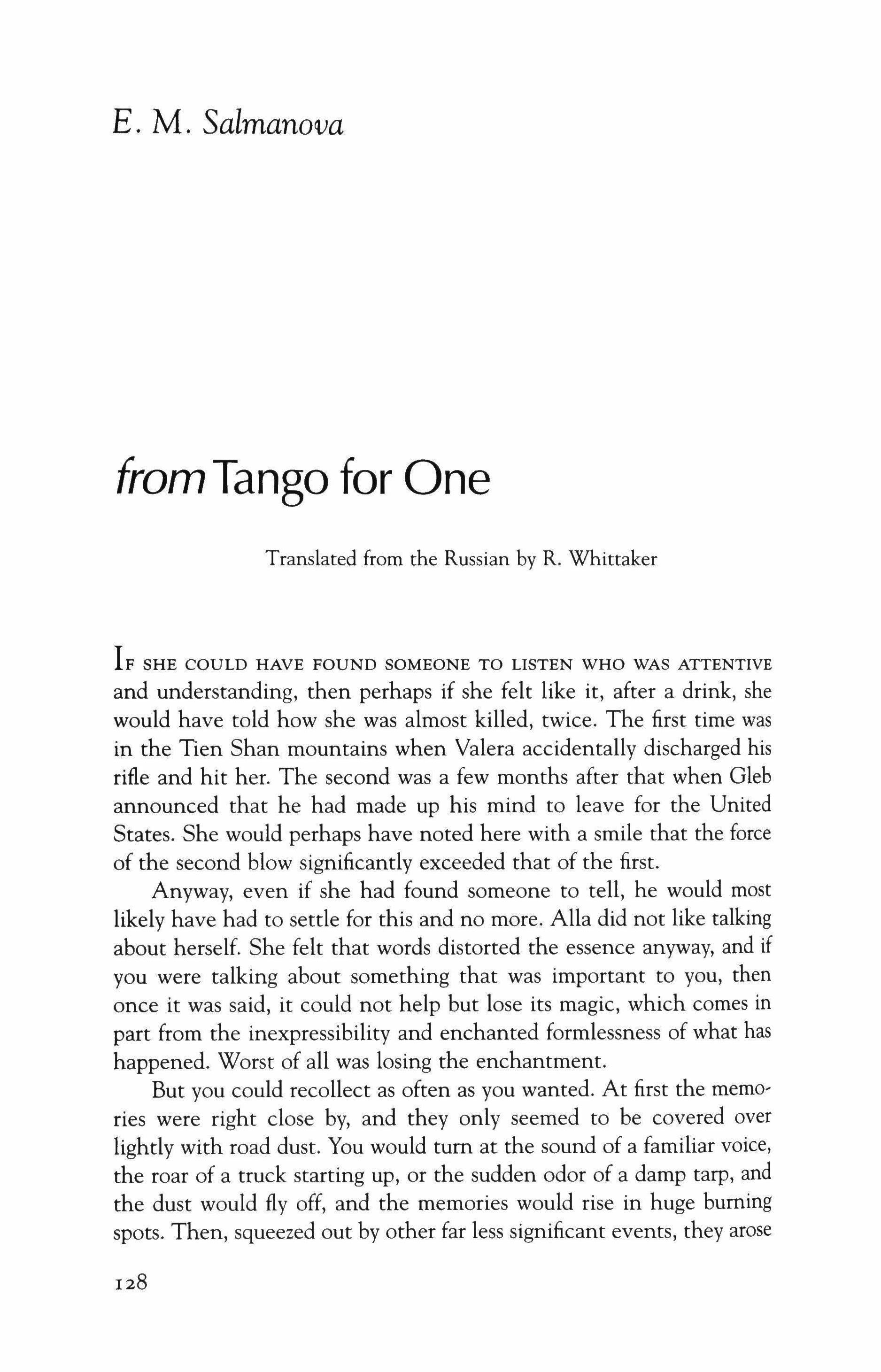
Translated from the Russian by R.
WhittakerIF SHE COULD HAVE FOUND SOMEONE TO LISTEN WHO WAS ATTENTIVE and understanding, then perhaps if she felt like it, after a drink, she would have told how she was almost killed, twice. The first time was in the Tien Shan mountains when Valera accidentally discharged his rifle and hit her. The second was a few months after that when Gleb announced that he had made up his mind to leave for the United States. She would perhaps have noted here with a smile that the force of the second blow significantly exceeded that of the first.
Anyway, even if she had found someone to tell, he would most likely have had to settle for this and no more. AlIa did not like talking about herself. She felt that words distorted the essence anyway, and if you were talking about something that was important to you, then once it was said, it could not help but lose its magic, which comes in part from the inexpressibility and enchanted formlessness of what has happened. Worst of all was losing the enchantment.
But you could recollect as often as you wanted. At first the memories were right close by, and they only seemed to be covered over lightly with road dust. You would tum at the sound of a familiar voice, the roar of a truck starting up, or the sudden odor of a damp tarp, and the dust would fly off, and the memories would rise in huge burning spots. Then, squeezed out by other far less significant events, they arose

less and less often. Still they always arrived in time, like an organism's defensive reaction, like the instinct for self-preservation, magically forcing open the emptiness thickening around you.
The expedition to Tien Shan was their last. It was the last because fate abruptly scattered its participants afterwards, and because expeditions of this sort were soon stopped altogether. Like many academic organizations, the biological institute where they worked was left without any funding and struggled simply to exist, not even dreaming any more about such luxuries as research trips.
In fact, even this last expedition took place by accident. The institute had already begun suffocating from lack of money, and only the financial intervention of David Cook, an entomologist from Seattle who was interested in gathering insects in Kirghizia, had put them on the road.
Together with David there were six of them: three junior researchers-Gleb and Tanya from the beetle section, Lesha from butterflies, the driver Valera and Alla. Alla was a lab assistant in hymenoptera-incomprehensible, almost incorporeal insects that did not interest her very much. But, first of all, there had been no vacancies in the other sections when she joined the institute, and secondly, the fact that her work bench was separated from Gleb's by only a plywood partition soon made up for all the rest. To tell the truth, it was Gleb who insisted that they take her despite an acute budget deficit. He had an amazing way of talking-smiling openly, and intentionally making the subject of conversation a bit less serious than it was in fact. So that you'd begin to view problems at work, even sometimes your own personal problems, with a strange, unexpected levity.
Gleb's friend, Maxim-Max-took them to the airport in his Zhiguli. They were leaving early, and Maxim not only looked like he needed sleep, but he was irritable, having come home only at four in the morning from the TV studios where he worked on some kind of program about painting. By some miracle he managed to avoid an accident, as he drove around traffic jams and central arteries closed with eternal road repairs by racing through endless, tortuous back alleys. He got them to Pulkovo, and now-tall, thin, unshaven-he towered over the heap of baggage dumped on the floor waiting for check in. Maxim clearly intimidated Tanya, who lowered her eyes and giggled inappropriately, pressing her fist to her mouth. Her whole, round, bunny-like face with short bangs, like little rays, expressed embarrassment and a desire to get on the plane as soon as possible.
Bending over to get her bag, Alla tripped and struck Maxim with her shoulder. Maxim grabbed her by the arm, then just as abruptly let go.
"Have a good time," he said, putting her things on the black moving belt, "chasing after cockroaches."
This was the longest sentence he had said the entire morning. Tanya giggled.
During the first quarter of the trip to Frunze, Gleb teased AHa, talking nonsense about some kind of looks that Maxim had been giving her in the airport. Even in the gloomy way that Gleb expressed his jealousy there was a nonchalance and levity that imbued everything around with a special joy, sharp as a razor, that Alla always felt when next to him.

From Frunze, where they were met by Valera and packed their things in his small truck with its high body covered by a tarp, they drove on towards Ysvk-Kol's southern shore, which had not yet been built up with resorts. The truck bounced over the uneven, dusty road, and from morning to night Valera's tanned face) wrinkled like a raisin, never lost its expression of squeamish dissatisfaction and boredom. Sitting next to him in the cabin, Gleb had to endure his endless monotone complaints about the route, the food, the quality of the truck, and the general burdens of a truck driver's life. At one of the first stops not far from Frunze, Valera unexpectedly got drunk, and the expedition had to spend several days waiting for his insensate body to return to its normal, trouble-making, working condition.
By the way, this never happened again. Valera got a grip on himself and every time, at supper, when the members of the expedition poured around glassfuls of pure laboratory alcohol, he would sit with the injured look of a girl who had just been made an indecent offer. Scarcely having finished his food, he demonstratively set off to the truck to sleep.
David gallantly bore out the severities of the expedition, and if at first there was a certain stiff formality towards him, then after Valera's bender, which bound them together like a natural disaster unites people, it disappeared and they began to treat David simply and without ceremony, like one of their own. Gleb, who knew English pretty well, got friendliest of all with him; indeed, as head of the expedition, it was his responsibility to make sure that their foreign guest and sponsor felt
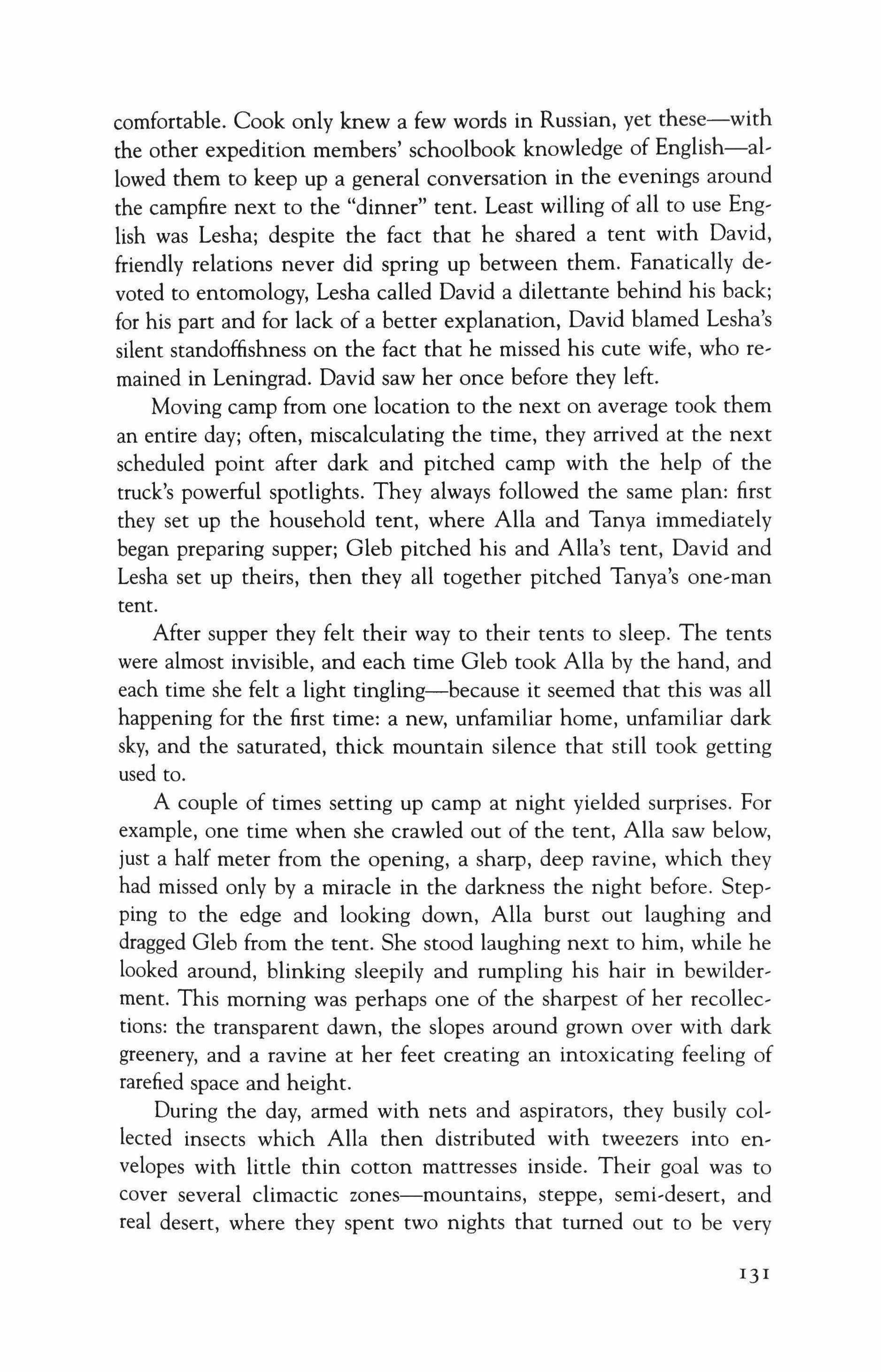
comfortable. Cook only knew a few words in Russian, yet these-with the other expedition members' schoolbook knowledge of English-c-allowed them to keep up a general conversation in the evenings around the campfire next to the "dinner" tent. Least willing of all to use English was Lesha; despite the fact that he shared a tent with David, friendly relations never did spring up between them. Fanatically devoted to entomology, Lesha called David a dilettante behind his back; for his part and for lack of a better explanation, David blamed Lesha's silent standoffishness on the fact that he missed his cute wife, who remained in Leningrad. David saw her once before they left.
Moving camp from one location to the next on average took them an entire day; often, miscalculating the time, they arrived at the next scheduled point after dark and pitched camp with the help of the truck's powerful spotlights. They always followed the same plan: first they set up the household tent, where Alla and Tanya immediately began preparing supper; Gleb pitched his and Alla's tent, David and Lesha set up theirs, then they all together pitched Tanya's one-man tent.
After supper they felt their way to their tents to sleep. The tents were almost invisible, and each time Gleb took Alla by the hand, and each time she felt a light tingling-because it seemed that this was all happening for the first time: a new, unfamiliar home, unfamiliar dark sky, and the saturated, thick mountain silence that still took getting used to.
A couple of times setting up camp at night yielded surprises. For example, one time when she crawled out of the tent, AHa saw below, just a half meter from the opening, a sharp, deep ravine, which they had missed only by a miracle in the darkness the night before. Stepping to the edge and looking down, AHa burst out laughing and dragged Gleb from the tent. She stood laughing next to him, while he looked around, blinking sleepily and rumpling his hair in bewilderment. This morning was perhaps one of the sharpest of her recollections: the transparent dawn, the slopes around grown over with dark greenery, and a ravine at her feet creating an intoxicating feeling of rarefied space and height.
During the day, armed with nets and aspirators, they busily collected insects which AHa then distributed with tweezers into envelopes with little thin cotton mattresses inside. Their goal was to cover several climactic zones-mountains, steppe, semi-desert, and real desert, where they spent two nights that turned out to be very
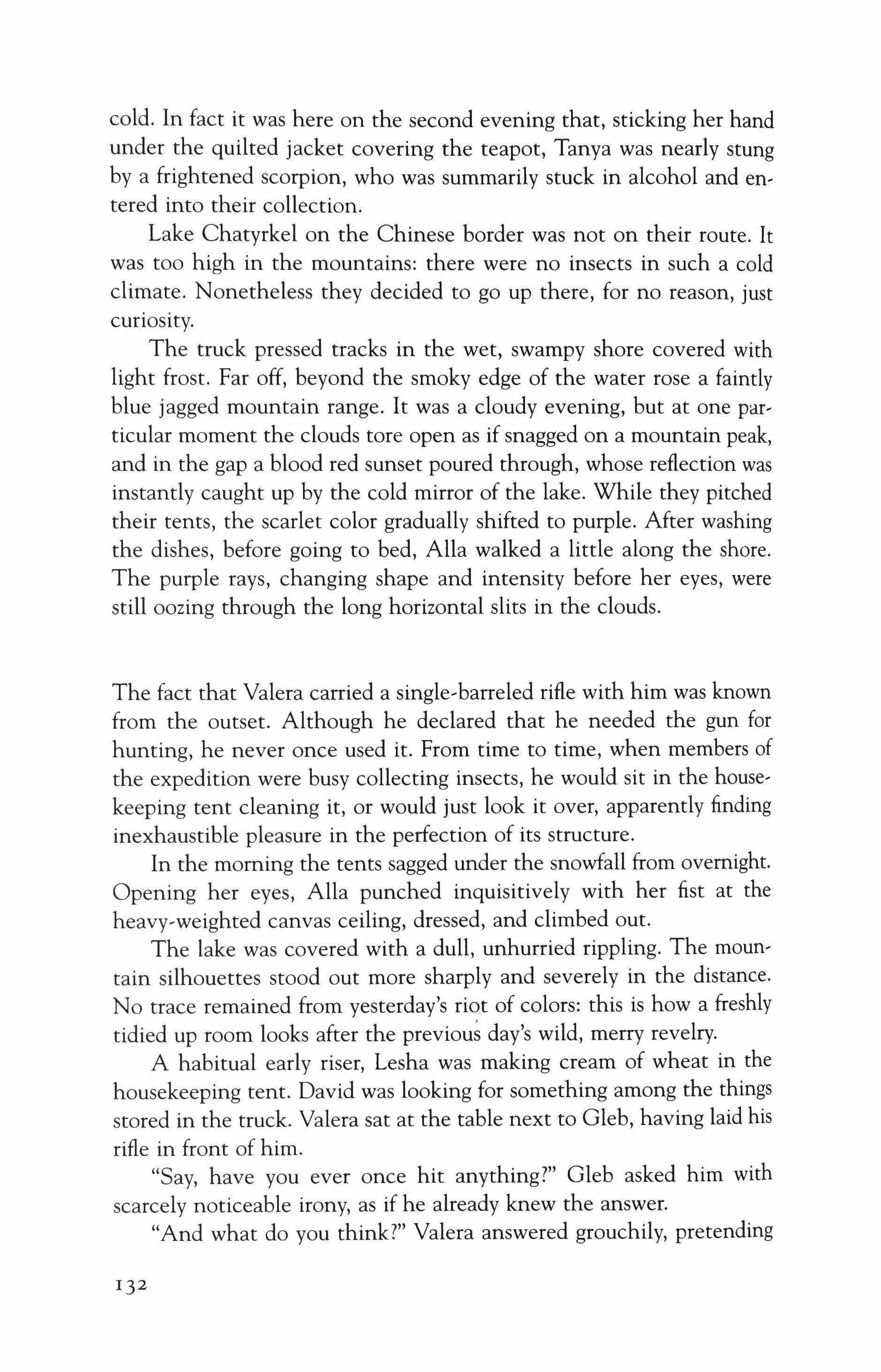
cold. In fact it was here on the second evening that, sticking her hand under the quilted jacket covering the teapot, Tanya was nearly stung by a frightened scorpion, who was summarily stuck in alcohol and entered into their collection.
Lake Chatyrkel on the Chinese border was not on their route. It was too high in the mountains: there were no insects in such a cold climate. Nonetheless they decided to go up there, for no reason, just curiosity.
The truck pressed tracks in the wet, swampy shore covered with light frost. Far off, beyond the smoky edge of the water rose a faintly blue jagged mountain range. It was a cloudy evening, but at one particular moment the clouds tore open as if snagged on a mountain peak, and in the gap a blood red sunset poured through, whose reflection was instantly caught up by the cold mirror of the lake. While they pitched their tents, the scarlet color gradually shifted to purple. After washing the dishes, before going to bed, Alla walked a little along the shore. The purple rays, changing shape and intensity before her eyes, were still oozing through the long horizontal slits in the clouds.
The fact that Valera carried a single-barreled rifle with him was known from the outset. Although he declared that he needed the gun for hunting, he never once used it. From time to time, when members of the expedition were busy collecting insects, he would sit in the housekeeping tent cleaning it, or would just look it over, apparently finding inexhaustible pleasure in the perfection of its structure.
In the morning the tents sagged under the snowfall from overnight. Opening her eyes, Alla punched inquisitively with her fist at the heavy-weighted canvas ceiling, dressed, and climbed out.
The lake was covered with a dull, unhurried rippling. The mountain silhouettes stood out more sharply and severely in the distance. No trace remained from yesterday's riot of colors: this is how a freshly tidied up room looks after the previous day's wild, merry revelry.
A habitual early riser, Lesha was making cream of wheat in the housekeeping tent. David was looking for something among the things stored in the truck. Valera sat at the table next to Gleb, having laid his rifle in front of him.
"Say, have you ever once hit anything?" Gleb asked him with scarcely noticeable irony, as if he already knew the answer.
"And what do you think?" Valera answered grouchily, pretending

that he was aiming at the trunk of a small stunted tree nearby. "Like I simply drag it around for nothing?"
"You don't even know how to aim it right," Gleb teased him.
Alla smiled, took the teapot off the stove and poured them cocoa.
"And what's with Tanya, still sleeping?" Lesha asked, displeased, beginning to dish out the porridge into bowls.
"I'll go now and wake her."
Tanya's tent was located some ten paces away. Ducking in, AlIa saw that Tanya had already gotten up and was combing her hair in front of a small mirror. They joked about the snowfall, and Alla told Tanya to hurry up, since Leshka had already made porridge and was angry as a quarrelsome housewife.
Coming out of the tent she heard a thunderclap
It took them almost twenty-four hours to get to the nearest population center with a hospital, and all this time Gleb held her hand without letting go. She thought it was all the time, because every time she would regain consciousness for a bit, she saw him next to her and felt his hand squeezing her wrist. For all the years since then Alla had been sure that this was just what had saved her-the sturdy male hand squeezing her fingers. However, the doctors said that what saved her was not that, but the fact that the bullet went clean through her side, only slightly touching her right lung.
Alla didn't remember very well the hospital she wound up in. She remembered the IV, the iron rail of the bed with chipped paint, the flat, impenetrable face of the nurse and the constant, unwavering presence of Gleb. She remembered much better the twinkling lights, and the idea as if some kind of Kirghiz gangsters, who had found out a Russian girl was in the ward, were breaking into the hospital to finish her off. Their quick shadows flitted across the painted glass of the door, you could hear unintelligible shouts. At the same time AHa had completely forgotten the feeling of fear and physical pain, despite the fact that these were certainly present. They were overshadowed by the colorful, floating mirages which rose before here eyes and blended indistinguishably with reality; these mirages brought with them a ringing, ravishing feeling of death approaching right up close, which Gleb's voice and hands split like a wedge, holding her back right at the edge.
Hung on the wall in the corridor a loudspeaker was playing music. One morning AHa heard a distant, rising melody: black, brilliant, red-

dish sounds poured hot into the room, filling up all the space. She turned her face to Gleb and took his hand, sensing a surge of burning, ecstatic love, before which death became small and pitiful and had no meaning at all.
Later when she told Gleb about this, he answered that most likely it was simply the delirium. No Kirghiz at all were trying to break into the hospital. There was in fact a loudspeaker in the corridor, but he didn't remember that they broadcast music those days in the mornings. But then at that time the relations between them were already quite strained and he could have said that for no reason, in annoyance.
The second time Alla almost died-at least that's how it seemed to her then-was several months later, in Leningrad, when she was already able to work again and everything seemed to be returning to normal. This happened when Gleb received an official invitation from David, who had found a position for him at his university in Seattle. To tell the truth, Alla knew earlier that David had suggested Gleb leave. She also knew that Gleb, with that practical love of adventure typical of him, had always listened to the suggestions of the American entomologist with great interest. All these months, however, AHa had been much more concerned with getting her own strength back than with the plans that Gleb was formulating, looking at them with the same seriousness that an adult looks at the efforts of a child erecting a sand castle.
Gleb's departure became absolutely real on that day when he shoved at her tidy sheets of paper with English on them that Alla could not even make any sense out of, and in fact didn't even try: the look of these white rectangles itself stunned her no less than the shot from Valera's rifle.
"So, and what do you plan to do with these?" she asked in a voice limp with fright.
Gleb was going down the stairs ahead of her. He held in his hands boxes from the insect collections that were infested and needed to be cleaned out.
"Use them as intended," he said without turning around. "We'll get married and leave together."
"You're crazy," said AHa.
Gleb was silent, but it seemed to her that his back, shoulders, and even the nape of his neck tensed up stiff.
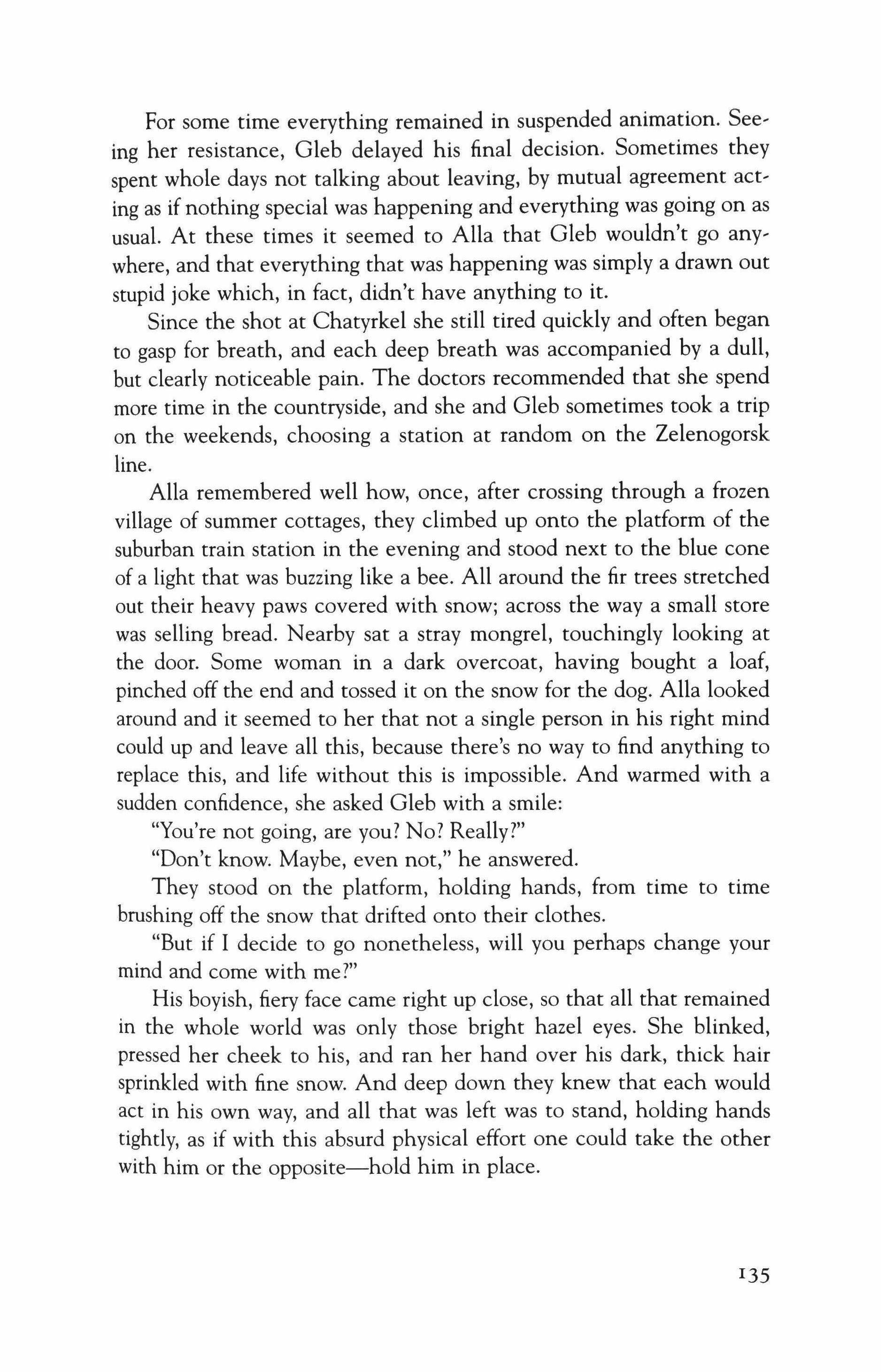
For some time everything remained in suspended animation. See, ing her resistance, Gleb delayed his final decision. Sometimes they spent whole days not talking about leaving, by mutual agreement act' ing as ifnothing special was happening and everything was going on as usual. At these times it seemed to Alla that Gleb wouldn't go any' where, and that everything that was happening was simply a drawn out stupid joke which, in fact, didn't have anything to it.
Since the shot at Chatyrkel she still tired quickly and often began to gasp for breath, and each deep breath was accompanied by a dull, but clearly noticeable pain. The doctors recommended that she spend more time in the countryside, and she and Gleb sometimes took a trip on the weekends, choosing a station at random on the Zelenogorsk line.
Alla remembered well how, once, after crossing through a frozen village of summer cottages, they climbed up onto the platform of the suburban train station in the evening and stood next to the blue cone of a light that was buzzing like a bee. All around the fir trees stretched out their heavy paws covered with snow; across the way a small store was selling bread. Nearby sat a stray mongrel, touchingly looking at the door. Some woman in a dark overcoat, having bought a loaf, pinched off the end and tossed it on the snow for the dog. Alla looked around and it seemed to her that not a single person in his right mind could up and leave all this, because there's no way to find anything to replace this, and life without this is impossible. And warmed with a sudden confidence, she asked Gleb with a smile:
"You're not going, are you? No? Really?"
"Don't know. Maybe, even not," he answered.
They stood on the platform, holding hands, from time to time brushing off the snow that drifted onto their clothes.
"But if I decide to go nonetheless, will you perhaps change your mind and come with me?"
His boyish, fiery face came right up close, so that all that remained in the whole world was only those bright hazel eyes. She blinked, pressed her cheek to his, and ran her hand over his dark, thick hair sprinkled with fine snow. And deep down they knew that each would act in his own way, and all that was left was to stand, holding hands tightly, as if with this absurd physical effort one could take the other with him or the opposite-hold him in place.
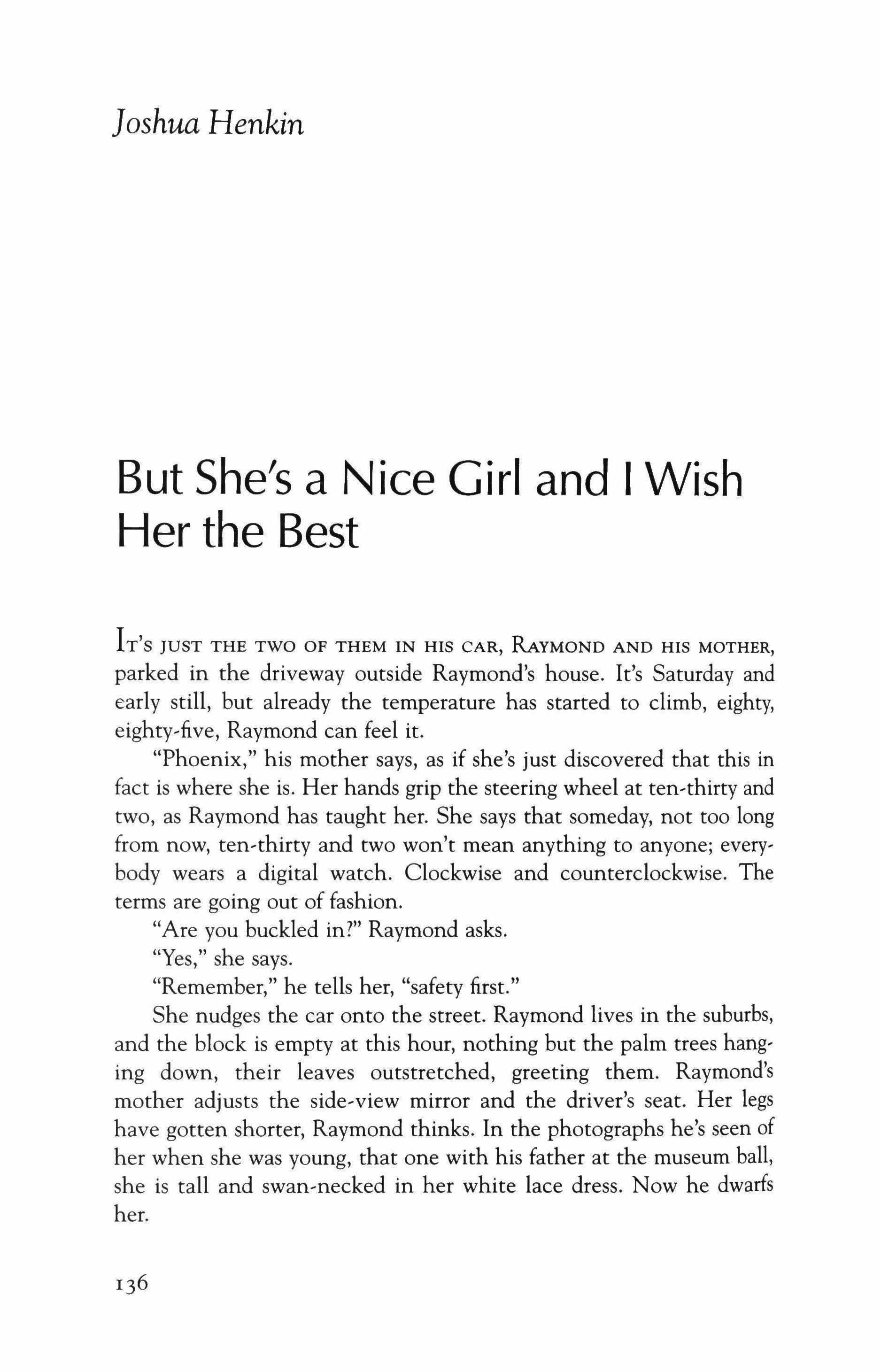
IT'S JUST THE TWO OF THEM IN HIS CAR, RAYMOND AND HIS MOTHER, parked in the driveway outside Raymond's house. It's Saturday and early still, but already the temperature has started to climb, eighty, eighty-five, Raymond can feel it.
"Phoenix," his mother says, as if she's just discovered that this in fact is where she is. Her hands grip the steering wheel at ten-thirty and two, as Raymond has taught her. She says that someday, not too long from now, ten-thirty and two won't mean anything to anyone; everybody wears a digital watch. Clockwise and counterclockwise. The terms are going out of fashion.
"Are you buckled in?" Raymond asks.
"Yes," she says.
"Remember," he tells her, "safety first."
She nudges the car onto the street. Raymond lives in the suburbs, and the block is empty at this hour, nothing but the palm trees hanging down, their leaves outstretched, greeting them. Raymond's mother adjusts the side-view mirror and the driver's seat. Her legs have gotten shorter, Raymond thinks. In the photographs he's seen of her when she was young, that one with his father at the museum ball, she is tall and swan-necked in her white lace dress. Now he dwarfs her.
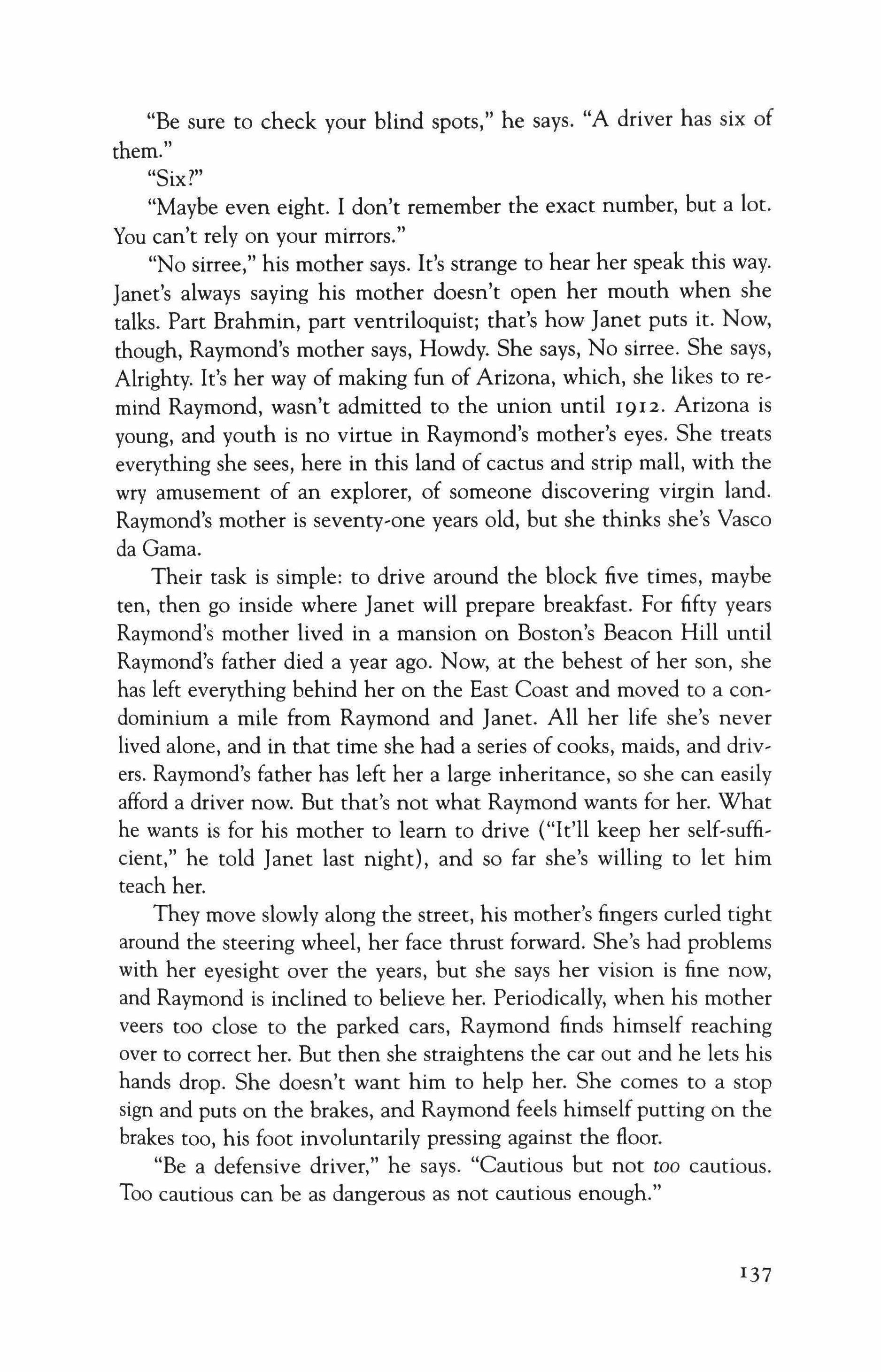
"Be sure to check your blind spots," he says. "A driver has six of them."
"Six?"
"Maybe even eight. I don't remember the exact number, but a lot. You can't rely on your mirrors."
"No sirree," his mother says. It's strange to hear her speak this way. Janet's always saying his mother doesn't open her mouth when she talks. Part Brahmin, part ventriloquist; that's how Janet puts it. Now, though, Raymond's mother says, Howdy. She says, No sirree. She says, Alrighty, It's her way of making fun of Arizona, which, she likes to remind Raymond, wasn't admitted to the union until 1912. Arizona is young, and youth is no virtue in Raymond's mother's eyes. She treats everything she sees, here in this land of cactus and strip mall, with the wry amusement of an explorer, of someone discovering virgin land. Raymond's mother is seventy-one years old, but she thinks she's Vasco da Gama.
Their task is simple: to drive around the block five times, maybe ten, then go inside where Janet will prepare breakfast. For fifty years Raymond's mother lived in a mansion on Boston's Beacon Hill until Raymond's father died a year ago. Now, at the behest of her son, she has left everything behind her on the East Coast and moved to a condominium a mile from Raymond and Janet. All her life she's never lived alone, and in that time she had a series of cooks, maids, and drivers. Raymond's father has left her a large inheritance, so she can easily afford a driver now. But that's not what Raymond wants for her. What he wants is for his mother to learn to drive ("It'll keep her self-sufficient," he told Janet last night), and so far she's willing to let him teach her.
They move slowly along the street, his mother's fingers curled tight around the steering wheel, her face thrust forward. She's had problems with her eyesight over the years, but she says her vision is fine now, and Raymond is inclined to believe her. Periodically, when his mother veers too close to the parked cars, Raymond finds himself reaching over to correct her. But then she straightens the car out and he lets his hands drop. She doesn't want him to help her. She comes to a stop sign and puts on the brakes, and Raymond feels himself putting on the brakes too, his foot involuntarily pressing against the floor.
"Be a defensive driver," he says. "Cautious but not too cautious. Too cautious can be as dangerous as not cautious enough."

He points out the houses they pass, all of them flat, rows and rows of them. "It's a town of mushroom houses," he says. "Mushroom houses and Republicans. That's what I'm surrounded by." This last comment is a jab, for he knows how his mother votes. Still, he's trying to tell her this place is foreign to him too, that he's still trying to get used to it. The move to Arizona was for Janet's job. Raymond's the house husband in this relationship, spending his time taking care of Sam while Janet teaches at the university.
They come to a stop, and a sparrow alights on the hood of their car, then flies away. A man in sweatpants is walking his golden retriever. The neighborhood has started to stir. Raymond opens the window to let in some air, but the heat is oppressive, so he closes it. He turns the air conditioning on high.
He tells his mother what Sam is doing now, though he doesn't know, he's just guessing. Still, he likes to talk with her about Sam. Sam is six and has Down's Syndrome. He's one reason Raymond's encouraged his mother to move here; he wants them to get to know each other better. But Raymond's mother has been hesitant. Children scare her, especially Sam; she doesn't know how to act around him.
"It's a city without a skyline," she says, staring straight ahead through the windshield.
"Things are more spread out here," he admits. Still, he reminds her, there's culture in Phoenix. There's the Heard Museum and the Phoenix Art Museum, the Arizona Science Center, the Botanical Gardens, the university. "There are lots of parks here," he says. "And mountains." He's come to appreciate the landscape, more than he expected.
Across the street, a woman is putting her recycling out. A neighbor drives by and waves at Raymond. Two boys swat a shuttlecock back and forth.
"I'm glad you're here with me, Mom. Not just in the car, but in Arizona. It's nice to be able to spend time with you."
"Thank you," she says. It's an awkward answer, and she seems to realize this, but she clearly doesn't know what else to say. She's not used to direct displays of emotion. They startle her, and make her angry.
"I don't like change," she says.
"Of course you don't," says Raymond. "No one does." And he thinks this is true. He's been alive thirty-eight years, and he can't think of anyone who likes change.

At the playground, where he takes Sam, people stare. They stare at Sam, of course, stare skulkily, guiltily, and they stare at Raymond be' cause he's with Sam and because he's the only father at the play, ground, so he's doubly anomalous. Raymond's gotten used to the star, ing. He almost likes it. People stare at him, and he stares back. It allows him to be defiant.
Today he's brought a novel along, in part because he likes to read and in part to signal to the other mothers that he doesn't wish to chat. It's no use, though, because he's sitting beside Mrs. Donnelly, his and Janet's next-door neighbor. Mrs. Donnelly's a pleasant-demeanored Irish woman, but she likes to talk, and she considers the fact that she lives next door to Raymond a sign that they share something deeper.
"How are you, Raymond?"
"I'm fine, Mrs. Donnelly." She always calls him Raymond and he always calls her Mrs Donnelly, but she seems not to notice, or care, that he's trying to keep his distance. Mrs. Donnelly's daughter, Kristen, who is eight, is playing with Sam in the sandbox. Kristen looks so much like her mother-the same long, curious face and freckles, the same kinky red hair severely pulled back-that it's as if she's sprung forth from Mrs. Donnelly without the help of someone else; she seems to be the product of parthenogenesis. Raymond's never met Mr. Don, nelly and Mrs. Donnelly refuses to talk about him other than to say he was in a terrible accident. Raymond assumes Mr. Donnelly is dead, but he can't be sure. Mrs. Donnelly speaks elliptically about herself and terribly directly about everyone else. Still, she lets Raymond know she's been through hard times and therefore she understands him. She's promiscuous in her empathy, and the worst thing is it's entirely sincere. She's staring at Sam in the sandbox, and when she looks up at Raymond her face is contorted with such compassion he's forced to tum away.
"Kristen's a sweet girl," Raymond says. She is a sweet girl. She's building sandcastles with Sam. She's the one building them, but she's good at making Sam feel the accomplishment is his.
"She loves children," Mrs. Donnelly says, as if she's forgotten that Kristen is a child herself. "She adores Sam. I remind her he's special." She looks up at Raymond. "He is special. I hope you know that."
"Of course."

"People are people," Mrs. Donnelly says, and because this is such an inane thing to say, Raymond can do nothing but agree. A pigeon clucks in front of the swings. Two squirrels chase each other around the sandbox, doing an elaborate, serpentine dance. Mrs. Donnelly sees Raymond staring at the squirrels, so she stares at them as well. She's waiting to see what he'll do next.
"Some of the most brilliant people in the world," Mrs. Donnelly says, "are absolutely miserable."
"I know," says Raymond, for he realizes this is true. But he doesn't wish to have this conversation.
Mrs. Donnelly says, "Don't let anyone tell you that what you dotaking care of Sam-isn't a full-time job."
"I won't," Raymond says.
"If you were a woman," Mrs. Donnelly says, but she doesn't finish what she was saying, doesn't let Raymond know what would happen if he were a woman.
"There are such different expectations of men," Mrs. Donnelly says. "Horrible, horrible expectations."
Three weeks into her driving lessons, Raymond's mother wants to drive on the busy thoroughfare in town where she can practice in more traffic. Raymond reminds his mother the test doesn't take place on the busy thoroughfare but on the side roads near the DMY. Stopping and starting. Three-point turns. Going in reverse. That's the kind of driving they need to practice.
"But that's just for the test," his mother says. "Afterward I'll have to drive in different situations."
So Raymond lets his mother drive on the busy thoroughfare. She stops at a red light and looks from side to side. She examines herself in the rearview mirror.
"You look good, Mom," he says. "You look pretty."
"I try."
"Well, you succeed. It's me, Mom, besides. Your son. It doesn't matter how you look."
"I know," she says, but again she looks up in the rearview mirror. She drives below the speed limit in the right-hand lane, her fingers wrapped so tight around the steering wheel Raymond can see the outlines of her bones. He turns the radio on to catch the news, then flips it off. He doesn't want to distract her.

"What was I like when I was a boy!" he asks. He's become more curious as he's gotten older. He wishes to know things.
"You were sweet," she says. "You always were."
"All mothers think that. I mean, really, Mom, what was I like!"
"You were shy sometimes. Reticent. That's what Dad and I called you. Reticent Raymond. But you know what they say. Still waters run deep."
"I didn't like to talk!"
"Sometimes you did. But not always. You were interested, though. Inquisitive."
"Like how!"
"When I took you shopping, for instance. You always wanted me to hold you up. A department store, the bakery, the post office. It did, n't matter where we were. You wanted to look inside."
"I liked to see things."
"That's right. You were a big eater too. Dad and I didn't know where you put it. One time we took you to a restaurant when you were a baby, and Dad had to hold you outside while I ordered. We couldn't keep you with us when the food wasn't there yet. You kept banging your spoon on the table."
He feels as if he remembers this, recalls being held outside when he was that young, though he knows this isn't possible. He thinks of his father, the smell of his Oxford shirts delivered late afternoons from McKinley Cleaners, always an hour before dinner was served, his pol, ished black shoes lined up in the shoe closet. Raymond would put his hands inside those shoes and clomp around on all fours in the long, cavernous halls. He wasn't close to his father, not really. Raymond left for college and never came back. But he thinks about his father now, and about his mother too. He thinks about them both often.
"You miss Dad," he says, "don't you!"
"Sure," his mother says, but she sounds oddly chipper; she clearly doesn't want to speak about this.
"Boston's a nice city," he tells her, as if he's only visited there a couple of times, as if it isn't the place where he grew up.
"It is," says his mother.
She opens the window a crack and lets the air come in. He rests his hand on her shoulder.
"Sam asked for you last night," he says. "At four in the morning he called out your name."
His mother stares ahead through the windshield. She's uncomfort-
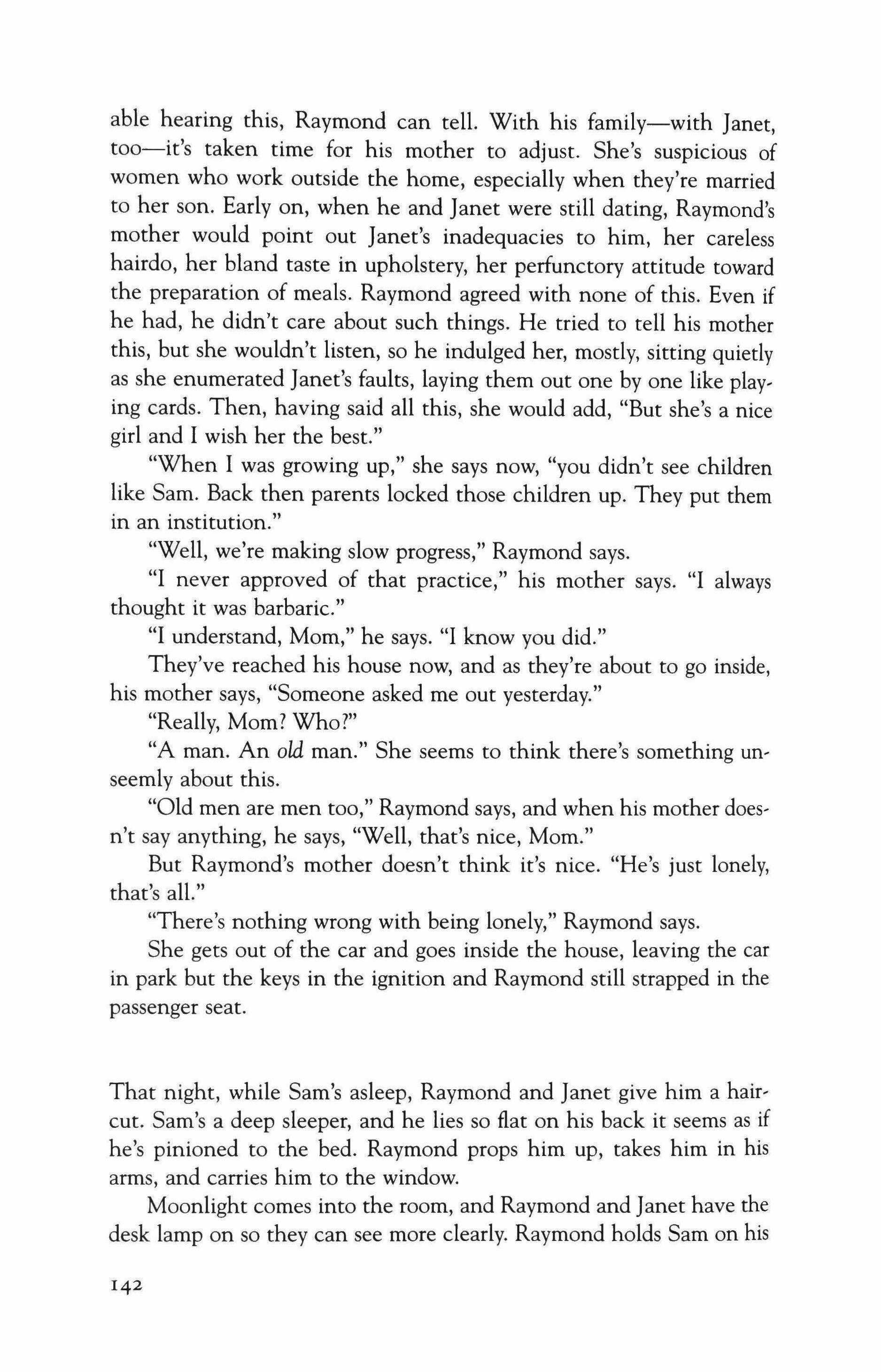
able hearing this, Raymond can tell. With his family-with Janet, too-it's taken time for his mother to adjust. She's suspicious of women who work outside the home, especially when they're married to her son. Early on, when he and Janet were still dating, Raymond's mother would point out Janet's inadequacies to him, her careless hairdo, her bland taste in upholstery, her perfunctory attitude toward the preparation of meals. Raymond agreed with none of this. Even if he had, he didn't care about such things. He tried to tell his mother this, but she wouldn't listen, so he indulged her, mostly, sitting quietly as she enumerated Janet's faults, laying them out one by one like playing cards. Then, having said all this, she would add, "But she's a nice girl and I wish her the best."
"When I was growing up," she says now, "you didn't see children like Sam. Back then parents locked those children up. They put them in an institution."
"Well, we're making slow progress," Raymond says.
"I never approved of that practice," his mother says. "I always thought it was barbaric."
"I understand, Mom," he says. "I know you did."
They've reached his house now, and as they're about to go inside, his mother says, "Someone asked me out yesterday."
"Really, Mom? Who?"
"A man. An old man." She seems to think there's something unseemly about this.
"Old men are men too," Raymond says, and when his mother doesn't say anything, he says, "Well, that's nice, Mom."
But Raymond's mother doesn't think it's nice. "He's just lonely, that's all."
"There's nothing wrong with being lonely," Raymond says. She gets out of the car and goes inside the house, leaving the car in park but the keys in the ignition and Raymond still strapped in the passenger seat.
That night, while Sam's asleep, Raymond and Janet give him a haircut. Sam's a deep sleeper, and he lies so flat on his back it seems as if he's pinioned to the bed. Raymond props him up, takes him in his arms, and carries him to the window.
Moonlight comes into the room, and Raymond and Janet have the desk lamp on so they can see more clearly. Raymond holds Sam on his
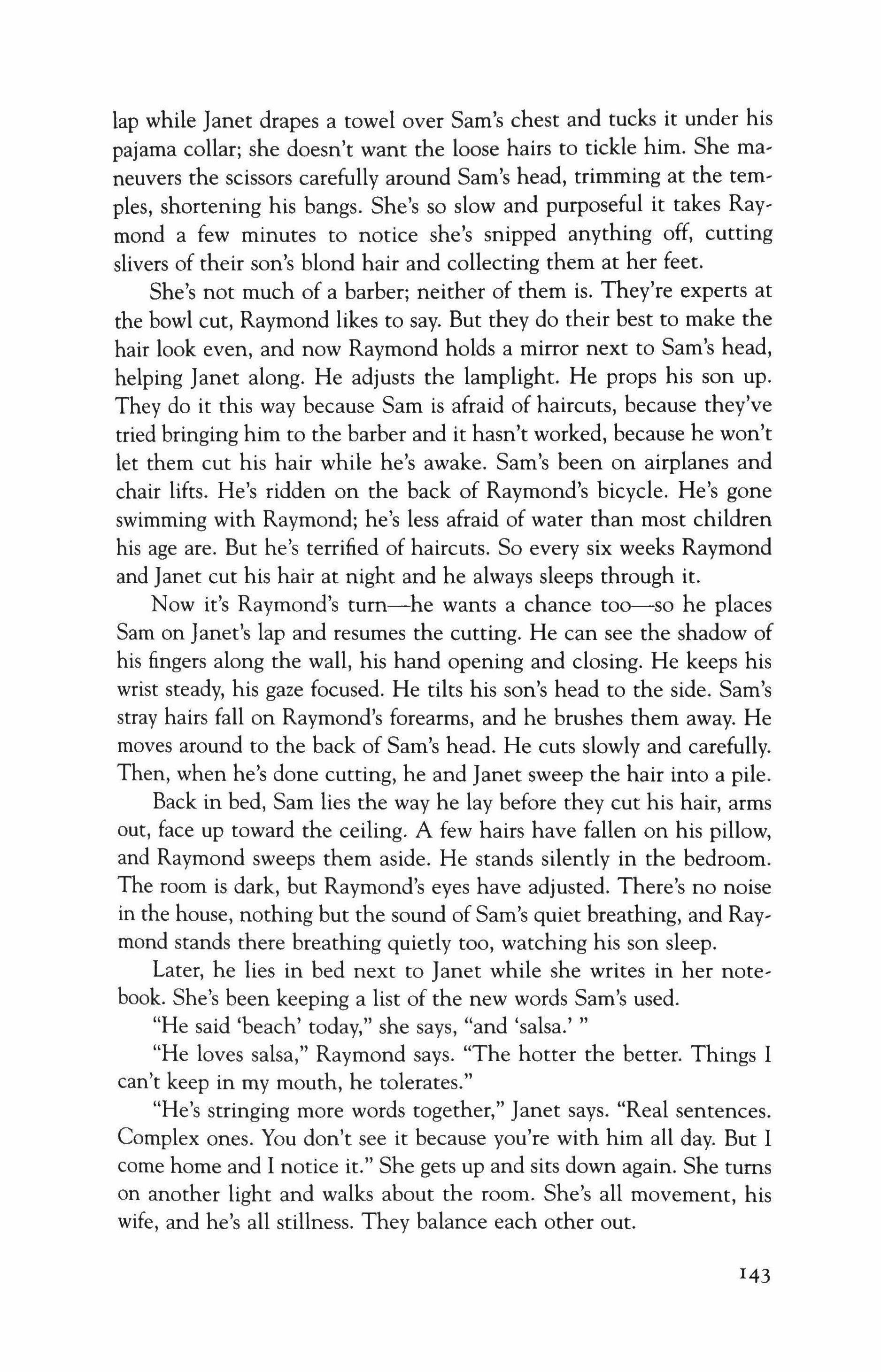
lap while Janet drapes a towel over Sam's chest and tucks it under his pajama collar; she doesn't want the loose hairs to tickle him. She maneuvers the scissors carefully around Sam's head, trimming at the ternples, shortening his bangs. She's so slow and purposeful it takes Ray, mond a few minutes to notice she's snipped anything off, cutting slivers of their son's blond hair and collecting them at her feet.
She's not much of a barber; neither of them is. They're experts at the bowl cut, Raymond likes to say. But they do their best to make the hair look even, and now Raymond holds a mirror next to Sam's head, helping Janet along. He adjusts the lamplight. He props his son up. They do it this way because Sam is afraid of haircuts, because they've tried bringing him to the barber and it hasn't worked, because he won't let them cut his hair while he's awake. Sam's been on airplanes and chair lifts. He's ridden on the back of Raymond's bicycle. He's gone swimming with Raymond; he's less afraid of water than most children his age are. But he's terrified of haircuts. So every six weeks Raymond and Janet cut his hair at night and he always sleeps through it.
Now it's Raymond's tum-he wants a chance too-so he places Sam on Janet's lap and resumes the cutting. He can see the shadow of his fingers along the wall, his hand opening and closing. He keeps his wrist steady, his gaze focused. He tilts his son's head to the side. Sam's stray hairs fall on Raymond's forearms, and he brushes them away. He moves around to the back of Sam's head. He cuts slowly and carefully. Then, when he's done cutting, he and Janet sweep the hair into a pile.
Back in bed, Sam lies the way he lay before they cut his hair, arms out, face up toward the ceiling. A few hairs have fallen on his pillow, and Raymond sweeps them aside. He stands silently in the bedroom. The room is dark, but Raymond's eyes have adjusted. There's no noise in the house, nothing but the sound of Sam's quiet breathing, and Ray, mond stands there breathing quietly too, watching his son sleep.
Later, he lies in bed next to Janet while she writes in her note, book. She's been keeping a list of the new words Sam's used.
"He said 'beach' today," she says, "and 'salsa.'
"He loves salsa," Raymond says. "The hotter the better. Things I can't keep in my mouth, he tolerates."
"He's stringing more words together," Janet says. "Real sentences. Complex ones. You don't see it because you're with him all day. But I come home and I notice it." She gets up and sits down again. She turns on another light and walks about the room. She's all movement, his wife, and he's all stillness. They balance each other out.
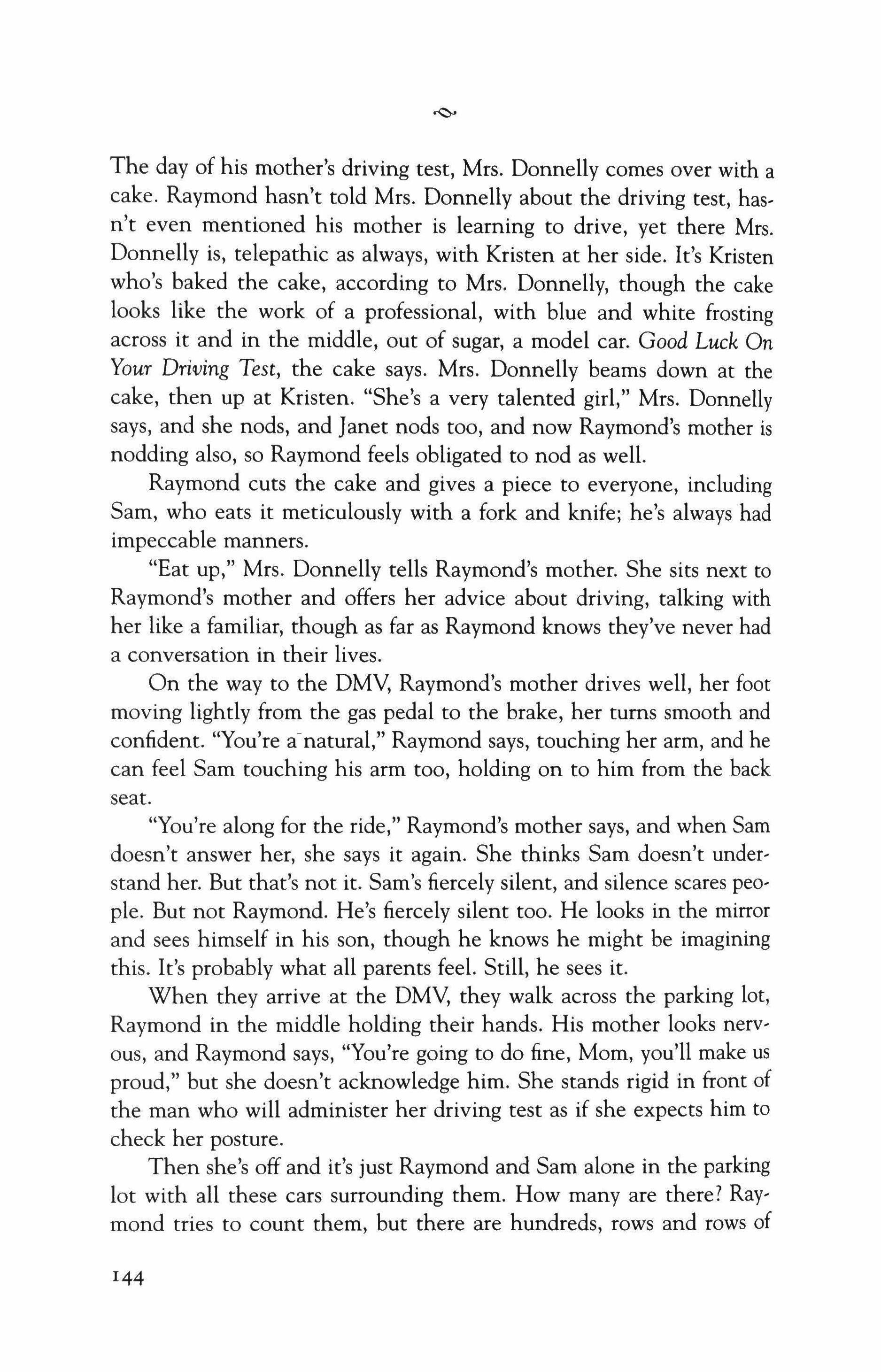
The day of his mother's driving test, Mrs. Donnelly comes over with a cake. Raymond hasn't told Mrs. Donnelly about the driving test, hasn't even mentioned his mother is learning to drive, yet there Mrs. Donnelly is, telepathic as always, with Kristen at her side. It's Kristen who's baked the cake, according to Mrs. Donnelly, though the cake looks like the work of a professional, with blue and white frosting across it and in the middle, out of sugar, a model car. Good Luck On Your Driving Test, the cake says. Mrs. Donnelly beams down at the cake, then up at Kristen. "She's a very talented girl," Mrs. Donnelly says, and she nods, and Janet nods too, and now Raymond's mother is nodding also, so Raymond feels obligated to nod as well.
Raymond cuts the cake and gives a piece to everyone, including Sam, who eats it meticulously with a fork and knife; he's always had impeccable manners.
"Eat up," Mrs. Donnelly tells Raymond's mother. She sits next to Raymond's mother and offers her advice about driving, talking with her like a familiar, though as far as Raymond knows they've never had a conversation in their lives.
On the way to the DMY, Raymond's mother drives well, her foot moving lightly from the gas pedal to the brake, her turns smooth and confident. "You're a-natural," Raymond says, touching her arm, and he can feel Sam touching his arm too, holding on to him from the back seat.
"You're along for the ride," Raymond's mother says, and when Sam doesn't answer her, she says it again. She thinks Sam doesn't understand her. But that's not it. Sam's fiercely silent, and silence scares people. But not Raymond. He's fiercely silent too. He looks in the mirror and sees himself in his son, though he knows he might be imagining this. It's probably what all parents feel. Still, he sees it.
When they arrive at the DMY, they walk across the parking lot, Raymond in the middle holding their hands. His mother looks nervous, and Raymond says, "You're going to do fine, Mom, you'll make us proud," but she doesn't acknowledge him. She stands rigid in front of the man who will administer her driving test as if she expects him to check her posture.
Then she's off and it's just Raymond and Sam alone in the parking lot with all these cars surrounding them. How many are there? Raymond tries to count them, but there are hundreds, rows and rows of

cars lined up like gift boxes. Raymond feels as if he's in a miniature city, though everything is life-size. They could be anywhere, he thinks, at the supermarket, a movie theater, any mall off any highway, any' where in the country, really, but here is where they are, in the terrible heat, waiting for his mother to take her driving test. He removes a baseball cap from his knapsack and puts it on Sam's head.
Sam shakes it off.
"Aren't you hot?"
"No," says Sam.
Raymond puts the hat back in his bag.
"I drive," Sam says.
"Now?"
"When I'm big."
"That sounds good," Raymond says, though he knows this won't happen, so he tells Sam about New York City, where no one drives and everyone takes taxis, where the people are so important they don't need to drive; someone else will do it for them. And when Sam asks Raymond where New York City is, Raymond says it's far but not as far as the moon because that's Sam's reference point. Raymond takes a piece of paper from his knapsack and draws the New York City skyline, doing his best to remember it from the movies; then he sketches a path to Boston. "You were born in Boston," he says, "but you're too young to remember that." They have a long discussion about distances, about the continents and oceans and constellations, about mileage and light years; or rather Raymond has the discussion and Sam listens even though he doesn't really understand. Sam loves to listen to Raymond talk. "Talk," Sam says now, so Raymond does. He tells Sam about Boston and what life was like for him when he was a boy, and Sam smiles and nods at him.
"I drive now," says Sam, and he goes over to a parked car and knocks on the door.
"It's locked," Raymond says. But up the row from it is a convertible with its hood down and its doors unlocked. Sam looks dolefully up at Raymond, and it occurs to Raymond how often he has to say no to his son, how all Sam's life people will be saying no to him. Raymond real, izes he shouldn't do this, but he lifts Sam over the top of the open hood and places him in the driver's seat.
"Buckle up," Raymond says, and he helps Sam put on his seatbelt. Then he walks around the car, opens the passenger door, and gets in himself. He takes out his house keys and gives them to Sam, letting

him fiddle with the ignition. "Put your hands on the steering wheel," Raymond says, and Sam moves the wheel from side to side, as much as his strength will allow him to. "Where are you driving us?" Raymond asks, and Sam says, "New York City." Only Sam wants Raymond to drive as well, wants them to drive together, so Raymond places his hands on top of Sam's and together they move the wheel back and forth. And as they do, Raymond tells Sam where they're going, names the States they pass as they drive north and then east, the big States and small ones, the great landmarks of the country, and Raymond reminds Sam to keep his eyes on the road because what Sam is doing is looking up at him as they maneuver the wheel, listening to the stories his father tells, nodding, nodding.
Then Raymond sees his mother walking toward them. Her stride is so purposeful, her gaze so direct, she seems not to notice he's in a stranger's car.
"I failed," she says. She sounds almost defiant.
"Oh, Mom
She's leaning against the convertible, and she tells it all to him, every turn she made, every decision, how she went hand-over-hand, how she never veered from her lane and drove well in reverse and did everything exactly as he'd taught her.
"So what happened?"
"I forgot to shift out of park when I started the test."
"That's it?"
"Disqualified," she says.
"Disqualified?"
"So tell me," she says, and she's angry now, "if I'm disqualified at the beginning, why did he make me finish the test?"
"I don't know," Raymond says, and he doesn't. It seems terribly cruel to him. He's angry too now. He wants to find the examiner and tell him what he thinks. Instead, he reminds his mother she can take the test again. She drove perfectly this time. Next time she'll remember to shift out of park.
"There won't be a next time," his mother says.
"Why not?"
"I'm going back home."
"Home?" he says.
"To Boston. I hate it here."
"Oh, Mom."
She's glaring at him, and now, as Raymond tries to appease her,
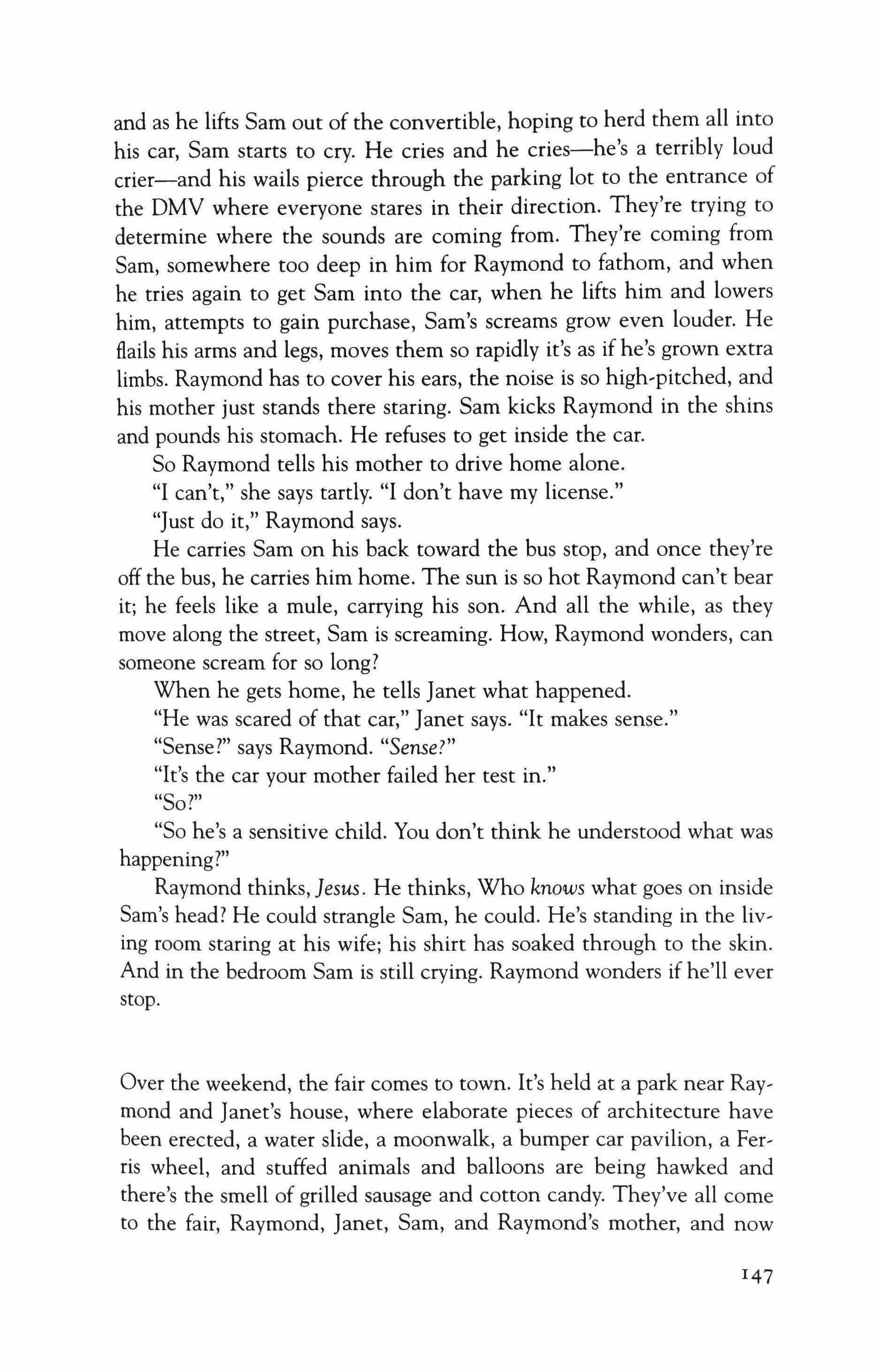
and as he lifts Sam out of the convertible, hoping to herd them all into his car, Sam starts to cry. He cries and he cries-he's a terribly loud crier-and his wails pierce through the parking lot to the entrance of the DMV where everyone stares in their direction. They're trying to determine where the sounds are coming from. They're coming from Sam, somewhere too deep in him for Raymond to fathom, and when he tries again to get Sam into the car, when he lifts him and lowers him, attempts to gain purchase, Sam's screams grow even louder. He flails his arms and legs, moves them so rapidly it's as if he's grown extra limbs. Raymond has to cover his ears, the noise is so high-pitched, and his mother just stands there staring. Sam kicks Raymond in the shins and pounds his stomach. He refuses to get inside the car.
So Raymond tells his mother to drive home alone.
"I can't," she says tartly. "I don't have my license."
"Just do it," Raymond says.
He carries Sam on his back toward the bus stop, and once they're off the bus, he carries him home. The sun is so hot Raymond can't bear it; he feels like a mule, carrying his son. And all the while, as they move along the street, Sam is screaming. How, Raymond wonders, can someone scream for so long?
When he gets home, he tells Janet what happened.
"He was scared of that car," Janet says. "It makes sense."
"Sense?" says Raymond. "Sense?"
"It's the car your mother failed her test in."
"So?"
"So he's a sensitive child. You don't think he understood what was happening?"
Raymond thinks, Jesus. He thinks, Who knows what goes on inside Sam's head? He could strangle Sam, he could. He's standing in the living room staring at his wife; his shirt has soaked through to the skin. And in the bedroom Sam is still crying. Raymond wonders if he'll ever stop.
Over the weekend, the fair comes to town. It's held at a park near Ray, mond and Janet's house, where elaborate pieces of architecture have been erected, a water slide, a moonwalk, a bumper car pavilion, a Fer, ris wheel, and stuffed animals and balloons are being hawked and there's the smell of grilled sausage and cotton candy. They've all come to the fair, Raymond, Janet, Sam, and Raymond's mother, and now

Sam and Janet go to the concessions stand, leaving Raymond and his mother alone.
"You know who you remind me of?" Raymond says.
"Who?" says his mother.
"George Bush, Senior."
"Yes," she says, as if that's exactly what she expected him to say. Nothing ever surprises her, she'd have you believe.
And she does remind Raymond of George Bush. He's thinking of how, when George Bush left office, he went to the supermarket for the first time and had no idea what the electric scanners were. That's his mother, Raymond thinks. Every day now, she's George Bush.
"I met him once," she says.
"George Bush!" says Raymond, though he knows she met him. She's told him the story many times.
"President Bush," his mother says, and Raymond remembers how his father used to insist they call the President by his proper name. President Eisenhower. President Nixon. Even President Carter. Once a President always a President. Raymond's father wanted Raymond to remember that. And now, apparently, Raymond's mother wants him to also.
"I met them all," she says.
Raymond nods.
"We were an important family. People wanted to shake Dad's hand. They wanted to shake my hand too."
"Yes," he says. In the distance, he can see children descending the water slide, going down on their backs in pools of foam. An infant starts to cry. Voices echo from inside the moonwalk.
"President Kennedy kissed you when you were a baby," his mother says.
"I know," says Raymond.
"We may not have liked him, but he was our President."
Again he nods.
"I met all the Kennedy brothers," his mother says. "From the President on down. They were Boston boys. They all were."
"Well, yes," he says. "They grew up together."
"God knows what Dad would think if he saw me now." She stares straight ahead of her, unblinking. It seems to Raymond she's about to cry. And now Janet and Sam have come back from the concessions stand, and Raymond sees a crowd form ahead. Mickey Mouse has arrived and he's shaking children's hands. A man in a sombrero is selling
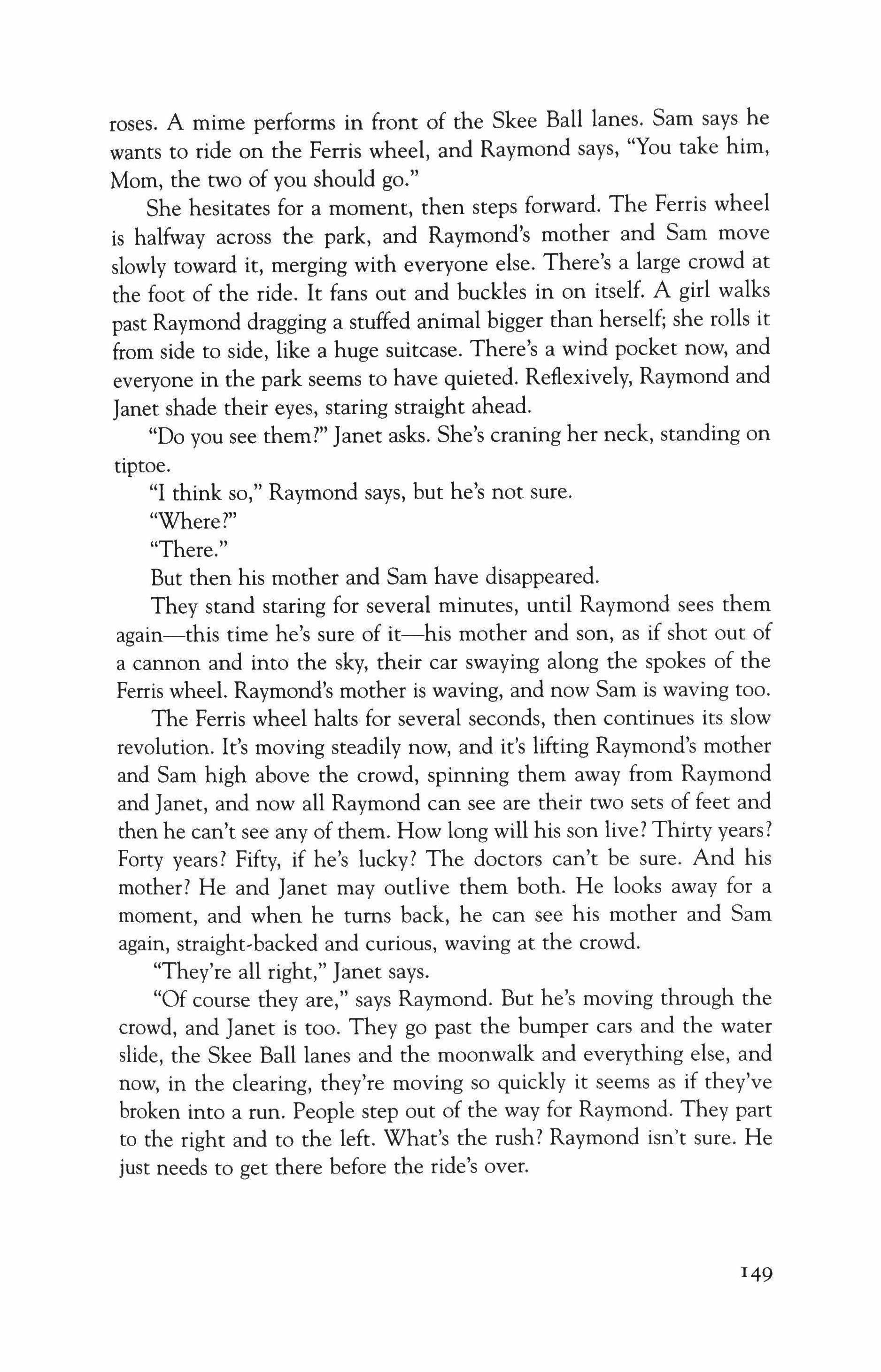
roses. A mime performs in front of the Skee Ball lanes. Sam says he wants to ride on the Ferris wheel, and Raymond says, "You take him, Mom, the two of you should go."
She hesitates for a moment, then steps forward. The Ferris wheel is halfway across the park, and Raymond's mother and Sam move slowly toward it, merging with everyone else. There's a large crowd at the foot of the ride. It fans out and buckles in on itself. A girl walks past Raymond dragging a stuffed animal bigger than herself; she rolls it from side to side, like a huge suitcase. There's a wind pocket now, and everyone in the park seems to have quieted. Reflexively, Raymond and Janet shade their eyes, staring straight ahead.
"Do you see them?" Janet asks. She's craning her neck, standing on tiptoe.
"I think so," Raymond says, but he's not sure.
"Where?"
"There."
But then his mother and Sam have disappeared. They stand staring for several minutes, until Raymond sees them again-this time he's sure of it-his mother and son, as if shot out of a cannon and into the sky, their car swaying along the spokes of the Ferris wheel. Raymond's mother is waving, and now Sam is waving too.
The Ferris wheel halts for several seconds, then continues its slow revolution. It's moving steadily now, and it's lifting Raymond's mother and Sam high above the crowd, spinning them away from Raymond and Janet, and now all Raymond can see are their two sets of feet and then he can't see any of them. How long will his son live? Thirty years?
Forty years? Fifty, if he's lucky? The doctors can't be sure. And his mother? He and Janet may outlive them both. He looks away for a moment, and when he turns back, he can see his mother and Sam again, straight-backed and curious, waving at the crowd.
"They're all right," Janet says.
"Of course they are," says Raymond. But he's moving through the crowd, and Janet is too. They go past the bumper cars and the water slide, the Skee Ball lanes and the moonwalk and everything else, and now, in the clearing, they're moving so quickly it seems as if they've broken into a run. People step out of the way for Raymond. They part to the right and to the left. What's the rush? Raymond isn't sure. He just needs to get there before the ride's over.
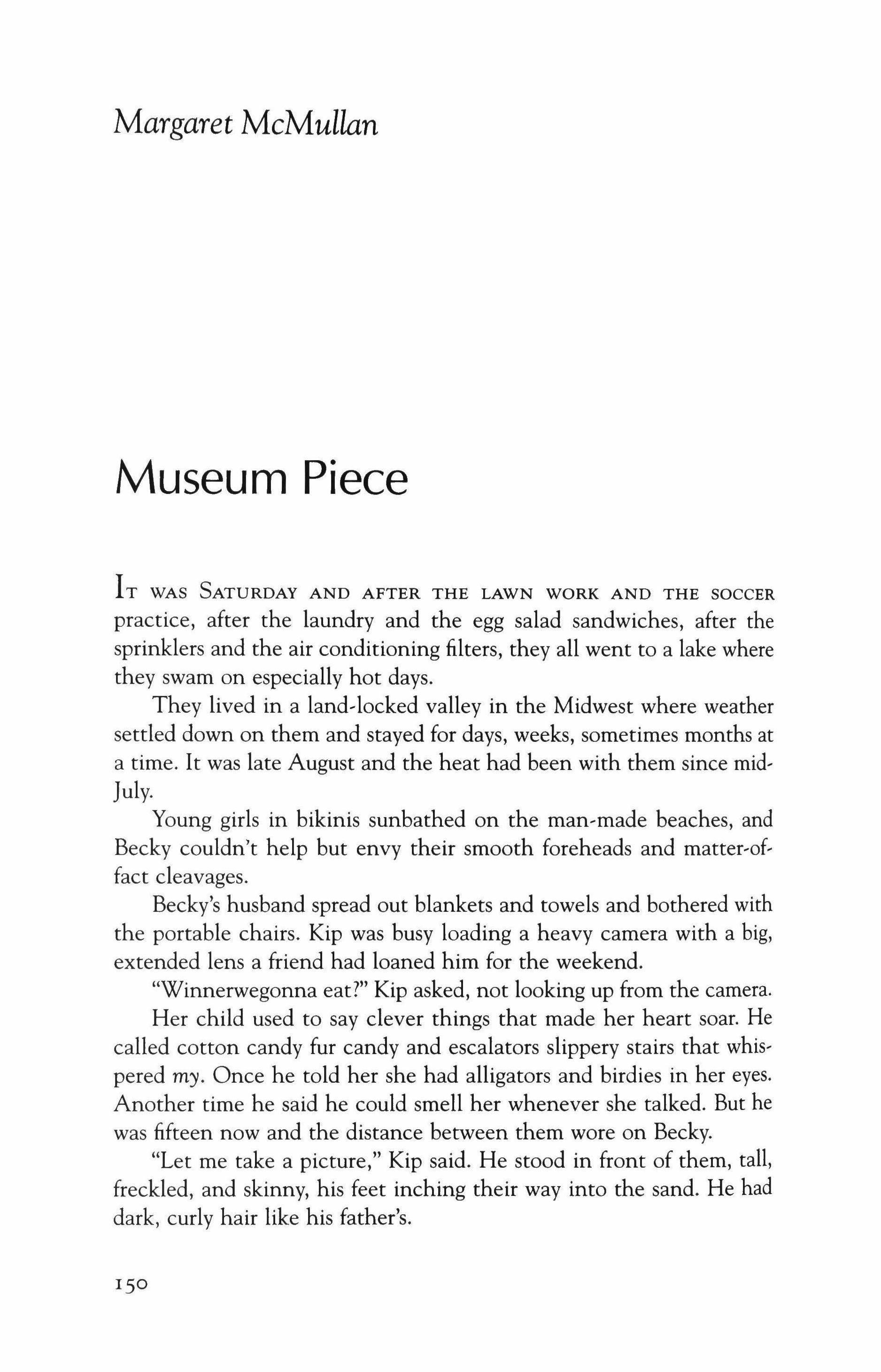
IT WAS SATURDAY AND AFTER THE LAWN WORK AND THE SOCCER practice, after the laundry and the egg salad sandwiches, after the sprinklers and the air conditioning filters, they all went to a lake where they swam on especially hot days.
They lived in a land-locked valley in the Midwest where weather settled down on them and stayed for days, weeks, sometimes months at a time. It was late August and the heat had been with them since midJuly.
Young girls in bikinis sunbathed on the man-made beaches, and Becky couldn't help but envy their smooth foreheads and matter-offact cleavages.
Becky's husband spread out blankets and towels and bothered with the portable chairs. Kip was busy loading a heavy camera with a big, extended lens a friend had loaned him for the weekend.
"Winnerwegonna eat?" Kip asked, not looking up from the camera. Her child used to say clever things that made her heart soar. He called cotton candy fur candy and escalators slippery stairs that whispered my. Once he told her she had alligators and birdies in her eyes. Another time he said he could smell her whenever she talked. But he was fifteen now and the distance between them wore on Becky.
"Let me take a picture," Kip said. He stood in front of them, tall, freckled, and skinny, his feet inching their way into the sand. He had dark, curly hair like his father's.

Becky complained about too much of her thighs showing, and her husband put his arm around her shoulders and said she had beautiful thighs. For a moment their heads touched.
"Say Hot salami."
"Hot salami," they both said, which of course made them laugh, and Kip took the picture.
Becky stood up and walked towards the lake.
It was a muddy lake with sharp rocks on the bottom. Becky wore a pair ofold tennis shoes, and step by step, the cool water crept up her legs.
She swam out and when she turned towards the beach, she waved, but Kip was taking a picture of her husband who had his face to the sun. After she had enough of the water, she felt with her feet until she got to mud, then rocks, and as she gradually made her way back up the beach, she thought how comic she must look-the girl sunbathers lined up, their smooth faces to the sun, their pretty eyes shut, and there she was, tall, aging, and dripping wet.
Her husband looked up from his magazine. "Nice?"
A boat passed and people on it waved.
"If I had drowned, I wonder how long it would have taken you two to notice I wasn't here." She was being cruel now, she knew. Her husband looked out over the water briefly, then went back to the paper.
"I'm going to New York next week," her husband said after a while, putting down his reading. "Why don't you come along and we can pick out something there for your birthday. We can stay with David."
On the day of the trip, Becky picked her husband up after work and they took the 5:26 flight to LaGuardia. Kip was staying the weekend at his best friend's house.
She wore gray straight,legged slacks and a black T-shirt. The silver buckles on her black suede loafers jingled with every step she made that brought her closer to the city. She was tired of the Midwest, tired of the chintz pillows, the beige food, and all the calm.
"Let me tell the both of you something. Right now." David greeted them on his stoop the minute they got out of the cab. "You've never looked better."
David was Becky's old college friend who had become an art dealer. He had once told Becky that she had an alarming beauty. They
were all talking at once, hugging, and fitting their luggage through the doors, down the narrow hallways, into the tiny elevator, through the doorway and into David's apartment.
Becky liked looking at David. He was tall and thin and boyish somehow even in his middle age, showing them around in a fun, theatrical way. Becky had always liked David's act-it made her feel more intimate with him. He made her feel as though they were best friends all over again and not like they saw each other only once every two or three years.
She admired all the brown and black furniture, the tan walls, the black trim, the stainless steel bathroom fixtures, the Italian ashtrays, the wink of martini glasses from the glass shelves in the living room, the small, efficient folding tables all on wheels-everything so moveable and bendable-the neat fruit arranged on a tray, not a basket or a bowl, the shelves of art books and the tables made from art books. Becky didn't have to look at her husband to see if all this registered. She knew it didn't.
"And here I thought you'd have both gone to fat by now," David said, settling down on the sofa.
They indulged themselves in good-natured jokes about the Midwest. There was some conversation about the trip and the weather. Becky's husband crossed his legs and told David to get Becky a painting for her birthday. Then he set a price limit.
"Two thousand," David repeated. "O.K. We can get a nice little something for that."
"Little?" Becky's husband uncrossed his legs.
"Two thousand dollars doesn't get you much in this town, but we'll " see.
"It's just something I want," Becky said as if it was out ofher control. David turned to her husband, and arching his eyebrow said, "Every woman should have what she wants."
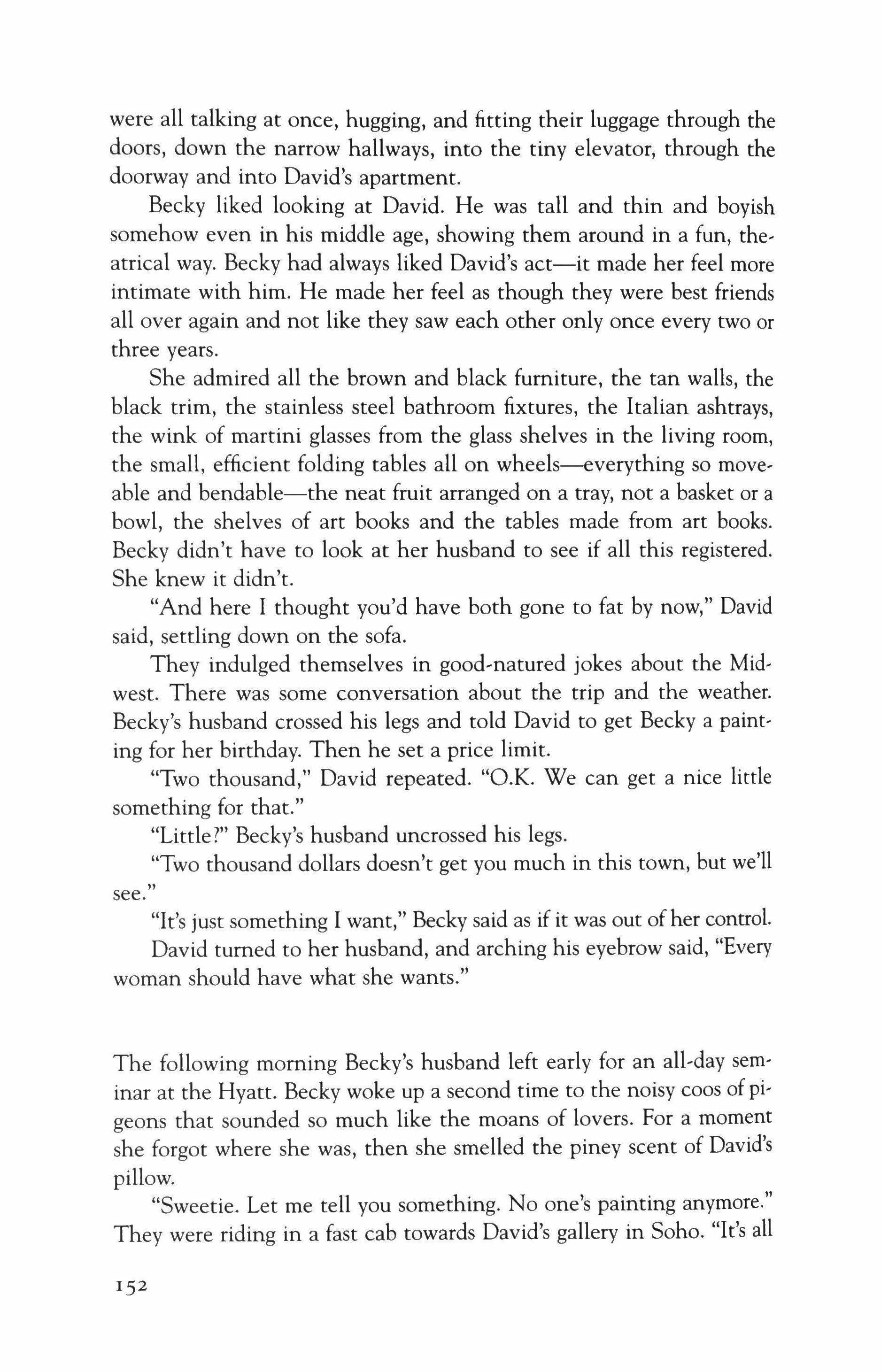
The following morning Becky's husband left early for an all-day seminar at the Hyatt. Becky woke up a second time to the noisy coos of pigeons that sounded so much like the moans of lovers. For a moment she forgot where she was, then she smelled the piney scent of David's pillow.
"Sweetie. Let me tell you something. No one's painting anymore." They were riding in a fast cab towards David's gallery in Soho. "It's all
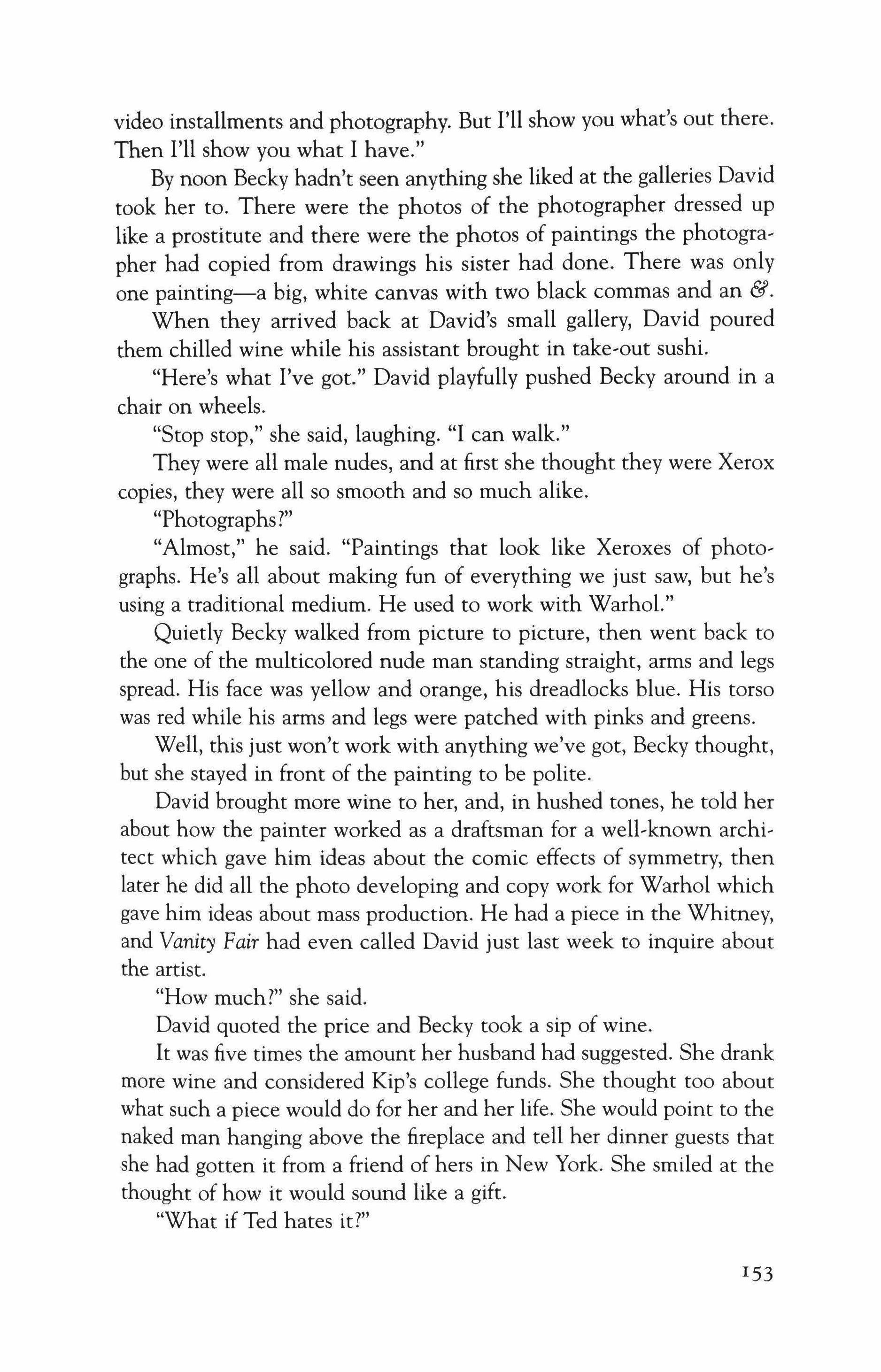
video installments and photography. But I'll show you what's out there. Then I'll show you what I have."
By noon Becky hadn't seen anything she liked at the galleries David took her to. There were the photos of the photographer dressed up like a prostitute and there were the photos of paintings the photographer had copied from drawings his sister had done. There was only one painting-a big, white canvas with two black commas and an &.
When they arrived back at David's small gallery, David poured them chilled wine while his assistant brought in take-out sushi.
"Here's what I've got." David playfully pushed Becky around in a chair on wheels.
"Stop stop," she said, laughing. "I can walk."
They were all male nudes, and at first she thought they were Xerox copies, they were all so smooth and so much alike.
"Photographs?"
"Almost," he said. "Paintings that look like Xeroxes of photographs. He's all about making fun of everything we just saw, but he's using a traditional medium. He used to work with Warhol."
Quietly Becky walked from picture to picture, then went back to the one of the multicolored nude man standing straight, arms and legs spread. His face was yellow and orange, his dreadlocks blue. His torso was red while his arms and legs were patched with pinks and greens.
Well, this just won't work with anything we've got, Becky thought, but she stayed in front of the painting to be polite.
David brought more wine to her, and, in hushed tones, he told her about how the painter worked as a draftsman for a well-known architeet which gave him ideas about the comic effects of symmetry, then later he did all the photo developing and copy work for Warhol which gave him ideas about mass production. He had a piece in the Whitney, and Vanity Fair had even called David just last week to inquire about the artist.
"How much?" she said.
David quoted the price and Becky took a sip of wine.
It was five times the amount her husband had suggested. She drank more wine and considered Kip's college funds. She thought too about what such a piece would do for her and her life. She would point to the naked man hanging above the fireplace and tell her dinner guests that she had gotten it from a friend of hers in New York. She smiled at the thought of how it would sound like a gift.
"What if Ted hates it?"
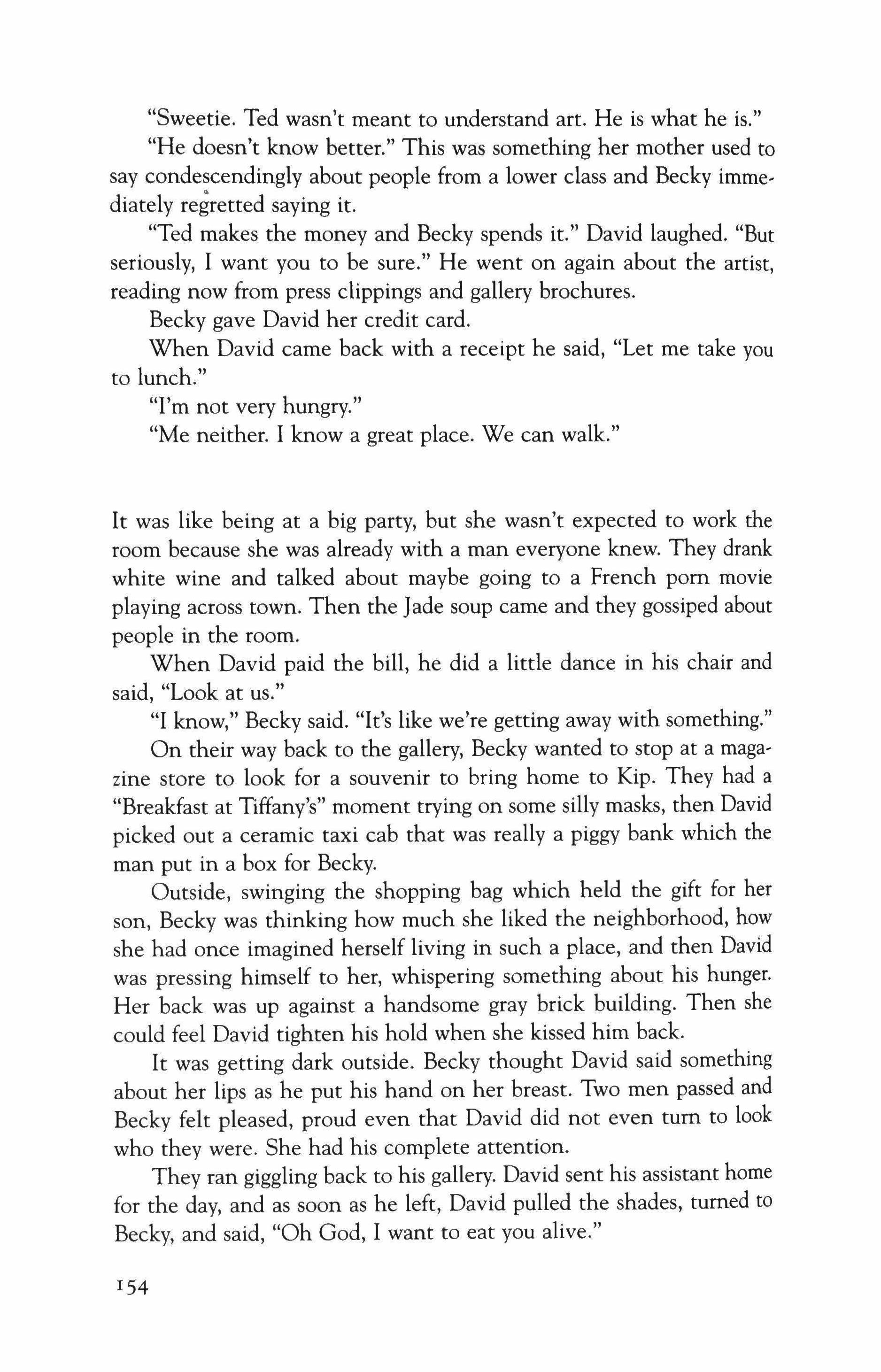
"Sweetie. Ted wasn't meant to understand art. He is what he is."
"He doesn't know better." This was something her mother used to say condescendingly about people from a lower class and Becky immediately regretted saying it.
"Ted makes the money and Becky spends it." David laughed. "But seriously, I want you to be sure." He went on again about the artist, reading now from press clippings and gallery brochures.
Becky gave David her credit card.
When David came back with a receipt he said, "Let me take you to lunch."
"I'm not very hungry."
"Me neither. I know a great place. We can walk."
It was like being at a big party, but she wasn't expected to work the room because she was already with a man everyone knew. They drank white wine and talked about maybe going to a French porn movie playing across town. Then the Jade soup came and they gossiped about people in the room.
When David paid the bill, he did a little dance in his chair and said, "Look at us."
"I know," Becky said. "It's like we're getting away with something."
On their way back to the gallery, Becky wanted to stop at a magazine store to look for a souvenir to bring home to Kip. They had a "Breakfast at Tiffany's" moment trying on some silly masks, then David picked out a ceramic taxi cab that was really a piggy bank which the man put in a box for Becky.
Outside, swinging the shopping bag which held the gift for her son, Becky was thinking how much she liked the neighborhood, how she had once imagined herself living in such a place, and then David was pressing himself to her, whispering something about his hunger. Her back was up against a handsome gray brick building. Then she could feel David tighten his hold when she kissed him back.
It was getting dark outside. Becky thought David said something about her lips as he put his hand on her breast. Two men passed and Becky felt pleased, proud even that David did not even tum to look who they were. She had his complete attention.
They ran giggling back to his gallery. David sent his assistant home for the day, and as soon as he left, David pulled the shades, turned to Becky, and said, "Oh God, I want to eat you alive."
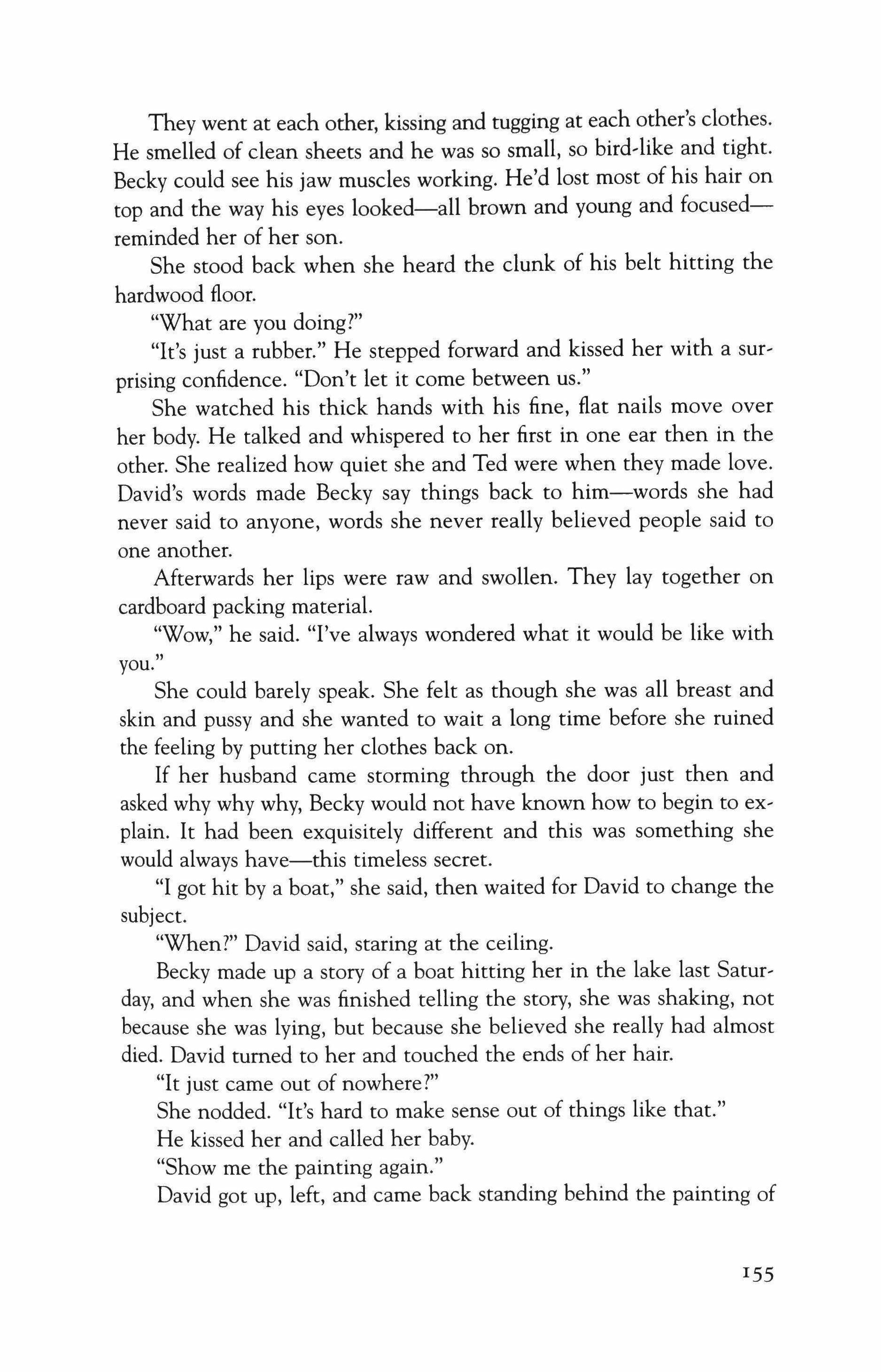
They went at each other, kissing and tugging at each other's clothes. He smelled of clean sheets and he was so small, so bird-like and tight. Becky could see his jaw muscles working. He'd lost most of his hair on top and the way his eyes looked-all brown and young and focusedreminded her of her son.
She stood back when she heard the clunk of his belt hitting the hardwood floor.
"What are you doing?"
"It's just a rubber." He stepped forward and kissed her with a sur' prising confidence. "Don't let it come between us."
She watched his thick hands with his fine, flat nails move over her body. He talked and whispered to her first in one ear then in the other. She realized how quiet she and Ted were when they made love. David's words made Becky say things back to him-words she had never said to anyone, words she never really believed people said to one another.
Afterwards her lips were raw and swollen. They lay together on cardboard packing material.
"Wow," he said. "I've always wondered what it would be like with you."
She could barely speak. She felt as though she was all breast and skin and pussy and she wanted to wait a long time before she ruined the feeling by putting her clothes back on.
If her husband came storming through the door just then and asked why why why, Becky would not have known how to begin to ex, plain. It had been exquisitely different and this was something she would always have-this timeless secret.
"I got hit by a boat," she said, then waited for David to change the subject.
"When?" David said, staring at the ceiling.
Becky made up a story of a boat hitting her in the lake last Saturday, and when she was finished telling the story, she was shaking, not because she was lying, but because she believed she really had almost died. David turned to her and touched the ends of her hair.
"It just came out of nowhere?"
She nodded. "It's hard to make sense out of things like that."
He kissed her and called her baby.
"Show me the painting again."
David got up, left, and came back standing behind the painting of
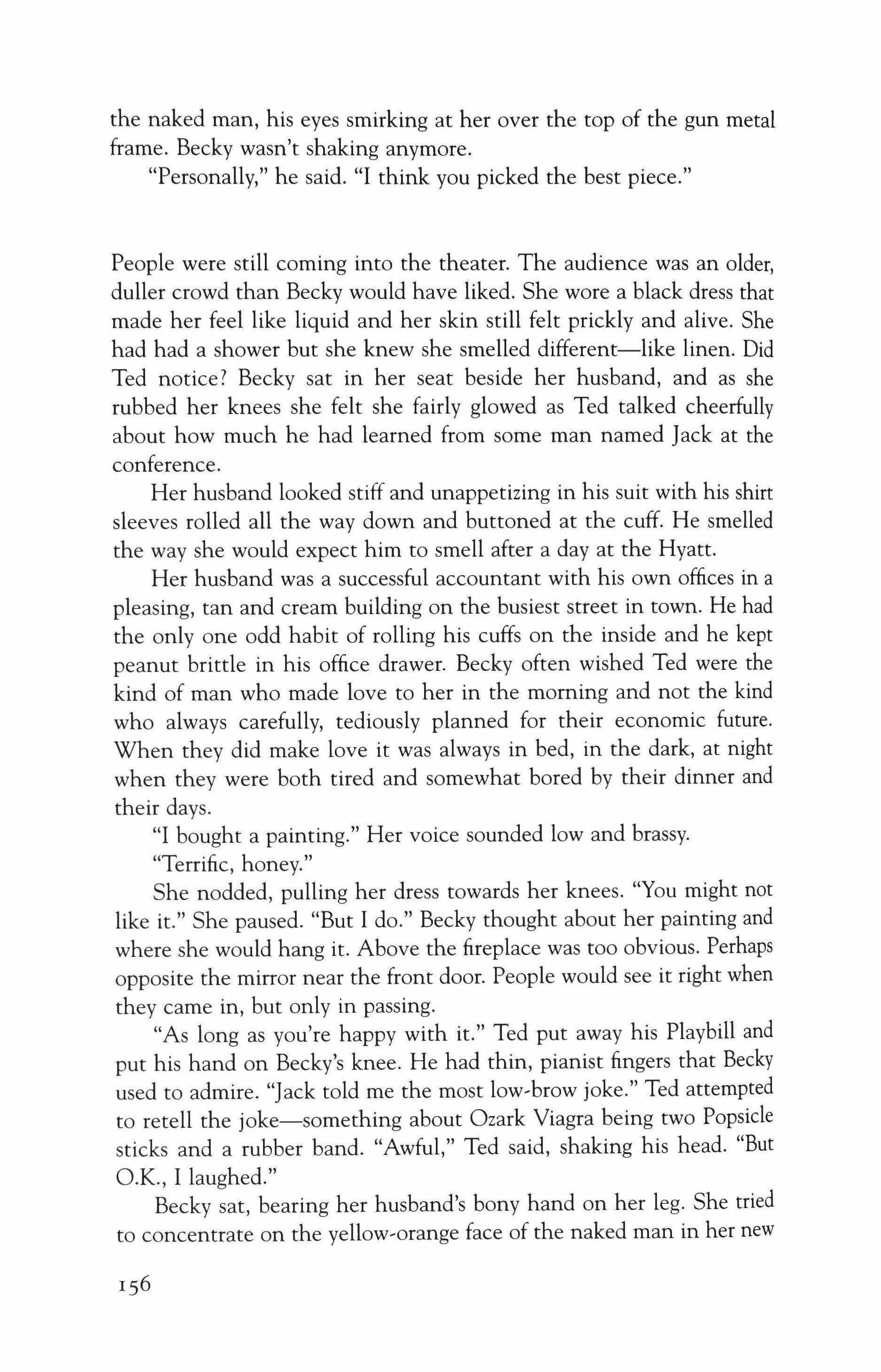
the naked man, his eyes smirking at her over the top of the gun metal frame. Becky wasn't shaking anymore.
"Personally," he said. "I think you picked the best piece."
People were still coming into the theater. The audience was an older, duller crowd than Becky would have liked. She wore a black dress that made her feel like liquid and her skin still felt prickly and alive. She had had a shower but she knew she smelled different-like linen. Did Ted notice? Becky sat in her seat beside her husband, and as she rubbed her knees she felt she fairly glowed as Ted talked cheerfully about how much he had learned from some man named Jack at the conference.
Her husband looked stiff and unappetizing in his suit with his shirt sleeves rolled all the way down and buttoned at the cuff. He smelled the way she would expect him to smell after a day at the Hyatt.
Her husband was a successful accountant with his own offices in a pleasing, tan and cream building on the busiest street in town. He had the only one odd habit of rolling his cuffs on the inside and he kept peanut brittle in his office drawer. Becky often wished Ted were the kind of man who made love to her in the morning and not the kind who always carefully, tediously planned for their economic future. When they did make love it was always in bed, in the dark, at night when they were both tired and somewhat bored by their dinner and their days.
"I bought a painting." Her voice sounded low and brassy.
"Terrific, honey."
She nodded, pulling her dress towards her knees. "You might not like it." She paused. "But I do." Becky thought about her painting and where she would hang it. Above the fireplace was too obvious. Perhaps opposite the mirror near the front door. People would see it right when they came in, but only in passing.
"As long as you're happy with it." Ted put away his Playbill and put his hand on Becky's knee. He had thin, pianist fingers that Becky used to admire. "Jack told me the most low-brow joke." Ted attempted to retell the joke-something about Ozark Viagra being two Popsicle sticks and a rubber band. "Awful," Ted said, shaking his head. "But O.K., I laughed."
Becky sat, bearing her husband's bony hand on her leg. She tried to concentrate on the yellow-orange face of the naked man in her new
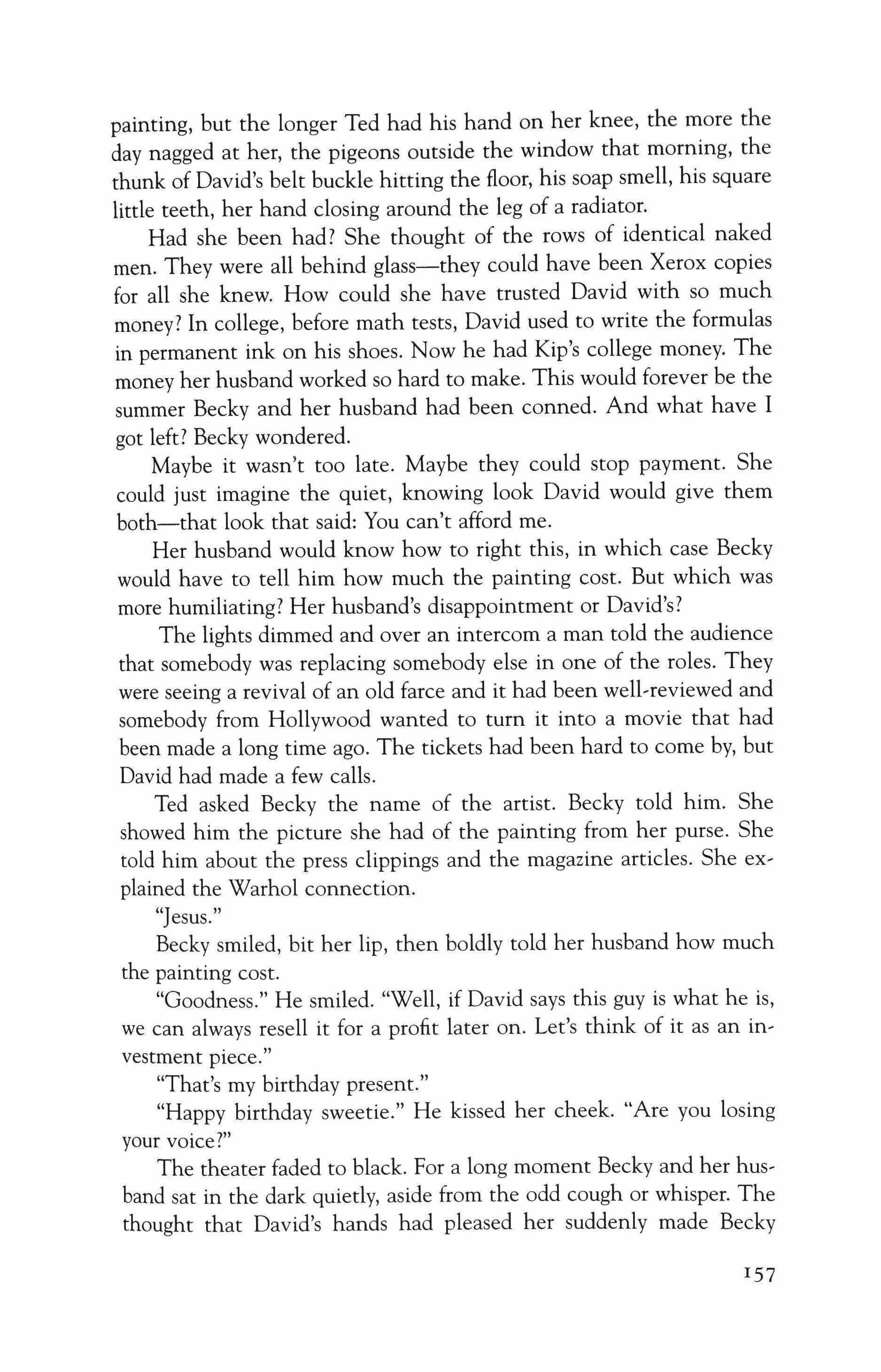
painting, but the longer Ted had his hand on her knee, the more the day nagged at her, the pigeons outside the window that morning, the thunk of David's belt buckle hitting the floor, his soap smell, his square little teeth, her hand closing around the leg of a radiator.
Had she been had? She thought of the rows of identical naked men. They were all behind glass-they could have been Xerox copies for all she knew. How could she have trusted David with so much money? In college, before math tests, David used to write the formulas in permanent ink on his shoes. Now he had Kip's college money. The money her husband worked so hard to make. This would forever be the summer Becky and her husband had been conned. And what have I got left? Becky wondered.
Maybe it wasn't too late. Maybe they could stop payment. She could just imagine the quiet, knowing look David would give them both-that look that said: You can't afford me.
Her husband would know how to right this, in which case Becky would have to tell him how much the painting cost. But which was more humiliating? Her husband's disappointment or David's?
The lights dimmed and over an intercom a man told the audience that somebody was replacing somebody else in one of the roles. They were seeing a revival of an old farce and it had been well-reviewed and somebody from Hollywood wanted to turn it into a movie that had been made a long time ago. The tickets had been hard to come by, but David had made a few calls.
Ted asked Becky the name of the artist. Becky told him. She showed him the picture she had of the painting from her purse. She told him about the press clippings and the magazine articles. She explained the Warhol connection.
"Jesus."
Becky smiled, bit her lip, then boldly told her husband how much the painting cost.
"Goodness." He smiled. "Well, if David says this guy is what he is, we can always resell it for a profit later on. Let's think of it as an investment piece."
"That's my birthday present."
"Happy birthday sweetie." He kissed her cheek. "Are you losing your voice?"
The theater faded to black. For a long moment Becky and her husband sat in the dark quietly, aside from the odd cough or whisper. The thought that David's hands had pleased her suddenly made Becky

shiver now. What if he had AIDS? From now on, each time she looked at the painting-their "investment piece"-she would see David's eyes peering over the top, the way they had when he had held the piece up for her to see.
The lights went to bright white on stage and an actress said something mildly provocative. Everyone laughed.
"This is wild," Ted whispered, obviously pleased. "We'll have to thank David in a big way. Send him something for Christmas too."
Becky wished her husband had booked an earlier flight. It was the day of her birthday which embarrassed her, but neither Ted nor David seemed to remember which annoyed her. The three of them spent the morning in David's apartment, eating the bagels David brought in. Ted spent hours drinking coffee and explaining the new tax laws to David while Becky busied herself with packing. She was starving and she ate three bagels in a row sitting on top of her suitcase, alone in David's bedroom.
When the taxi arrived, Becky was slow to get in. She looked into David's eyes for the first time since they had been together.
"Come back soon," he said. He kissed her on both cheeks, his lips lingering for a beat longer on her right cheek.
"It's a good painting," she said, but it came out more like a question.
"You got the best," Ted said. "I'll send it along with the papers. Who knows, maybe I'll be calling you to buy it back."
"What did I tell you?" Ted said. He surprised everybody and hugged David goodbye.
As they settled into their seats on the plane, Becky's husband gave her a gift-wrapped box. "It's not from me. It's from Kip. He made me promise to give it to you the day of your birthday."
Ted was smiling as Becky opened the present.
This was not the picture Becky had expected from that day. She barely recognized herself-a lean, smiling woman with black hair that suited her features. Her husband looked happy and handsome, his kind eyes creased at the comers. Both of them had never looked better. Kip had taken care to mat the photo and he had framed it in a small black, wooden frame.
Becky grew quiet as she remembered that bright, hot Saturday af-
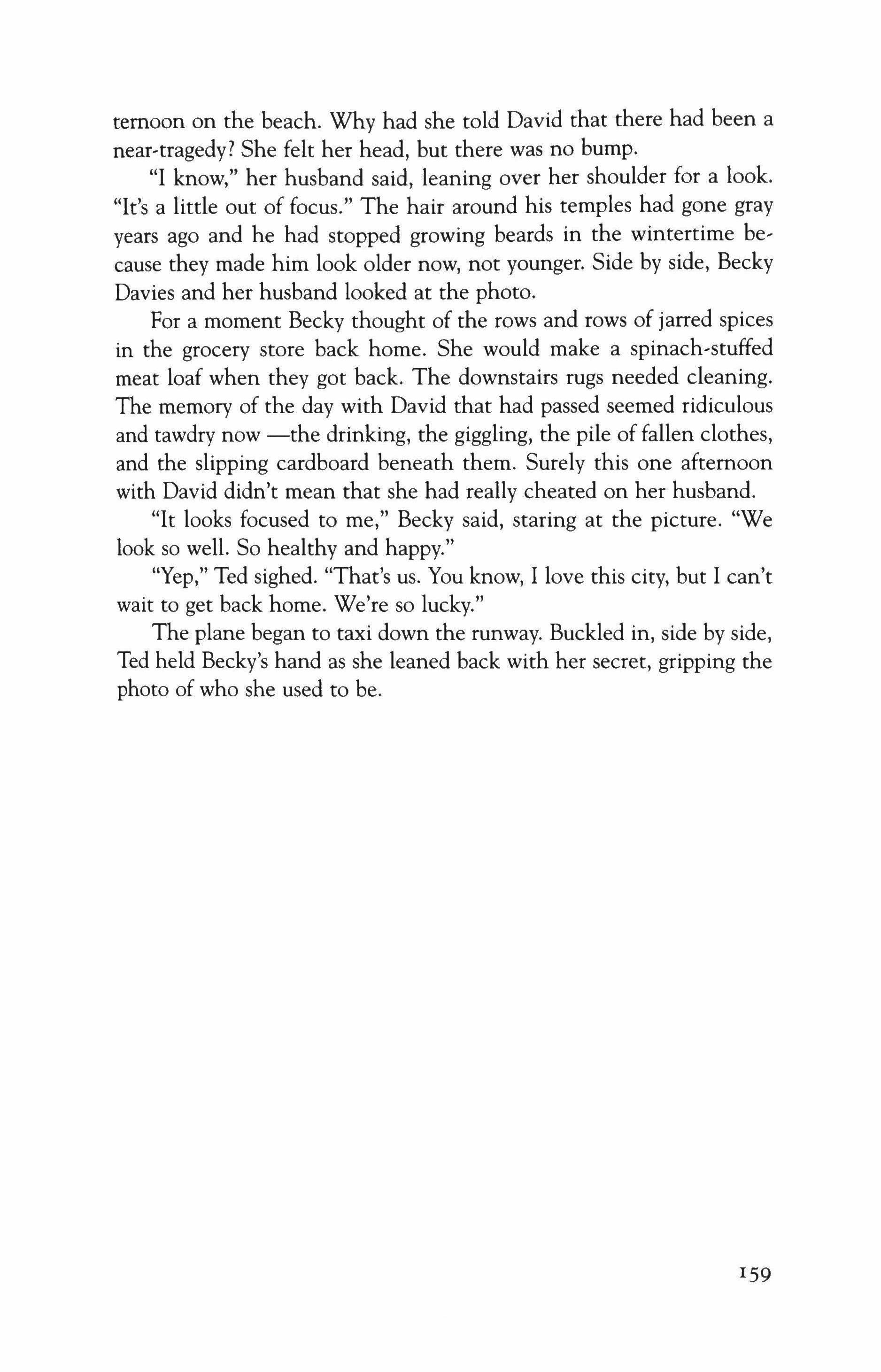
ternoon on the beach. Why had she told David that there had been a near-tragedy? She felt her head, but there was no bump.
"I know," her husband said, leaning over her shoulder for a look. "It's a little out of focus." The hair around his temples had gone gray years ago and he had stopped growing beards in the wintertime because they made him look older now, not younger. Side by side, Becky Davies and her husband looked at the photo.
For a moment Becky thought of the rows and rows of jarred spices in the grocery store back horne. She would make a spinach-stuffed meat loaf when they got back. The downstairs rugs needed cleaning. The memory of the day with David that had passed seemed ridiculous and tawdry now -the drinking, the giggling, the pile of fallen clothes, and the slipping cardboard beneath them. Surely this one afternoon with David didn't mean that she had really cheated on her husband.
"It looks focused to me," Becky said, staring at the picture. "We look so well. So healthy and happy."
"Yep," Ted sighed. "That's us. You know, I love this city, but I can't wait to get back horne. We're so lucky."
The plane began to taxi down the runway. Buckled in, side by side, Ted held Becky's hand as she leaned back with her secret, gripping the photo of who she used to be.

THE THREE COUPLES-HE AND HIS WIFE, THEIR DAUGHTER AND HER Australian fiance, and his wife's sister and her husband-were having dinner at the Shearwater Restaurant on Phillip Island. They had arrived just as the restaurant opened so that they would have plenty of time after dinner to drive to the southwestern tip of the island to see the parade of fairy penguins that was advertised in all the tour guides. The sun, setting over the Tasman Sea, flashed bright patterns from the craggy coastline to the tabletop before them with its white linen and fine crystal and silver. Their daughter would be married in Melbourne in three days.
"I know," said his wife. "Let's all tell romantic engagement stories! You first, Julia," she said to their daughter whose sunburned face glowed in the light off the sea.
"Okay," their daughter said, and began to narrate the story of how she and her fiance, Clarke, had met while backpacking independently on New Zealand's Milford Track, in the rain forest among the keas and bell birds, and how Clarke had been so smitten by this meeting that, days after they had gone their separate ways, he had followed her to Cairns where she'd said she'd be scuba diving, and called up all the bed and breakfasts and cheap hotels asking for an American named Julia, since that was the only name she had given him. Improbably he found her, they spent time together, and eventually he proposed to her, underwater, on the Great Barrier Reef.
His wife smiled through the recitation, which she knew by heart, while her sister looked on with awe and admiration. He slumped down in his seat. What was his wife doing, anyway, he wondered? Their own engagement story had always been a sore point between them. They had been young, barely in their twenties, and his idea of romance at that time was decidedly, he now admitted, sophomoric. He was not proud of it and certainly didn't want to relate the story now. Was his wife planning to humiliate him by comparing their story to the others?
Now his wife's sister was telling a funny story about how she and her husband had gone out for an elegant dinner at one of the finest restaurants in San Francisco and then taken a hot-air balloon ride, and how she had been so shy that, when he proposed, in the silence between propane bursts, she actually turned him down at first, since the thought of all that attention from friends and family seemed too much to bear. "Fortunately, I overcame my shyness just in time," she laughed.
Now the table turned in his direction. "Tell us your romantic story," said his daughter.
"Yes, tell them," said his wife. She seemed to be waiting to see what he would do, her mouth curved in a cruel grin.
Fortunately, he had had a few minutes to think. "We were in St. Louis," he began. "Your mother had come to meet my parents at the end of the academic year, and it was a warm summer night. We went to the outdoor municipal opera in Forest Park."
His wife pursed her lips and started to interrupt him. "That's not. she said, but stopped as he talked over her.
"We saw the musical 'Carousel'-you know, the one with the song 'Love Makes the World Go Round.' After the show we walked across the park to our car. The moon was full and it shone on the moat around a small island where a band was playing that song-it became our song. I had the diamond in my pocket and there, under the moon, I proposed. We were both very much in love."
"Oh, that's beautiful," said his daughter. "That's beautiful, Morn."
His wife paused for a moment and caught his eye. Then, "Yes it is," she said. "Yes it is."

He hadn't known whether she would let him get away with it. He had thought she was probably setting him some kind of trap. The trip hadn't
gone as well as he'd hoped; there had been some bickering about the accommodations and the itinerary, and they were both stressed a bit by their daughter's impending marriage and plans to live halfway around the world from them. But there was no reason, he thought, to bring up the unhappy past, and he was grateful that she had played along with his fabrication. He wished it had happened like that, and saying that it had was almost as good as the real thing.
When they arrived at the fairy penguin viewing area at dusk, and the couples dispersed among the crowd of tourists, he put his arm around her as they watched the penguins parade, one by one, and in small clumps, across the strand in search of their chicks in the dunes behind the grandstand. The penguins, thousands of them, had spent the day at sea, fishing, and now were returning to feed their young the regurgitated protein. He wondered how, among all the cooing and braying chicks, the parents found their own offspring.
"It must be instinct," his wife said. "Some deep familial bond."
"Yes," he agreed. He was glad to be there with her, watching the penguins, and glad the evening had gone well after all, and he kissed her hair as a fine mist settled over the coastline. "Thank you for dinner," he said.
She smiled curiously at him. "You're welcome," she said. "You owe me."

On the long plane ride home to the States they found themselves in a side row of three seats-he on the aisle, his wife in the center, and a rugged thirty-something Australian by the window. His wife struck up the usual polite conversation, asking where the Aussie was from, and where he was going, and telling him about their daughter's wedding. She didn't include her husband in the conversation, and he, in fact, was glad to be left out of it. She knew he didn't particularly like making small talk with strangers, and he had already retreated into his book, though he found himself straining to hear what they were saying over the drone of the plane and the hiss of the air vent that conspired to dampen the sound of their voices.
The Aussie seemed to be talking about how he had been traveling the world for some years now, had opened several restaurants in Singapore and Bangkok before moving on, had broken his neck surfing and
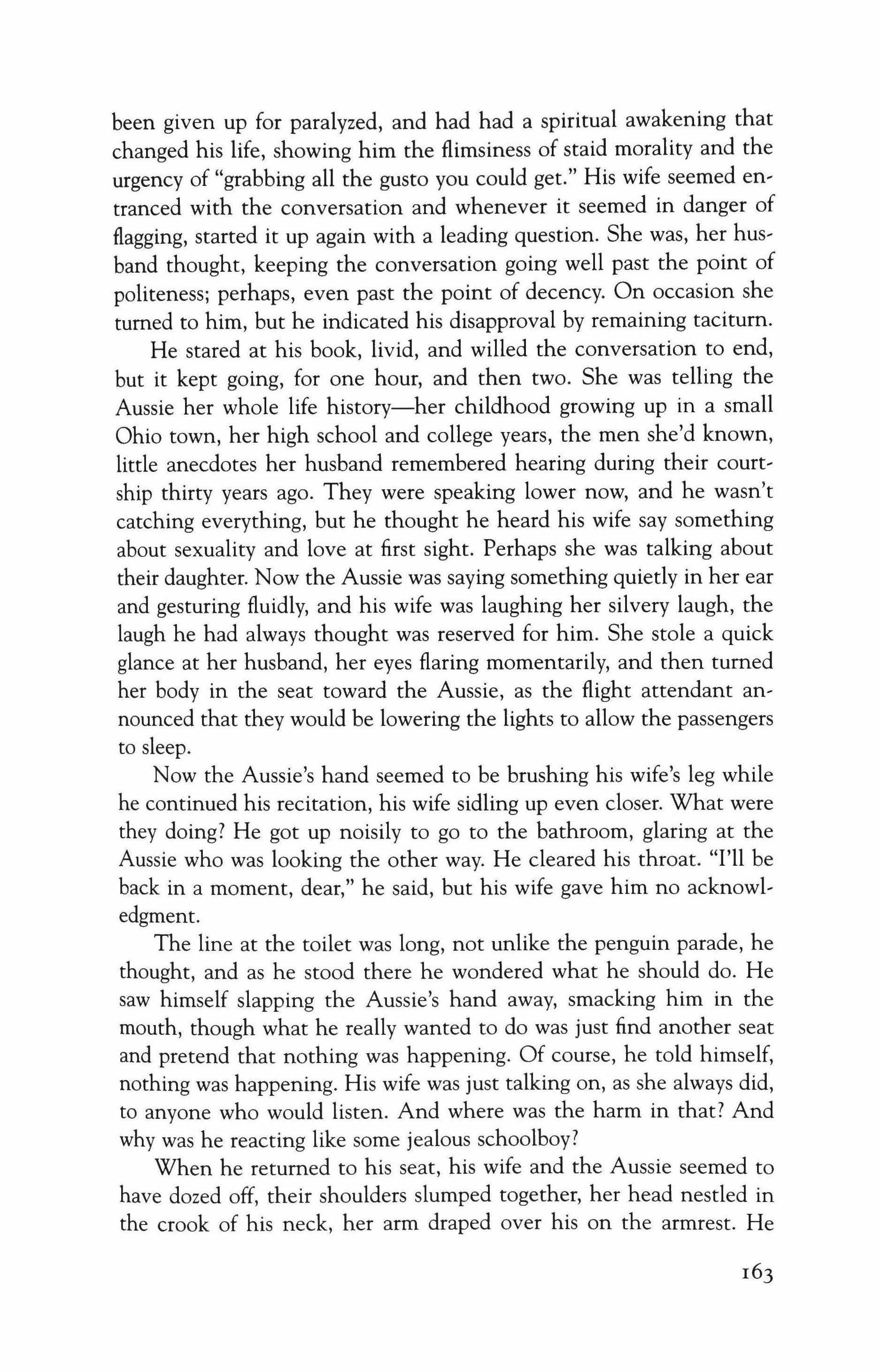
been given up for paralyzed, and had had a spiritual awakening that changed his life, showing him the flimsiness of staid morality and the urgency of "grabbing all the gusto you could get." His wife seemed entranced with the conversation and whenever it seemed in danger of flagging, started it up again with a leading question. She was, her husband thought, keeping the conversation going well past the point of politeness; perhaps, even past the point of decency. On occasion she turned to him, but he indicated his disapproval by remaining taciturn.
He stared at his book, livid, and willed the conversation to end, but it kept going, for one hour, and then two. She was telling the Aussie her whole life history-her childhood growing up in a small Ohio town, her high school and college years, the men she'd known, little anecdotes her husband remembered hearing during their courtship thirty years ago. They were speaking lower now, and he wasn't catching everything, but he thought he heard his wife say something about sexuality and love at first sight. Perhaps she was talking about their daughter. Now the Aussie was saying something quietly in her ear and gesturing fluidly, and his wife was laughing her silvery laugh, the laugh he had always thought was reserved for him. She stole a quick glance at her husband, her eyes flaring momentarily, and then turned her body in the seat toward the Aussie, as the flight attendant announced that they would be lowering the lights to allow the passengers to sleep.
Now the Aussie's hand seemed to be brushing his wife's leg while he continued his recitation, his wife sidling up even closer. What were they doing? He got up noisily to go to the bathroom, glaring at the Aussie who was looking the other way. He cleared his throat. "I'll be back in a moment, dear," he said, but his wife gave him no acknowledgment.
The line at the toilet was long, not unlike the penguin parade, he thought, and as he stood there he wondered what he should do. He saw himself slapping the Aussie's hand away, smacking him in the mouth, though what he really wanted to do was just find another seat and pretend that nothing was happening. Of course, he told himself, nothing was happening. His wife was just talking on, as she always did, to anyone who would listen. And where was the harm in that? And why was he reacting like some jealous schoolboy?
When he returned to his seat, his wife and the Aussie seemed to have dozed off, their shoulders slumped together, her head nestled in the crook of his neck, her arm draped over his on the armrest. He

made as much noise as possible getting back into his seat and sorting out the seatbelt. His wife looked up and smiled sleepily at him. "Love makes the world go round," she said, as the world speeded up and went past him.

THIS HAS ALWAYS STAYED WITH HIM. RATHER, IT COMES BACK FROM time to time. Takes place at a party. He was around seventeen. No, he was sixteen, probably no less, because at seventeen he was in college and by then had stopped seeing most of his high school friends. Friends when he was in high school, he means, since they all went to different private schools in the city-some went to the same one-and he went to a public high school in the Bronx where for most of his three and a half years there he had only two friends, neither knew the other and both he never saw except in school and occasionally on the subway after school when he and one of them were going downtown to their jobs. That first half year after grade school he went to what was called an elite public high school-one of about five in the city you had to take a test to get in-but found it too hard and left before he flunked out. He went to the Bronx school, which he wasn't entitled to go to since it was out of his school district, because the one academic high school in his Manhattan district was known as one of the worst in the city and for having lots of hoods and some with zip guns and there had even been a couple of shootings in it. The Bronx school was supposed to be a little better academically than the Manhattan one but also had lots of hoods, which he didn't know about till he got there, and no doubt some had zip guns but he never heard of a shooting in the school or even a student showing a gun. He got into this school by giving the address of an aunt and uncle in the district and getting them to sign

papers that he lived with them. Another reason he chose that school over let's say another one out of his district and certainly one closer to home-the Bronx one took an hour to get to by subway-was because his brother had gone to it. But that was when it was a pretty good school, his brother said, with no hoods in it and any boy-it was an all-boys' school then-in the five boroughs could apply to it. His father had also gone to it but when it was in Lower Manhattan. In other words, the same school named after the same New York governor but it closed down and reopened sometime later in a new building in the Bronx long after his father had graduated from it. He at least thinks it was a new building-it looked like something built in the Twenties or Thirties-but he's getting way off the track. The party. It was on Park Avenue or Fifth. Definitely Park, since the apartment building, he remembers, was on the west side of the avenue, and if that were Fifth the west side of it would be Central Park. He went with several of his private school friends who knew the girl giving the party or knew someone who knew her and could use that person's name. Anyway, it wasn't a hard party to crash, as they used to call it. They just walked into the building's lobby, gave the name of the girl to the doorman and he said something like "Are you young men invited?" and one of them said "Yes, sir. I believe"-this is the line they always used and they designated which one would say it before they went into the building-"the invitation for all of us is in one of these pockets," and started feeling inside his jacket and coat and looking very disappointed he couldn't immediately produce the invitation until the doorman said-this seemed to always happen-lilt's okay this time; go up," and gave the floor and which elevator to take and the elevator man took them up. On Park and Fifth in that neighborhood most of the elevators then, and maybe still today, were hand-operated, if that's the right term for it. The elevator opened onto the party. In other words, this was the only apartment on that floor and the elevator door, after the car's cage door was pulled back, opened onto a small public foyer and the apartment door right opposite the elevator was open and they could see from the car before they even got out of it the party going on. He doesn't know why he's making this so difficult if not incomprehensible to understand. Or why he even thinks the elevator business is important to put in. Why he didn't just say they got off the elevator and went into the party. But he thinks he knows why. To show something about the building and apartment of the girl who gave the party and the time it took place and what he and his friends were like then. He can't just
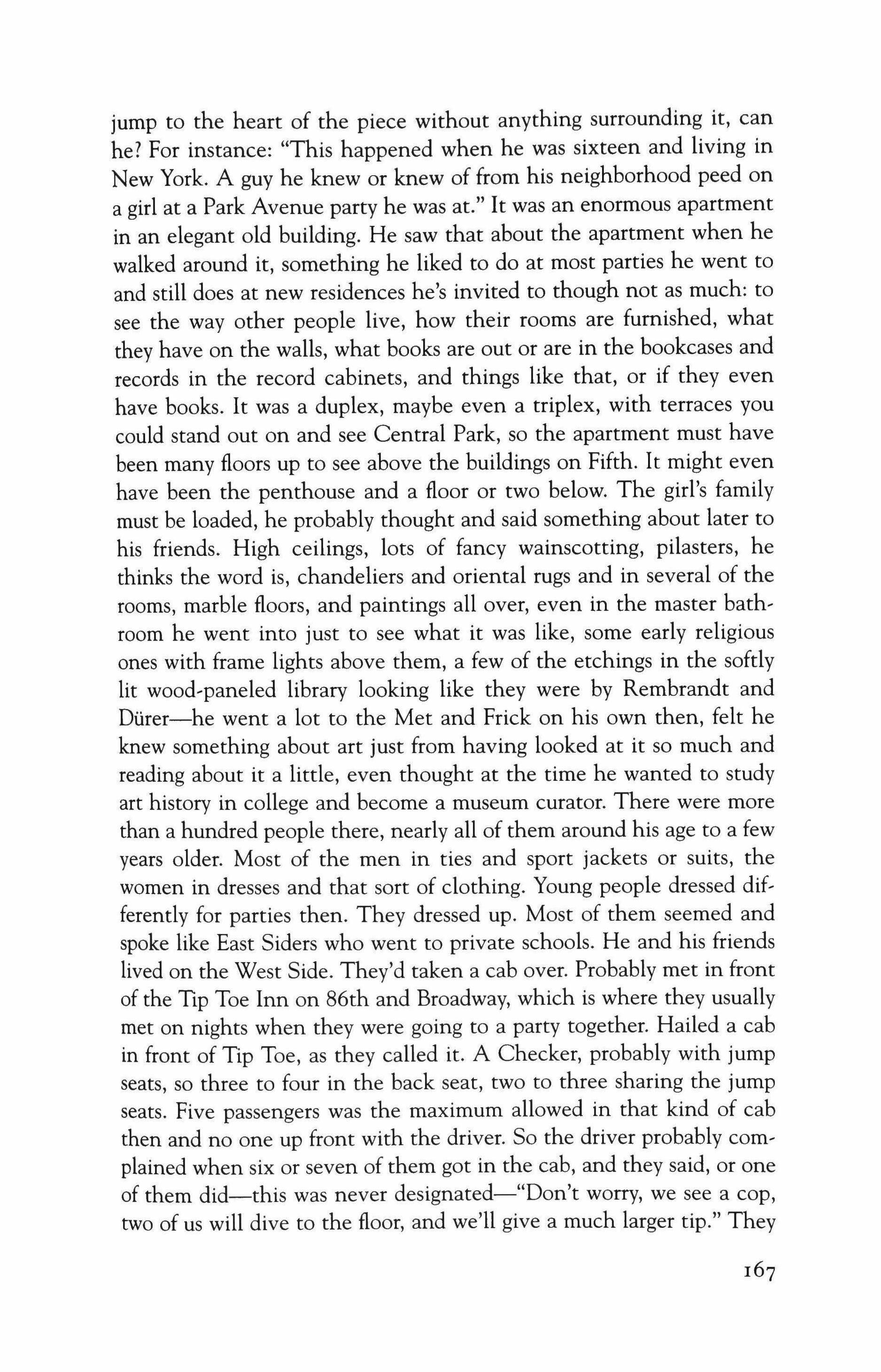
jump to the heart of the piece without anything surrounding it, can he? For instance: "This happened when he was sixteen and living in New York. A guy he knew or knew offrom his neighborhood peed on a girl at a Park Avenue party he was at." It was an enormous apartment in an elegant old building. He saw that about the apartment when he walked around it, something he liked to do at most parties he went to and still does at new residences he's invited to though not as much: to see the way other people live, how their rooms are furnished, what they have on the walls, what books are out or are in the bookcases and records in the record cabinets, and things like that, or if they even have books. It was a duplex, maybe even a triplex, with terraces you could stand out on and see Central Park, so the apartment must have been many floors up to see above the buildings on Fifth. It might even have been the penthouse and a floor or two below. The girl's family must be loaded, he probably thought and said something about later to his friends. High ceilings, lots of fancy wainscotting, pilasters, he thinks the word is, chandeliers and oriental rugs and in several of the rooms, marble floors, and paintings all over, even in the master bathroom he went into just to see what it was like, some early religious ones with frame lights above them, a few of the etchings in the softly lit wood-paneled library looking like they were by Rembrandt and Durer-he went a lot to the Met and Frick on his own then, felt he knew something about art just from having looked at it so much and reading about it a little, even thought at the time he wanted to study art history in college and become a museum curator. There were more than a hundred people there, nearly all of them around his age to a few years older. Most of the men in ties and sport jackets or suits, the women in dresses and that sort of clothing. Young people dressed differently for parties then. They dressed up. Most of them seemed and spoke like East Siders who went to private schools. He and his friends lived on the West Side. They'd taken a cab over. Probably met in front of the Tip Toe Inn on 86th and Broadway, which is where they usually met on nights when they were going to a party together. Hailed a cab in front of Tip Toe, as they called it. A Checker, probably with jump seats, so three to four in the back seat, two to three sharing the jump seats. Five passengers was the maximum allowed in that kind of cab then and no one up front with the driver. So the driver probably complained when six or seven of them got in the cab, and they said, or one of them did-this was never designated-"Don't worry, we see a cop, two of us will dive to the floor, and we'll give a much larger tip." They
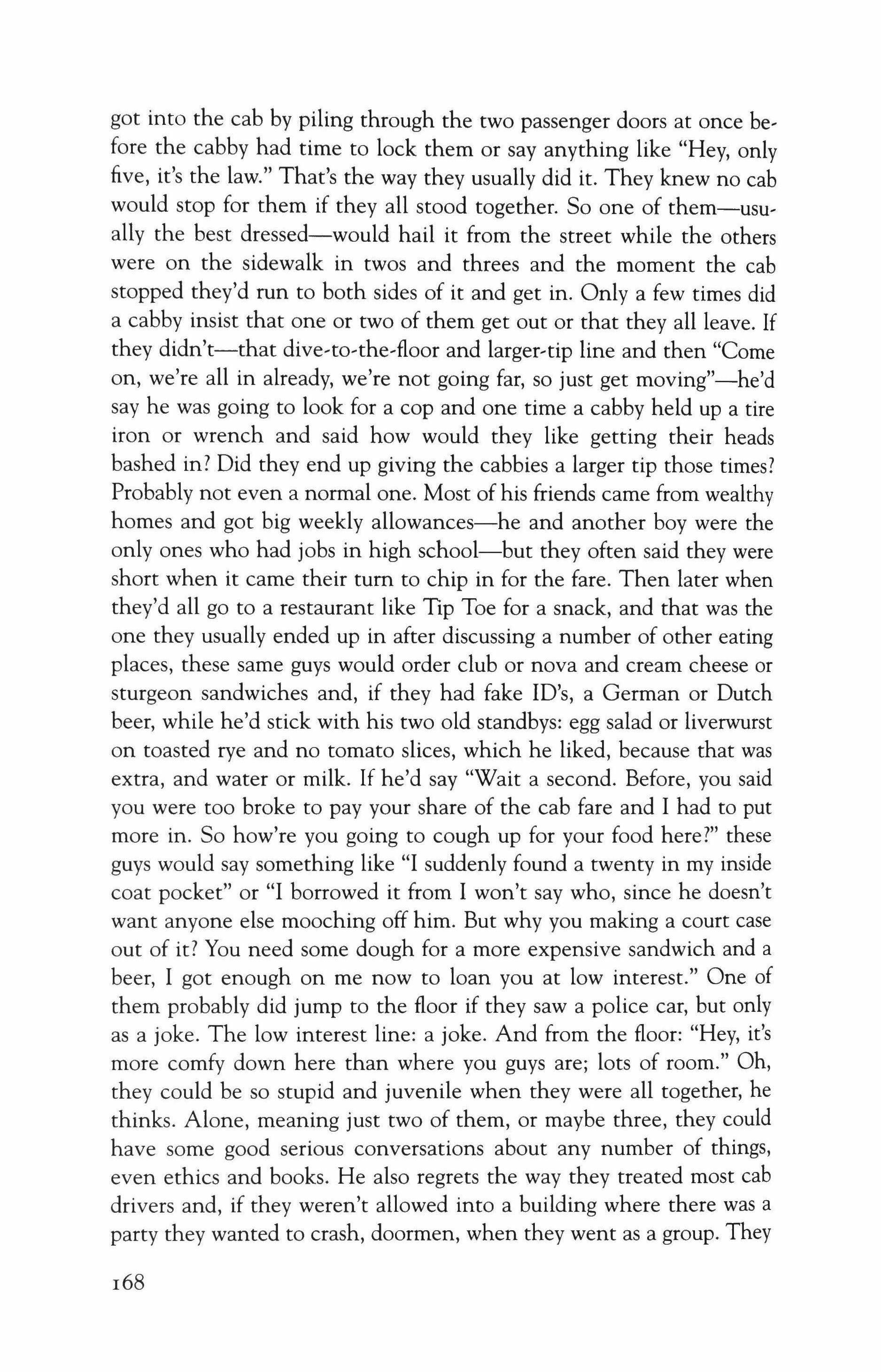
got into the cab by piling through the two passenger doors at once before the cabby had time to lock them or say anything like "Hey, only five, it's the law." That's the way they usually did it. They knew no cab would stop for them if they all stood together. So one of them-usually the best dressed-would hail it from the street while the others were on the sidewalk in twos and threes and the moment the cab stopped they'd run to both sides of it and get in. Only a few times did a cabby insist that one or two of them get out or that they all leave. If they didn't-that dive-to-the-floor and larger-tip line and then "Come on, we're all in already, we're not going far, so just get moving"-he'd say he was going to look for a cop and one time a cabby held up a tire iron or wrench and said how would they like getting their heads bashed in? Did they end up giving the cabbies a larger tip those times?
Probably not even a normal one. Most of his friends came from wealthy homes and got big weekly allowances-he and another boy were the only ones who had jobs in high school-but they often said they were short when it came their tum to chip in for the fare. Then later when they'd all go to a restaurant like Tip Toe for a snack, and that was the one they usually ended up in after discussing a number of other eating places, these same guys would order club or nova and cream cheese or sturgeon sandwiches and, if they had fake ID's, a German or Dutch beer, while he'd stick with his two old standbys: egg salad or liverwurst on toasted rye and no tomato slices, which he liked, because that was extra, and water or milk. If he'd say "Wait a second. Before, you said you were too broke to pay your share of the cab fare and I had to put more in. So how're you going to cough up for your food here?" these guys would say something like "I suddenly found a twenty in my inside coat pocket" or "I borrowed it from I won't say who, since he doesn't want anyone else mooching off him. But why you making a court case out of it? You need some dough for a more expensive sandwich and a beer, I got enough on me now to loan you at low interest." One of them probably did jump to the floor if they saw a police car, but only as a joke. The low interest line: a joke. And from the floor: "Hey, it's more comfy down here than where you guys are; lots of room." Oh, they could be so stupid and juvenile when they were all together, he thinks. Alone, meaning just two of them, or maybe three, they could have some good serious conversations about any number of things, even ethics and books. He also regrets the way they treated most cab drivers and, if they weren't allowed into a building where there was a party they wanted to crash, doormen, when they went as a group. They

once tossed a big metal trash can filled with garbage into a lobby after they weren't permitted up. They once, when several of them distracted the doorman, grabbed his hat off his head and ran outside and kicked it back and forth before one of them threw it on top of a passing car. They once terrible things, which they thought were great pranks. When there were only two or three of them and they were told by the doorman they couldn't get in, they left politely. But get to the point or at least where you left off. They cabbed over, took the elevator up in this swanky old building, is what they used to call it-but went over that. Heard the party going on before the elevator reached the floor, but sort of said that too. They got rid of their coats in a room with about a hundred other coats on chairs and two single beds and other furniture and the floor. Then he walked around alone, inspecting the apartment as he said but also keeping a sharp lookout, is one of the ways they used to say it, for pretty girls. When they left the elevator and still had their coats on, he now remembers, and no doubt all excited they were going to have a great time, a girl in a satiny dress and he seems to remember pearls carne over to them at the door and said "You fellows are? and one of his friends said "We're from Bosley, seniors," and she said "Oh, on the West Side. We don't have any other Bosley boys here that I'm aware of. I'm your hostess," and gave her name and shook hands with each of them as they gave their names. "You can deposit your coats in the bedroom at the end of that hall. Since I don't recall inviting anyone from Bosley, and all my friends know better than to invite more than one person without first consulting me, I feel I have to tell you to please behave. Enjoy yourselves." What a doll, he told his friends. That figure, her face. And thought: so poised and rich, gorgeous and obviously smart, and that last crack showed she didn't take any shit. But why would she ever throw such a big party? Or that's something he could have thought then in that way. Also (for he fantasized about her for weeks and looked her number up in the phone book-she had her own listing-and thought of calling her and even had the first line: "I wanted to tell you how I felt about that horrible pig at your party" and the excuse, once he told her what high school he actually attended, why his friend had said he also went to Bosley: "He just wanted to simplify things"): that he could really go for her but felt she was so sophisticated and mature that she probably only went out with Ivy League guys at least a couple of years older than him. He could say he was around that age, but would have to admit he was still in high school, so didn't see how he could work that part out.

He hooked up with his friends after taking his walk around the place and they ate (huge carved turkey, big sliced ham, both on enormous silver platters on a long dining room table decked out with lots of fancy side dishes and other good foods), drank {two bartenders serving drinks-God, what the whole thing must be costing her folks, he probably thought}, circulated (some of his friends-he didn't; he usually had trouble initiating conversations with girls and then sustaining them long enough where they could talk as if they hadn't just metprobably even got phone numbers from girls and addresses of potentially great parties for the next few weeks). Then in the apartment's foyer when he was passing through with one of his friends he saw someone he knew from the West Side, or knew of. Albie Gold. Very rich guy, around nineteen, trim mustache, slicked black hair with a slight pompadour, always dapperly dressed, liked to race up and down Broadway in the Eighties in his new red convertible just to impress guys and girls hanging out there, had a reputation for picking fights with much taller guys and beating the crap out of them and going for the nose with his fists with the intention of breaking it and sometimes stomping the guy on the ground after he threw or punched him there. This is what he'd heard about him. Even if half of it was true, he thought then, someone to stay clear of because he could get so freaking crazy. Short, maybe five-seven but built like an ironworks chimney, as they used to say then: broad shoulders, bulging chest, bull neck, arms where you could see his big biceps through the jacket sleeves. He didn't like the way he looked either: most times with a mean scowl or contemptuous smile or just eyeing you as if sizing you up for a fight. 1. was a strong kid too, worked out but just to look good {mostly pushups and sit-ups at home}, best built and tallest of his friends-they'd nicknamed him The Rock but mainly to make their group seem tougher than it was, since he didn't like to fight and would usually try to talk two guys out of one and was also afraid if he got in one or sucker-punched he'd get his nose broken or head split or front tooth knocked out. He was also about half a foot taller than Albie, so another reason to stay out of his way: though he was around two years younger than him he was still in height and build the type he'd heard Albie liked to start up with. So what was this goon, he'd call him, doing at such a refined party? Maybe his date brought him, he thought. Guys like that: lots of dough to spend, his own snappy car, good-looking in a dark creepy way he'd say, and much different and maybe even more exciting than most rich college guys his age, can be attractive to

some girls, he supposes, and probably other things he doesn't understand about it. Anyway, his thoughts then, but now to the point. Albie was with a dream of a girl: tall, nice and slim, long legs, blond hair that was probably also long but wrapped around and pinned up in back in what a girlfriend of a friend of his said was a chignon, a very sweet face. Looked like a model: the little nose, fashionable clothes, almost no breasts, and something about the way she stood and smoked that seemed like a pose. Albie was smiling at her in a normal way when they were all in the foyer near the front door and then said something like "You know what?" and she smiled at him and said "What?" and still smiling as if he liked her he said "You're nothing but a stupid cunt. As stupid as any cunt could be. You'd have to be to drink so much when you know you can't hold it and to say such stupid things. Look at your puss. Go into one of the bathrooms here and wash it and do something about your ugly breath and don't come out till you've sobered up." She said something like "I'll go and do what I please, and why must you talk to me like a brute?" and looked like she was going to cry. "Like a what? You're disgusting," and he slapped the cigarette out of her hand-someone immediately picked it up and put it outand grabbed her hair-this in front of about two dozen people by now-and pulled down on it till she was on her knees, shouting for him to get off, he was hurting her. He held her down by the hair and with his other hand unzipped his fly and took out his penis and started pissing on her while she screamed and tried to get out of the way of his piss and yelled hysterically "Oh no, look what you're doing, you're a slob, someone help me, call the cops, stop, stop," but he kept pissing on her and I. just stood there watching and then turned away and wished he was much stronger and tougher than Albie and not afraid of getting his nose busted and so forth and he could grab him by the head and throw him to the floor and stick his face in the piss and keep mashing and banging his face in it and say "There, how's that for a taste? go on, take some more, lap it up, you freaking pig," and then give him a good chop on the back of his neck and say "There's more of that if you want I'll cut your stupid head off if you like," and then take off his jacket and cover the girl and say "Here, get up, go to the bathroom, we'll try to get you a different dress or something," and escort her to the bathroom or ask some girls to take her while he kept his eye on Albie in case he tried to jump him and if he did he'd really let him have it, knock him out cold if he had to, and then see if he could find her another dress, or maybe there was a way to wash and dry
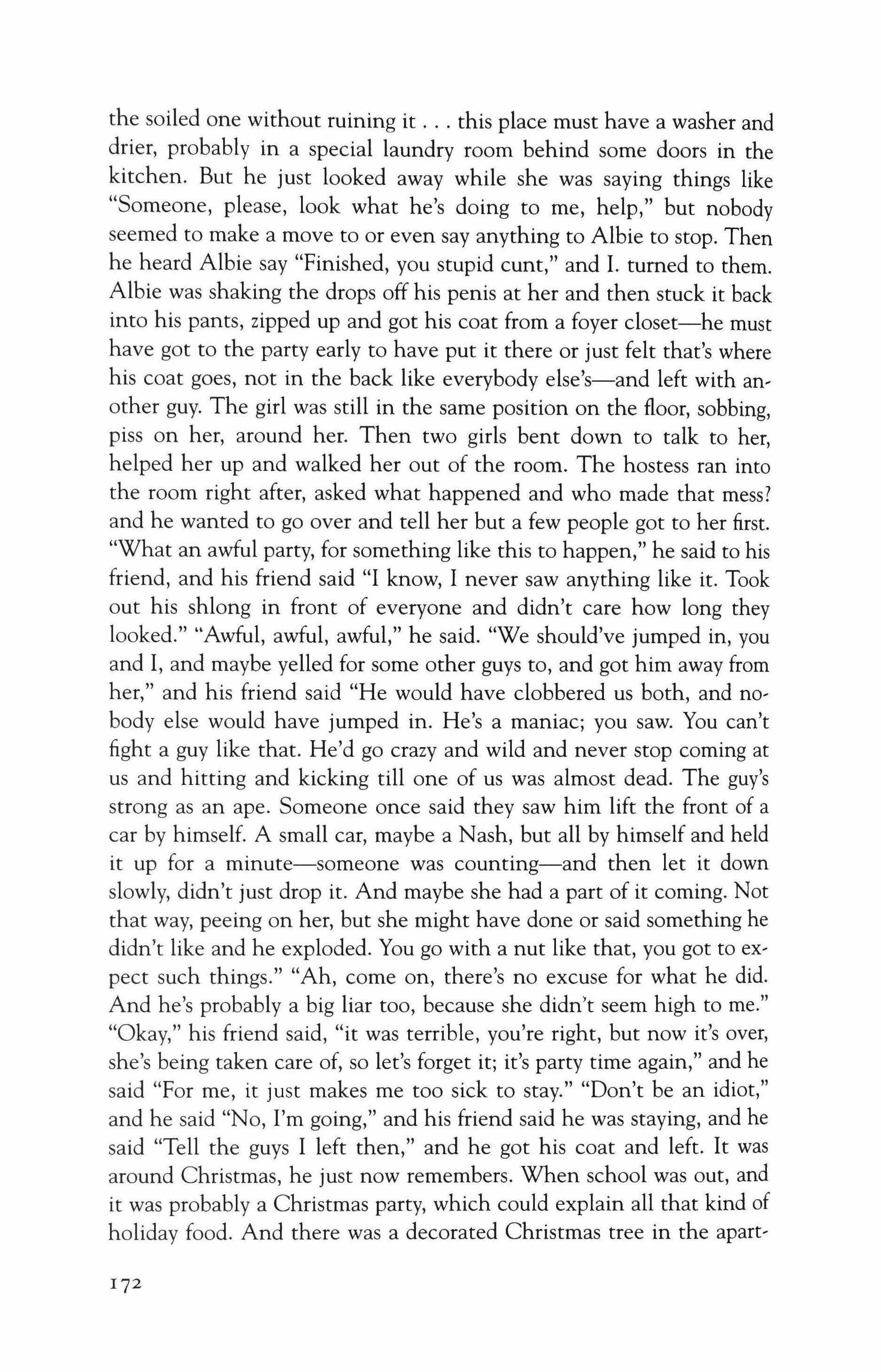
the soiled one without ruining it this place must have a washer and drier, probably in a special laundry room behind some doors in the kitchen. But he just looked away while she was saying things like "Someone, please, look what he's doing to me, help," but nobody seemed to make a move to or even say anything to Albie to stop. Then he heard Albie say "Finished, you stupid cunt," and I. turned to them. Albie was shaking the drops off his penis at her and then stuck it back into his pants, zipped up and got his coat from a foyer closet-he must have got to the party early to have put it there or just felt that's where his coat goes, not in the back like everybody else's-and left with an, other guy. The girl was still in the same position on the floor, sobbing, piss on her, around her. Then two girls bent down to talk to her, helped her up and walked her out of the room. The hostess ran into the room right after, asked what happened and who made that mess? and he wanted to go over and tell her but a few people got to her first. "What an awful party, for something like this to happen," he said to his friend, and his friend said "I know, I never saw anything like it. Took out his shlong in front of everyone and didn't care how long they looked." "Awful, awful, awful," he said. "We should've jumped in, you and I, and maybe yelled for some other guys to, and got him away from her," and his friend said "He would have clobbered us both, and no' body else would have jumped in. He's a maniac; you saw. You can't fight a guy like that. He'd go crazy and wild and never stop coming at us and hitting and kicking till one of us was almost dead. The guy's strong as an ape. Someone once said they saw him lift the front of a car by himself. A small car, maybe a Nash, but all by himself and held it up for a minute-someone was counting-and then let it down slowly, didn't just drop it. And maybe she had a part of it coming. Not that way, peeing on her, but she might have done or said something he didn't like and he exploded. You go with a nut like that, you got to ex, pect such things." "Ah, come on, there's no excuse for what he did. And he's probably a big liar too, because she didn't seem high to me." "Okay," his friend said, "it was terrible, you're right, but now it's over, she's being taken care of, so let's forget it; it's party time again," and he said "For me, it just makes me too sick to stay." "Don't be an idiot," and he said "No, I'm going," and his friend said he was staying, and he said "Tell the guys I left then," and he got his coat and left. It was around Christmas, he just now remembers. When school was out, and it was probably a Christmas party, which could explain all that kind of holiday food. And there was a decorated Christmas tree in the apart'
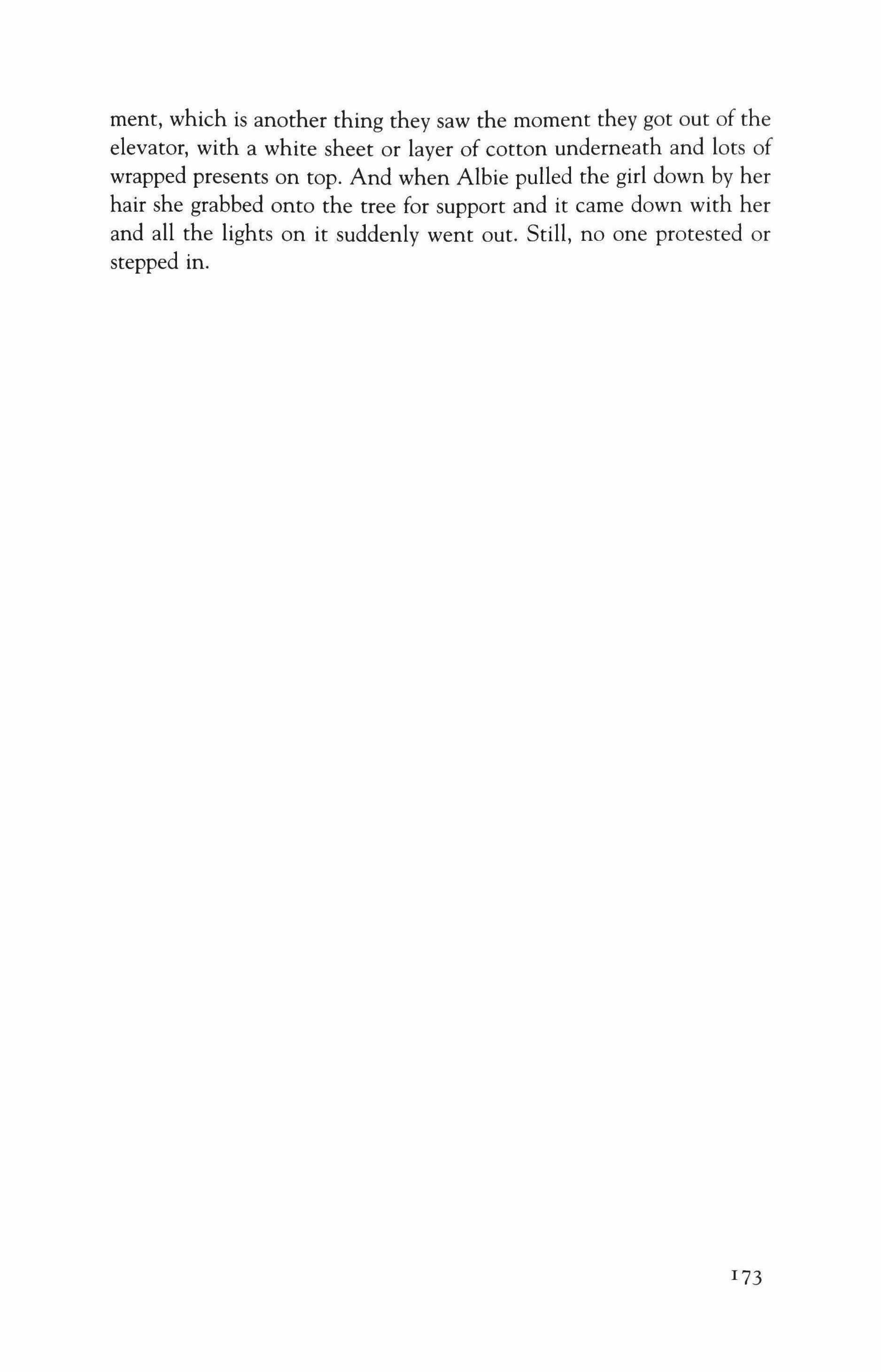
ment, which is another thing they saw the moment they got out of the elevator, with a white sheet or layer of cotton underneath and lots of wrapped presents on top. And when Albie pulled the girl down by her hair she grabbed onto the tree for support and it came down with her and all the lights on it suddenly went out. Still, no one protested or stepped in.
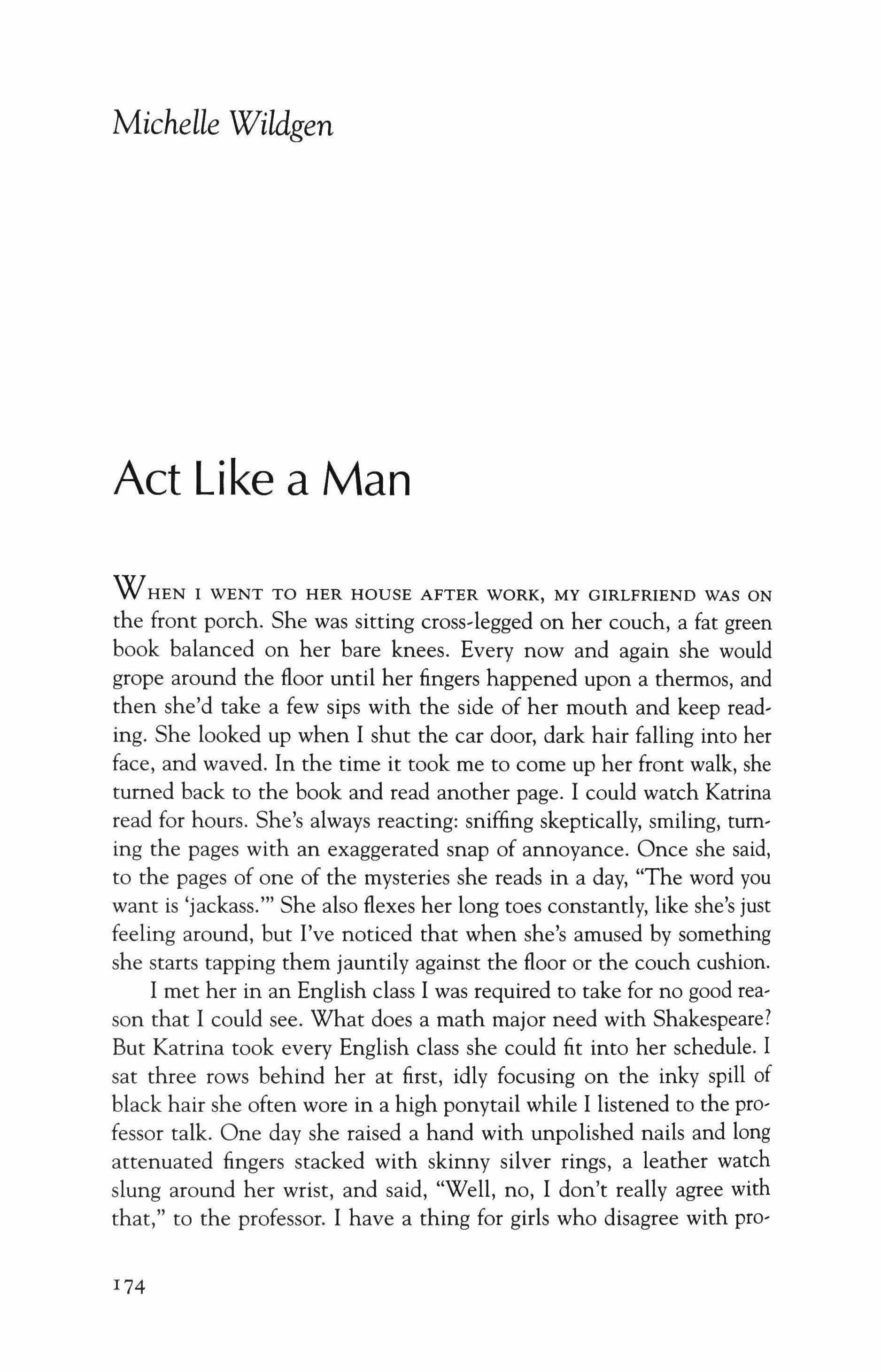
WHEN I WENT TO HER HOUSE AFTER WORK, MY GIRLFRIEND WAS ON the front porch. She was sitting cross-legged on her couch, a fat green book balanced on her bare knees. Every now and again she would grope around the floor until her fingers happened upon a thermos, and then she'd take a few sips with the side of her mouth and keep reading. She looked up when I shut the car door, dark hair falling into her face, and waved. In the time it took me to come up her front walk, she turned back to the book and read another page. I could watch Katrina read for hours. She's always reacting: sniffing skeptically, smiling, turning the pages with an exaggerated snap of annoyance. Once she said, to the pages of one of the mysteries she reads in a day, "The word you want is 'jackass.'" She also flexes her long toes constantly, like she's just feeling around, but I've noticed that when she's amused by something she starts tapping them jauntily against the floor or the couch cushion. I met her in an English class I was required to take for no good reason that I could see. What does a math major need with Shakespeare? But Katrina took every English class she could fit into her schedule. I sat three rows behind her at first, idly focusing on the inky spill of black hair she often wore in a high ponytail while I listened to the professor talk. One day she raised a hand with unpolished nails and long attenuated fingers stacked with skinny silver rings, a leather watch slung around her wrist, and said, "Well, no, I don't really agree with that," to the professor. I have a thing for girls who disagree with pro�
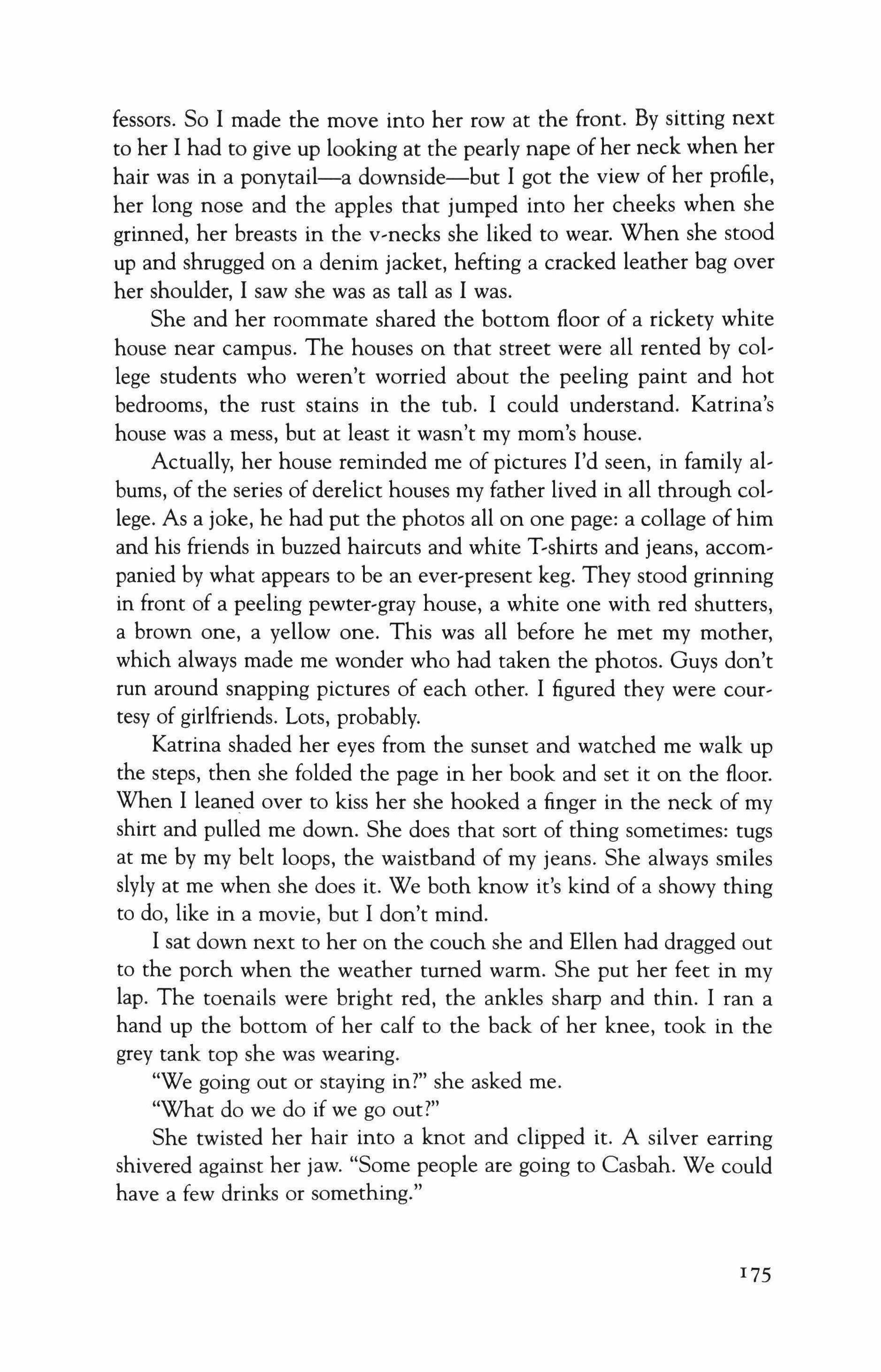
fessors. So I made the move into her row at the front. By sitting next to her I had to give up looking at the pearly nape of her neck when her hair was in a ponytail-a downside-but I got the view of her profile, her long nose and the apples that jumped into her cheeks when she grinned, her breasts in the v-necks she liked to wear. When she stood up and shrugged on a denim jacket, hefting a cracked leather bag over her shoulder, I saw she was as tall as I was.
She and her roommate shared the bottom floor of a rickety white house near campus. The houses on that street were all rented by college students who weren't worried about the peeling paint and hot bedrooms, the rust stains in the tub. I could understand. Katrina's house was a mess, but at least it wasn't my mom's house.
Actually, her house reminded me of pictures I'd seen, in family albums, of the series of derelict houses my father lived in all through college. As a joke, he had put the photos all on one page: a collage of him and his friends in buzzed haircuts and white Tshirts and jeans, accompanied by what appears to be an ever-present keg. They stood grinning in front of a peeling pewter-gray house, a white one with red shutters, a brown one, a yellow one. This was all before he met my mother, which always made me wonder who had taken the photos. Guys don't run around snapping pictures of each other. I figured they were courtesy of girlfriends. Lots, probably.
Katrina shaded her eyes from the sunset and watched me walk up the steps, then she folded the page in her book and set it on the floor. When I leaned over to kiss her she hooked a finger in the neck of my shirt and pulled me down. She does that sort of thing sometimes: tugs at me by my belt loops, the waistband of my jeans. She always smiles slyly at me when she does it. We both know it's kind of a showy thing to do, like in a movie, but I don't mind.
I sat down next to her on the couch she and Ellen had dragged out to the porch when the weather turned warm. She put her feet in my lap. The toenails were bright red, the ankles sharp and thin. I ran a hand up the bottom of her calf to the back of her knee, took in the grey tank top she was wearing.
"We going out or staying in?" she asked me.
"What do we do if we go out?"
She twisted her hair into a knot and clipped it. A silver earring shivered against her jaw. "Some people are going to Casbah. We could have a few drinks or something."

I took hold of her ankles and pulled her closer to me. "What else?" She smiled. "We can stay home. Play some checkers."
Katrina peered out the bedroom door for her roommate and then ran naked into the kitchen to get a couple beers. We lay on our stomachs on top of her sheets, sipping from the cans.
"Hey, Danny," she said. I'd been staring off into space. "Hm?"
"Ellen's moving back to Cincinnati for the summer," she said. She looked at me out of the comer of her eye. "It's kind of last minute. So in a couple weeks I need another roommate."
I turned onto my back and rested the beer can on my belly. "I don't think I know anyone offhand," I told her. "I'll ask around if you want." She turned onto her side, the weight of her breasts curving toward the mattress, and drummed her fingers on my ribs. "What about you?" "Me?"
"Yeah. It's just for the summer. We don't even have to share a room: obviously, If we don't like living together then in the fall we go back to not living together."
I contemplated this. Suddenly the cheap paneling on Katrina's bedroom walls and the heat of the room seemed like tiny flaws, maybe even charming flaws, like the freckle she had under one breast or the tiny chip off a comer of her bottom tooth. I could see a whole summer of nothing but sex and, occasionally, work. We'd cor:ne home and shower together, get dressed only when we wanted to leave the house. We could fuck on the couch, against the kitchen counter, in the bathtub; not like now when we locked the door to her room and turned the music up loud.
That sounds cheap. I also just thought it would be nice not to leave her every night. At the end of every date I had to drag on jeans that felt rough as burlap compared to her and go back out into the cool air. All the dropping off and picking up made me feel like a high school kid sometimes. If one of my friends had asked me if I wanted to live with her, I would've said no. Frankly, living together had always struck me as the kind of thing women wanted more than men. But as soon as Katrina asked me it seemed like something I had to have. Maybe it was just the unexpectedness of it, but the image of her first thing in the morning-breasts soft beneath a tight T-shirt, boxer

shorts low on her hips, a messy ponytail-popped into my head. What surprised me was how much I liked imagining her this way. Who else would get to see it?
Nevertheless, I said, "I don't know. There's Pats."
Patsy-Patrick-is sixteen, three years younger than me. If you ask me, he could handle more than my mom thought.
"But mainly you just drive him around and cook; it's not like he needs serious physical care," Katrina pointed out. "Don't you think your mom would be fine?"
Maybe she would. I didn't care if Katrina was jumping the gun. I was flattered, and I didn't really worry that we'd only been dating a few months, or whether I loved her. I think I did love her, maybe. I know I wanted her all the time, and I liked talking to her more than anyone. I know people say you get sick of girls when you live with them, but I couldn't see that happening. Plus we'd both be too busy to get sick of each other, me at the sports store and her with the restaurant and summer classes. I lay there balancing my beer on my stomach, thinking how easy it would be, no responsibilities except what I felt like doing for myself. No ferrying Patsy to friends and lessons, no cooking what my mother called "real" meals instead of ordering pizza.
Katrina reached down to set her beer on the floor, showing a flash of the shadowed white skin beneath her arm. She propped her head on her hand and looked at me. She was still warm and messed up from before, her cheeks bright and even her eyebrows mussed from where her face had pressed against me and the pillow. I smoothed one with my thumb but liked it better messy and rubbed it back. She laughed.
"Let me think about it," I said. Who wants to say, 'Let me talk to Mom'? "But yeah."
I was starting to think it was time for that anyway. Patsy wasn't a little kid anymore; he was the same age I had been when our dad died. After dinner one night three years ago my dad got up from the table, flexing an arm and looking aggrieved. At the refrigerator he turned toward us, leaving its door wide open. He stood there, waiting for the minute it took Patsy to pause with his fork still dug into the pan of lasagna, and for my mother's hand to stop in mid-tap and hover an inch above Patsy's wrist, and for me to quit rooting around the basket of leftover rolls, looking for one that was still warm. Stillness dropped over us and our eyes came to rest on my father, whose brows were knit
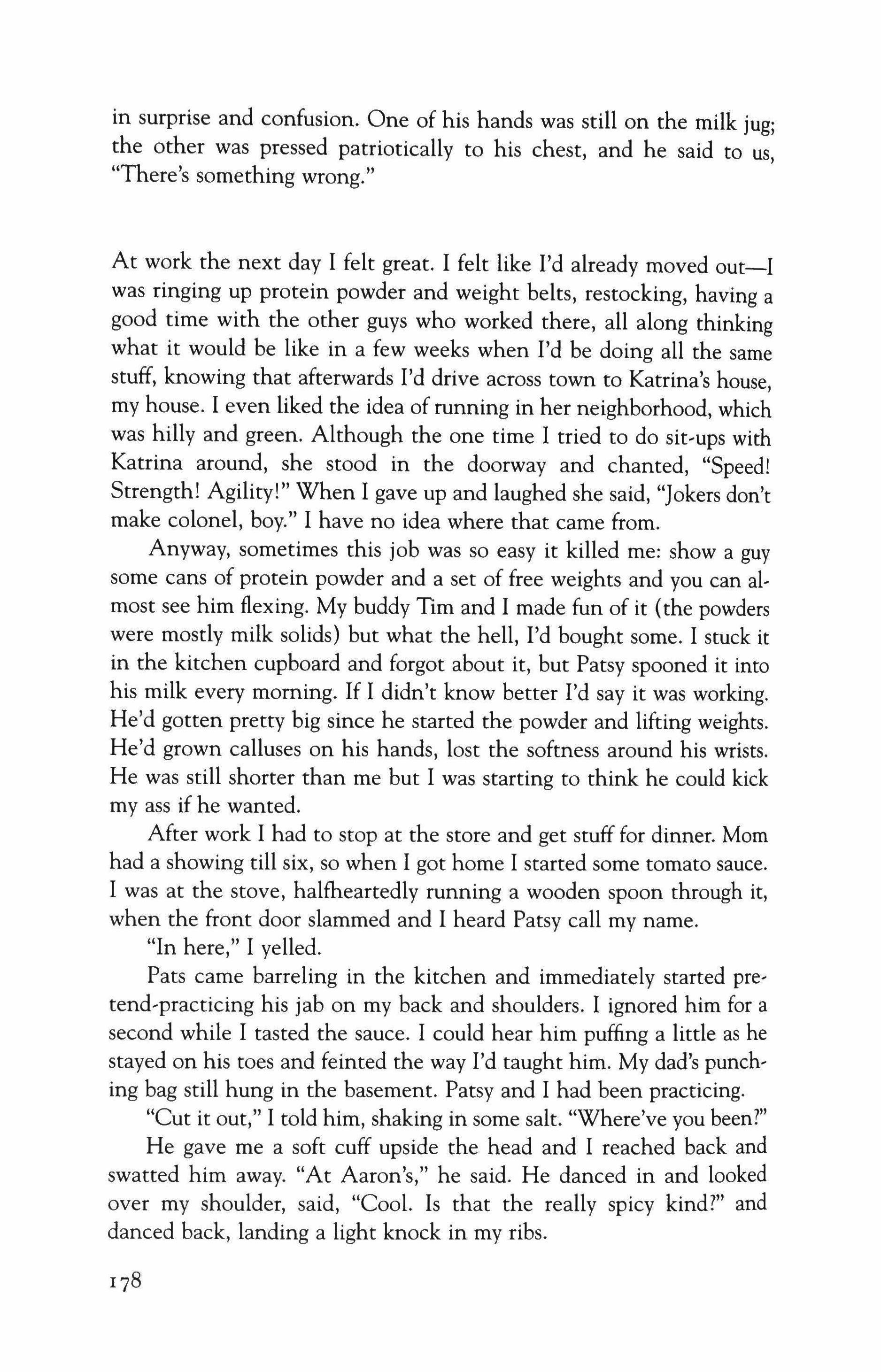
in surprise and confusion. One of his hands was still on the milk jug; the other was pressed patriotically to his chest, and he said to us, "There's something wrong."
At work the next day I felt great. I felt like I'd already moved out-I was ringing up protein powder and weight belts, restocking, having a good time with the other guys who worked there, all along thinking what it would be like in a few weeks when I'd be doing all the same stuff, knowing that afterwards I'd drive across town to Katrina's house, my house. I even liked the idea of running in her neighborhood, which was hilly and green. Although the one time I tried to do sit-ups with Katrina around, she stood in the doorway and chanted, "Speed! Strength! Agility!" When I gave up and laughed she said, "Jokers don't make colonel, boy." I have no idea where that came from.
Anyway, sometimes this job was so easy it killed me: show a guy some cans of protein powder and a set of free weights and you can almost see him flexing. My buddy Tim and I made fun of it (the powders were mostly milk solids) but what the hell, I'd bought some. I stuck it in the kitchen cupboard and forgot about it, but Patsy spooned it into his milk every morning. If I didn't know better I'd say it was working. He'd gotten pretty big since he started the powder and lifting weights. He'd grown calluses on his hands, lost the softness around his wrists. He was still shorter than me but I was starting to think he could kick my ass if he wanted.
After work I had to stop at the store and get stuff for dinner. Mom had a showing till six, so when I got home I started some tomato sauce. I was at the stove, halfheartedly running a wooden spoon through it, when the front door slammed and I heard Patsy call my name.
"In here," I yelled.
Pats came barreling in the kitchen and immediately started pretend-practicing his jab on my back and shoulders. I ignored him for a second while I tasted the sauce. I could hear him puffing a little as he stayed on his toes and feinted the way I'd taught him. My dad's punching bag still hung in the basement. Patsy and I had been practicing.
"Cut it out," I told him, shaking in some salt. "Where've you been?"
He gave me a soft cuff upside the head and I reached back and swatted him away. "At Aaron's," he said. He danced in and looked over my shoulder, said, "Cool. Is that the really spicy kind?" and danced back, landing a light knock in my ribs.

"You know Mom hates that kind," I reminded him. His friend Aaron lived around the comer from us. I could tell right off they'd been watching wrestling. He always gets worked up when he watches wrestling. Boxing was supposed to help him calm down, work off the energy. Patsy delivered a gentle right hook above my ear. It landed just a little harder than the others. Maybe I hadn't thought this through very well.
I turned around and he danced backwards, guarding his face with his fists. He was looking at me over his knuckles, his blue eyes heavylidded and maybe a little more wide-set than you're used to. His mouth is broader and less defined than most people's, the shell-pink of his tongue always slightly visible behind his teeth.
I feinted toward him and he darted back, ran into the table and knocked over the salad dressing.
"Jesus Christ, Patsy, use your head. Get a towel and clean that up."
He was mopping away at the oil when our mother came in. She looked around the kitchen and so did I. When I'd turned I was still holding the sauce spoon and there was a spray of red splatters along the counter and wall by the stove, big blotches of salad dressing on the place mats and dripping onto the floor. Mom leaned against the doorway and gave me a long stare.
Patsy looked up. "Hi Mom." He took in the stare and turned to me. "She can make your balls shrink into your lungs."
He never got these things quite right. What I said was that my mother has a look that'll make your balls shrivel up to your ribs. I'd gotten that look-this look-when I forgot about Patsy's swim meet and went to a baseball game with Tim instead.
Pats shot me a grin and then one to Mom, like she would be flattered. I'd planned on talking to her about moving out after dinner, but now things hadn't gotten off to much of a start.
"It's so nice to come home to this," she said. "A mess in the kitchen, reports on the state of my son's testicles."
This is exactly the kind of thing that made me want to move out.
But then Mom almost started to laugh and before Patsy saw her grin she turned away and got the gin and a lime out of the fridge. Sometimes she surprised me.
"How was Aaron's, Pat?" she asked. She sliced a lime and dropped a couple wedges in her glass. "What'd you do?"
While her back was turned Pats threw me a look of alarm. He knew damn well he wasn't supposed to be watching wrestling. After he
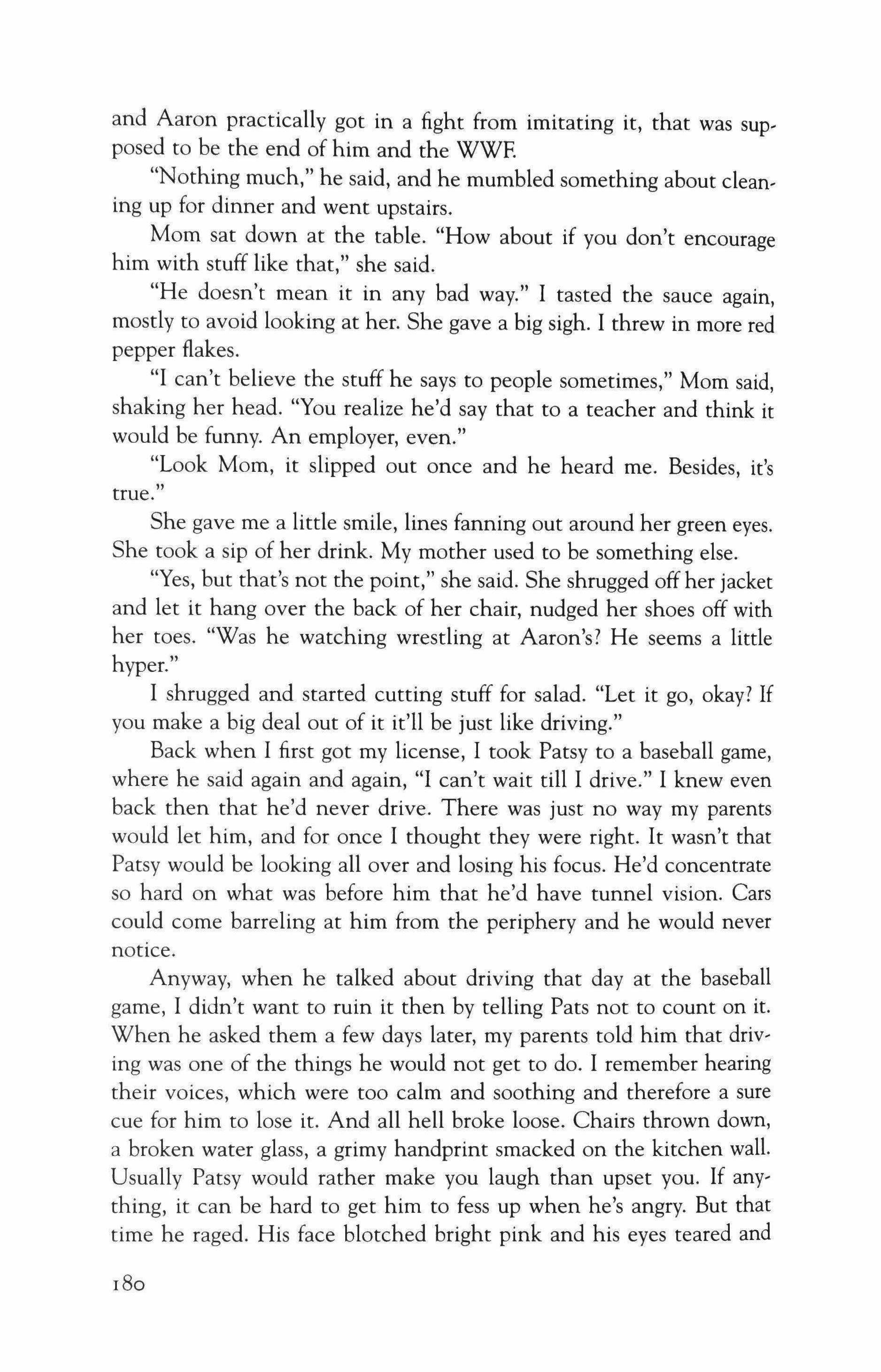
and Aaron practically got in a fight from imitating it, that was supposed to be the end of him and the WWF.
"Nothing much," he said, and he mumbled something about cleaning up for dinner and went upstairs.
Mom sat down at the table. "How about if you don't encourage him with stuff like that," she said.
"He doesn't mean it in any bad way." I tasted the sauce again, mostly to avoid looking at her. She gave a big sigh. I threw in more red pepper flakes.
"I can't believe the stuff he says to people sometimes," Mom said, shaking her head. "You realize he'd say that to a teacher and think it would be funny. An employer, even."
"Look Mom, it slipped out once and he heard me. Besides, it's true."
She gave me a little smile, lines fanning out around her green eyes. She took a sip of her drink. My mother used to be something else.
"Yes, but that's not the point," she said. She shrugged off her jacket and let it hang over the back of her chair, nudged her shoes off with her toes. "Was he watching wrestling at Aaron's? He seems a little hyper."
I shrugged and started cutting stuff for salad. "Let it go, okay? If you make a big deal out of it it'll be just like driving."
Back when I first got my license, I took Patsy to a baseball game, where he said again and again, "I can't wait till I drive." I knew even back then that he'd never drive. There was just no way my parents would let him, and for once I thought they were right. It wasn't that Patsy would be looking all over and losing his focus. He'd concentrate so hard on what was before him that he'd have tunnel vision. Cars could come barreling at him from the periphery and he would never notice.
Anyway, when he talked about driving that day at the baseball game, I didn't want to ruin it then by telling Pats not to count on it. When he asked them a few days later, my parents told him that driving was one of the things he would not get to do. I remember hearing their voices, which were too calm and soothing and therefore a sure cue for him to lose it. And all hell broke loose. Chairs thrown down, a broken water glass, a grimy handprint smacked on the kitchen wall. Usually Patsy would rather make you laugh than upset you. If anything, it can be hard to get him to fess up when he's angry. But that time he raged. His face blotched bright pink and his eyes teared and
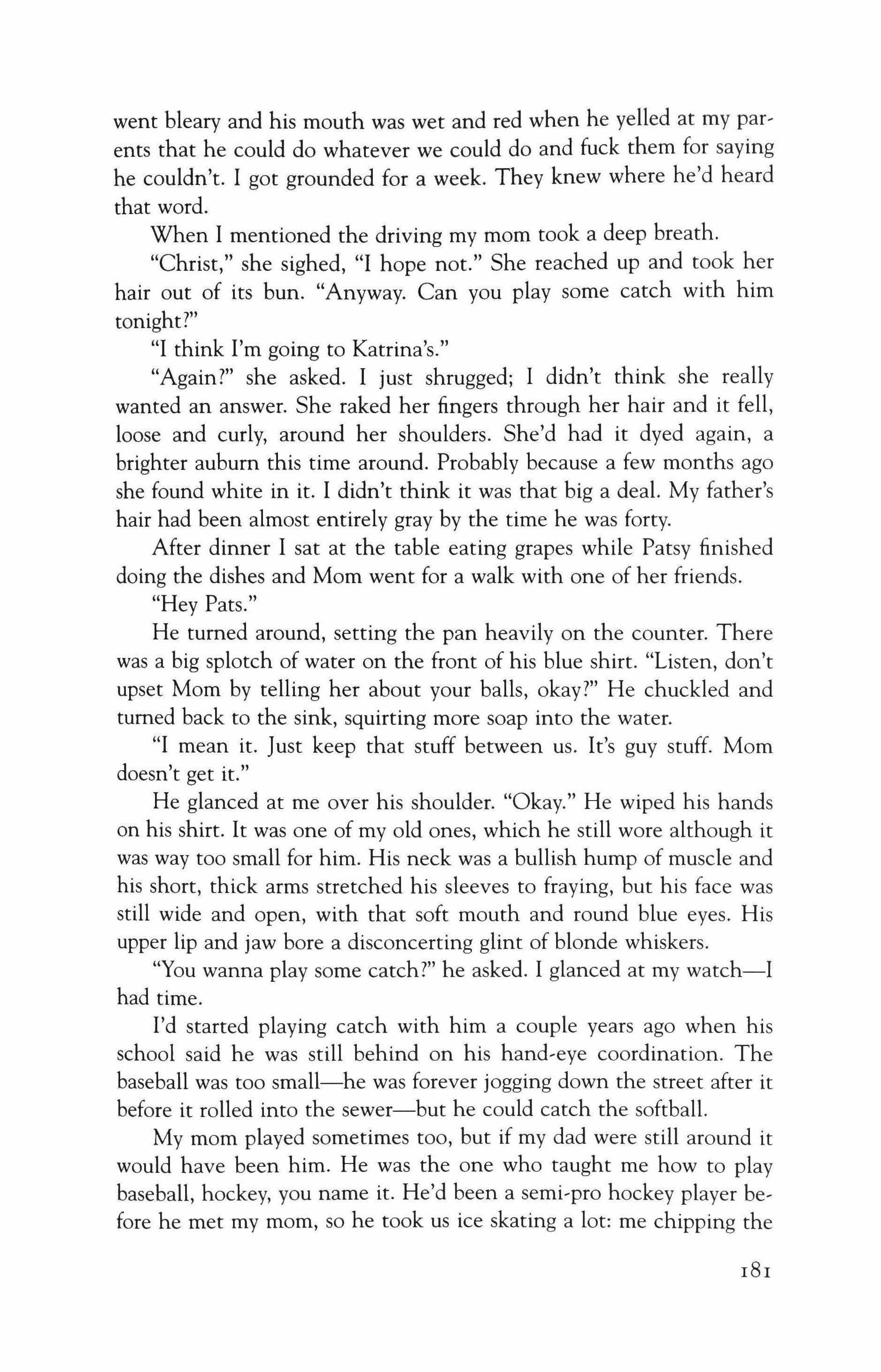
went bleary and his mouth was wet and red when he yelled at my parents that he could do whatever we could do and fuck them for saying he couldn't. I got grounded for a week. They knew where he'd heard that word.
When I mentioned the driving my mom took a deep breath. "Christ," she sighed, "I hope not." She reached up and took her hair out of its bun. "Anyway. Can you play some catch with him tonight?"
"I think I'm going to Katrina's."
"Again?" she asked. I just shrugged; I didn't think she really wanted an answer. She raked her fingers through her hair and it fell, loose and curly, around her shoulders. She'd had it dyed again, a brighter auburn this time around. Probably because a few months ago she found white in it. I didn't think it was that big a deal. My father's hair had been almost entirely gray by the time he was forty.
After dinner I sat at the table eating grapes while Patsy finished doing the dishes and Mom went for a walk with one of her friends.
"Hey Pats."
He turned around, setting the pan heavily on the counter. There was a big splotch of water on the front of his blue shirt. "Listen, don't upset Mom by telling her about your balls, okay?" He chuckled and turned back to the sink, squirting more soap into the water.
"I mean it. Just keep that stuff between us. It's guy stuff. Mom doesn't get it."
He glanced at me over his shoulder. "Okay." He wiped his hands on his shirt. It was one of my old ones, which he still wore although it was way too small for him. His neck was a bullish hump of muscle and his short, thick arms stretched his sleeves to fraying, but his face was still wide and open, with that soft mouth and round blue eyes. His upper lip and jaw bore a disconcerting glint of blonde whiskers.
"You wanna play some catch?" he asked. I glanced at my watch-I had time.
I'd started playing catch with him a couple years ago when his school said he was still behind on his hand-eye coordination. The baseball was too small-he was forever jogging down the street after it before it rolled into the sewer-but he could catch the softball.
My mom played sometimes too, but if my dad were still around it would have been him. He was the one who taught me how to play baseball, hockey, you name it. He'd been a semi-pro hockey player before he met my mom, so he took us ice skating a lot: me chipping the

ice with the toes of my skates and holding out my arms for balance while my dad zipped-backwards-in neat loops around me, his hands clasped behind his back, a thoughtful look on his face like he was admiring the ceiling. He managed to make it look like the two halves of his body were doing something totally different. Sometimes he whistled, which usually got me to laugh in spite of myself. Patsy thought it was hilarious, but with him my dad usually slowed after a couple turns and put a hand on Patsy's shoulder. Then they'd glide, as slow as a couple old ladies, around the edge of the rink.
Dad told me once that when he came home from the hospital he told me two things: that I had a baby brother ("which is happy"), but that he would be different ("which is sad"). I have no idea what I must have made of this. "Different" to a little kid could be anything: maybe he was an odd color, maybe he was missing an arm or a foot. This was back when people still used the term "Mongoloid," like some kind of alien species, and even as a kid I could tell from the sound of it that it was not a good thing. To me Down's sounded nicer. When I was little it reminded me of water slides.
I used to look at his chubby, slightly foreshortened arms, and I couldn't help but be relieved not to have them. I was-am-good at sports. I used to like how grimy and clunky-knuckled my hands became when I was about ten or eleven, the way they looked gripping a scuffed baseball. But at the age when I had gotten skinny and fast, Patsy's arms and legs were still smooth and round, his words still a little thick inside his mouth. And Dad didn't even care that Patsy's hands held a baseball bat as tenderly as if it were a stuffed animal, or that his pitches dribbled to a halt a few feet in front of him. He'd kneel next to Patsy after a couple terrible swings, uncurl Patsy's hands from the bat and kiss his palms.
Katrina showed up while Patsy and I were finishing a game of catch. We stepped to the side of the road as she drove up in her old green Toyota with its wrinkled fender. She parked at the bottom of the driveway and came walking toward us, pushing her black hair away from her face. "Hey Patrick," she called. I looked over and caught Patsy gazing at her, rapt. When she met Pats she shook his hand, which he liked. People don't show him any manners. They talk extremely slow or too fast and a pitch higher than normal, like he's an excitable dog. I admit, especially since he's built himself up, that it's disconcerting at first, a heavily-muscled guy who gets excited over board games. Katrina was unfazed. She asked him what he preferred to
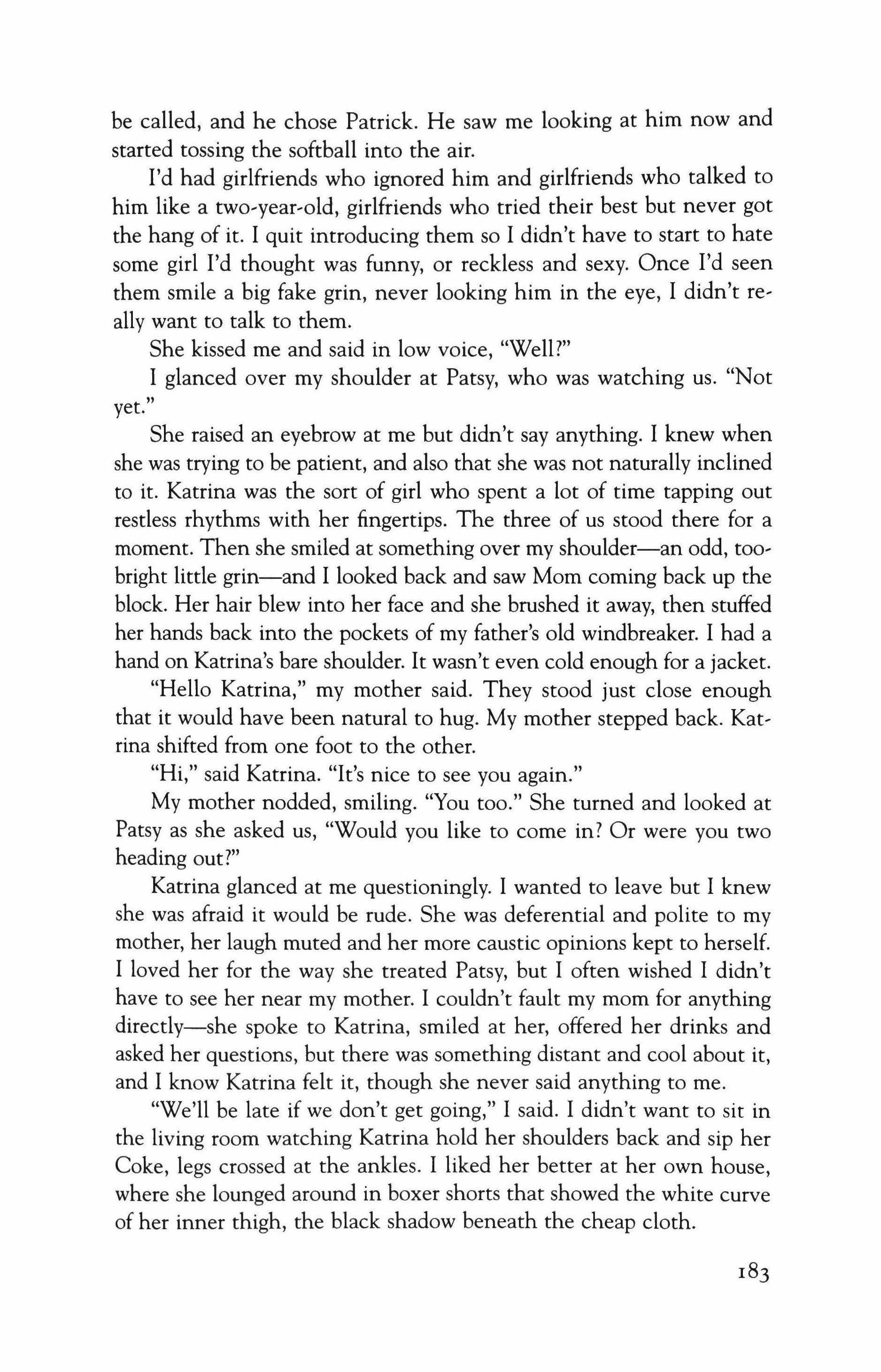
be called, and he chose Patrick. He saw me looking at him now and started tossing the softball into the air.
I'd had girlfriends who ignored him and girlfriends who talked to him like a two-year-old, girlfriends who tried their best but never got the hang of it. I quit introducing them so I didn't have to start to hate some girl I'd thought was funny, or reckless and sexy. Once I'd seen them smile a big fake grin, never looking him in the eye, I didn't re, ally want to talk to them.
She kissed me and said in low voice, "Well?"
I glanced over my shoulder at Patsy, who was watching us. "Not yet."
She raised an eyebrow at me but didn't say anything. I knew when she was trying to be patient, and also that she was not naturally inclined to it. Katrina was the sort of girl who spent a lot of time tapping out restless rhythms with her fingertips. The three of us stood there for a moment. Then she smiled at something over my shoulder-an odd, too' bright little grin-and I looked back and saw Mom coming back up the block. Her hair blew into her face and she brushed it away, then stuffed her hands back into the pockets of my father's old windbreaker. I had a hand on Katrina's bare shoulder. It wasn't even cold enough for a jacket.
"Hello Katrina," my mother said. They stood just close enough that it would have been natural to hug. My mother stepped back. Kat, rina shifted from one foot to the other.
"Hi," said Katrina. "It's nice to see you again."
My mother nodded, smiling. "You too." She turned and looked at Patsy as she asked us, "Would you like to come in? Or were you two heading out?"
Katrina glanced at me questioningly. I wanted to leave but I knew she was afraid it would be rude. She was deferential and polite to my mother, her laugh muted and her more caustic opinions kept to herself. I loved her for the way she treated Patsy, but I often wished I didn't have to see her near my mother. I couldn't fault my mom for anything directly-she spoke to Katrina, smiled at her, offered her drinks and asked her questions, but there was something distant and cool about it, and I know Katrina felt it, though she never said anything to me.
"We'll be late if we don't get going," I said. I didn't want to sit in the living room watching Katrina hold her shoulders back and sip her Coke, legs crossed at the ankles. I liked her better at her own house, where she lounged around in boxer shorts that showed the white curve of her inner thigh, the black shadow beneath the cheap cloth.
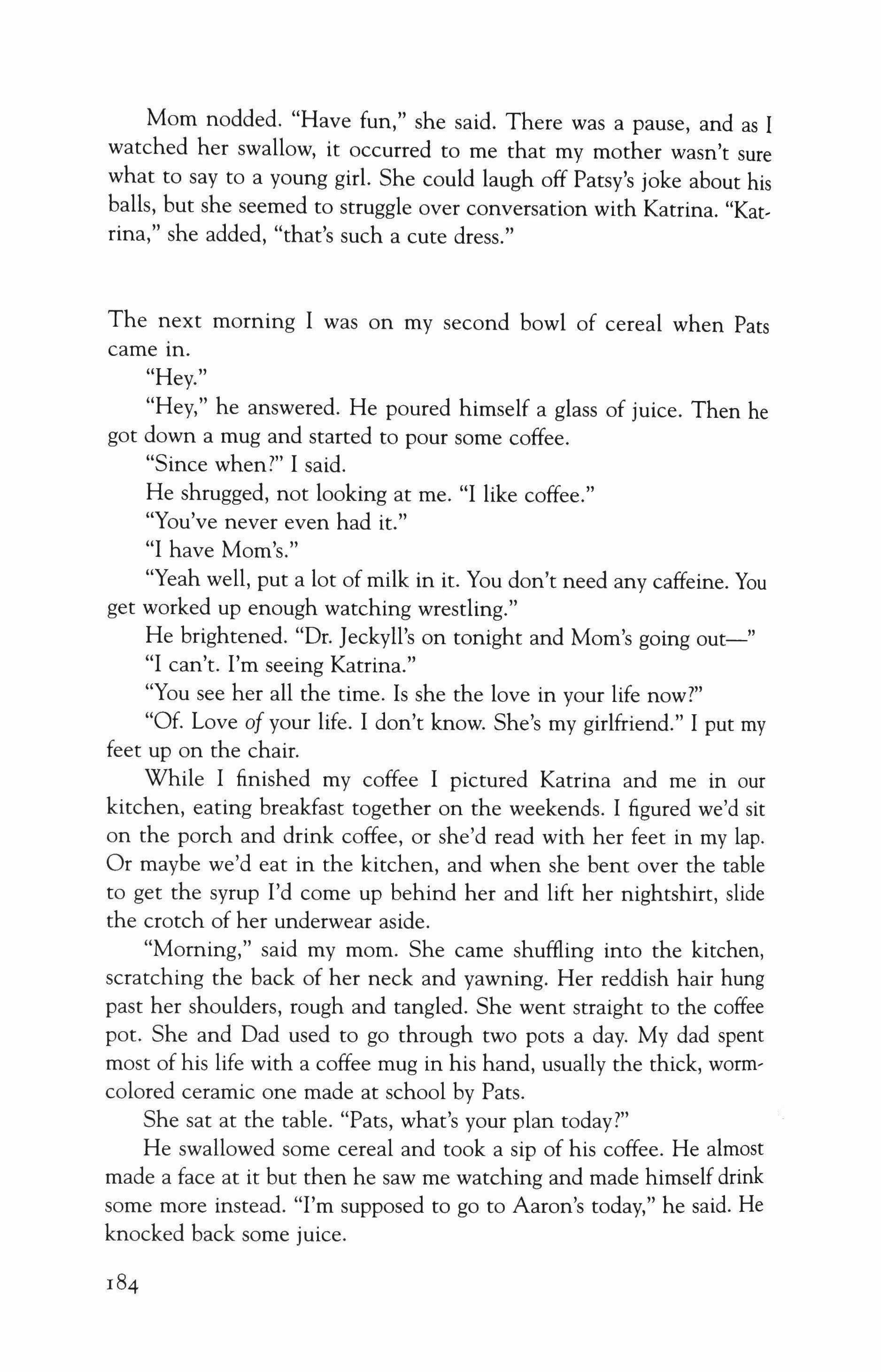
Mom nodded. "Have fun," she said. There was a pause, and as I watched her swallow, it occurred to me that my mother wasn't sure what to say to a young girl. She could laugh off Patsy's joke about his balls, but she seemed to struggle over conversation with Katrina. "Katrina," she added, "that's such a cute dress."
The next morning I was on my second bowl of cereal when Pats came in.
"Hey," he answered. He poured himself a glass of juice. Then he got down a mug and started to pour some coffee.
"Since when?" I said.
He shrugged, not looking at me. "I like coffee."
"You've never even had it."
"I have Mom's."
"Yeah well, put a lot of milk in it. You don't need any caffeine. You get worked up enough watching wrestling."
He brightened. "Dr. [eckyll's on tonight and Mom's going out-" "I can't. I'm seeing Katrina."
"You see her all the time. Is she the love in your life now!"
"Of. Love of your life. I don't know. She's my girlfriend." I put my feet up on the chair.
While I finished my coffee I pictured Katrina and me in our kitchen, eating breakfast together on the weekends. I figured we'd sit on the porch and drink coffee, or she'd read with her feet in my lap. Or maybe we'd eat in the kitchen, and when she bent over the table to get the syrup I'd come up behind her and lift her nightshirt, slide the crotch of her underwear aside.
"Morning," said my mom. She came shuffling into the kitchen, scratching the back of her neck and yawning. Her reddish hair hung past her shoulders, rough and tangled. She went straight to the coffee pot. She and Dad used to go through two pots a day. My dad spent most of his life with a coffee mug in his hand, usually the thick, wormcolored ceramic one made at school by Pats.
She sat at the table. "Pats, what's your plan today?"
He swallowed some cereal and took a sip of his coffee. He almost made a face at it but then he saw me watching and made himself drink some more instead. "I'm supposed to go to Aaron's today," he said. He knocked back some juice.
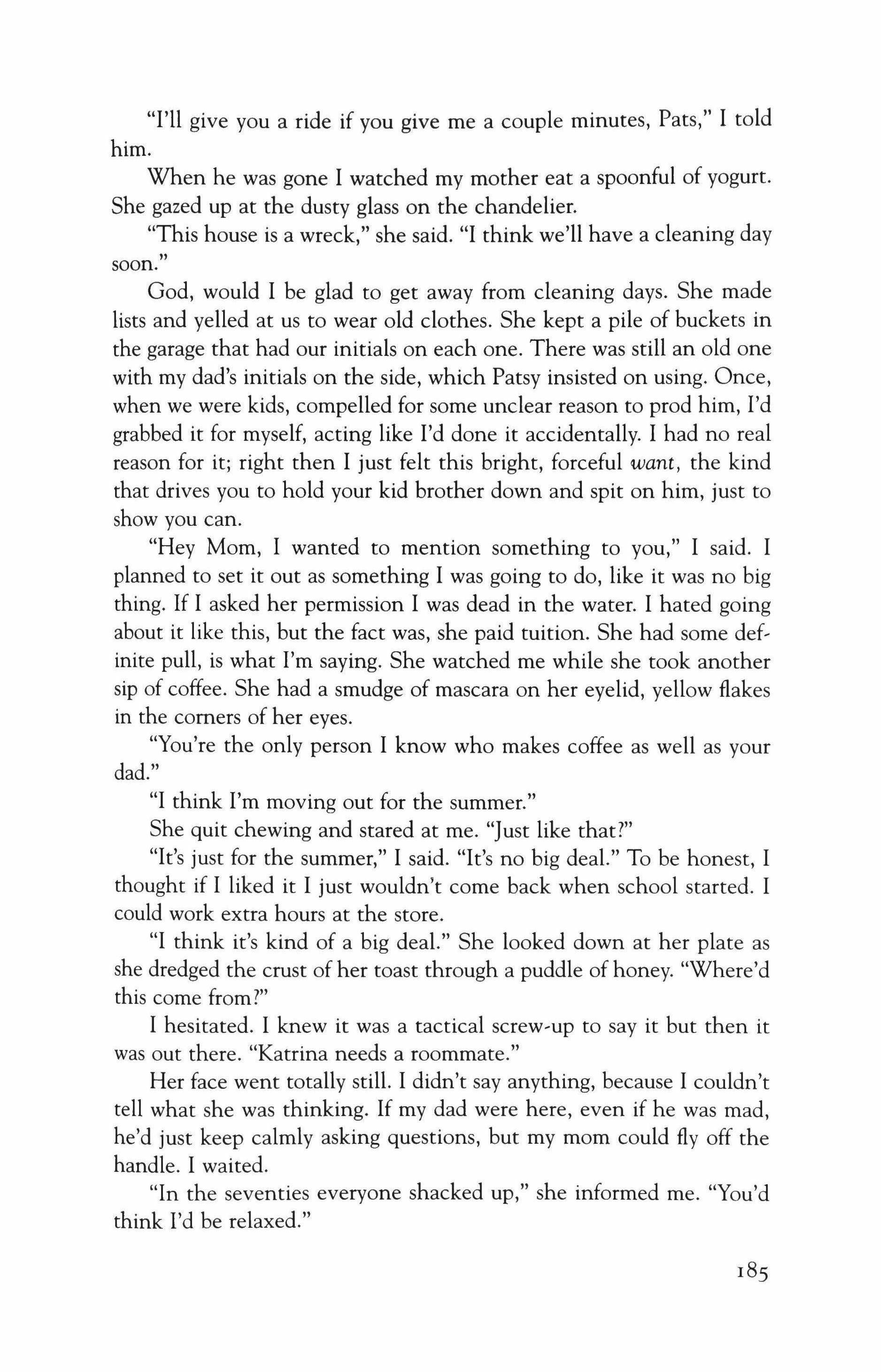
"I'll give you a ride if you give me a couple minutes, Pats," I told him.
When he was gone I watched my mother eat a spoonful of yogurt. She gazed up at the dusty glass on the chandelier.
"This house is a wreck," she said. "I think we'll have a cleaning day soon."
God, would I be glad to get away from cleaning days. She made lists and yelled at us to wear old clothes. She kept a pile of buckets in the garage that had our initials on each one. There was still an old one with my dad's initials on the side, which Patsy insisted on using. Once, when we were kids, compelled for some unclear reason to prod him, I'd grabbed it for myself, acting like I'd done it accidentally. I had no real reason for it; right then I just felt this bright, forceful want, the kind that drives you to hold your kid brother down and spit on him, just to show you can.
"Hey Mom, I wanted to mention something to you," I said. I planned to set it out as something I was going to do, like it was no big thing. If I asked her permission I was dead in the water. I hated going about it like this, but the fact was, she paid tuition. She had some definite pull, is what I'm saying. She watched me while she took another sip of coffee. She had a smudge of mascara on her eyelid, yellow flakes in the comers of her eyes.
"You're the only person I know who makes coffee as well as your dad."
"I think I'm moving out for the summer."
She quit chewing and stared at me. "Just like that?"
"It's just for the summer," I said. "It's no big deal." To be honest, I thought if I liked it I just wouldn't come back when school started. I could work extra hours at the store.
"I think it's kind of a big deal." She looked down at her plate as she dredged the crust of her toast through a puddle of honey. "Where'd this come from?"
I hesitated. I knew it was a tactical screw-up to say it but then it was out there. "Katrina needs a roommate."
Her face went totally still. I didn't say anything, because I couldn't tell what she was thinking. If my dad were here, even if he was mad, he'd just keep calmly asking questions, but my mom could fly off the handle. I waited.
"In the seventies everyone shacked up," she informed me. "You'd think I'd be relaxed."
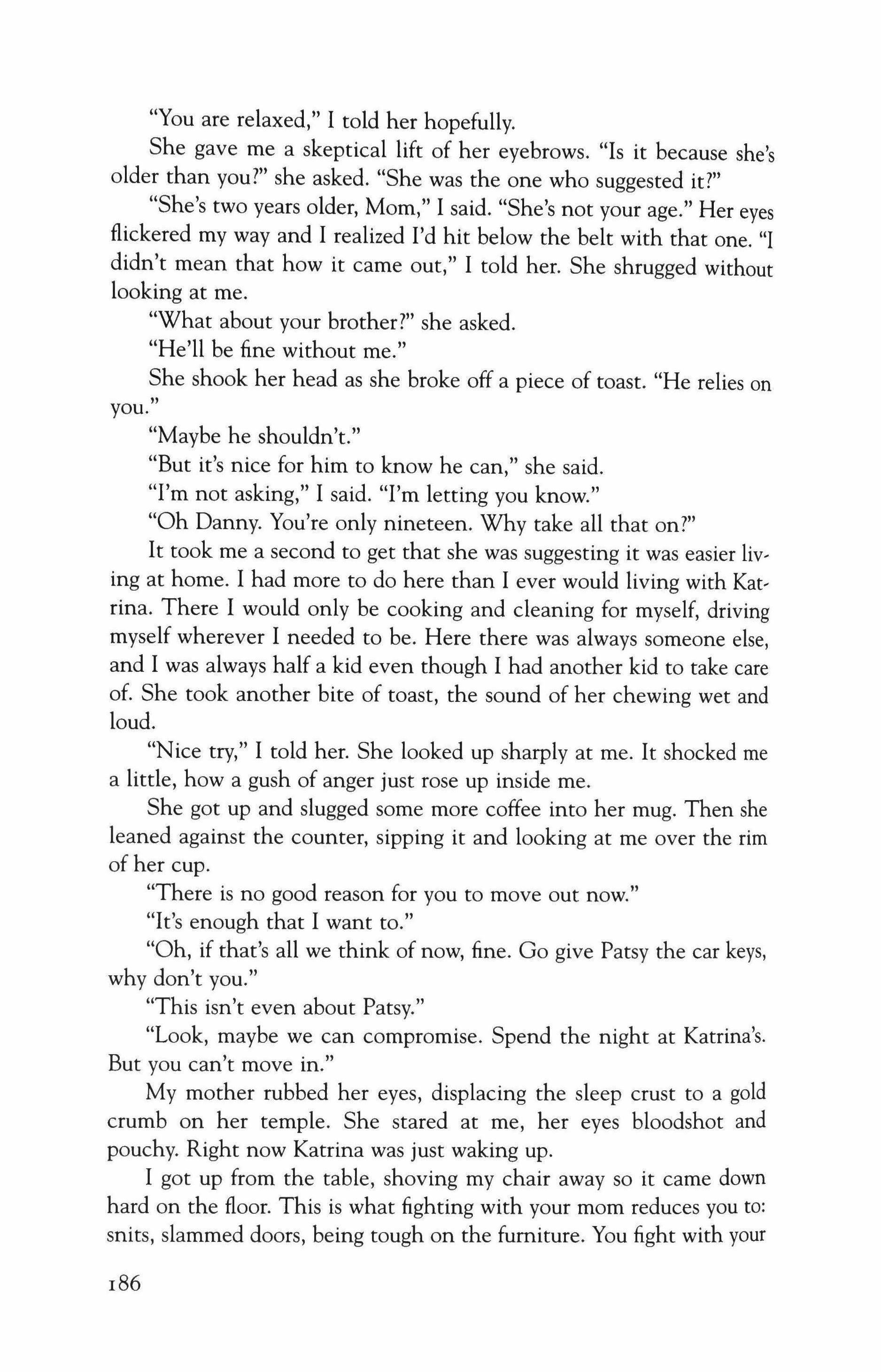
"You are relaxed," I told her hopefully. She gave me a skeptical lift of her eyebrows. "Is it because she's older than you?" she asked. "She was the one who suggested it?"
"She's two years older, Mom," I said. "She's not your age." Her eyes flickered my way and I realized I'd hit below the belt with that one. "I didn't mean that how it came out," I told her. She shrugged without looking at me.
"What about your brother?" she asked.
"He'll be fine without me."
She shook her head as she broke off a piece of toast. "He relies on you."
"Maybe he shouldn't."
"But it's nice for him to know he can," she said.
"I'm not asking," I said. "I'm letting you know."
"Oh Danny. You're only nineteen. Why take all that on?"
It took me a second to get that she was suggesting it was easier living at home. I had more to do here than I ever would living with Katrina. There I would only be cooking and cleaning for myself, driving myself wherever I needed to be. Here there was always someone else, and I was always half a kid even though I had another kid to take care of. She took another bite of toast, the sound of her chewing wet and loud.
"Nice try," I told her. She looked up sharply at me. It shocked me a little, how a gush of anger just rose up inside me.
She got up and slugged some more coffee into her mug. Then she leaned against the counter, sipping it and looking at me over the rim of her cup.
"There is no good reason for you to move out now."
"It's enough that I want to."
"Oh, if that's all we think of now, fine. Go give Patsy the car keys, why don't you."
"This isn't even about Patsy."
"Look, maybe we can compromise. Spend the night at Katrina's. But you can't move in."
My mother rubbed her eyes, displacing the sleep crust to a gold crumb on her temple. She stared at me, her eyes bloodshot and pouchy. Right now Katrina was just waking up.
I got up from the table, shoving my chair away so it came down hard on the floor. This is what fighting with your mom reduces you to: snits, slammed doors, being tough on the furniture. You fight with your

brother, you knock each other around. You fight with your dad and you can yell in each other's faces. But what the hell was I supposed to do with my mom sitting there in her robe, six inches shorter than me and thirty years older? I pushed open the kitchen door a lot harder than I needed to, letting it hit the wall hard enough to leave a mark, and let me tell you, it felt good.
"Stop it," she said. Her voice was low. Don't be crying, I thought, and I looked back. She had sat back down at the table. She wasn't crying at all. She looked furious. When my father died she didn't cry for days. Instead she broke glasses and slammed doors so hard it made my brother shudder. "People in this family don't exactly wear out their welcome, do they," she said, and she tore her toast in pieces.
I ended up going over to Tim's that day and playing basketball for two or three hours. By late afternoon I'd worked off enough energy to calm down, and I called Katrina.
"Hey," she said. She was breathing hard. "I just ran in." She lowered her voice. "Ellen's starting to gather up her stuff. She brought home a bunch of boxes from the liquor store."
I didn't answer for a moment. Her voice was back to normal, a note of reserve in it, when she went on, "Did you talk to your family?"
"Not yet," I lied. I wasn't sure why I told her that. "I've been at Tim's all day. You know."
There was a pause. "Okay," she said. I could tell she had decided not to say something else. We didn't say anything for a minute.
"I have to run home and shower," I told her. "Are we still going out tonight?"
"I guess," she said. "Why don't you let me drive and you can have a couple drinks. What time should I come get you?"
Back home, Mom had left a message saying she was having dinner with a friend, so Patsy and I ate a couple pizzas and were sprawled out in the living room when Katrina rang the doorbell.
"Should we wait till she gets back?" Katrina murmured, glancing at Patsy. He was sitting in front of the TV flipping through the channels. I knew he was going to stop at wrestling.
"He'll be fine," I told her, and we called goodbye and left. We went to a bar that night, where a lot of people I hadn't seen in
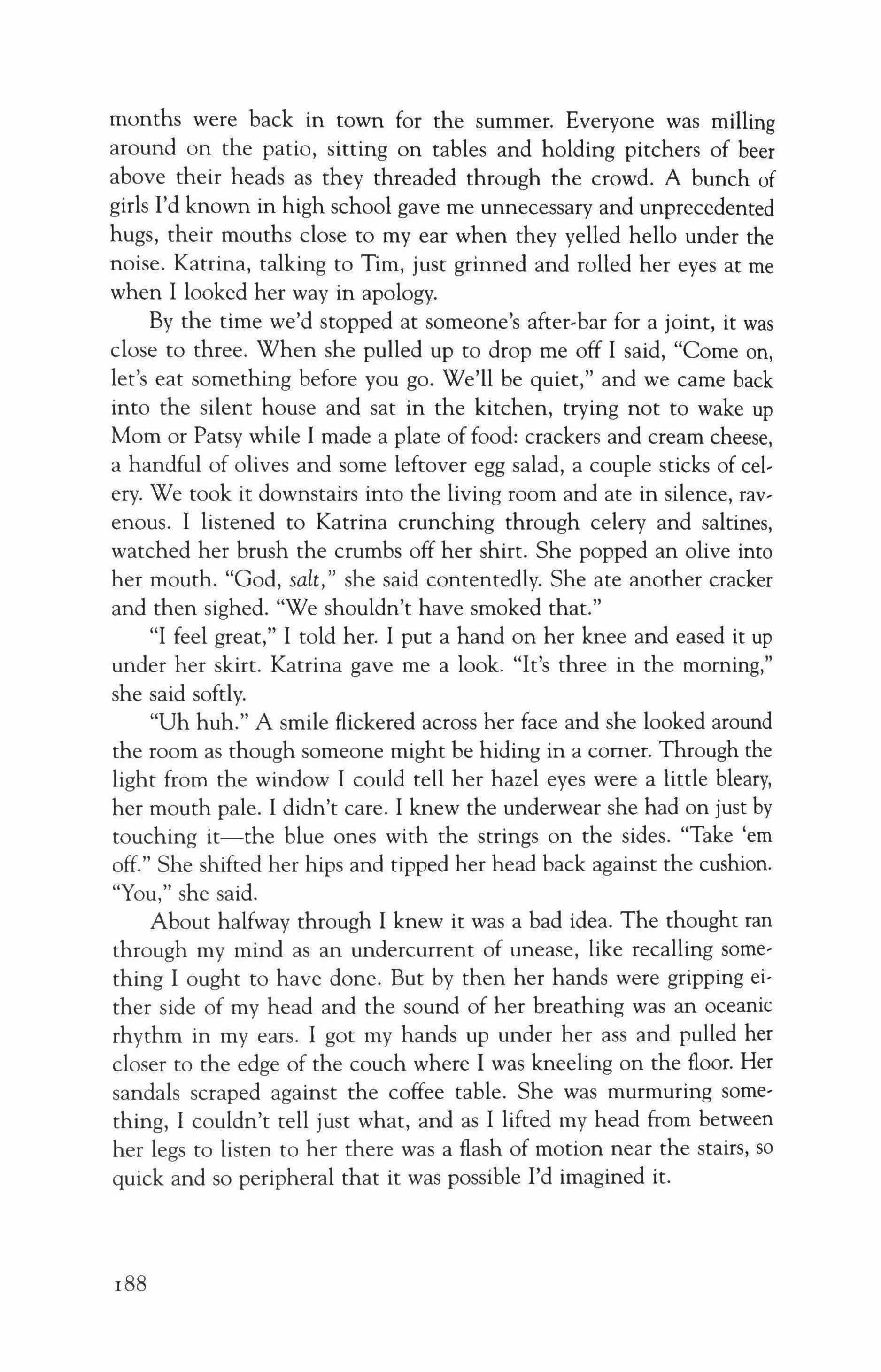
months were back in town for the summer. Everyone was milling around on the patio, sitting on tables and holding pitchers of beer above their heads as they threaded through the crowd. A bunch of girls I'd known in high school gave me unnecessary and unprecedented hugs, their mouths close to my ear when they yelled hello under the noise. Katrina, talking to Tim, just grinned and rolled her eyes at me when I looked her way in apology.
By the time we'd stopped at someone's after-bar for a joint, it was close to three. When she pulled up to drop me off I said, "Come on, let's eat something before you go. We'll be quiet," and we came back into the silent house and sat in the kitchen, trying not to wake up Mom or Patsy while I made a plate of food: crackers and cream cheese, a handful of olives and some leftover egg salad, a couple sticks of celery. We took it downstairs into the living room and ate in silence, ravenous. I listened to Katrina crunching through celery and saltines, watched her brush the crumbs off her shirt. She popped an olive into her mouth. "God, salt," she said contentedly. She ate another cracker and then sighed. "We shouldn't have smoked that."
"I feel great," I told her. I put a hand on her knee and eased it up under her skirt. Katrina gave me a look. "It's three in the morning," she said softly.
"Uh huh." A smile flickered across her face and she looked around the room as though someone might be hiding in a comer. Through the light from the window I could tell her hazel eyes were a little bleary, her mouth pale. I didn't care. I knew the underwear she had on just by touching it-the blue ones with the strings on the sides. "Take 'em off." She shifted her hips and tipped her head back against the cushion. "You," she said.
About halfway through I knew it was a bad idea. The thought ran through my mind as an undercurrent of unease, like recalling something I ought to have done. But by then her hands were gripping either side of my head and the sound of her breathing was an oceanic rhythm in my ears. I got my hands up under her ass and pulled her closer to the edge of the couch where I was kneeling on the floor. Her sandals scraped against the coffee table. She was murmuring something, I couldn't tell just what, and as I lifted my head from between her legs to listen to her there was a flash of motion near the stairs, so quick and so peripheral that it was possible I'd imagined it.

In the morning I felt sore and unrested. My neck was stiff and I stood up and stretched, rolling my head back and forth to loosen it up. Then I went downstairs.
I was slicing a banana into my cereal when my mother came in. I didn't look up at her, but I felt my face reddening. When I turned around I saw that she wasn't in her robe this morning, but already dressed in jeans and a black 'Tshirt. Her hips looked wider, her belly rounded beneath the shirt. It was an odd outfit for her, somehow. Usually she wore khakis with shiny loafers and sprightly patterned sweaters. It had always been a slight shock when she and my father went to parties and she'd put on something red and go striding around the house in high heels like she wore them every day. My father liked to suggest she wear them for all occasions, calling up the stairs, "Junie, since we're having burgers tonight-why don't you put on those black heels?"
I sat down at the kitchen table and she stood in the doorway. I took a bite and chewed slowly, buying time. I was trying to seem relaxed but my heart was hammering. I stared into my cereal bowl, transfixed by the image I knew she'd seen: my bare shoulders and my head moving rhythmically between Katrina's widespread legs, her feet braced against the table and her skirt crumpled around her waist and the shining puddle of fabric on the floor beside me-her underwear and the thin silk top I'd pulled over her head.
She was still standing, her arms crossed over her breasts. Her eyes were neatly made up, her mouth lipsticked. She'd pulled her hair back in a ponytail. I felt at a disadvantage-unshaven and cowlicked, my Tshirt wrinkled from being clutched in the cushions. I waited.
There was a long moment when there was no sound but me chewing. Then she said, "I'm doing some grocery shopping. Can you take Patsy to the pool?" I nodded and she left.
I sat there for a moment, trying to figure out if I had gotten off easy. Maybe she just wasn't going to talk about it. It would be like her to make me sweat it out awhile.
I didn't feel like finishing my breakfast. I dumped it into the sink and went to wake up Patsy.
On the way to the pool he was quiet. I didn't mind, I was brooding anyway, wondering when my mom was going to give me a hard time for last night, how I was going to hold Katrina off for another day or so while I figured out what I was doing.
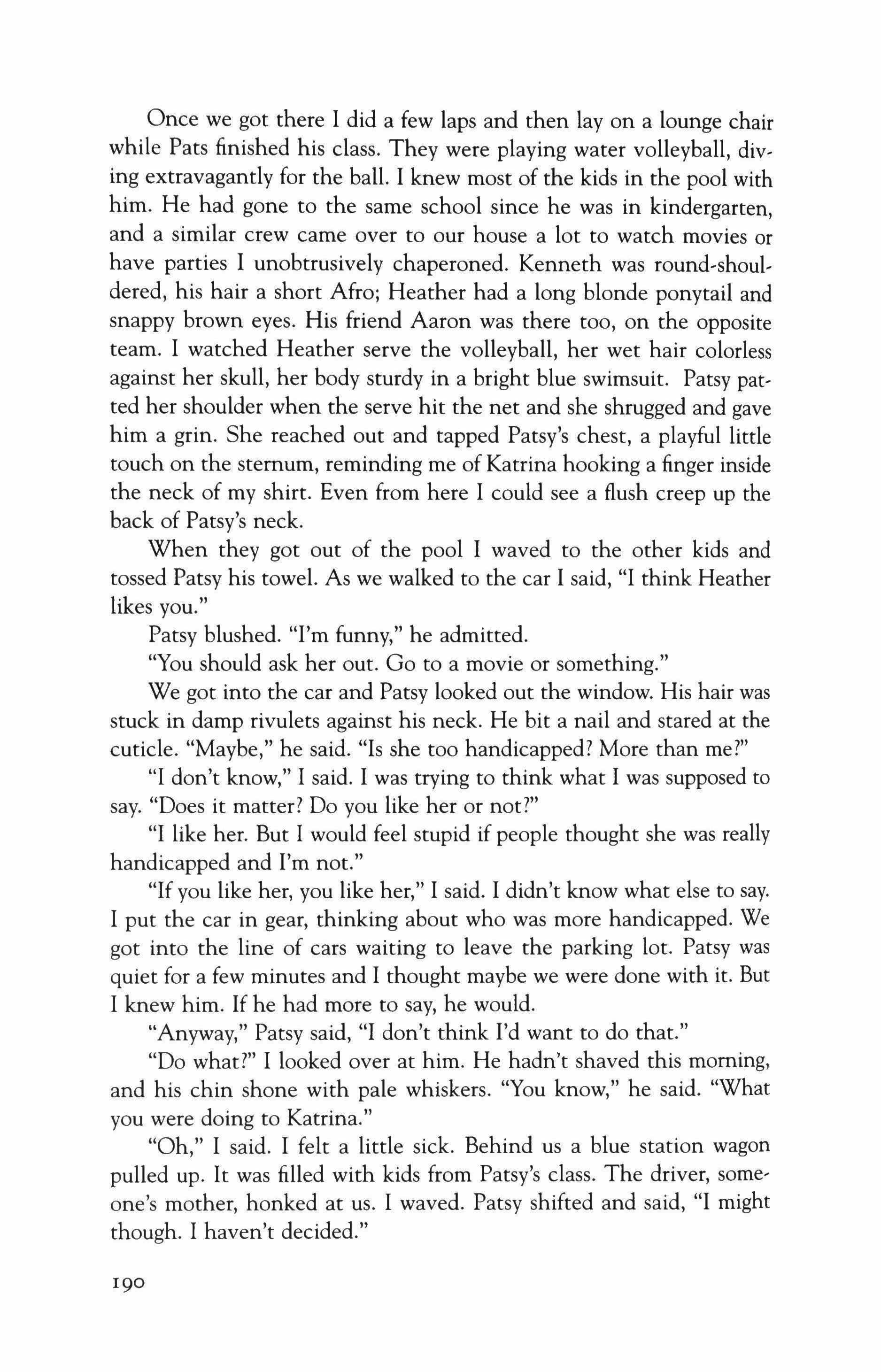
Once we got there I did a few laps and then lay on a lounge chair while Pats finished his class. They were playing water volleyball, diving extravagantly for the ball. I knew most of the kids in the pool with him. He had gone to the same school since he was in kindergarten, and a similar crew came over to our house a lot to watch movies or have parties I unobtrusively chaperoned. Kenneth was round-shouldered, his hair a short Afro; Heather had a long blonde ponytail and snappy brown eyes. His friend Aaron was there too, on the opposite team. I watched Heather serve the volleyball, her wet hair colorless against her skull, her body sturdy in a bright blue swimsuit. Patsy patted her shoulder when the serve hit the net and she shrugged and gave him a grin. She reached out and tapped Patsy's chest, a playful little touch on the sternum, reminding me of Katrina hooking a finger inside the neck of my shirt. Even from here I could see a flush creep up the back of Patsy's neck.
When they got out of the pool I waved to the other kids and tossed Patsy his towel. As we walked to the car I said, "I think Heather likes you."
Patsy blushed. "I'm funny," he admitted.
"You should ask her out. Go to a movie or something."
We got into the car and Patsy looked out the window. His hair was stuck in damp rivulets against his neck. He bit a nail and stared at the cuticle. "Maybe," he said. "Is she too handicapped? More than me?"
"I don't know," I said. I was trying to think what I was supposed to say. "Does it matter? Do you like her or not?"
"I like her. But I would feel stupid if people thought she was really handicapped and I'm not."
"If you like her, you like her," I said. I didn't know what else to say. I put the car in gear, thinking about who was more handicapped. We got into the line of cars waiting to leave the parking lot. Patsy was quiet for a few minutes and I thought maybe we were done with it. But I knew him. If he had more to say, he would.
"Anyway," Patsy said, "I don't think I'd want to do that."
"Do what?" I looked over at him. He hadn't shaved this morning, and his chin shone with pale whiskers. "You know," he said. "What you were doing to Katrina."
"Oh," I said. I felt a little sick. Behind us a blue station wagon pulled up. It was filled with kids from Patsy's class. The driver, someone's mother, honked at us. I waved. Patsy shifted and said, "I might though. I haven't decided."
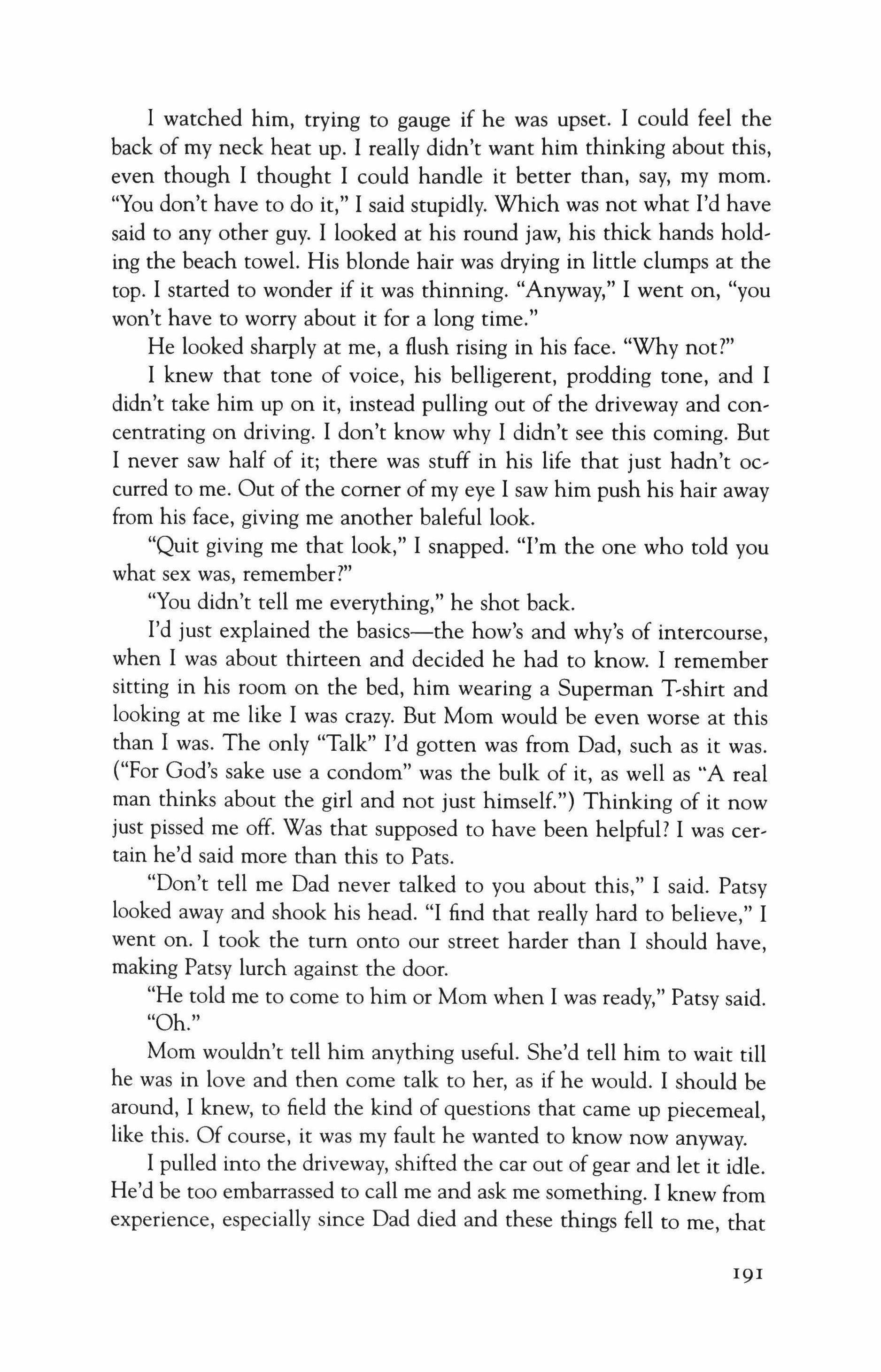
I watched him, trying to gauge if he was upset. 1 could feel the back of my neck heat up. 1 really didn't want him thinking about this, even though 1 thought I could handle it better than, say, my mom. "You don't have to do it," 1 said stupidly. Which was not what I'd have said to any other guy. 1 looked at his round jaw, his thick hands holding the beach towel. His blonde hair was drying in little clumps at the top. I started to wonder if it was thinning. "Anyway," 1 went on, "you won't have to worry about it for a long time."
He looked sharply at me, a flush rising in his face. "Why not?"
I knew that tone of voice, his belligerent, prodding tone, and I didn't take him up on it, instead pulling out of the driveway and concentrating on driving. I don't know why I didn't see this coming. But 1 never saw half of it; there was stuff in his life that just hadn't occurred to me. Out of the comer of my eye I saw him push his hair away from his face, giving me another baleful look.
"Quit giving me that look," I snapped. "I'm the one who told you what sex was, remember?"
"You didn't tell me everything," he shot back. I'd just explained the basics-the how's and why's of intercourse, when I was about thirteen and decided he had to know. I remember sitting in his room on the bed, him wearing a Superman T-shirt and looking at me like I was crazy. But Mom would be even worse at this than 1 was. The only "Talk" I'd gotten was from Dad, such as it was. ("For God's sake use a condom" was the bulk of it, as well as "A real man thinks about the girl and not just himself.") Thinking of it now just pissed me off. Was that supposed to have been helpful? 1 was certain he'd said more than this to Pats.
"Don't tell me Dad never talked to you about this," I said. Patsy looked away and shook his head. "I find that really hard to believe," 1 went on. I took the tum onto our street harder than I should have, making Patsy lurch against the door.
"He told me to come to him or Mom when I was ready," Patsy said. "Oh."
Mom wouldn't tell him anything useful. She'd tell him to wait till he was in love and then come talk to her, as if he would. I should be around, I knew, to field the kind of questions that came up piecemeal, like this. Of course, it was my fault he wanted to know now anyway.
I pulled into the driveway, shifted the car out of gear and let it idle. He'd be too embarrassed to call me and ask me something. I knew from experience, especially since Dad died and these things fell to me, that

he preferred to catch me in the morning or late at night, relaxed and unawares. He had a tendency to ask me things when I had a mouth full of cereal or sandwich, I think so I had to take a moment before answering. Sometimes after Mom had gone to bed, when I knew he was thinking about something, I would hand him a beer if I was having one, and after a few sips he would say something. I did these things largely on impulse, when I happened to be home and was feeling receptive and that was just how it worked. We didn't schedule a date at the soda shop.
I fiddled with the radio button and waited. When I took my hand off the button Patsy reached forward and changed it back to the station it was on before.
I wasn't going to move out and still show up for momentous little drives to find out what was on his mind. I just knew I wouldn't. I'd move into Katrina's house, with its saggy porch and still air and her sleeping in her boxer shorts, and I'd stay away. It wasn't nice, but it was what I wanted.
"Well, ask me something now," I told Patsy. "Here's your chance." Patsy looked at me and looked away, working the beach towel in his hands. He didn't answer me but I felt content to wait, at least for a few minutes, before I got out of the car. I pushed the lighter in and waited for it to pop out. When it did I would tum off the car and go inside. We waited, and in the silence I thought how easily this could all have been different. A faster ambulance, a more agile doctor. Today I could have been in the passenger seat while my dad drove us home, Patsy sitting in the back. I'd be propping my feet on the dashboard because my dad never cared about that sort of thing and I'd have the towel bunched over my lap and think about finding a place to be alone with my girlfriend. Even from here I'd smell the chlorine on Patsy's damp white skin. I'd be thinking about going to work that afternoon, going out to a bar afterward, not really looking at anything or worrying about much. I'd be glancing at the other cars on the road, at my dad's fingers punching at the buttons on the radio, at the creases in the sunburned skin of my father's neck.
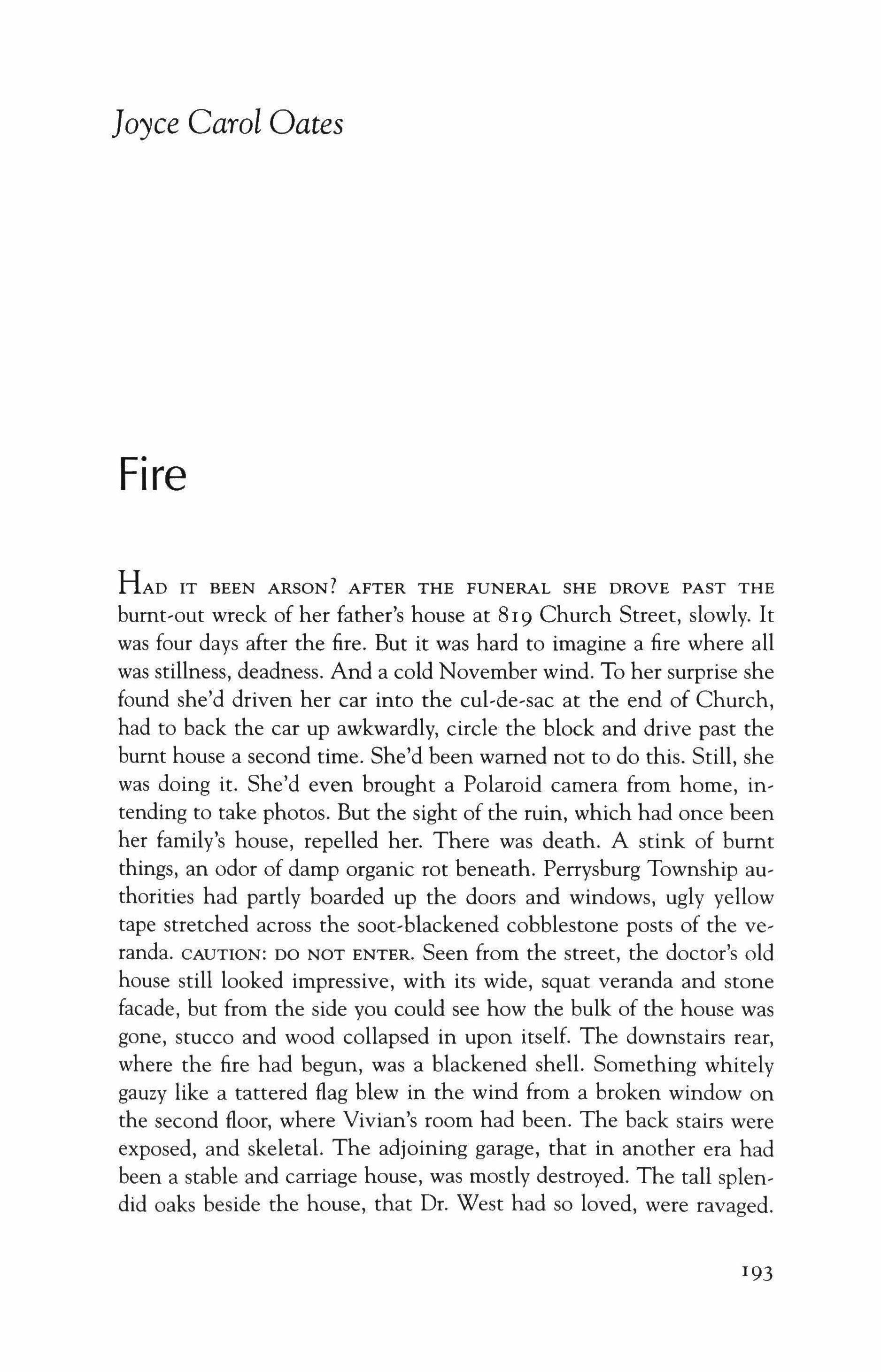
HAD IT BEEN ARSON? AFTER THE FUNERAL SHE DROVE PAST THE burnt-out wreck of her father's house at 819 Church Street, slowly. It was four days after the fire. But it was hard to imagine a fire where all was stillness, deadness. And a cold November wind. To her surprise she found she'd driven her car into the cul-de-sac at the end of Church, had to back the car up awkwardly, circle the block and drive past the burnt house a second time. She'd been warned not to do this. Still, she was doing it. She'd even brought a Polaroid camera from home, in' tending to take photos. But the sight of the ruin, which had once been her family's house, repelled her. There was death. A stink of burnt things, an odor of damp organic rot beneath. Perrysburg Township au, thorities had partly boarded up the doors and windows, ugly yellow tape stretched across the soot'blackened cobblestone posts of the veranda. CAUTION: DO NOT ENTER. Seen from the street, the doctor's old house still looked impressive, with its wide, squat veranda and stone facade, but from the side you could see how the bulk of the house was gone, stucco and wood collapsed in upon itself. The downstairs rear, where the fire had begun, was a blackened shell. Something whitely gauzy like a tattered flag blew in the wind from a broken window on the second floor, where Vivian's room had been. The back stairs were exposed, and skeletal. The adjoining garage, that in another era had been a stable and carriage house, was mostly destroyed. The tall splendid oaks beside the house, that Dr. West had so loved, were ravaged.
The eight-foot redwood fence at the front of the property, erected as a barrier against increased traffic and noise on Church Street, had been knocked down by firefighters and lay in sections. For much of a night the fire had "raged out of control" as the local papers had reported. "Thousands of gallons of water" had been dumped on the residence by Perrysburg firefighters. The cause of the fire was "under investigation" but "faulty" electrical wiring, commonplace in older homes in the city, was suspected. An elderly retired physician, Dr. Maynard West, 83, sale occupant of the house since his wife's death in 1994, had "lost" his life in the blaze.
Lost! The poignancy of the word struck Dr. West's daughter.
She wondered: How do you lose a life, where do you lose your life to, if your life is lost can it ever be found? If so, by whom? Or will it remain simply lost, in perpetuity? Vivian smiled, considering. Maybe there's a cyberspace of lost lives, lost souls. Like Hades, where bodiless wraiths drift about like stroke victims, baffled by the cruelty of their fate.
"Oh, shit." Another time, she'd unknowingly driven her car into the cul-de-sac and would have to tum it around. As if she didn't recognize these familiar surroundings. As if she hadn't lived in that house, on this street, for eighteen years; as if the old, lost neighborhood ofher childhood in Perrysburg, New York wasn't more real to her than where-wherever-she lived now.
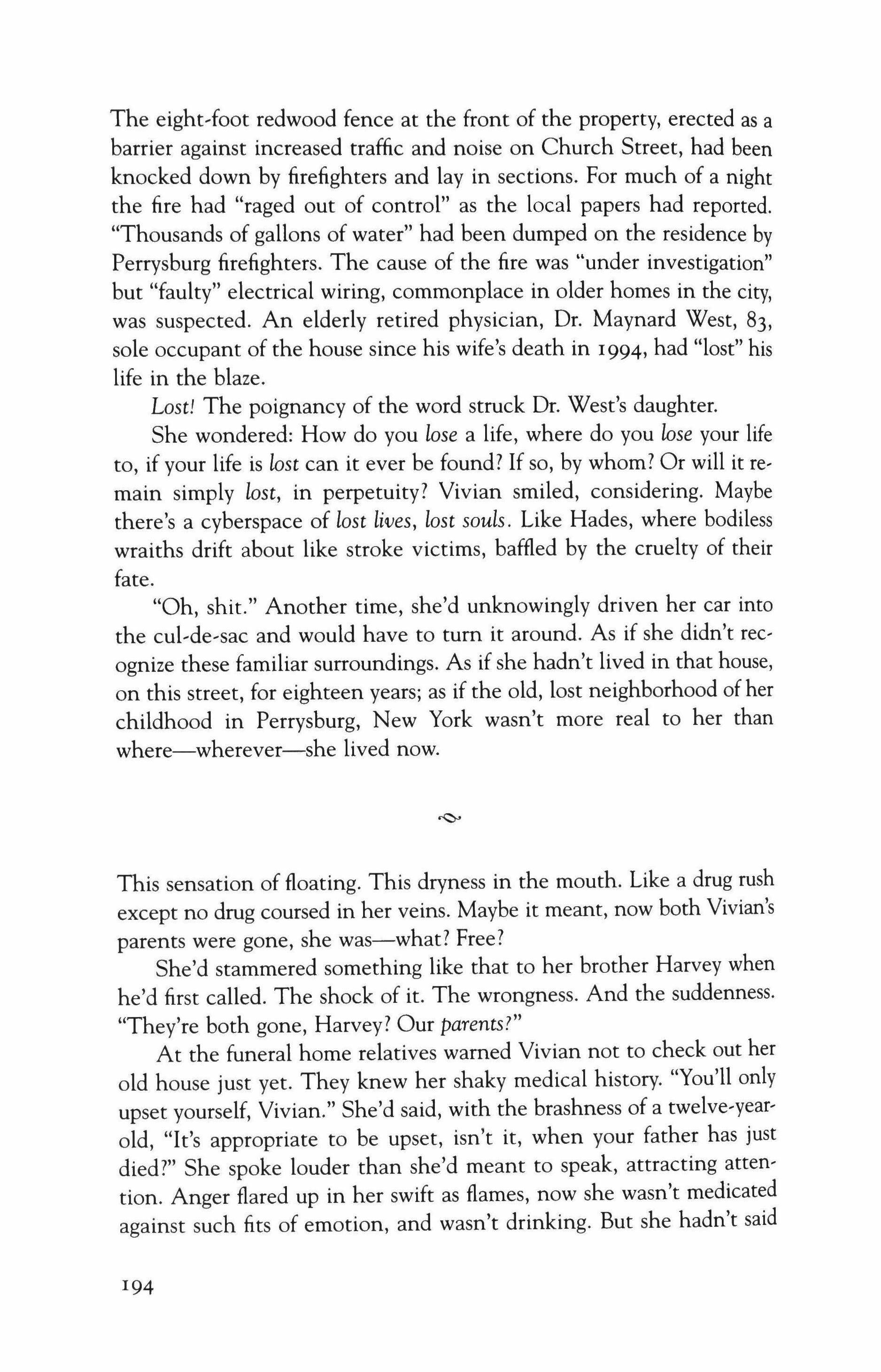
This sensation of floating. This dryness in the mouth. Like a drug rush except no drug coursed in her veins. Maybe it meant, now both Vivian's parents were gone, she was-what? Free?
She'd stammered something like that to her brother Harvey when he'd first called. The shock of it. The wrongness. And the suddenness. "They're both gone, Harvey? Our parents?"
At the funeral home relatives warned Vivian not to check out her old house just yet. They knew her shaky medical history. "You'll only upset yourself, Vivian." She'd said, with the brashness of a twelve-yearold, "It's appropriate to be upset, isn't it, when your father has just died?" She spoke louder than she'd meant to speak, attracting attention. Anger flared up in her swift as flames, now she wasn't medicated against such fits of emotion, and wasn't drinking. But she hadn't said

When your father has died a horrible death, burned to death. She'd stopped herself before uttering these words.
In fact he'd died, according to the coroner's report, of smoke inhalation which had precipitated cardiac arrest. He'd died in terror, maybe that was worse than being burned alive, unknowing in his bed.
In the Perrysburg Journal, it was grimly noted that the "badly charred remains" of Dr. West had been recovered from the fire. Vivian was wondering how a pathologist could examine such remains. She was wondering, staring at the closed casket, what those remains looked like. But her mind wasn't capable of such a feat. She couldn't even recall clearly what her father had looked like in life: the last time she'd seen him, six months before, and he'd hugged her goodbye and she'd involuntarily steeled herself against the new, peculiar smell of his breath that was like copper pennies held in the moist palm of a hand She did think it was strange, a matter for ironic commentary, that the "badly charred remains" of an elderly man who, frail with myriad illnesses, had weighed less than one hundred forty pounds at the time of his death, required such a large, lavish, gleaming-ebony receptacle. Dr. West had ridiculed such excess. And seeing that he'd died in a fire, why hadn't Harvey and the other relatives arranged to have his remains cremated? Vivian's father had been the most practical and unsentimental of men, and he'd had a sense of humor.
Ashes to ashes, dust to dust. The poetry of death.
Vivian began trembling badly. There was something here so large she couldn't get her mind around it. The compulsive swallowing was getting worse. She knew that people were regarding her critically. Clinically. She was too thin in a shapeless black jersey dress that fell nearly to her ankles. She'd hidden her raw-aching eyes behind oversized black-plastic-rimmed very dark sunglasses that gave her, a lanky, pasty-skinned woman of fading beauty, the druggy-chic look of a rock singer of some bygone, depraved era. The Seventies? She'd been born in I966, which seemed to her, in a galaxy hurtling through space at a vertiginously fast speed, a very long time ago.
"Viv, C'mon, don't be like that. They're only trying to be nice." It was her brother Harvey, speaking in an undertone, gripping her arm. In this gathering, Harvey was the only individual, male or female, who had the right to grip her arm at the elbow and exert the pressure of authority; a pressure that hinted at coercion, actual pain. "They're in a state of shock, too. You're: not the only one."
Vivian had no idea what Harvey was talking about. She whispered,
"It was arson, wasn't it? In that neighborhood." For there'd been a number of suspected-arson fires in past years in the old Church Street neighborhood, which had changed, deteriorated you might say, since Harvey and then Vivian had left home in the mid-Eighties. The large, handsome, single-family homes had been mostly converted to multifamily dwellings or office buildings; there were scattered vacant houses taken over by drug users and prostitutes in the grungy blocks near downtown Perrysburg and the river. After their mother's death Harvey and Vivian had urged their father to sell the house and move elsewhere, to a condominium or retirement village in a suburb, and for years he'd resisted. Harvey had arranged for a burglar and fire alarm system to be installed in the house but, perversely, their father negleeted to activate it. He wasn't a paranoid old man, he said. He got along with his neighbors. And this house is the house of my happiness, he'd told them. My happiness that isn't likely to come again.
Harvey was telling her not to bring that subject up. Not here.
"Arson means murder. Somebody murdered our father."
A sudden scissor-flash of light on the ebony basket. A line of poetry drifted into Vivian's mind, as if out of that light. In times of stress, poetry was her consolation. But only stray lines, like shreds of cloud blown across the night sky. Things as they are are changed upon the blue guitar.
Meaning what? That the blue guitar was impervious to fire?
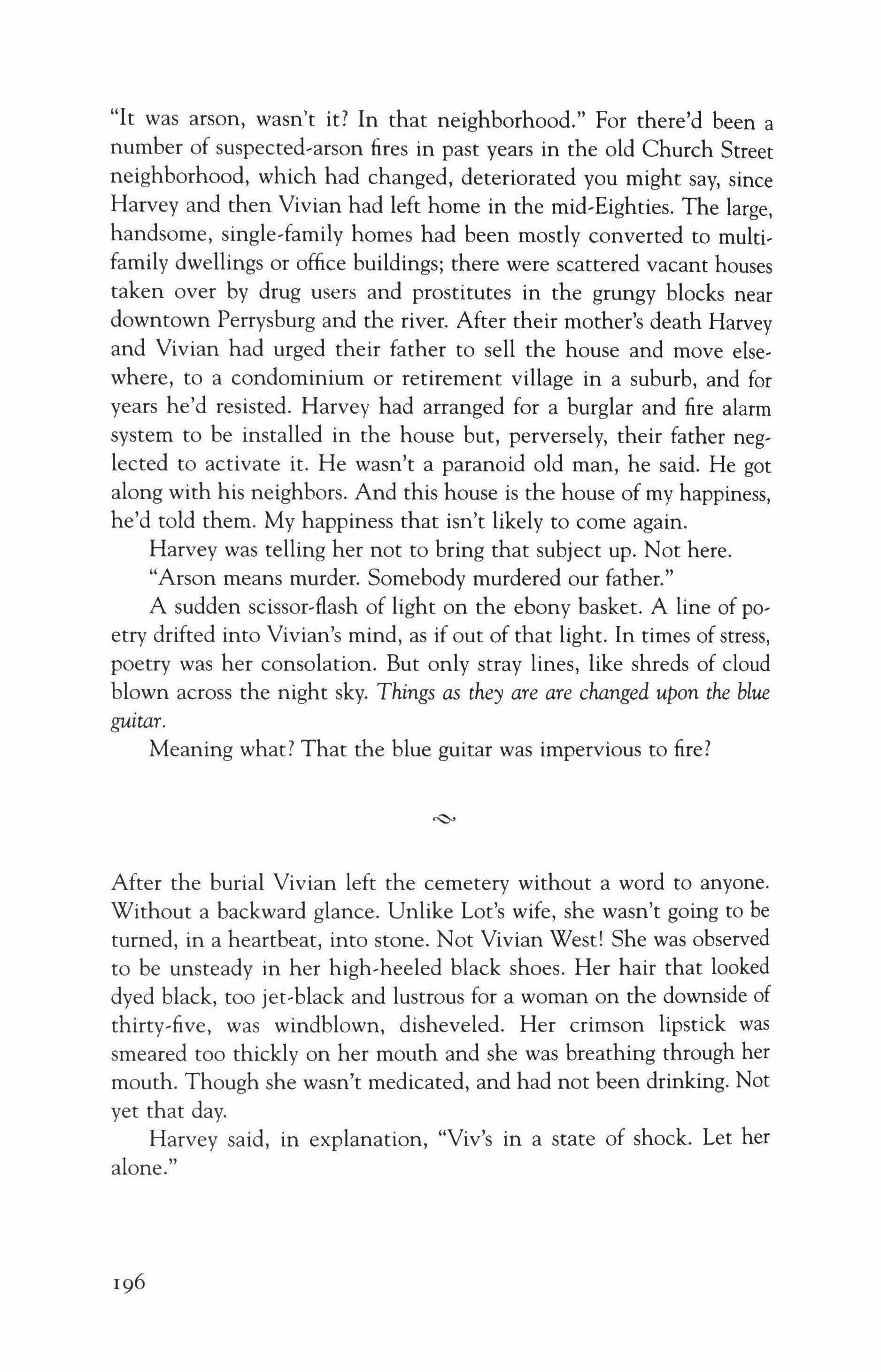
After the burial Vivian left the cemetery without a word to anyone. Without a backward glance. Unlike Lot's wife, she wasn't going to be turned, in a heartbeat, into stone. Not Vivian West! She was observed to be unsteady in her high-heeled black shoes. Her hair that looked dyed black, too jet-black and lustrous for a woman on the downside of thirty-five, was windblown, disheveled. Her crimson lipstick was smeared too thickly on her mouth and she was breathing through her mouth. Though she wasn't medicated, and had not been drinking. Not yet that day.
Harvey said, in explanation, "Viv's in a state of shock. Let her alone."

Driving along Church Street, gripping the steering wheel of her car tightly I do what I want to do. It was a brash statement of Vivian's girlhood. Now she was an adult, the boast seemed quaint.
For rarely do you know what you want. Even after you've done it you can't say clearly if that was what you'd wanted or just something that happened to you, like weather.
Three times she circled 819 Church before parking at the curb. The driveway was blocked by a sawhorse festooned in ugly yellow tape.
CAUTION: DO NOT ENTER. At a nearby comer children were playing in the street, young black children shouting at one another. This had become a neighborhood of many children. And adolescents staring after Vivian's car. When she got out of the car, carrying the Polaroid earnera, someone shouted in her direction.
It was a shout she decided to interpret as playful, impersonal. Something like, "Hey lady!" She acknowledged it with a quick wave of her hand, turned away. Probably they'd think she was an official photographer. The camera belonged to her husband. Don't you think I should come with you? he'd asked uncertainly.
No. Vivian wanted to be alone with this grief, and with the guilt of grief.
It was still strange to her. She was married again after years of living more or less alone. He was assistant superintendent of the Rochester public schools. Twelve years older than Vivian, with two near-adult sons. Harvey had whistled at this news when Vivian told him. How'd you meet this guy? When did all this happen? Sounds good, Vivo
Harvey had meant, this one sounds safe.
Vivian was having difficulty holding the bulky camera steady. The smell of burnt things frightened her. She was trying very hard not to become nauseated. No medication, never again. Raw reality for me. She'd never been a junkie, she'd taken only legally prescribed drugs and yet those drugs had nearly destroyed her so you could argue that the rawest of reality was less of a risk. This, she'd vowed to her father who had seemed to believe her.
A perverse thought came to her: Did firefighters often smell the odor of burning human flesh? Cooked flesh? Obviously, yes. You get used to it, she supposed. Like everything.

The ruin of a house loomed above her. Before prices in the Church Street neighborhood began to fall in the mid-Seventies, such a property in this revered residential neighborhood of Perrysburg would have been worth hundreds of thousands of dollars. Built today on the outskirts of the city, on the Niagara River, it would be worth as much as $ 1 ,000,000. Beautiful hardwood floors, elegant moldings and wainscotting, silk wallpaper, regal ceilings, French doors opening out onto a landscaped terrace Vivian thought with a shudder that, if her father had survived the fire, losing the house would have killed him.
Never leave the house of my happiness, how could I.
In the past year or two Vivian's father had become an aged, ailing man. A doctor doesn't expect to succumb to the commonplace symptoms of his patients. Vivian had invited him to sell the house and move to Rochester to live with her and her husband, but of course he'd refused. And she hadn't insisted. Because of course Vivian hadn't really wanted her father with her. She loved him, but at a distance. Dr. West had been restless, easily bored. No Florida retirement for Dr. West. He'd only reluctantly retired from his practice at the age of seventy-six, for health reasons, yet he'd continued to treat neighborhood patients gratis. He consulted at a local women's health clinic. He would have been miserable living with Vivian, or with anyone.
Now it was too late, now he was dead, Vivian felt repentance, and she felt guilt. The luxury of guilt that sweeps over us too late.
She stumbled in the churned, grimy snow. Looking for a way in? This was madness. Everywhere were warning signs. CAUTION: DO NOT ENTER. BY ORDER OF PERRYSBURG FIRE COMMISSIONER. Charred boards swung loose overhead, creaking in the wind. Broken glass lay underfoot. If. she ventured inside what had once been the kitchen, debris might fall on her head. Why the hell are you doing this, didn't I warn you, Harvey might ask. Vivian had no reply except, This is my grief.
Overhead, ghostly shreds of curtains seemed to beckon to her, coyly.
She was breathing hard, through her mouth. The first several Polaroids she'd taken were something of a disappointment. They might have been of any burnt-out house, conveying no special significance or emotion. She hadn't counted on that.
Maybe she'd expected the spirit of her dead father to be dwelling in this place? Absurd.
There would be an official investigation into the fire but, apart from that, the stately old house at 819 Church Street, residence of Dr.
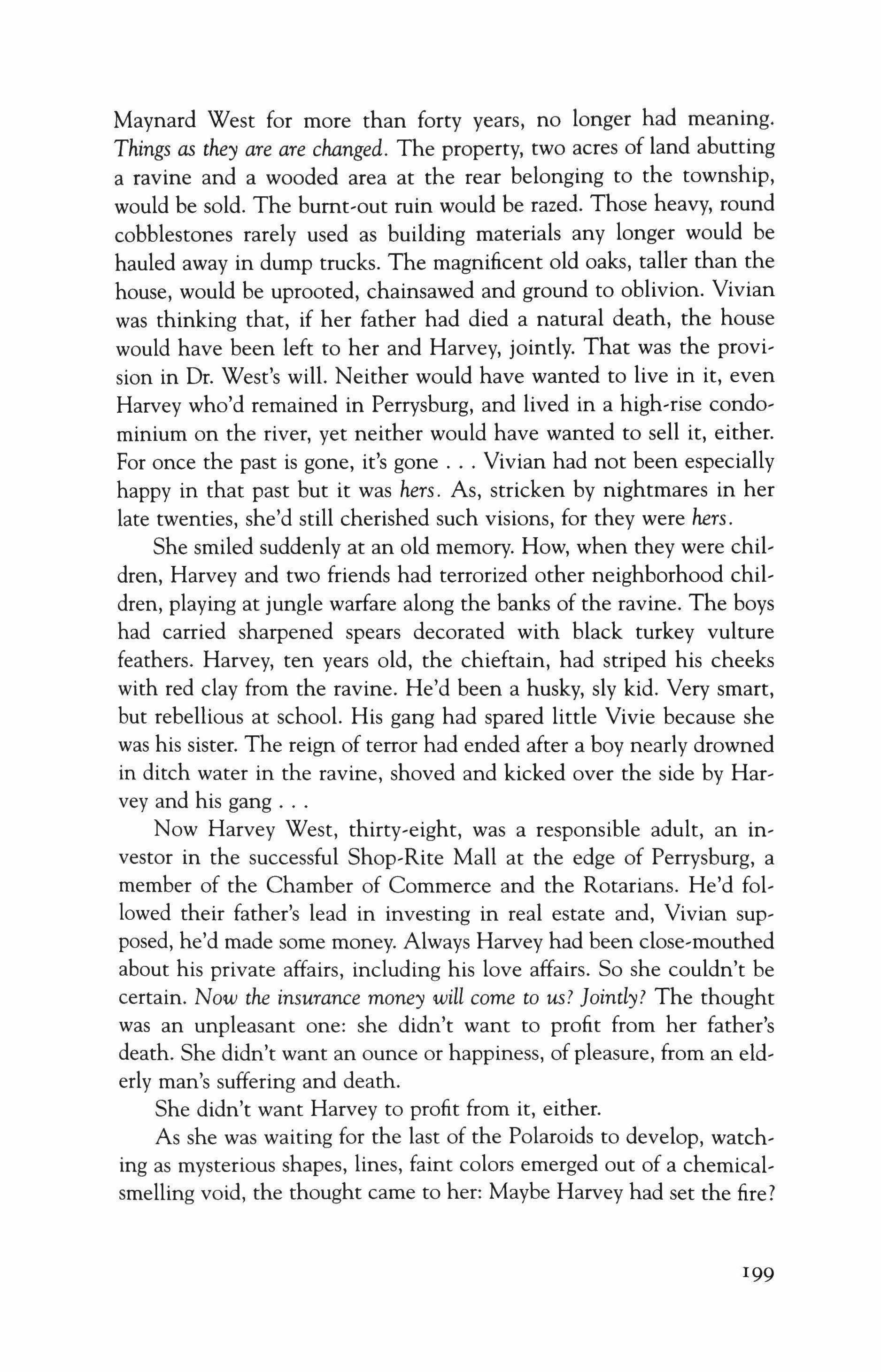
Maynard West for more than forty years, no longer had meaning. Things as they are are changed. The property, two acres of land abutting a ravine and a wooded area at the rear belonging to the township, would be sold. The burnt-out ruin would be razed. Those heavy, round cobblestones rarely used as building materials any longer would be hauled away in dump trucks. The magnificent old oaks, taller than the house, would be uprooted, chainsawed and ground to oblivion. Vivian was thinking that, if her father had died a natural death, the house would have been left to her and Harvey, jointly. That was the provision in Dr. West's will. Neither would have wanted to live in it, even Harvey who'd remained in Perrysburg, and lived in a high-rise condominium on the river, yet neither would have wanted to sell it, either. For once the past is gone, it's gone Vivian had not been especially happy in that past but it was hers. As, stricken by nightmares in her late twenties, she'd still cherished such visions, for they were hers.
She smiled suddenly at an old memory. How, when they were children, Harvey and two friends had terrorized other neighborhood children, playing at jungle warfare along the banks of the ravine. The boys had carried sharpened spears decorated with black turkey vulture feathers. Harvey, ten years old, the chieftain, had striped his cheeks with red clay from the ravine. He'd been a husky, sly kid. Very smart, but rebellious at school. His gang had spared little Vivie because she was his sister. The reign of terror had ended after a boy nearly drowned in ditch water in the ravine, shoved and kicked over the side by Harvey and his gang
Now Harvey West, thirty-eight, was a responsible adult, an investor in the successful Shop-Rite Mall at the edge of Perrysburg, a member of the Chamber of Commerce and the Rotarians. He'd followed their father's lead in investing in real estate and, Vivian supposed, he'd made some money. Always Harvey had been close-mouthed about his private affairs, including his love affairs. So she couldn't be certain. Now the insurance money will come to us? Jointly? The thought was an unpleasant one: she didn't want to profit from her father's death. She didn't want an ounce or happiness, of pleasure, from an elderly man's suffering and death.
She didn't want Harvey to profit from it, either.
As she was waiting for the last of the Polaroids to develop, watching as mysterious shapes, lines, faint colors emerged out of a chemicalsmelling void, the thought came to her: Maybe Harvey had set the fire?
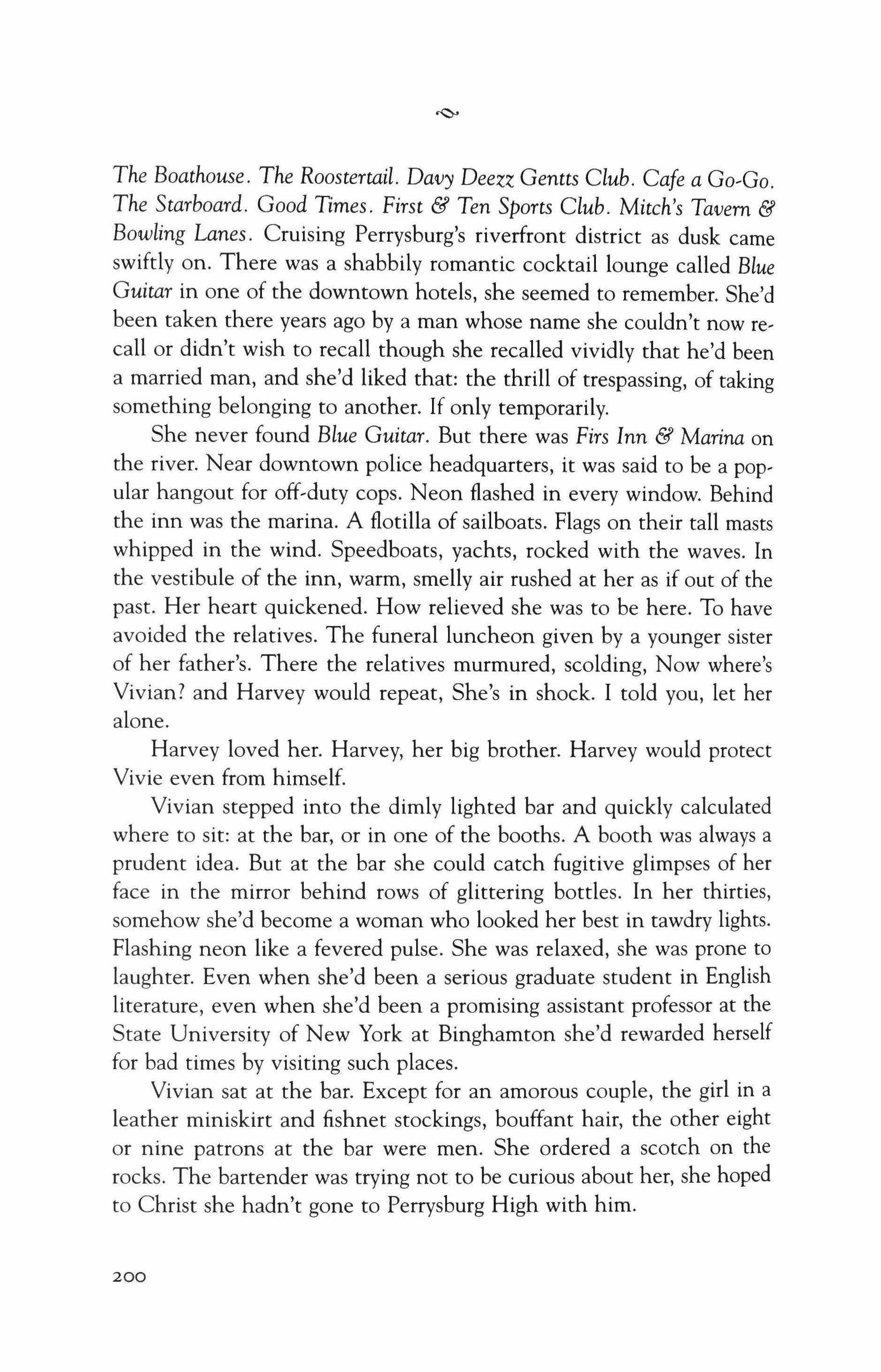
The Boathouse. The Roostertail. Davy Deezz Gentts Club. Cafe a Go-Go. The Starboard. Good Times. First & Ten Sports Club. Mitch's Tavern & Bowling Lanes. Cruising Perrysburg's riverfront district as dusk came swiftly on. There was a shabbily romantic cocktail lounge called Blue Guitar in one of the downtown hotels, she seemed to remember. She'd been taken there years ago by a man whose name she couldn't now recall or didn't wish to recall though she recalled vividly that he'd been a married man, and she'd liked that: the thrill of trespassing, of taking something belonging to another. If only temporarily.
She never found Blue Guitar. But there was Firs Inn & Marina on the river. Near downtown police headquarters, it was said to be a popular hangout for off-duty cops. Neon flashed in every window. Behind the inn was the marina. A flotilla of sailboats. Flags on their tall masts whipped in the wind. Speedboats, yachts, rocked with the waves. In the vestibule of the inn, warm, smelly air rushed at her as if out of the past. Her heart quickened. How relieved she was to be here. To have avoided the relatives. The funeral luncheon given by a younger sister of her father's. There the relatives murmured, scolding, Now where's Vivian? and Harvey would repeat, She's in shock. I told you, let her alone.
Harvey loved her. Harvey, her big brother. Harvey would protect Vivie even from himself.
Vivian stepped into the dimly lighted bar and quickly calculated where to sit: at the bar, or in one of the booths. A booth was always a prudent idea. But at the bar she could catch fugitive glimpses of her face in the mirror behind rows of glittering bottles. In her thirties, somehow she'd become a woman who looked her best in tawdry lights. Flashing neon like a fevered pulse. She was relaxed, she was prone to laughter. Even when she'd been a serious graduate student in English literature, even when she'd been a promising assistant professor at the State University of New York at Binghamton she'd rewarded herself for bad times by visiting such places.
Vivian sat at the bar. Except for an amorous couple, the girl in a leather miniskirt and fishnet stockings, bouffant hair, the other eight or nine patrons at the bar were men. She ordered a scotch on the rocks. The bartender was trying not to be curious about her, she hoped to Christ she hadn't gone to Perrysburg High with him.
Drinking clarified. Confusion dissolved. She smiled to think that from a certain perspective all of that day of her father's funeral including the vision of light flashing out from the closed casket had been leading to this moment of grace: Vivian's first serious drink in months. She wanted to be alone, she would have said. When a husky bearded man with a familiar face, seated a few stools away, leaned over to say hello, asked if she was Vivie West, Vivian shook her head without engaging him. But a while later, when she was about to order a second drink, another man drifted past, carrying his drink, she glanced up and their eyes locked and he asked, O.K. if I join you? and Vivian indicated yes, it was O.K. The man was no one she knew, she was certain. He was about forty years old. He looked married, but he wasn't wearing a ring. He slid onto the stool beside her, brushing against her arm. He squinted at her, seeing a melancholy face. A very pale face. She'd penciled in dark boldly defined eyebrows. She'd outlined her eyes in black mascara like eyes in a Matisse painting. Her mouth was fleshy, pouting. In her car, before coming inside, she'd removed her wedding ring. Her companion was saying, "Some people, some women, don't like cops so I'll tell you right off: I'm with the PPD."
Vivian laughed. "I'm not 'some women.
They exchanged first names. They even shook hands. He was a plainclothes officer, a detective. Desire coursed through her suddenly like a mild electric current.

"I don't know him. I don't trust him. I adore him."
It was her brother Harvey she spoke of, to herself. For driving to Perrysburg on the occasion of her father's terrible death was also driving to Perrysburg to meet with Harvey. Always Vivian's heart stirred with urgency, part tenderness, part dread, when she thought of her brother.
Through childhood he'd been Vivie's protector. Through much of her girlhood. Her girl friends had envied her an older brother; an older brother with such swaggering style. When you're a girl in public school to have a brother three years older means being spared the gauntlet of boys rude appraising stares, sniggering remarks and innuendoes, muffled laughter. When a boy took Vivie West out on a date he was taking out Harvey West's younger sister. "I was treated with respect be-
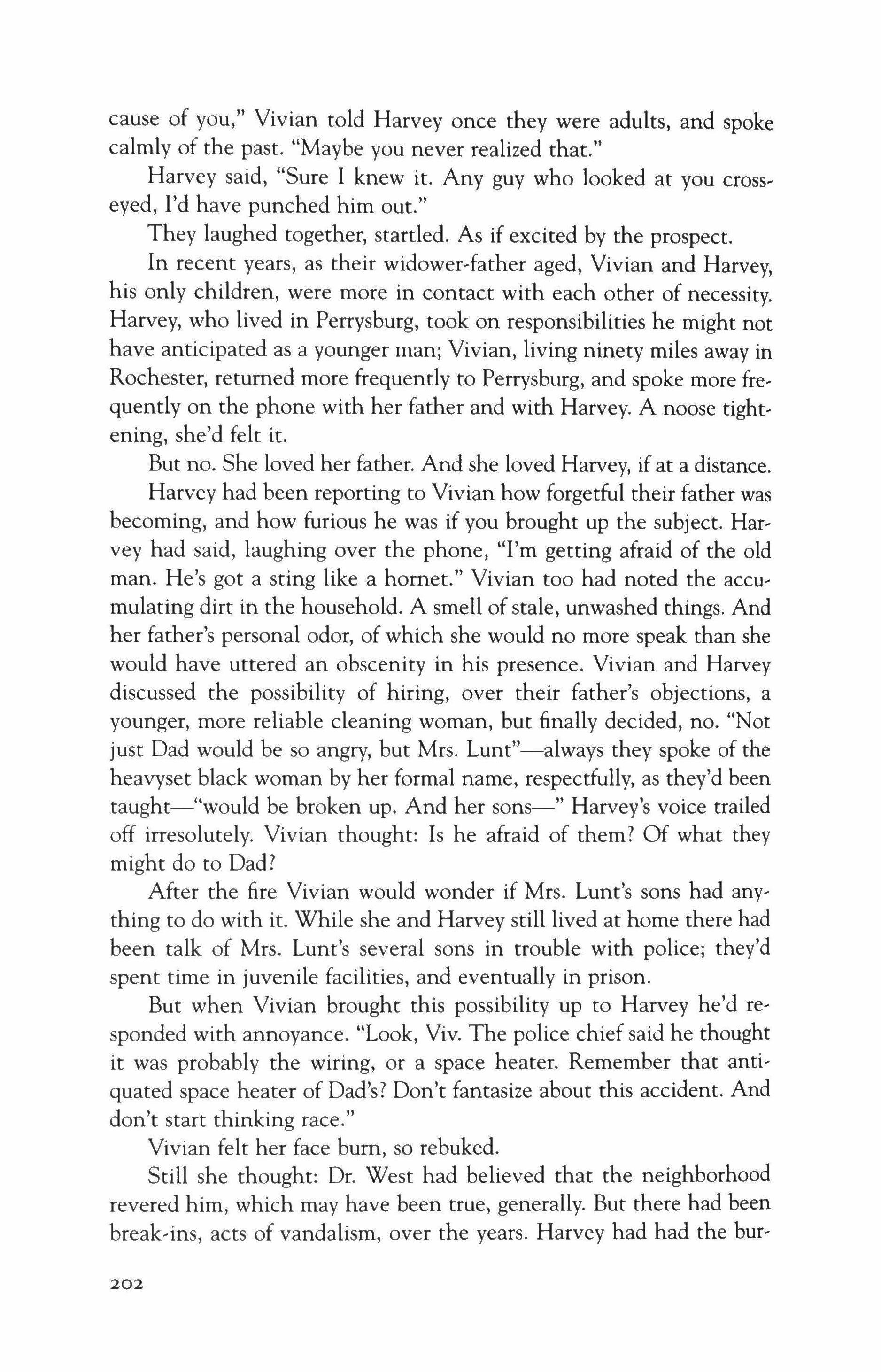
cause of you," Vivian told Harvey once they were adults, and spoke calmly of the past. "Maybe you never realized that."
Harvey said, "Sure I knew it. Any guy who looked at you crosseyed, I'd have punched him out."
They laughed together, startled. As if excited by the prospect.
In recent years, as their widower-father aged, Vivian and Harvey, his only children, were more in contact with each other of necessity. Harvey, who lived in Perrysburg, took on responsibilities he might not have anticipated as a younger man; Vivian, living ninety miles away in Rochester, returned more frequently to Perrysburg, and spoke more frequently on the phone with her father and with Harvey. A noose tightening, she'd felt it.
But no. She loved her father. And she loved Harvey, if at a distance. Harvey had been reporting to Vivian how forgetful their father was becoming, and how furious he was if you brought up the subject. Harvey had said, laughing over the phone, "I'm getting afraid of the old man. He's got a sting like a hornet." Vivian too had noted the accumulating dirt in the household. A smell of stale, unwashed things. And her father's personal odor, of which she would no more speak than she would have uttered an obscenity in his presence. Vivian and Harvey discussed the possibility of hiring, over their father's objections, a younger, more reliable cleaning woman, but finally decided, no. "Not just Dad would be so angry, but Mrs. Lunt"-always they spoke of the heavyset black woman by her formal name, respectfully, as they'd been taught-"would be broken up. And her sons-" Harvey's voice trailed off irresolutely. Vivian thought: Is he afraid of them? Of what they might do to Dad?
After the fire Vivian would wonder if Mrs. Lunt's sons had anything to do with it. While she and Harvey still lived at home there had been talk of Mrs. Lunt's several sons in trouble with police; they'd spent time in juvenile facilities, and eventually in prison.
But when Vivian brought this possibility up to Harvey he'd responded with annoyance. "Look, Vivo The police chief said he thought it was probably the wiring, or a space heater. Remember that antiquated space heater of Dad's? Don't fantasize about this accident. And don't start thinking race."
Vivian felt her face bum, so rebuked.
Still she thought: Dr. West had believed that the neighborhood revered him, which may have been true, generally. But there had been break-ins, acts of vandalism, over the years. Harvey had had the bur-
glar alarm installed after someone broke into their father's office look, ing for drugs and cash. "Dad wanted to think everyone loved him but maybe not everyone did. It would only have taken one. Maybe the fire was to cover up a burglary, maybe to cover up an assault Vivian spoke quietly. She refrained from saying a murder.
Harvey shrugged. The subject offended him, clearly. He told again of how forgetful their father was becoming, and how he'd allowed stacks of medical journals and other magazines to accumulate in the downstairs, rear rooms of the house. Harvey had questioned the wisdom of their father saving, for instance, copies of Science and the New England Journal of Medicine dating back to the Seventies. The Seven, ties! Thirty years! "'How can I throw anything away without having read it thoroughly?' Dad asked me, like he was explaining something to a moron, 'and if I've read it, underlined and annotated it, and it's valuable, how can I throw it away?'"
They laughed uneasily together, Harvey had so perfectly mimicked their dead father's voice.
It wasn't at that moment that Vivian first thought Did you set the fire, Harvey? I would hate you if you had. But I would never betray you. This thought came to her afterward, as she stared at the Polaroid image of a barricaded doorway and blackened stucco materializing slowly before her eyes.
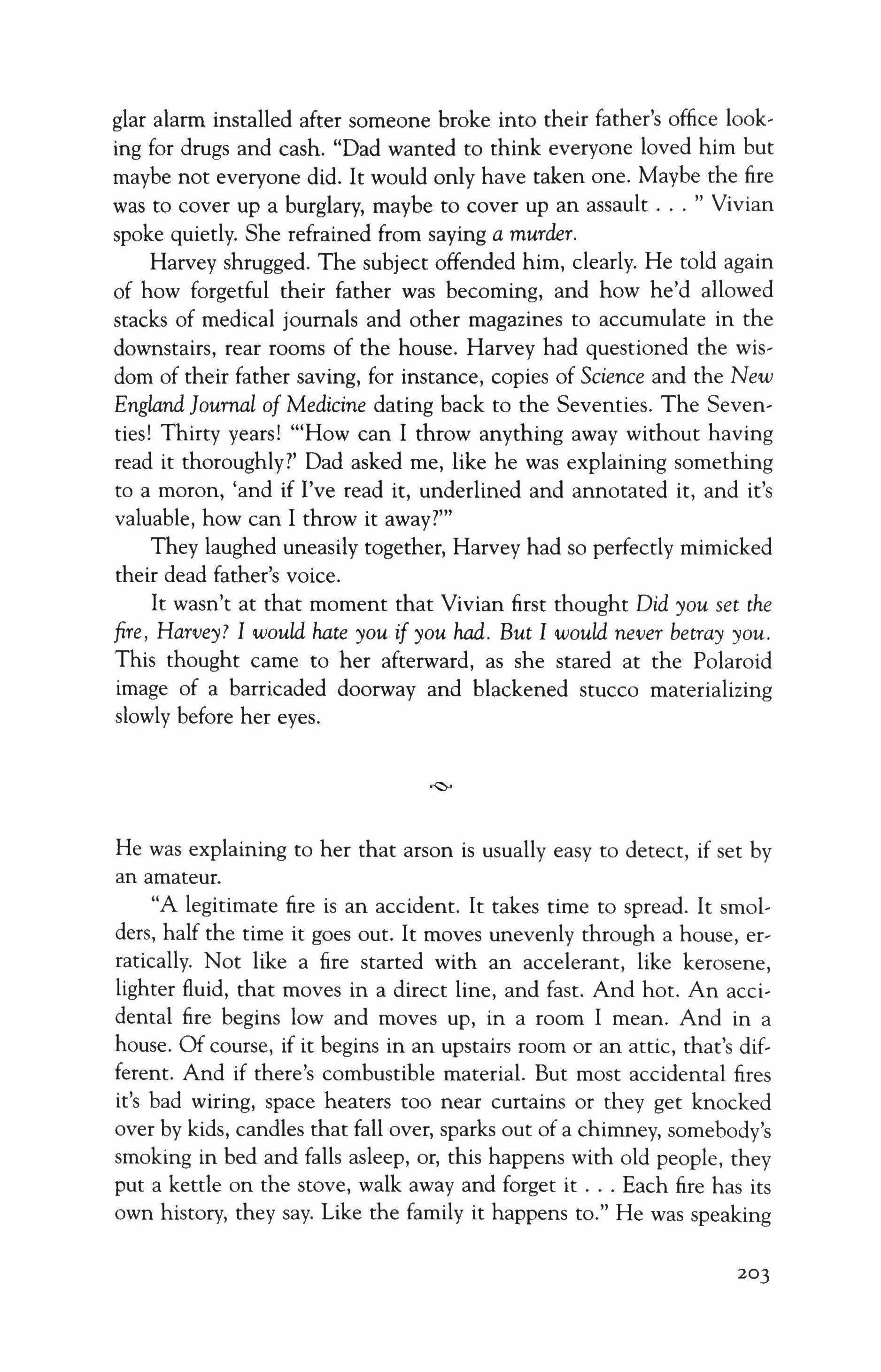
He was explaining to her that arson is usually easy to detect, if set by an amateur.
"A legitimate fire is an accident. It takes time to spread. It smolders, half the time it goes out. It moves unevenly through a house, erratically. Not like a fire started with an accelerant, like kerosene, lighter fluid, that moves in a direct line, and fast. And hot. An accidental fire begins low and moves up, in a room I mean. And in a house. Of course, if it begins in an upstairs room or an attic, that's different. And if there's combustible material. But most accidental fires it's bad wiring, space heaters too near curtains or they get knocked over by kids, candles that fall over, sparks out of a chimney, somebody's smoking in bed and falls asleep, or, this happens with old people, they put a kettle on the stove, walk away and forget it Each fire has its own history, they say. Like the family it happens to." He was speaking
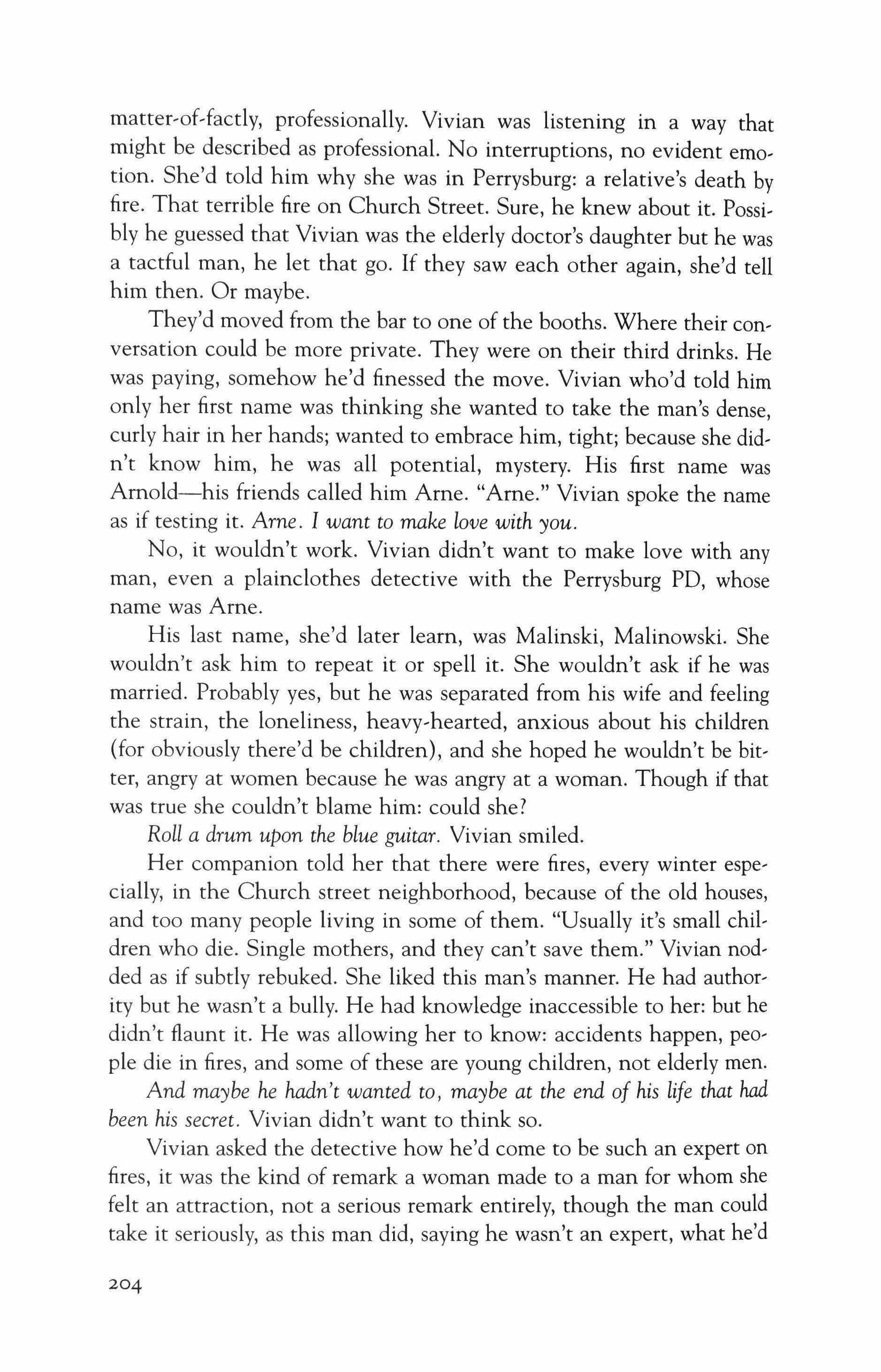
matter-of-factly, professionally. Vivian was listening in a way that might be described as professional. No interruptions, no evident emotion. She'd told him why she was in Perrysburg: a relative's death by fire. That terrible fire on Church Street. Sure, he knew about it. Possibly he guessed that Vivian was the elderly doctor's daughter but he was a tactful man, he let that go. If they saw each other again, she'd tell him then. Or maybe.
They'd moved from the bar to one of the booths. Where their conversation could be more private. They were on their third drinks. He was paying, somehow he'd finessed the move. Vivian who'd told him only her first name was thinking she wanted to take the man's dense, curly hair in her hands; wanted to embrace him, tight; because she didn't know him, he was all potential, mystery. His first name was Arnold-his friends called him Arne. "Arne." Vivian spoke the name as if testing it. Arne. I want to make love with you.
No, it wouldn't work. Vivian didn't want to make love with any man, even a plainclothes detective with the Perrysburg PO, whose name was Arne.
His last name, she'd later learn, was Malinski, Malinowski. She wouldn't ask him to repeat it or spell it. She wouldn't ask if he was married. Probably yes, but he was separated from his wife and feeling the strain, the loneliness, heavy-hearted, anxious about his children (for obviously there'd be children), and she hoped he wouldn't be bitter, angry at women because he was angry at a woman. Though if that was true she couldn't blame him: could she?
Roll a drum upon the blue guitar. Vivian smiled.
Her companion told her that there were fires, every winter especially, in the Church street neighborhood, because of the old houses, and too many people living in some of them. "Usually it's small children who die. Single mothers, and they can't save them." Vivian nodded as if subtly rebuked. She liked this man's manner. He had authority but he wasn't a bully. He had knowledge inaccessible to her: but he didn't flaunt it. He was allowing her to know: accidents happen, people die in fires, and some of these are young children, not elderly men. And maybe he hadn't wanted to, maybe at the end of his life that had been his secret. Vivian didn't want to think so.
Vivian asked the detective how he'd come to be such an expert on fires, it was the kind of remark a woman made to a man for whom she felt an attraction, not a serious remark entirely, though the man could take it seriously, as this man did, saying he wasn't an expert, what he'd

been telling her was common knowledge. He didn't add I'm a detective, are you bullshitting me, lady?
Here was a man who didn't want flattery from a woman. Maybe that meant he'd be honest with her, too.
Which Vivian wasn't sure she wanted.
The point of picking up a man in a bar, the evening of your father's funeral, hadn't that much to do with wanting honesty, sincerity. She'd seen the detective glance at her ring finger, and wondered uneasily now if it was obvious she'd only just removed a ring; and what that signaled.
From time to time men passed by their booth, and Vivian's com' panion smiled and waved at them but didn't encourage them to linger, his friends, fellow cops. Vivian knew they must be curious about her. Who is Arne with? That woman averting her eyes, casually shielding her face with an uplifted hand. She dreaded someone recognizing her. Harvey had PPD friends. High school buddies. They'd know her as Harvey West's kid sister, all grown up.
She said, "If it's arson, then. You're saying it's easy to detect?" Her words weren't so clearly enunciated as she'd wished. The alcohol coursing warmly through her veins, she felt illuminating her veins like a Christmas tree, but now there was a swerve to the motion, like white water rapids in a river. A giddy sensation, she had to fight an impulse to laugh and grip the edge of the booth's table to steady herself.
He said, "'Easy' to detect? I didn't say that. Not if the fire's done by a pro."
"'Pro'-?"
"Professional arsonist."
Vivian stared at her companion. In the bar light his skin had appeared coarse, a sliver of scar tissue above his left eye. But he'd been smiling then, and he'd looked almost boyish, hopeful. Now, in this more refracted light, partly obscured by smoke from his own cigarette, his features were less distinctive, and she wasn't sure of the expression in his eyes. Did he think she was a fool? Was he calculating his chances with her, sexually? And what would be the consequence, if any? Or maybe, a detective now by instinct as well as training, he saw that she was in a state of something like shock, numbed, uncertain what she wanted from him, or from this conversation; a woman intent upon getting drunk, not by herself.
Faintly Vivian said, "I guess I didn't realize. That there are professional arsonists."
"Vivian, there's a professional everything."
Rebuked another time, feeling her face bum, Vivian excused herself and went to the women's restroom, a grimy pink-walled cubicle like the interior of a womb, and there was her skillfully made-up face in the mirror, startlingly young-looking and defiant. She fumbled for her cell phone in her bag, dialed Harvey's number. No answer. And no answering machine. "God damn you, Harvey. Where are you!" She used the lavatory and washed her hands and reapplied lipstick like a schoolgirl mashing it on. She wondered if he had a condom, obviously yes.
Never would Vivian carry anything so incriminating, or so hopeful, in her bag. Now she was married, of course not.
Then she thought suddenly, He isn't waiting for me. He's gone. That will make it easier.
So convincing was this thought, when she saw that the detective who called himself Arne was waiting for her in the booth, with the patience of a lover, arms crossed, smoking a cigarette and squinting toward her, she was surprised. He had dark, thick hair trimmed high around his ears. He wore a nondescript dark coat, a white shirt and no tie. She hoped to hell it wouldn't tum out he'd gone to school with Harvey, he was about that age. For a moment she saw desire in his face, too. The rawness of it, that registers as a kind of surprise, wholly unpremediated. And something yearning, vulnerable. It was rare to see such an expression in a man's face, in such circumstances. What this man must know of women. What ugly truths no skill at makeup, charm, female subterfuge could disguise.
She must have appeared uncertain, wavering. A wan half-smile on her face. He was on his feet beside her, lightly touching her arm.
"Should we leave? Go somewhere? Is that what you'd like, Vivian?"
He spoke quietly. He wasn't trying to coerce her. Her name on his lips made her feel weak, fated.
"Yes," Vivian said. "That's what I'd like."

So that's life then. Things as they are.
She tried to recall the rest of it. Picks its way on the blue guitar.

Harvey was asking where she'd been. In that mode of brotherly disgust that signaled he didn't expect a truthful answer. Like Vivian he carried himself cautiously, not wanting the crystalline honeycomb of his brain to shatter in this too-vivid daylight. Vivian wondered where Harvey had been drinking the night before, and with whom. "I tried to call you last night at the motel. No answer," he said.
Vivian had insisted upon staying at a motor inn in Perrysburg. Not with any of the relatives. Nor even with Harvey, who had a spare room. If she couldn't stay in her old room in the house at 819 Church Street she wanted to be alone with her grief, in neutral territory; the relatives could sympathize, even Harvey wouldn't have guessed how before she'd set out on her journey from Rochester she'd vaguely imagined, in the way of a fever patient fantasizing some measure of relief which in fact she can't force herself to believe, cruising those downtown bars, finding a man.
Had it been in the Blue Guitar she'd found him? Vivian would try to remember it that way.
She said, defensively, "I called you, Harvey. Several times. No answer."
Harvey wasn't going to ask Were you out drinking? He wasn't going to remove her dark glasses to expose her eyes.
There was this unexpected tact, this delicacy of manner, in her brother. Not wanting to expose Vivian, or embarrass her. Or humiliate her. He didn't appear to be the type. He spoke of himself as a lightheavyweight, meaning in the vicinity of one hundred ninety pounds, he had a retired boxer's confidence in his body, a shrewd impassive face blunt as a shovel upon which he fitted wire-framed glasses with mother-of-pearl nosepieces. This side of Harvey, almost you might call it a feminine side, made him attractive to women, not always with good results for the women. He complained now he'd been damned worried about her, under the circumstances.
"Harvey, I'm sorry. I needed to be alone
It was mid-afternoon of the day following their father's funeral. They were in Harvey's seventh-floor apartment overlooking the choppy, wind-tormented Niagara River. A treacherous river, especially above the Falls some miles away. A magnet for the melancholy, the self-punishers. You might imagine a swift easy death except death by
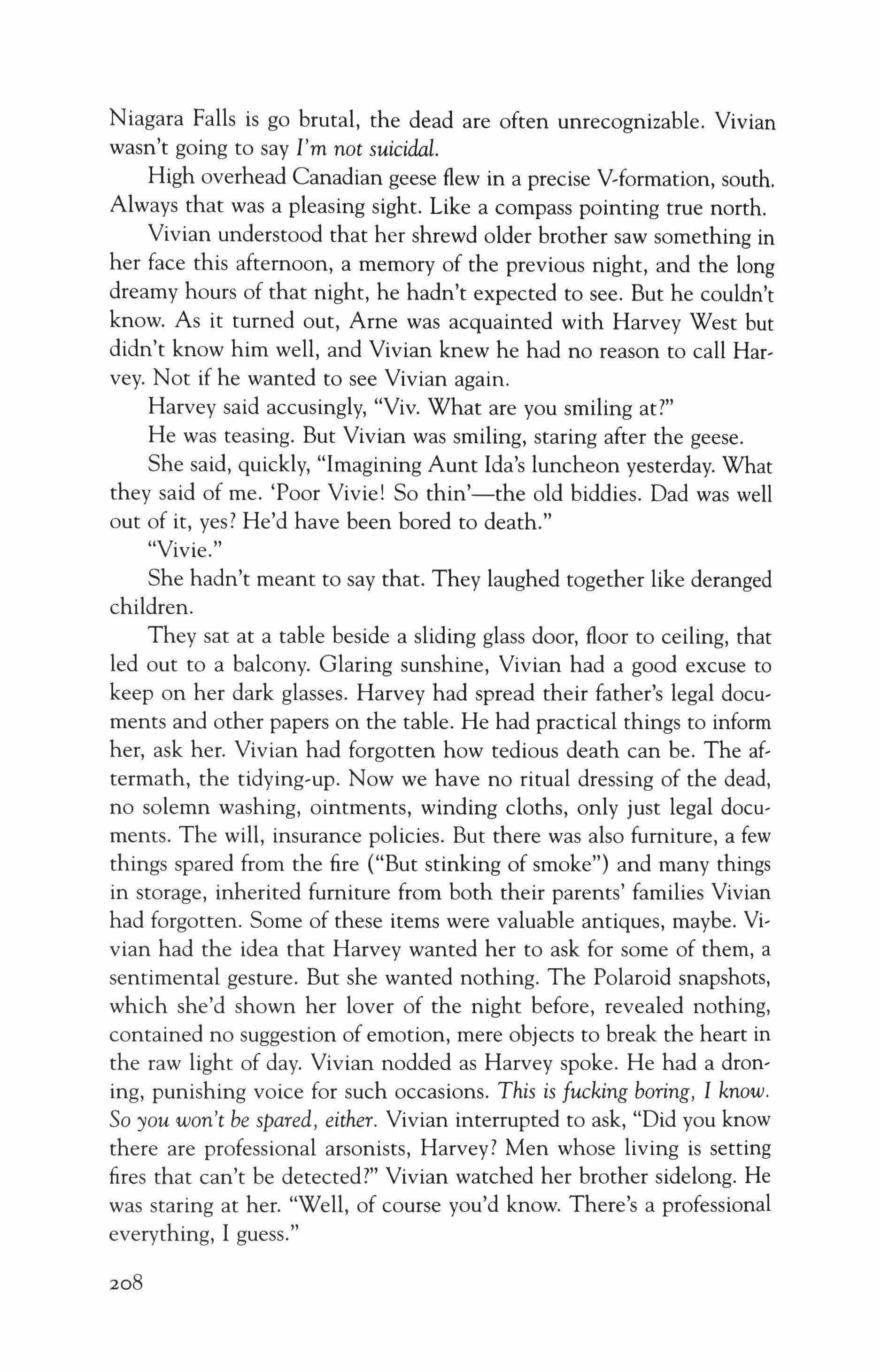
Niagara Falls is go brutal, the dead are often unrecognizable. Vivian wasn't going to say I'm not suicidal.
High overhead Canadian geese flew in a precise Vformation, south. Always that was a pleasing sight. Like a compass pointing true north.
Vivian understood that her shrewd older brother saw something in her face this afternoon, a memory of the previous night, and the long dreamy hours of that night, he hadn't expected to see. But he couldn't know. As it turned out, Arne was acquainted with Harvey West but didn't know him well, and Vivian knew he had no reason to call Harvey. Not if he wanted to see Vivian again.
Harvey said accusingly, "Viv, What are you smiling at?"
He was teasing. But Vivian was smiling, staring after the geese.
She said, quickly, "Imagining Aunt Ida's luncheon yesterday. What they said of me. 'Poor Vivie! So thin'-the old biddies. Dad was well out of it, yes? He'd have been bored to death."
"Vivie."
She hadn't meant to say that. They laughed together like deranged children.
They sat at a table beside a sliding glass door, floor to ceiling, that led out to a balcony. Glaring sunshine, Vivian had a good excuse to keep on her dark glasses. Harvey had spread their father's legal documents and other papers on the table. He had practical things to inform her, ask her. Vivian had forgotten how tedious death can be. The aftermath, the tidying-up. Now we have no ritual dressing of the dead, no solemn washing, ointments, winding cloths, only just legal documents. The will, insurance policies. But there was also furniture, a few things spared from the fire ("But stinking of smoke") and many things in storage, inherited furniture from both their parents' families Vivian had forgotten. Some of these items were valuable antiques, maybe. Vivian had the idea that Harvey wanted her to ask for some of them, a sentimental gesture. But she wanted nothing. The Polaroid snapshots, which she'd shown her lover of the night before, revealed nothing, contained no suggestion of emotion, mere objects to break the heart in the raw light of day. Vivian nodded as Harvey spoke. He had a droning, punishing voice for such occasions. This is fucking boring, I know. So you won't be spared, either. Vivian interrupted to ask, "Did you know there are professional arsonists, Harvey? Men whose living is setting fires that can't be detected?" Vivian watched her brother sidelong. He was staring at her. "Well, of course you'd know. There's a professional everything, I guess."
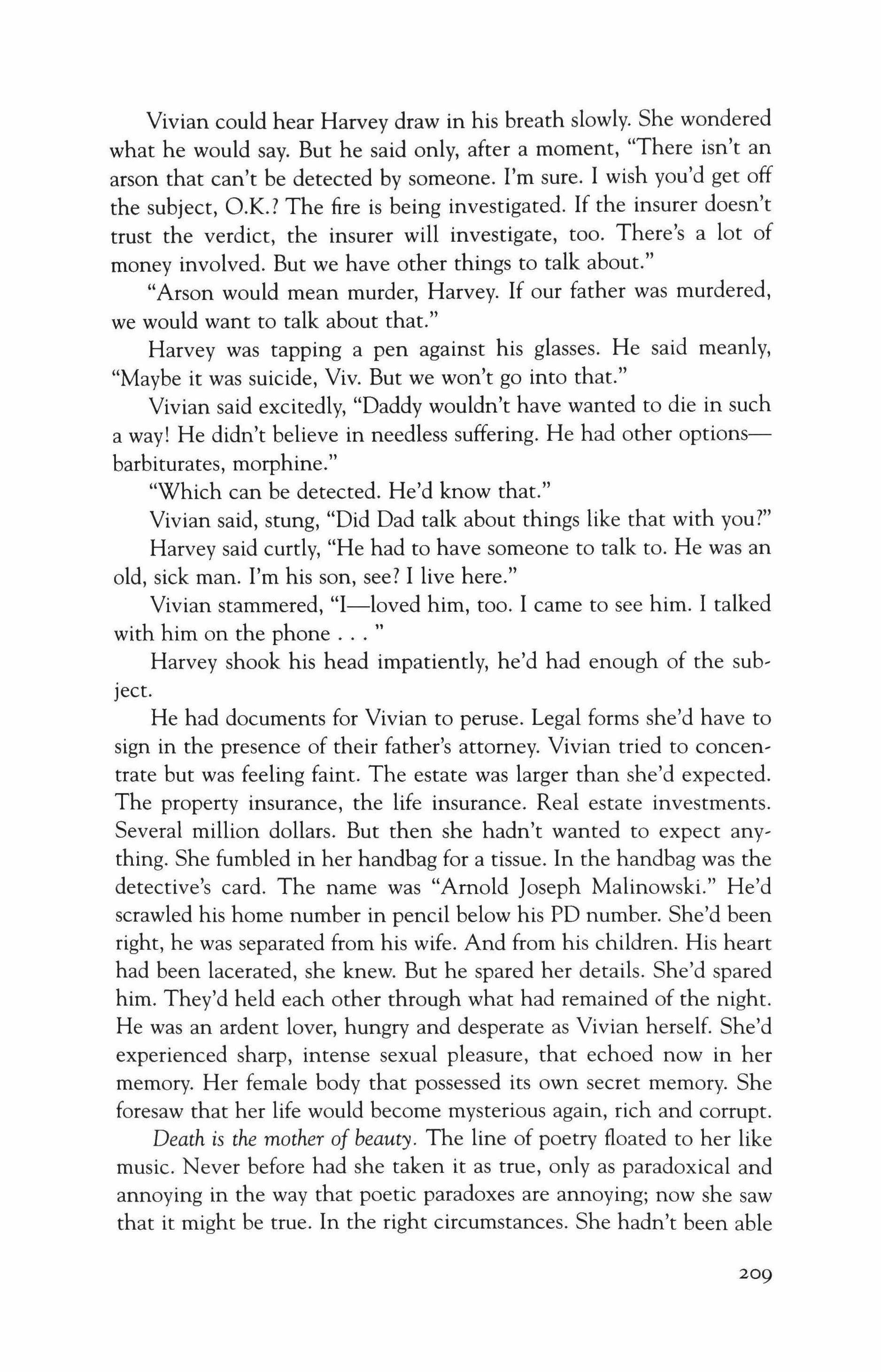
Vivian could hear Harvey draw in his breath slowly. She wondered what he would say. But he said only, after a moment, "There isn't an arson that can't be detected by someone. I'm sure. I wish you'd get off the subject, O.K.? The fire is being investigated. If the insurer doesn't trust the verdict, the insurer will investigate, too. There's a lot of money involved. But we have other things to talk about."
"Arson would mean murder, Harvey. If our father was murdered, we would want to talk about that."
Harvey was tapping a pen against his glasses. He said meanly, "Maybe it was suicide, Vivo But we won't go into that."
Vivian said excitedly, "Daddy wouldn't have wanted to die in such a way! He didn't believe in needless suffering. He had other optionsbarbiturates, morphine."
"Which can be detected. He'd know that."
Vivian said, stung, "Did Dad talk about things like that with you?"
Harvey said curtly, "He had to have someone to talk to. He was an old, sick man. I'm his son, see? I live here."
Vivian stammered, "I-loved him, too. I carne to see him. I talked with him on the phone
Harvey shook his head impatiently, he'd had enough of the subject.
He had documents for Vivian to peruse. Legal forms she'd have to sign in the presence of their father's attorney. Vivian tried to concentrate but was feeling faint. The estate was larger than she'd expected. The property insurance, the life insurance. Real estate investments. Several million dollars. But then she hadn't wanted to expect anything. She fumbled in her handbag for a tissue. In the handbag was the detective's card. The name was "Arnold Joseph Malinowski." He'd scrawled his horne number in pencil below his PO number. She'd been right, he was separated from his wife. And from his children. His heart had been lacerated, she knew. But he spared her details. She'd spared him. They'd held each other through what had remained of the night. He was an ardent lover, hungry and desperate as Vivian herself. She'd experienced sharp, intense sexual pleasure, that echoed now in her memory. Her female body that possessed its own secret memory. She foresaw that her life would become mysterious again, rich and corrupt.
Death is the mother of beauty. The line of poetry floated to her like music. Never before had she taken it as true, only as paradoxical and annoying in the way that poetic paradoxes are annoying; now she saw that it might be true. In the right circumstances. She hadn't been able
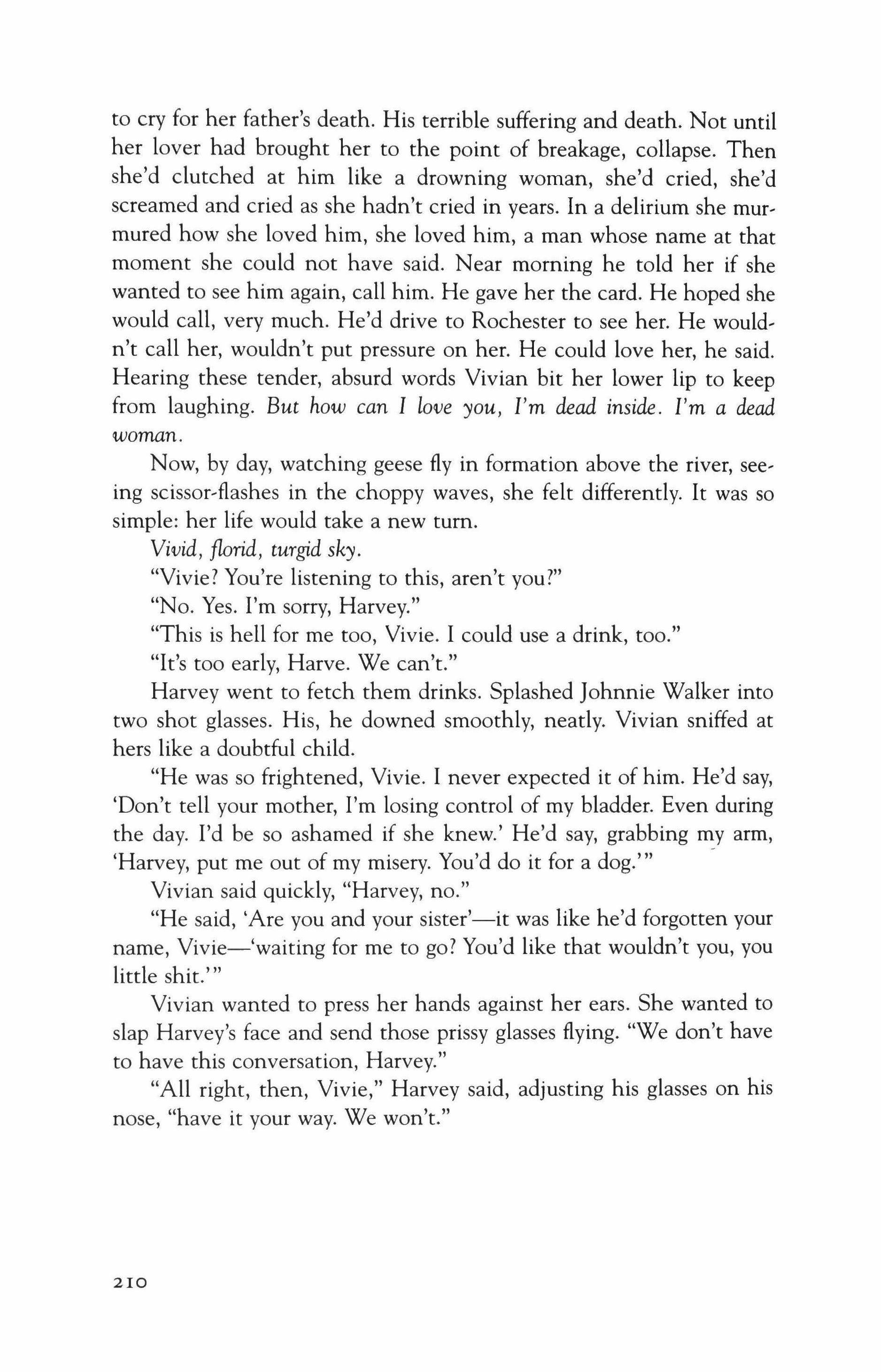
to cry for her father's death. His terrible suffering and death. Not until her lover had brought her to the point of breakage, collapse. Then she'd clutched at him like a drowning woman, she'd cried, she'd screamed and cried as she hadn't cried in years. In a delirium she rnurmured how she loved him, she loved him, a man whose name at that moment she could not have said. Near morning he told her if she wanted to see him again, call him. He gave her the card. He hoped she would call, very much. He'd drive to Rochester to see her. He would, n't call her, wouldn't put pressure on her. He could love her, he said. Hearing these tender, absurd words Vivian bit her lower lip to keep from laughing. But how can I love you, I'm dead inside. I'm a dead woman.
Now, by day, watching geese fly in formation above the river, see, ing scissor-flashes in the choppy waves, she felt differently. It was so simple: her life would take a new tum.
Vivid, florid, turgid sky.
"Vivie? You're listening to this, aren't you?"
"No. Yes. I'm sorry, Harvey."
"This is hell for me too, Vivie. I could use a drink, too."
"It's too early, Harve. We can't."
Harvey went to fetch them drinks. Splashed Johnnie Walker into two shot glasses. His, he downed smoothly, neatly. Vivian sniffed at hers like a doubtful child.
"He was so frightened, Vivie. I never expected it of him. He'd say, 'Don't tell your mother, I'm losing control of my bladder. Even during the day. I'd be so ashamed if she knew.' He'd say, grabbing my arm, 'Harvey, put me out of my misery. You'd do it for a dog.'" -
Vivian said quickly, "Harvey, no."
"He said, 'Are you and your sister'-it was like he'd forgotten your name, Vivie-'waiting for me to go? You'd like that wouldn't you, you little shit.'''
Vivian wanted to press her hands against her ears. She wanted to slap Harvey's face and send those prissy glasses flying. "We don't have to have this conversation, Harvey."
"All right, then, Vivie," Harvey said, adjusting his glasses on his nose, "have it your way. We won't."

It can stand for everything you've ever been against, and it's always ready to hinder your work like the neighbor who borrows too many of your tools and will not bring them back. It's an ally to the lazy, letting them assert, rather than reveal, the details of an argument. It even abbreviates itself to seem more innocuous, like a pickpocket named Annette, who calls herself Ann as she leans in close for directions and your wallet. Too many times it gets repeated, like poorly told jokes or bad news, and it extends to the horizon whatever thought was thoughtwhether of gold or paperwork. It waits for us to stumble on number and variety, to accede to the bewilderment we carry just below the surface, whenever we face the world full on. Whatever the list, "et cetera" ends it with a mumble in the ear.
A few (more) words about THE PUSHCART PRIZE as we begin our next quarter century: "America's bestfiction,poetry and essaysfor QVe1' twenty-fiveyears" - BILlY COlliNS • "I am alwayspleasedandastonished by The Pushcart Prize" - CHARLES SIMIC • "Pushcart is whereyou go to learn the state ofthe literary arts" - FruIDERICK BusCH "Foryears [ have lookedforward to every Pushcart Prize and[ have never been disappointed" - STEPHEN DUNN "When thefuture wants to know about our arts and letters, this is thepublication it will turn to" - SHEROD SANTOS 'it very big bangfor very small bucks" - MADISON SMARIT BEll 'it genuine measurement ofthe current state ofAmerican letters"HA JIN • "I amfiercelyloyal to andgratefulfor the Pushcart Prize editions" - WAW' LAMB "I hope The Pushcart Prize lives foreoer" - PHruP LIMNE 'it Pushcart Prize selection is one of the very best things that could happen to a writer" - CIiARI.Es WRIGm. 'itn amazing assetfor readers ofserious literature"DANIEL HAlPERN • 'it revolution, a Great Ear, a voice braiding many voices" - CYNnuA OZlCK 'it labor oflove and excellence" -
BEll
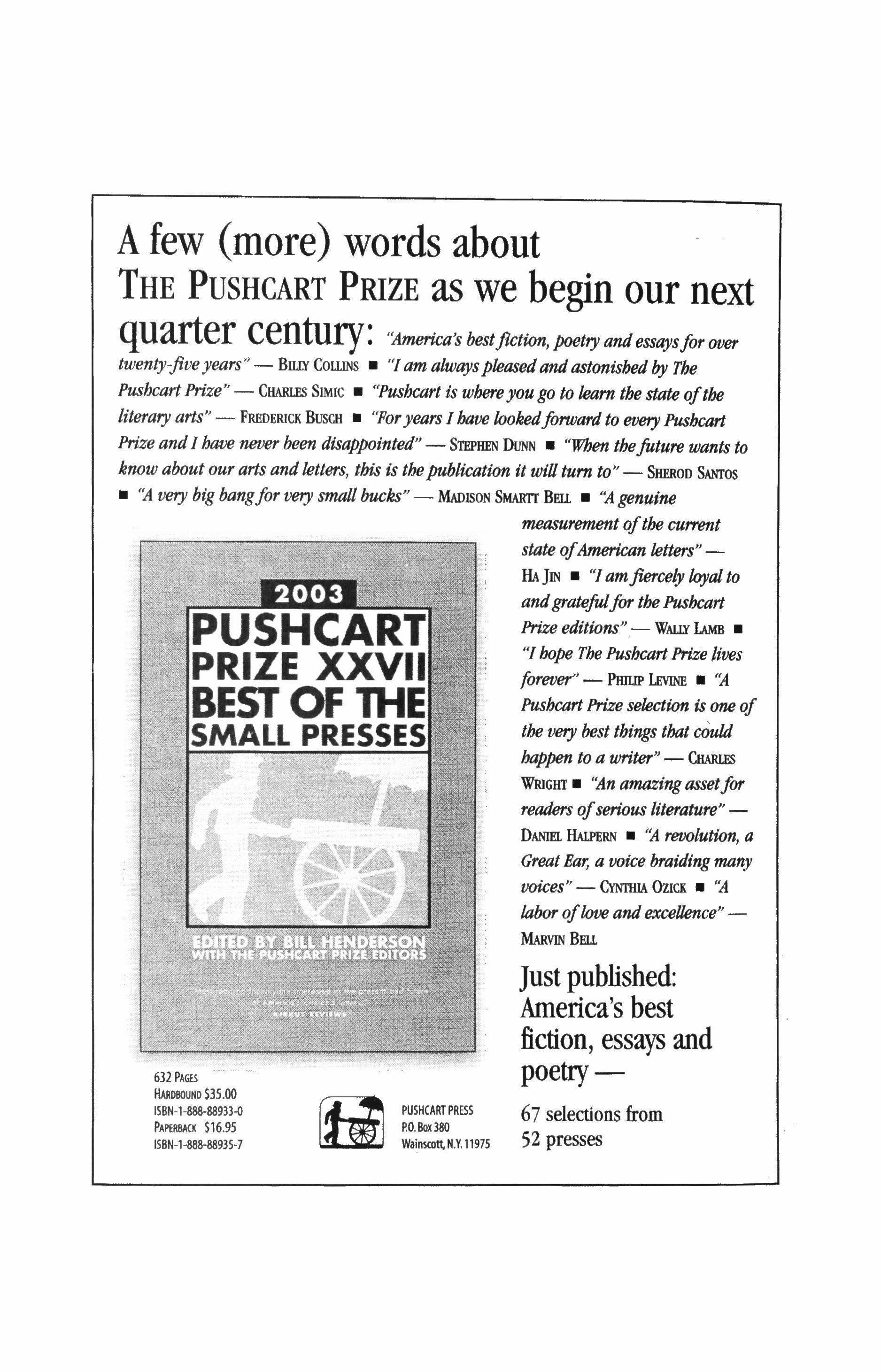
632 PAGES
HARDBOUND $35.00
ISBN-1-888-88933-O
PAPERBACK $16.95
ISBN+888-88935-7
PUSHCART PRESS
P.O.BDx 380 WainscottN.Y. 11975
Just published: America's best fiction, essays and poetry67 selections from 52 presses
MARvIN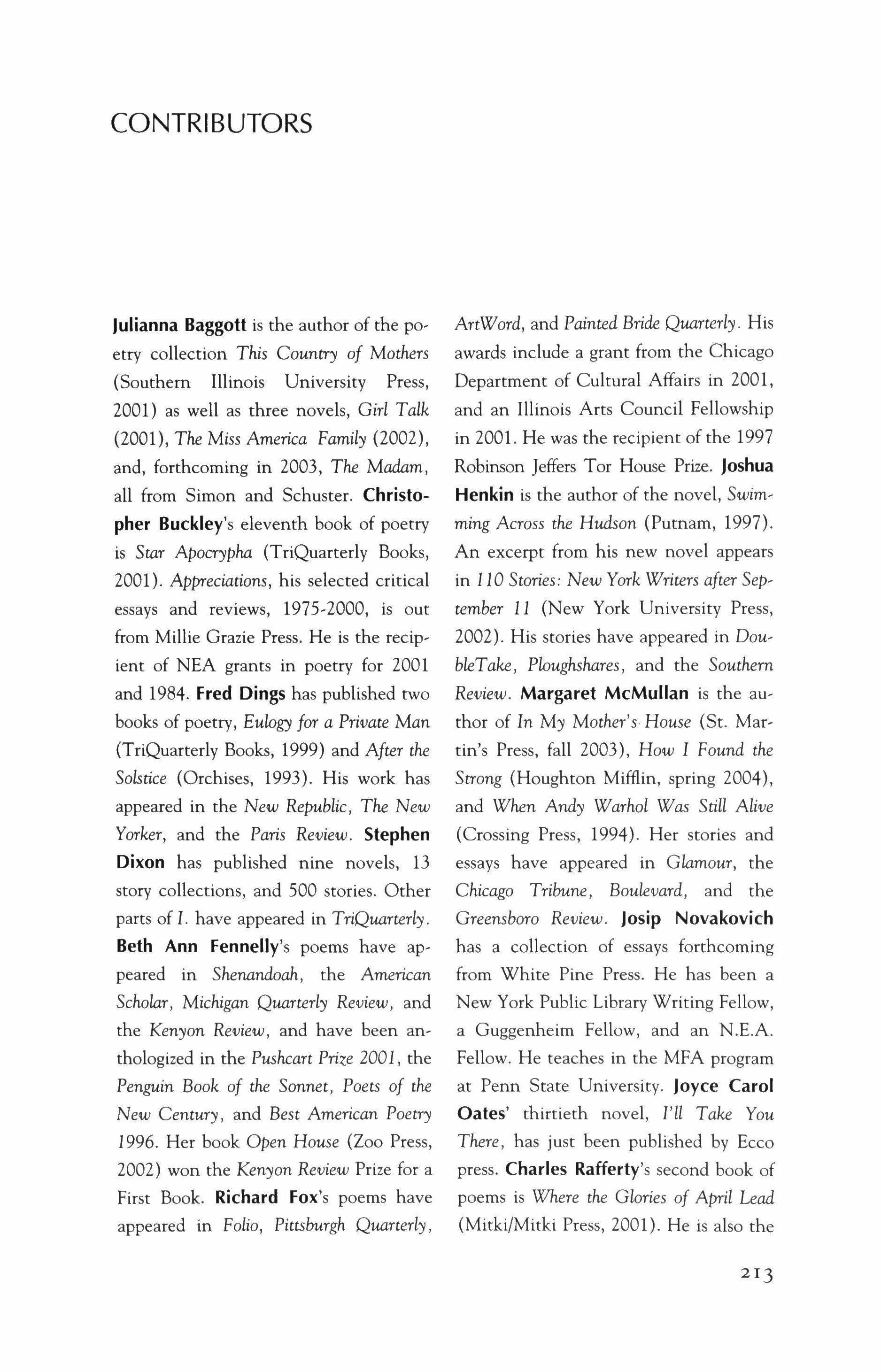
Julianna Baggott is the author of the poetry collection This Country of Mothers (Southern Illinois University Press, 2001) as well as three novels, Girl Talk (2001), The Miss America Family (2002), and, forthcoming in 2003, The Madam, all from Simon and Schuster. Christopher Buckley's eleventh book of poetry is Star Apocrypha (TriQuarterly Books, 2001). Appreciations, his selected critical essays and reviews, 1975-2000, is out from Millie Grazie Press. He is the recipient of NEA grants in poetry for 2001 and 1984. Fred Dings has published two books of poetry, Eulogy for a Private Man (TriQuarterly Books, 1999) and After the Solstice (Orchises, 1993). His work has appeared in the New Republic, The New Yorker, and the Paris Review. Stephen Dixon has published nine novels, 13 story collections, and 500 stories. Other parts of I. have appeared in TriQuarterly Beth Ann Fennelly's poems have appeared in Shenandoah, the American Scholar, Michigan Quarterly Review, and the Kenyon Review, and have been anthologized in the Pushcart Prize 2001, the Penguin Book of the Sonnet, Poets of the New Century, and Best American Poetry 1996. Her book Open House (Zoo Press, 2002) won the Kenyon Review Prize for a First Book. Richard Fox's poems have appeared in Folio, Pittsburgh Quarterly,
ArtWord, and Painted Bride Quarterly. His awards include a grant from the Chicago Department of Cultural Affairs in 2001, and an Illinois Arts Council Fellowship in 2001. He was the recipient of the 1997 Robinson Jeffers Tor House Prize. Joshua Henkin is the author of the novel, Swimming Across the Hudson (Putnam, 1997).
An excerpt from his new novel appears in 110 Stories: New York Writers after September 11 (New York University Press, 2002). His stories have appeared in DoubleTake, Ploughshares, and the Southern Review. Margaret McMullan is the author of In My Mother's House (St. Martin's Press, fall 2003), How I Found the Strong (Houghton Mifflin, spring 2004), and When Andy Warhol Was Still Alive (Crossing Press, 1994). Her stories and essays have appeared in Glamour, the Chicago Tribune, Boulevard, and the Greensboro Review. [osip Novakovich has a collection of essays forthcoming from White Pine Press. He has been a New York Public Library Writing Fellow, a Guggenheim Fellow, and an N.E.A. Fellow. He teaches in the MFA program at Penn State University. Joyce Carol Oates' thirtieth novel, I'll Take You There, has just been published by Ecco press. Charles Rafferty's second book of poems is Where the Glories of April Lead (Mitki/Mitki Press, 2001). He is also the
author of The Man on the Tower (University of Arkansas Press, 1995). Jeff Tietz's essays have also appeared in Harper's and the Atlantic Monthly. Phillip Robertson's reports have appeared in Salon. He lives in Oakland, California. Ekaterina (E. M.)
Salmanova is the author of a number of novellas and short stories in St. Petersburg, Russia. "Tango for One" originally appeared in Russian in Neva (February, 2002). Richard Swanson is the author of Events of the Day, a historical novel of the nineteen-sixties (iUniverse, 2001). Douglas Unger is the author of four novels, including Leaving the Land, a finalist for the Pulitzer Prize and the Robert F. Kennedy Award. His most recent book is Voices from Silence, a novel of repression and terror in Argentina. Ronald Wallace is the author of twelve books of poetry, fiction, and criticism, including the forthcoming Long for This World: New and Selected Poems, Quick Bright Things (Midlist Press, 2001) and The Uses ofAd-

versity (University of Pittsburgh Press, 1998). He co-directs the writing program at the University of Wisconsin and is poetry editor of the University ofWisconsin Press. 8J Ward's two book of poems are 17 Love Poems with No Despair (1997) and Landing in New Jersey with Soft Hands (1994), both from North Atlantic Books. His poems have appeared or are forthcoming in Poetry, the New York Times, and Puerto Del So!. He teaches at Warren County Community College in New Jersey. Michelle Wildgen is an assistant editor at Tin House magazine. Her fiction, food writing, and memoirs have appeared or are forthcoming in Prairie Schooner, the Madison Review, and Rosebud. She has a story forthcoming in Best New American Voices 2004. S. L. Wisenberg is the author of the short story collection, The Sweetheart Is In (TriQuarterly Books, 2001), and an essay collection, Holocaust Girls: History, Memory & Other Obsessions (University ofNebraska Press, 2002).
THE WASHINGTON AND LEE UNVERSITY REVIEW � 'R� ccmtYibu:tor'�
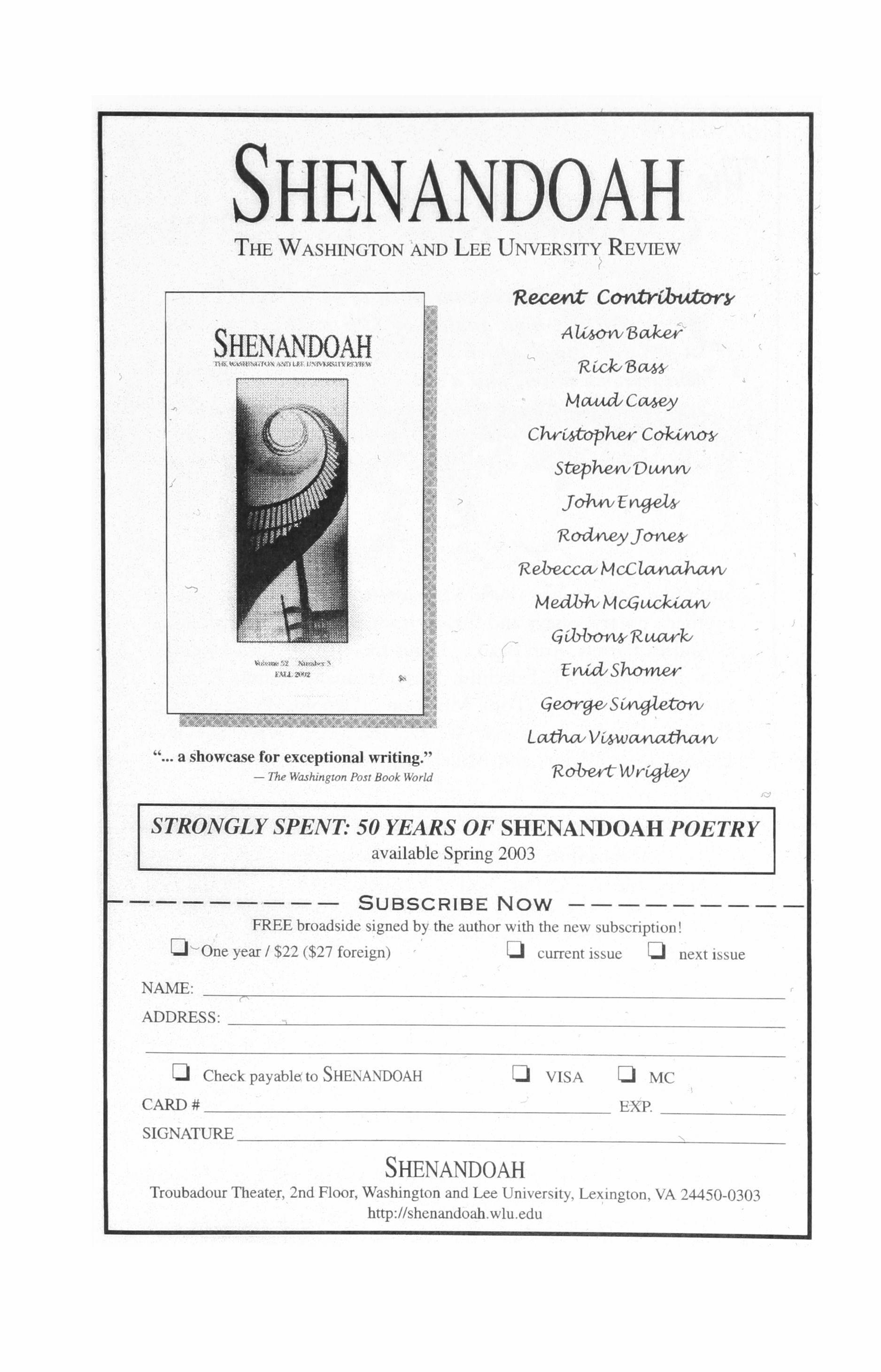
'Rldv131M« Mc;w.d;C� Chv�hevC�
St:e:phMvVIMWV Johvvf�
'Rober-t WV4fl:ey /
a showcase for exceptional writing." - The Washington Post Book World
'Rodrte:YJorte1r' 'Re.hecccvMcC� /'vfedbfv/'vf�� G�'Rucw1v fni,d;Shome« Cieor�S�o-rv LathvvV��
STRONGLY SPENT: 50 YEARS OF SHENANDOAH POETRY available Spring 2003
SUBSCRIBE Now
FREE broadside signed by the author with the new subscription! O�One year I $22 ($27 foreign) 0 current issue 0 next issue
NAME: �
ADDRESS: �
o Check payable: to SHENANDOAH 0 VISA 0 MC CARD# E*P. SlGNATURE �
Troubadour Theater, 2nd Floor, Washington and Lee University, Lexington, VA 24450-0303 htrp.z/shenandoah.wlu.edu
�, 'l""""
Subscribe now to rrhe Southern. <J<eviem to experience the best of southern poetry, essays and fiction from such noted contributors as Andrea Barrett, Ann Beattie, Denis Donoghue, Ellen Douglas, Pam Durban, B. H. Fairchild, Barry Hannah, Seamus Heaney, Bobbie Ann Mason, Toni Morrison, Reynolds Price, Gerald Shapiro, George Singleton, W. D. Snodgrass, Wole Soyinka, Eleanor Ross Taylor, and Miller Williams.
Subscription Order Form for 7lze Soutlzern :Review
Individuals: $25.00 (Iyr.) _,_$40.00 (2 yr.)
Institutions: $50.00 (lyr.)
$75.00 (2 yr.)

$55.00 (3 yr.)
$100.00 (3 yr.)
Sample copy ($8.00 individuals/$16.00 institutions)
N�e:
Address: City: State: Zip:
Charge m>c_MasterCard OL.__VISA.
Acc't No.: Exp, Date:
Signature:
Paymen t enclosed in the amount of
For orders outside the U.S. add $4.00 per year for postage and remit in U.S. dollars drawn upon a U.S. bank

